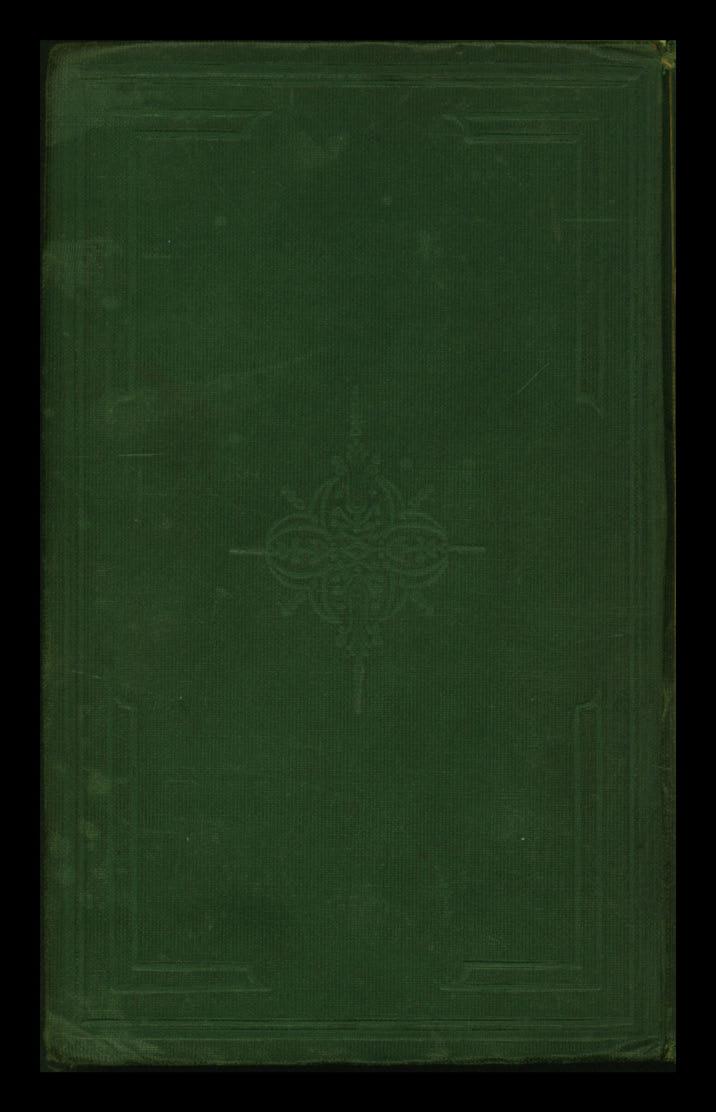






Heallers are re(IUf'sted to take great cue of the books whill' in their and to point Ol1t .,ny defect that they lIlay in thelll to the Locltl Lil rarian. ReadE'r8 1I1UHt rl'port at the opportunity any which IntLy have been dOlle to the preVIous to their receivillg thelll, o' they will be held accountaole for estimatp.d \' alue
All he retulIlcd , 0 the Local Centrewith · III fOllrteen daYH from the date CIf iRsue; but an extension of the lWl iod of loan lIlay he granted when desired . H&dc.s \\ lit) nt'glf'ct to retllrn hooks to the local (,l'Iltre Witilill the time, or who do not t.ke ploper ('aIC of them while in their pol'lseshion, lose the right Hf receiving fllrther vohlnles.
Books MUHT NOT be lellt hy .eqd ers to other persolls withuut Lhc knowledg e a/ld of the Local Librarian.
ReaderR report to the Local Librarilln any' case of illfc,·tiulIs occuring ill the while a hbrary hook is in their
.'tudents the COllllty Rural Libraries are re · minded t hat the s pecial re Imrceh of the Iri!<h Central 1,illTll.l y for 'tndent!> Ilre aVllilahle to them . .-\ he made through the COllnty Librarian, County Rcpo"itory, Liflord
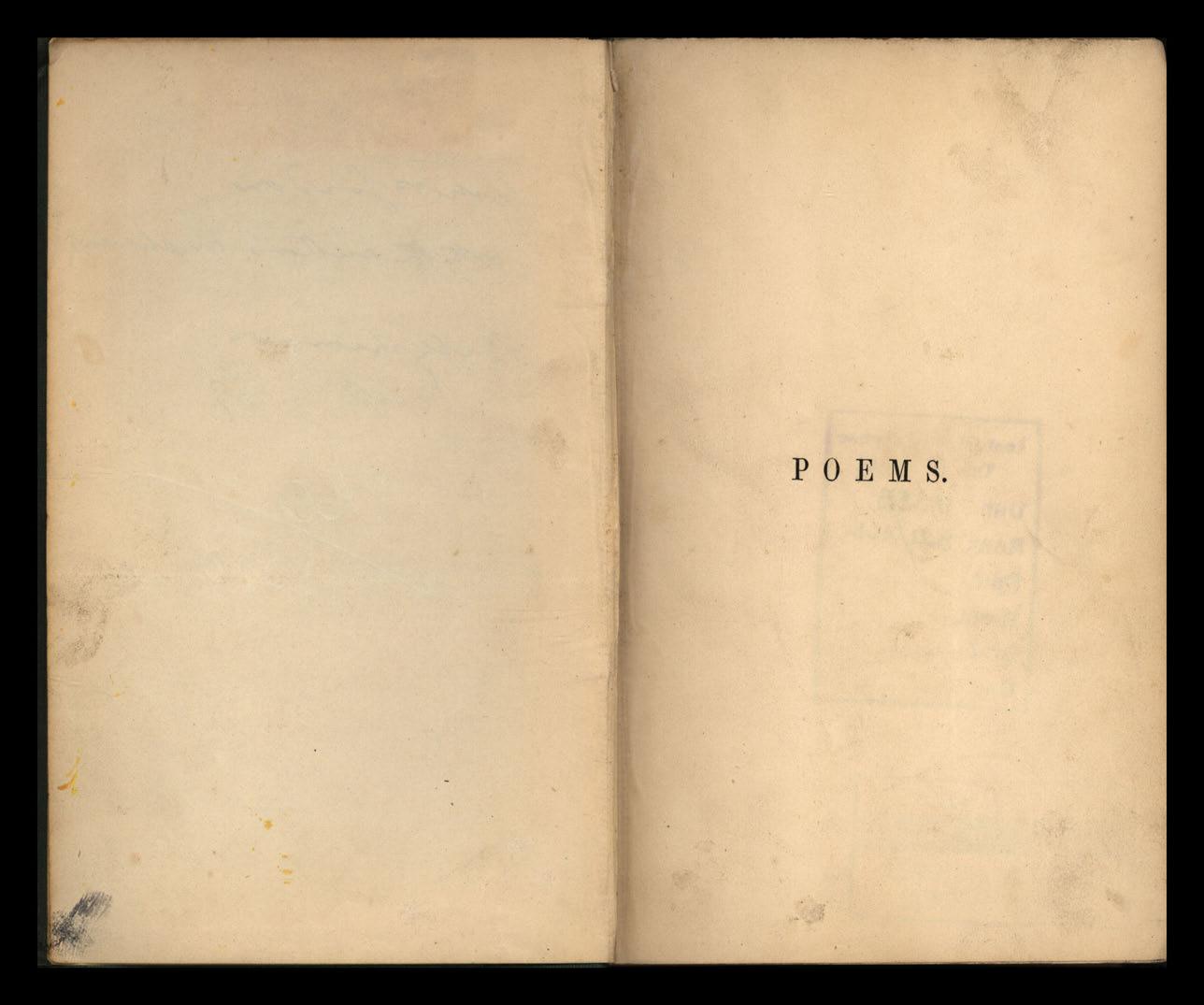
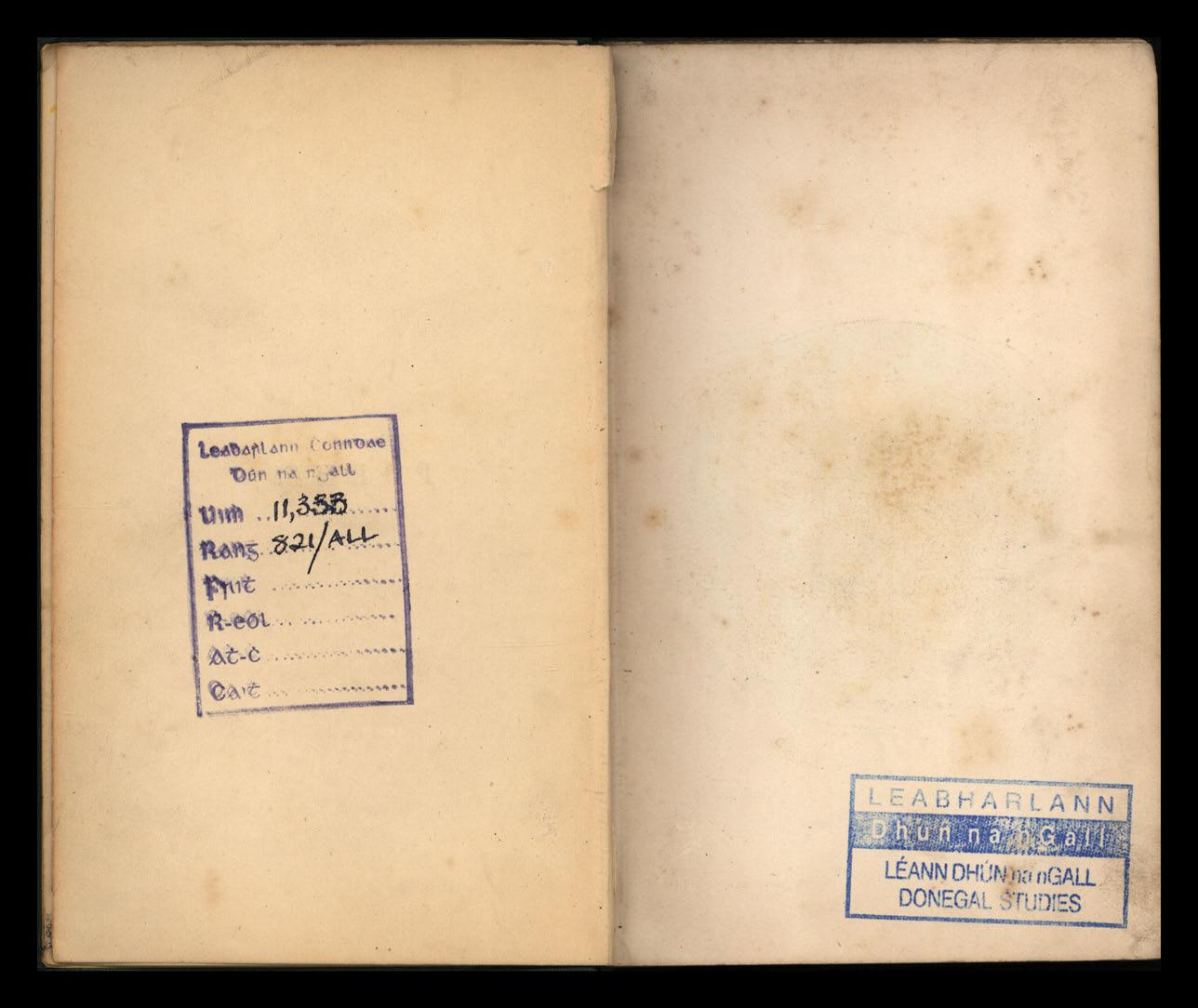
\.e6t>6f\t6 nl i. ' {Jnn'O<\e '{)Ot'l t !'" r, , .. ff,M>fj
STORY. AND
TWO SERIES OF DAY A11)NIGHT SONGS. BY WILLIAM ALLINGHAM.
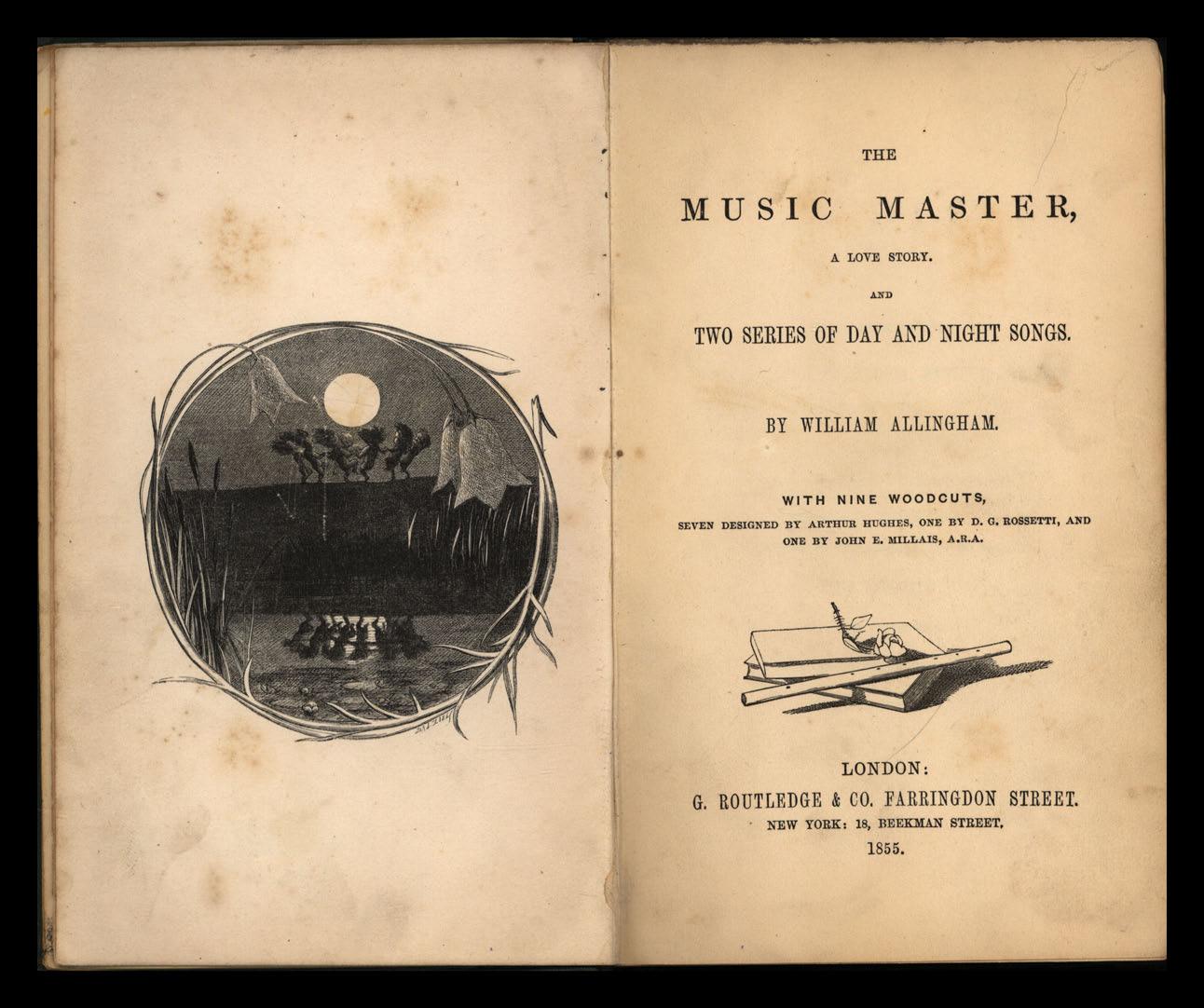
WITH NINE WOODCUTS,
SEVEN DESIGNED BY ARTHUB H UOHES, ONE BY D. O. ROSSETTI, AND ONE BY JOHN E. MILLAIS, A.R.A. LONDON: G. ROUTLEDGE & CO. FARRINGDON STREET. NEW YORK: 18, REEKMAN STREET. 1855.
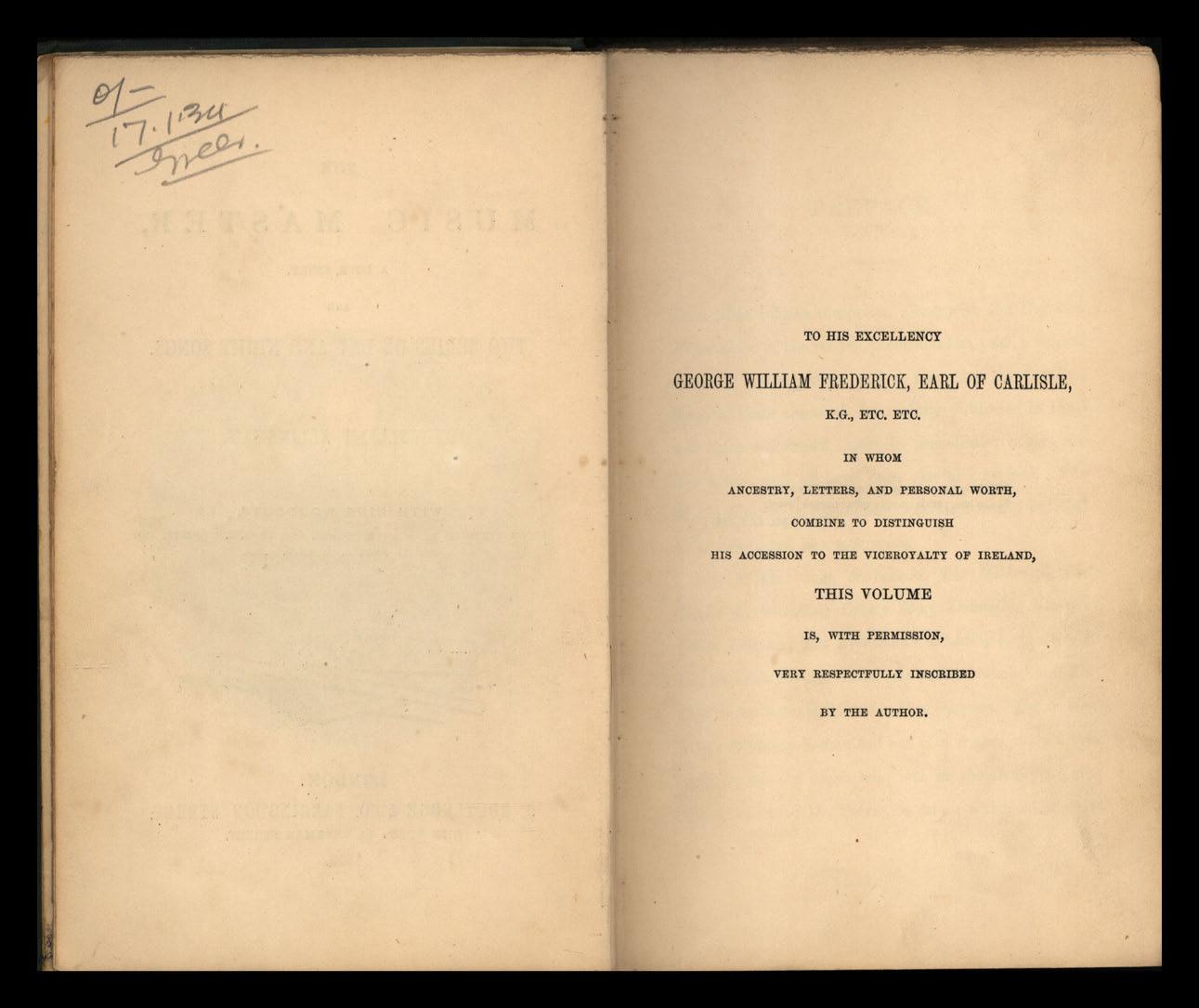
TO HIS EXCELLENCY
GEORGE WILLIAM FREDERTCK, EARL OF CARLISLE, E.G., ETC. ETC.
IN WHOM
ANCESTRY, LETTERS, AND PERSONAL WORTH, COMBINE TO DISTINGUISH
HIS ACCESSION TO THE VIOEROYALTY OF IRELAND, THIS VOLUME IS, WITH PERMISSION, VERY RESPECTFULLY INSCRmED BY THE AUTHOB.
lfflitiJo quanquam plger et malus, utIlis urbl, Si daa hoe, parvis quoque rebus magnajuvarl. HOL Ep;.. II. i. l2i.

THIS little volume comprises, along with the ]Ja!l and Night Songs of the writer, published last year, a second series of short poems, and a narrative composition. Some of these appeared in a volume published in 1850 and since withdrawn, some in periodicals; others are now added, and all have been carefully revised. The Music-Master, in particular, is perhaps nearly entitled to be considered as a new poem .
Five of the songs or ballads, The jJ[ilkmaid, The Girl's Lamentation, Lovely Mary ]Jannelly, Nanny" Sailor Lad, and The Nobleman', Wedding have already had an Irish circulation 3." 'ha'penny ballads,' and the first three were written for this purpose. The Nobleman's Wedding is moulded out of a. fragmentary ditty sung by an old nurse who was in the family of my respected friend Dr. Petrie, to an air which he intends
viii PREFACE.
to include in his collection of Melodies, now issuing at intervals from the press for the Society for the Preservation and Publication of Ancienll Irish Music. Perhaps I may here remark that I found it not easy, in balladwritins:, to employ a diction that might hope to come home to the Irish peasant who speaks 'English (as most of them now do), using his customary phraseology, and also keeping within the laws of poetic taste and the rules of grammar; for that phraseology, being as regards its structural peculiarities but an imperfect or distorted expression, not an ancient dialect like that of Scotland, is generally too corrupt (though often forcible) to bear transplantation into poetry. Only familiar experience, too, and constant attention can enable one to use words in the exact significance which the popular custom has assigned: for instance, among the Irish peasantry, " distress," ,as far as I know, always means bodily want; "trouble," aJlliction ofmind ; "misery," penuriousness; "care," responsibility; and" sorrow" commonly means ill-luck, misfortune; while" sorry" has the usual dic-
tionary meaning. From these conditions it comes that the choice of words for poetry in Irish-English is narrowly limited, instead ofthere being that accession both of variety and raciness which is sometimes in the gift of a genuine peculiar dialect.
Those excellent painters who on my behalf have submitted their genius to the risks of wood-engraving will,
I hope, pardon me for placing a word of sincere thanks in the book they have honoured with this evidence, through art, of their valued friendship.
As to the book itself, which belongs to the period of youth and early manhood, I can unaffectedly say I spend little thought, and make less claim, with regard to its chances of reception; satisfied with its being a genuine poetic result, however small a one, of my experience thus far. There are at least some who will receive it kindly, for whose sake it is worth while to publish it, and to plan future pages that may better deserve their perusal.
W.A.
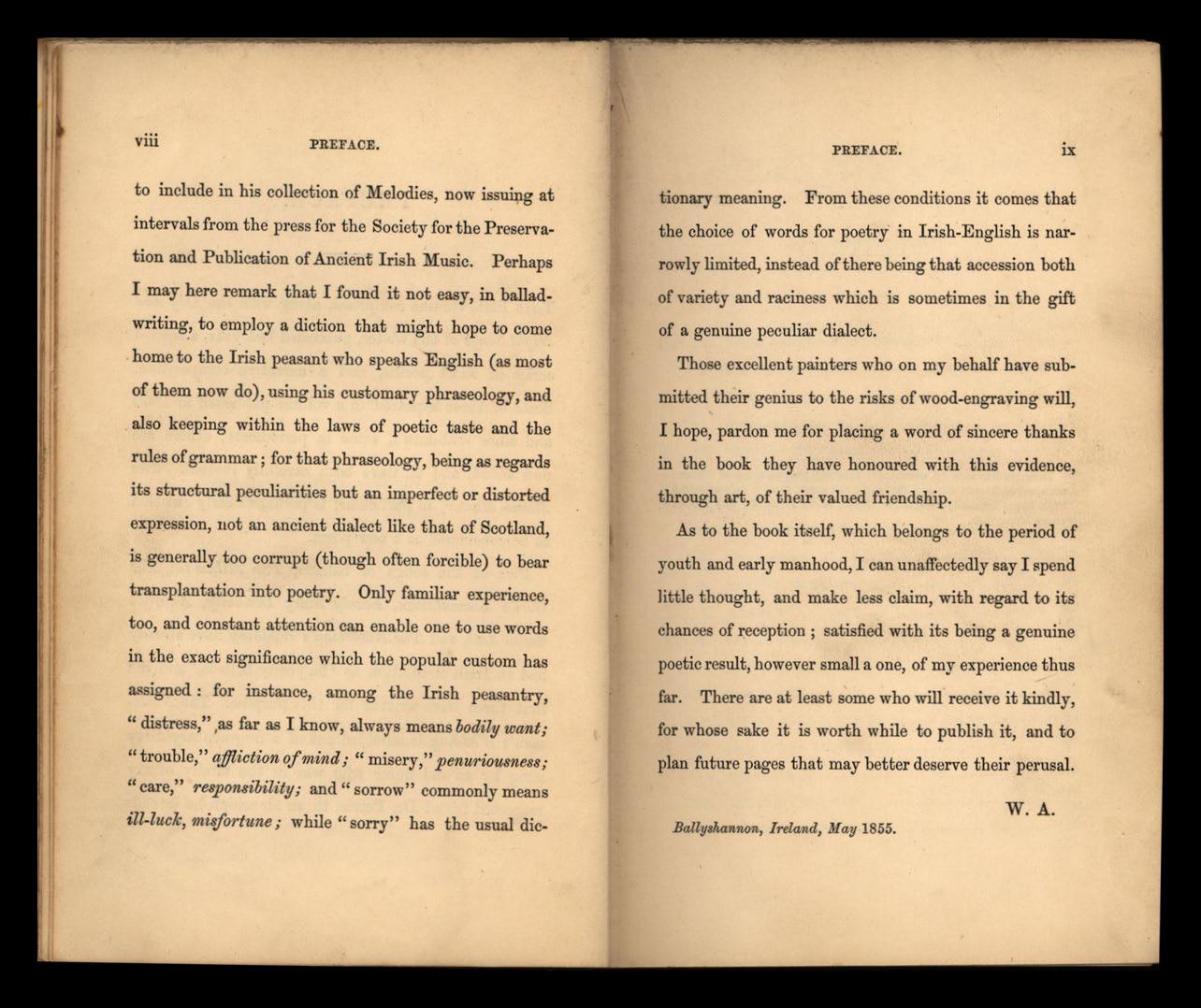
Bally,hannon, Ireland, May 1855.
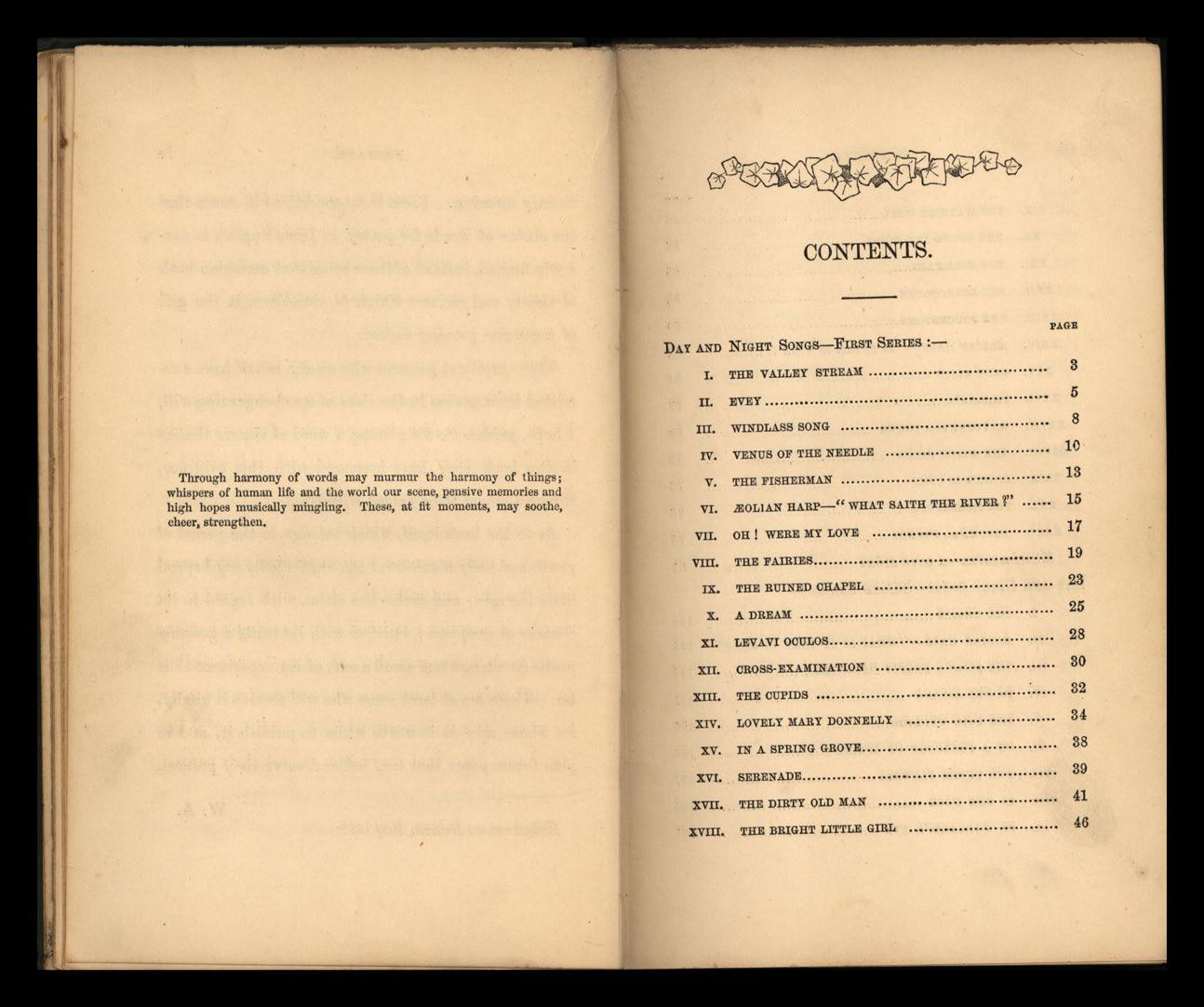
Through harmony of words may murmur the harmony of thlng'1!; whlspers of human life and the world our scene, pensive memories nnd high hopes musically mingling. These, at fit moments, may soothe, cheer, strengthen.
xv.
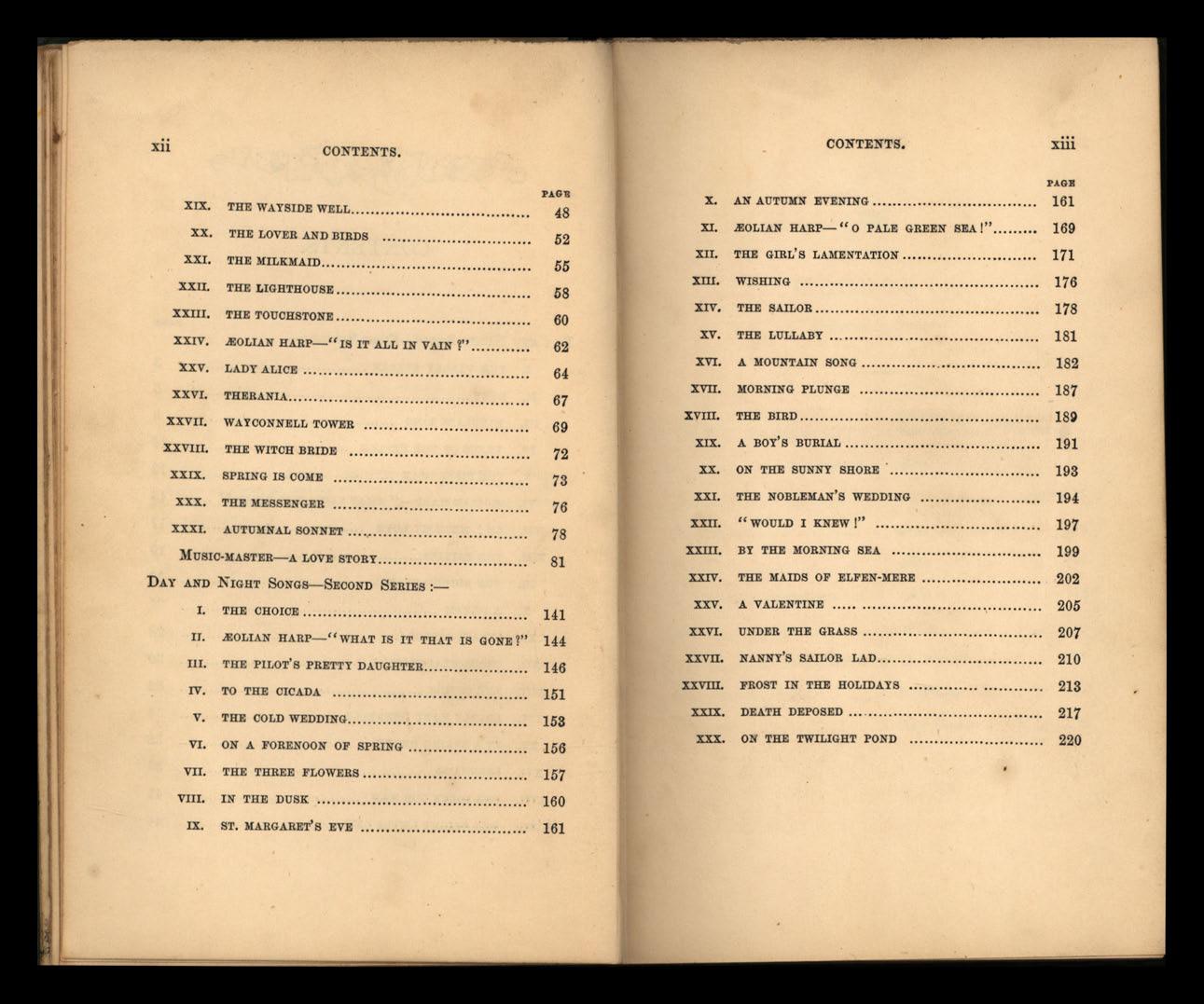
XXII. "WOULD I KNEW I"
XXIII. BY THE MORNING SEA ............................ ..
XXIV. THE MAIDS OF ELFEN·MERE
xxv. A VALENTINE
XXVI. UNDER THE GRASS
XXVII. NANNY'S SAILOR LAD
XXVIII. FROST IN THE HOLIDAYS
XXIX. DEATH DEPOSED
XXX. ON THE TWILIGHT POND
E ngraved by Dakiel.
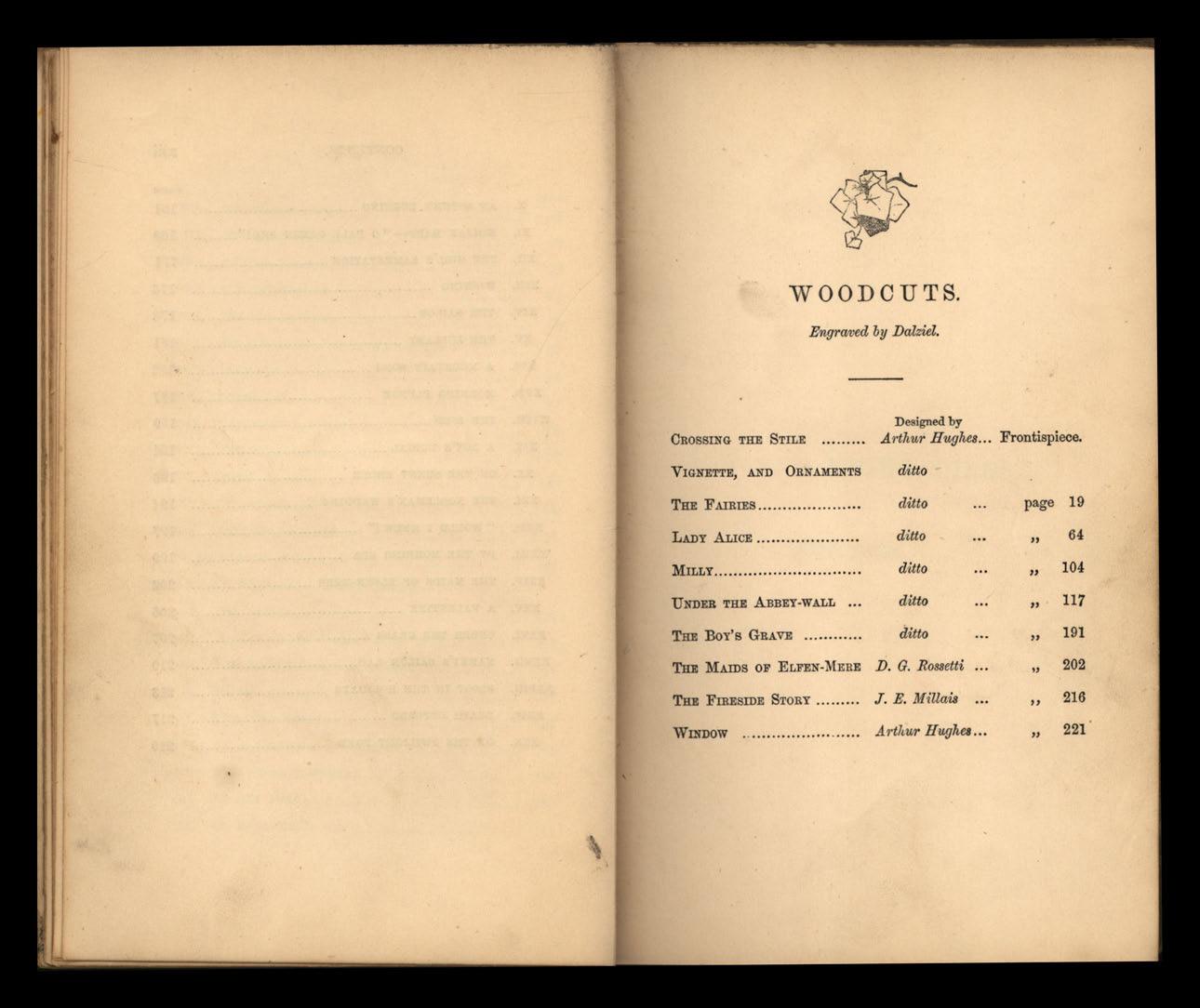
D esigned by
CROSSING THE STILE ,ih-thu r HugheB... Frontispiece.
VIGNETTE, AND ORNAMENTS ditto
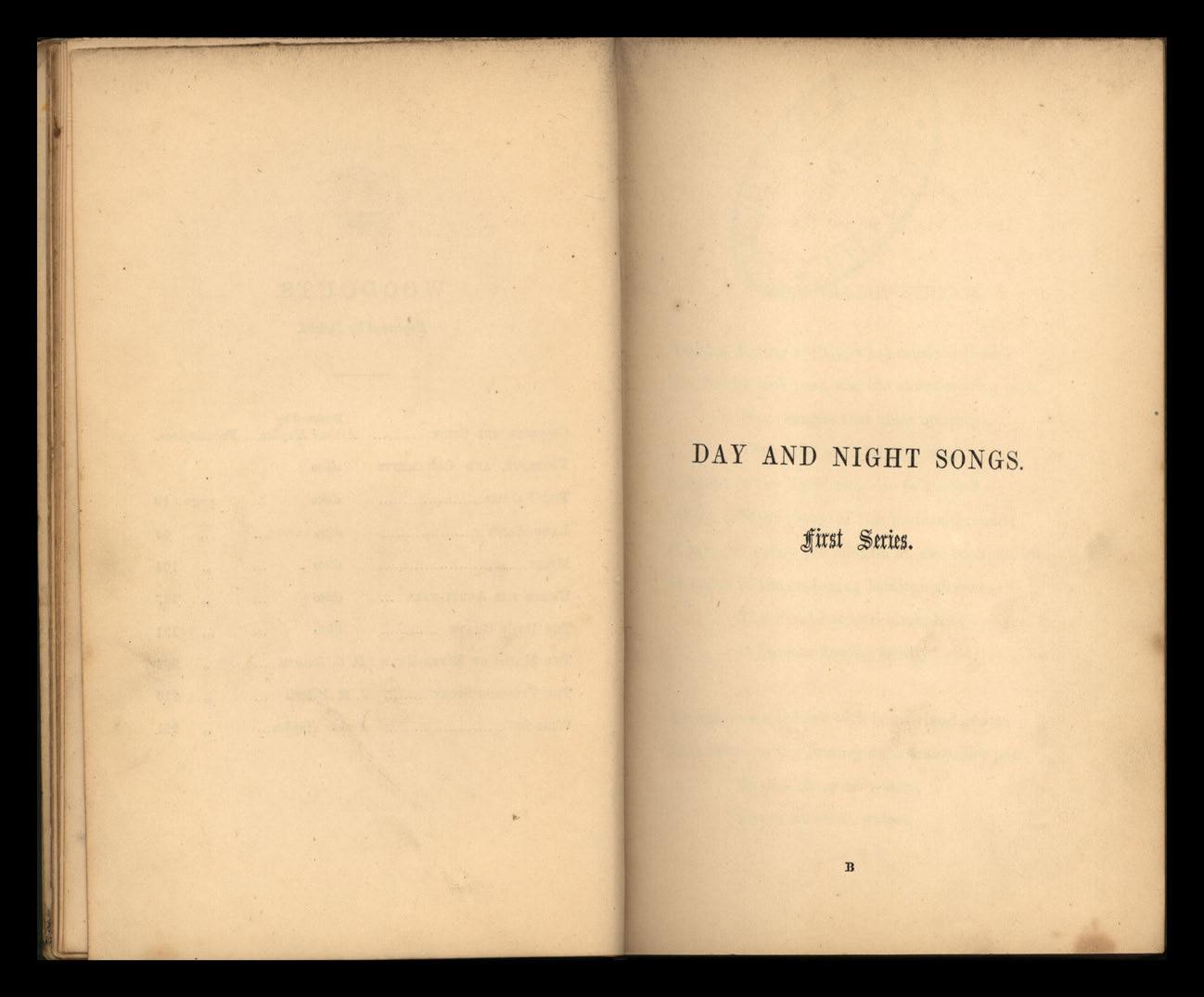
STREAM flowing swiftly, what music is thine!
The breezy rock-pass, and the storm-wooing pine,.
Have taught thee their murmurs, Their wild mountain murmurs;
Subdued in thy liquid response to a sound
Which aids the repose of this pastoral ground;
Where our valley yet mingles an awe with the love
It smiles to the sheltering bastions above;-
Thy cloud-haunted birthplace,
o Stream, flowing swiftly!
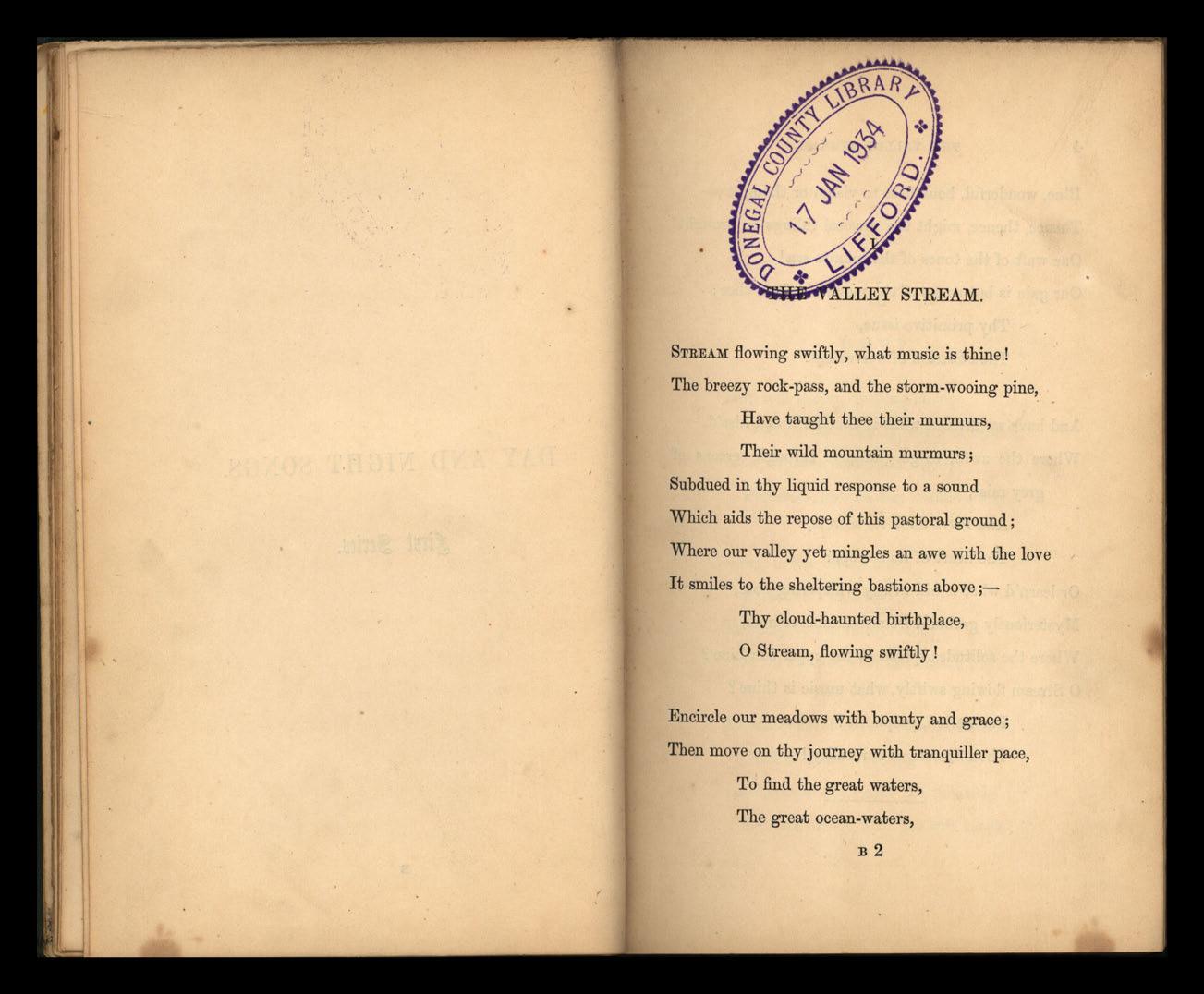
Encircle our meadows with bounty and grace;
Then move on thy journey with tranquiller pace,
To find the great waters,
The great ocean-waters, n2
4 · THE VALLEY STREAM.
Blue, wonderful, boundless to vision or thought j-
Thence, thence, might thy musical tidings be brought!
One waft of the tones of the infinite sea!
Our gain is but songs of the mOlmtain from thee:
Thy primitive issue,
Thou Stream of our valley!
And have we divined what is thunder'd and hiss'd,
Where the awful ledge glimmers through screens of grey mist,
And raves forth its secrets,
The heart of its secrets ?
Or learn'd what is hid in thy whispering note,
Mysteriously gather'd from fountains remote,
. Where the solitudes spread in the upper sunshine?
o Stream flowing swiftly, what music is thine?
Far-wafted, prophetic?
Thou Stream of our valley!
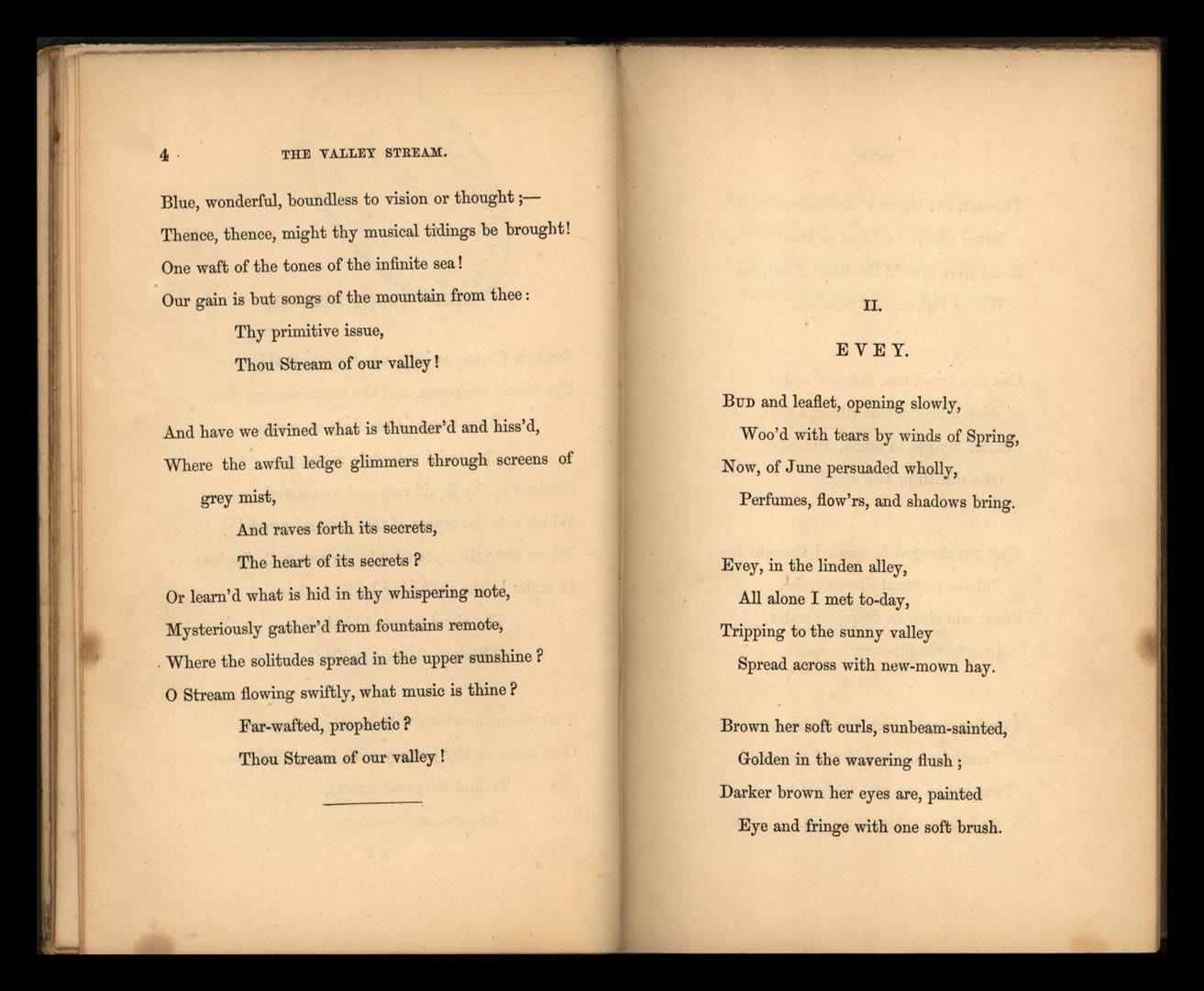
BUD and leaflet, opening slowly,
Woo'd with tears by winds of Spring, Now, of June persuaded wholly, Perfumes, flow'rs, and shadows bring.
Evey, in the linden alley,
.All alone I met to-day,
Tripping to the sunny valley
Spread across with new-mown hay.
Brown her soft curls, sunbeam-sainted,
Golden in the wavering flush j
Darker brown her eyes are, painted
Eye and fringe with one soft brush.
Through the leaves a careless comer,
Never nymph of fount or tree
Could have press'd the floor of summer
With a lighter foot than she.
Can this broad hat, fasten'd under
With a bright blue ribbon's flow,
Change my pet so much, I wonder, Of a month or two ago?
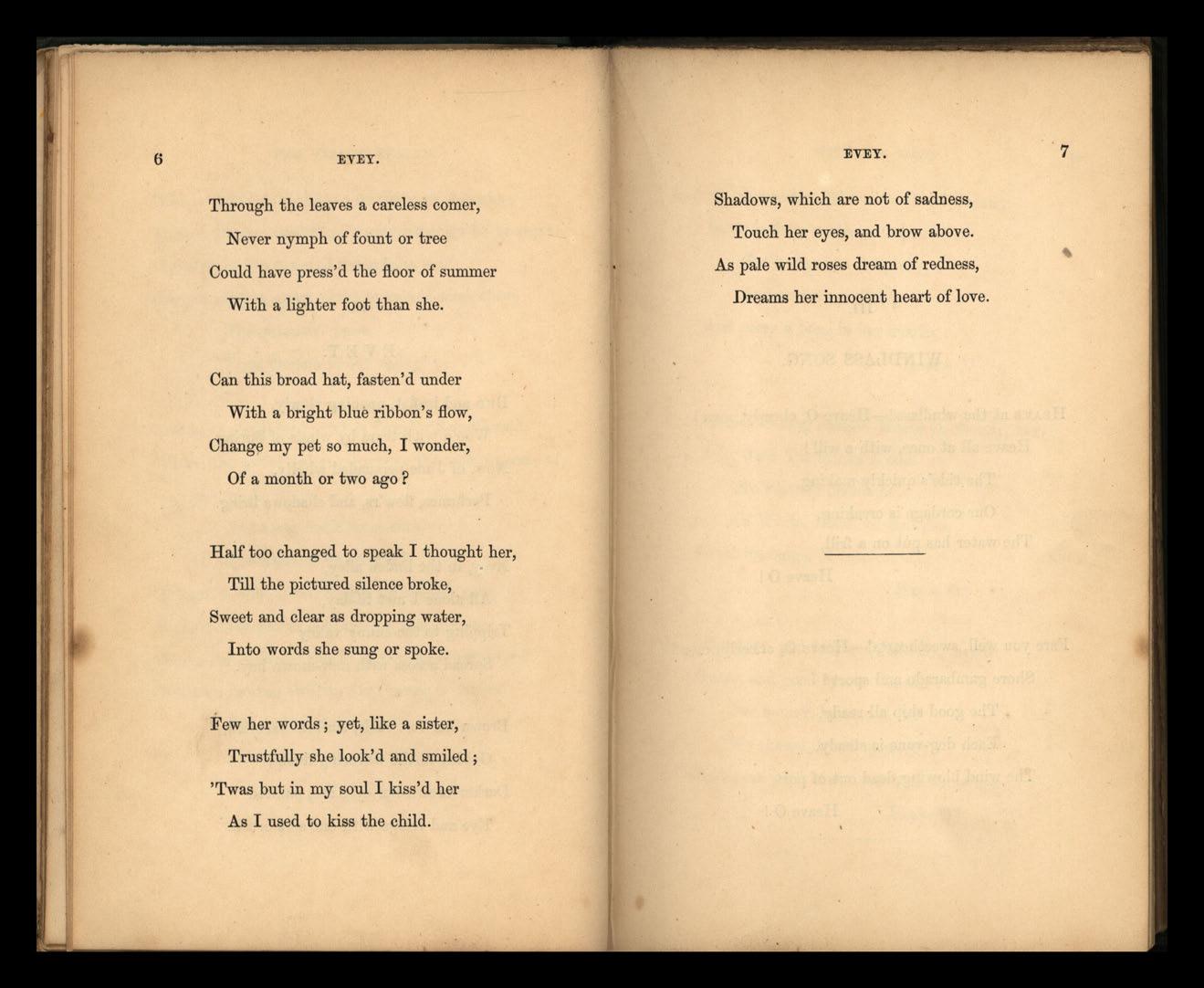
Half too changed to speak I thought her, Till the pictured silence broke, Sweet and clear as dropping water, Into words she sung or spoke.
Shadows, which are not of sadness, Touch her eyes, and brow above.
As pale wild roses ih·eam of redness,
Dreams her innocent heart of love.
Few her words j yet, like a sister, Trustfully she look'd and smiled; 'Twas but in my soul I kiss'd her
As I used to kiss the child.
, HI.
WINDLASS SONG.
HEAVE at th e windla ss !-Heave 0, cheerly, men!
H eav e all at once, with a will !
The tide's quickly making,
Our cordage is creaking,
The water has put on a frill, Heave O!
Fare you well, sweethearts!-Heave 0, cheerly, men!
Shore gambarado and sport!
The good ship all ready, Each dog-vane is steady,
Th e wind blowing dead out of port, Heave O!
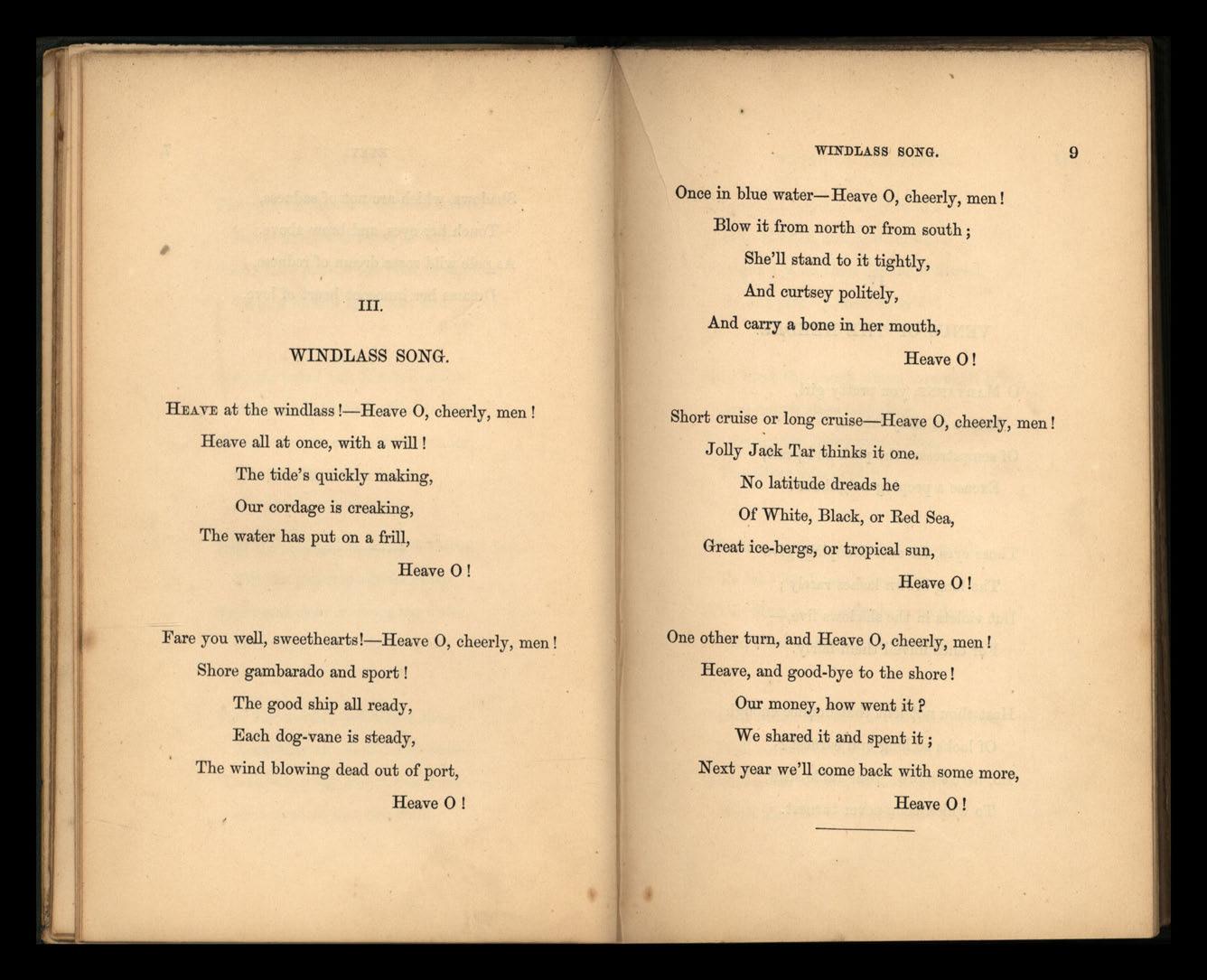
WINDLASS SONG.
Once in blue water-Heave 0, cheerly, men!
Blow it from north or from south;
She'll stand to it tightly,
And curtsey politely, And carry a bone in her mouth,
Heave O!
Short cruise or long cruise-Heave 0, che erly, men!
Jolly Jack T ar thinks it one.
No latitude dreads he
Of White, Black, or Red Sea, Great ice-bergs, or tropical sun, Heave O!
One other turn, and Heave 0, cheerly, men!
Heave, and good-bye to the shore!
Our money, how went it ?
We shared it and spent it ;
Next year we'll come back with some more, Heave O! 9
VENUS OF THE NEEDLE.
o MARY.A.NNE, you pretty girl,
Intent on silky labour,
Of sempstresses the pink and pearl,
Excuse a peeping neighbour !
Those eyes, for ever drooping, give
The long brown lashes rarely;
But violets in the shadows live,-
For once unveil them fairly.
Hast thou not lent that flounce enough
Of looks so long and earnest?
Lo, here's more" penetrable stuff,"
To which thou never turnest.
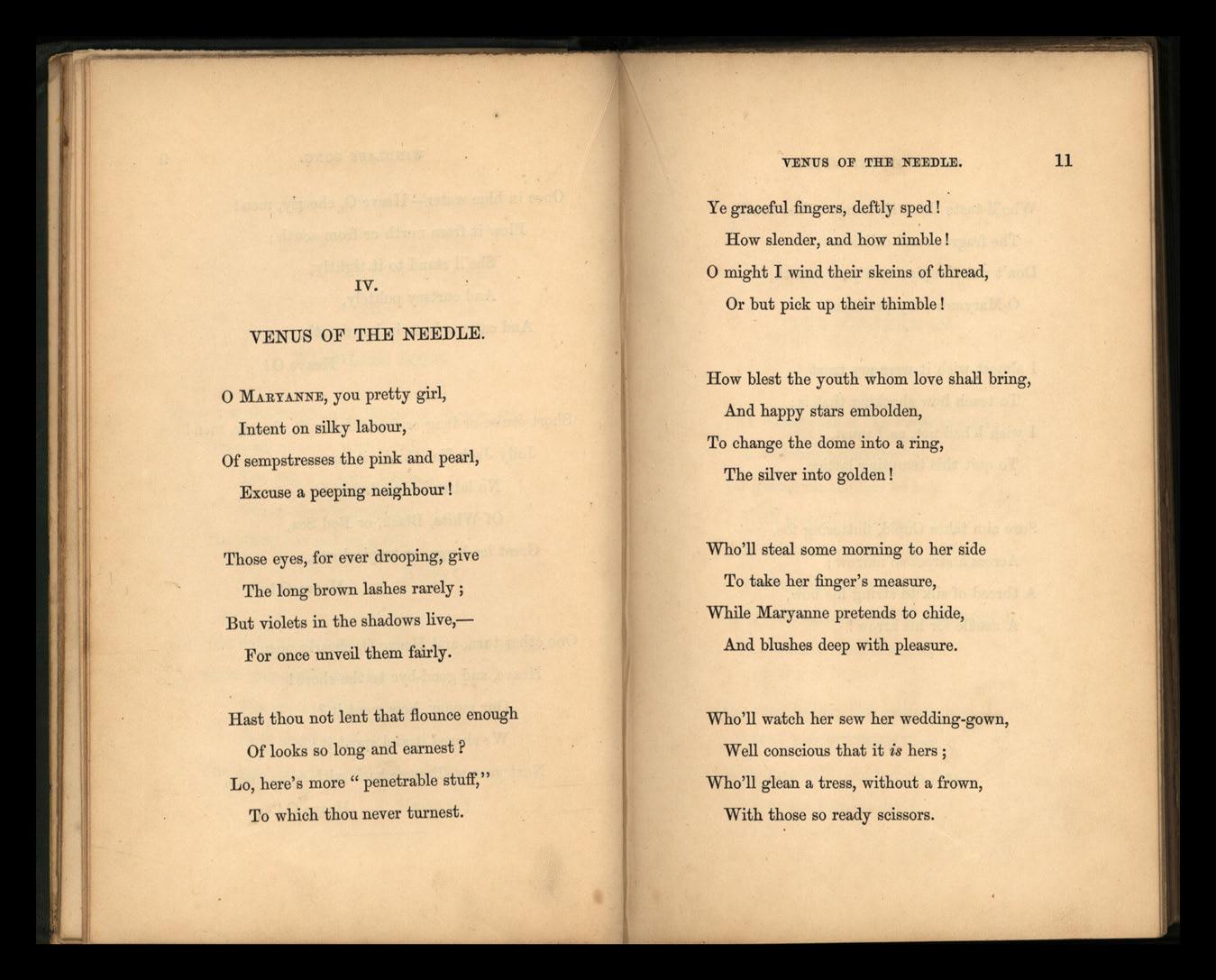
Ye graceful fingers, deftly sped!
How slender, and how nimble!
o might I wind their skeins of thread,
Or but pick up their thimble!
How blest the youth whom love shall bring,
And happy stars embolden,
To change the dome into a ring,
The silver into golden!
Who'll steal some morning to her side
To take her finger's measure,
While Maryanne pretends to chide,
And blushes deep with pleasure.
Who'll watch her sew her wedding-gown,
Well conscious that it is hers;
Who'll glean a tress, without a frown,
With those so ready scissors.

VENUS OF THE NEEDUl.
Who'll taste those ripenings of the south,
The fragrant and delicious-
Don't put the pins into your mouth, • 1
o Maryanne, my preclOus .
I almost wish it were my trust
To teach how shocking that is ;
I wi sh I had not, as I mu st,
To quit this tempting lattice.
Sure aim takes Cupid, flutt ering foe,
Across a street so narrow;
A thread of silk to string his bow,
A needle for his arrow! v.
FISHERMAN.
BY GOETHE.
THE wat er gush'd, the water swell'd;
A Fisherman ther eby
Sat gazing on the line he held,
With tranquil heart and eye;
And as he look'd, and as he loll'd,
The parting wat er surged;
And, rustling from the wave that roll'd,
A Woman's form emerged.
She sung to him, she spake to him :
"Why lure my brood away, .
By human skill, and human fraud,
Up to the burning day r
THE FISHERMA.N.
Oh, happy live the little fish!
So happy-mightst thou know,
This moment 'twere thine only wish To come to us below.
" Finds not the Sun a resting-place; The Moon, within the mere?
Uplifts not each a radiant face,
Grown doubly bright and clear ?
Persuade thee not these heav'ns so deep?
This moist, embracing blue?
Thy features, lo! that swim and sleep
In soft eternal dew?"
The water gush'd, the water swell'd,
It kiss'd his naked feet;
Deep longing all his heart impell'd,
As when our love we meet.
She spake to him, she sung to him ;
No help could come between;
Half drew she him, half sank he in,
And never more was seen. VI.
lEOLIAN HARP.
WHA.T saith the river to the rushes grey, Rushes sadly bending, River slowly wending?
Who can tell the whisper'd things they say?
Youth, and prim!', and life, and time,
For ever, ever fled away!
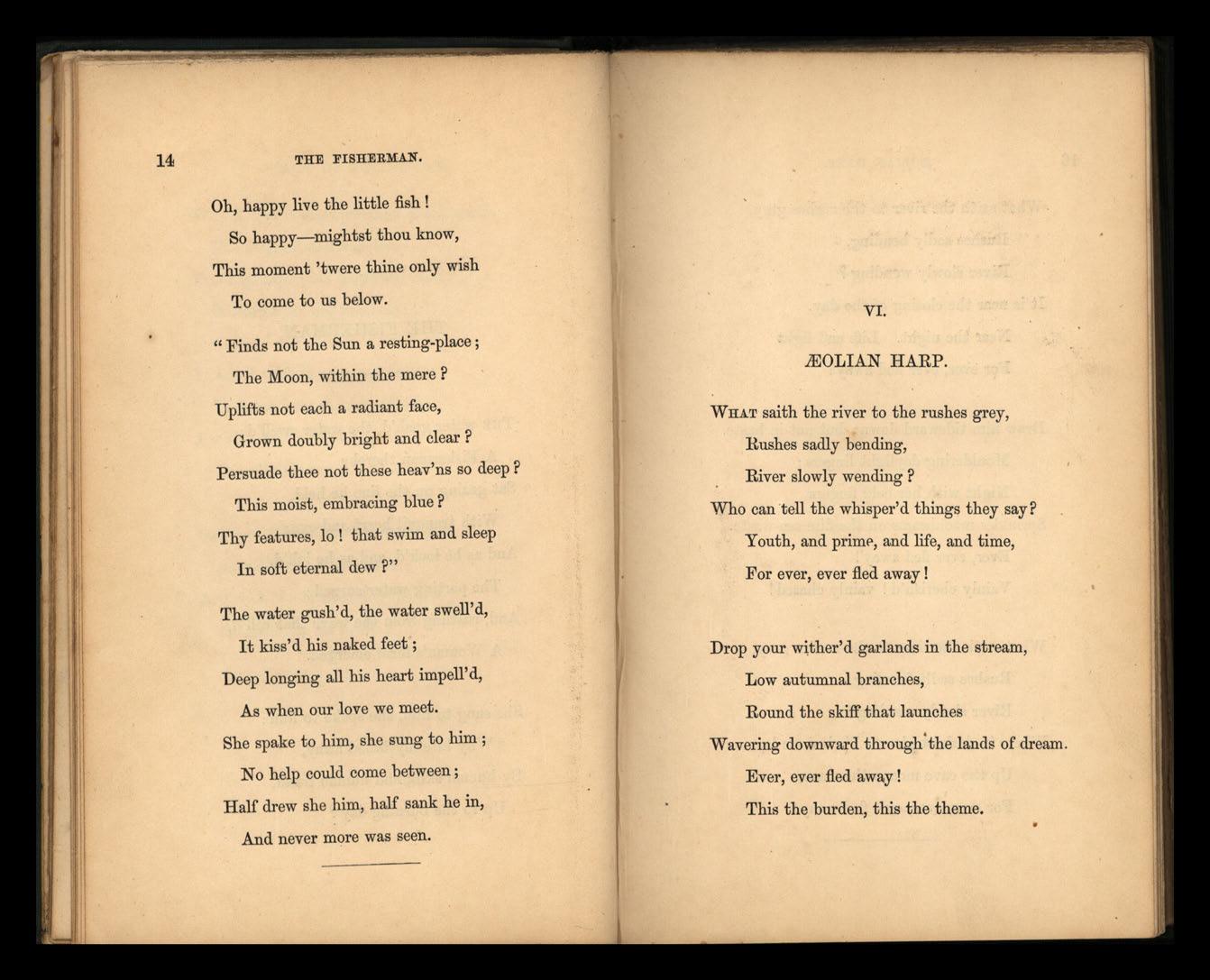
Drop your w\ther'd garlands in the stream, Low autumnal branches,
Round the skiff that launche s Wavering downward through ' the lands of dream .
Ever, ever fled away!
This the burden, this the theme.
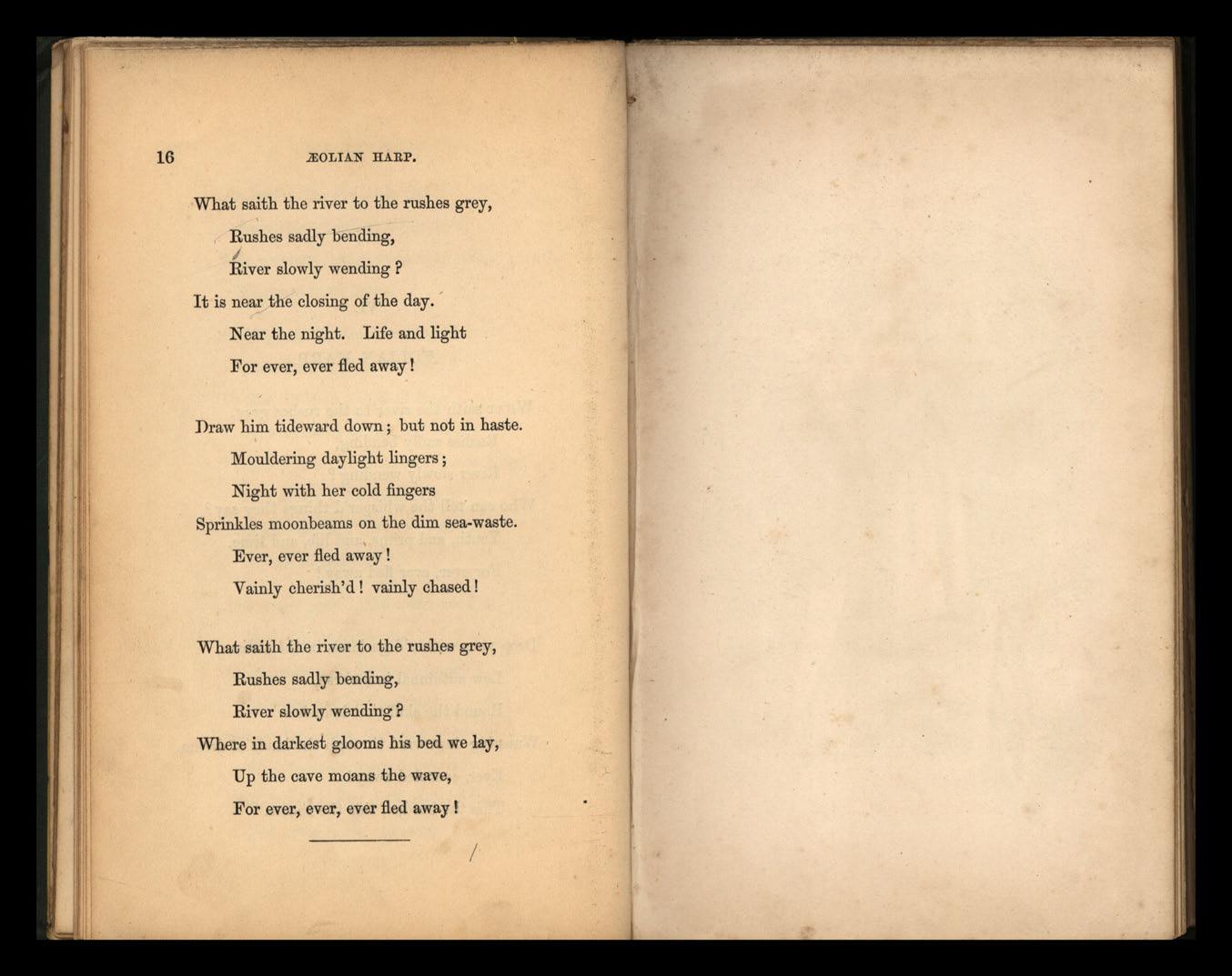
lEOLIA.N lllRP.
What saith the river to the rushes grey, Rushes sadly bending, I River slowly wending?
It is near the closing of the day.
Near the night. Life and light
For ever, ever fled away!
Draw him tideward down j but not in haste.
Mouldering daylight lingers j
Night with her cold fingers
Sprinkles moonbeams on the dim sea-waste.
Ever, ever fled away!
Vainly cherish'd! vainly chased!
What saith the river to the rushes grey, Rushes sadly bending, River slowly wending?
Where in darkest glooms his bed we lay,
Up the cave moans the wave,
For ever, ever, ever fled away!
OH! WERE MY LOVE .
OH! were my Love a country lass, That I might see her every day;
And sit with her on hedgerow grass
Beneath a bough of May;
And find her cattle when astray, Or help to ,drive them to the field,
And linger on our homeward way, And woo her lips to yield
A twilight kiss before we parted,
Full of love, yet easy-hearted.

Oh! were 'my Love a cottage maid, To spin through many a winter night,
Where ingle-corner lends its shade
From fir-wood blazing bright. Q
18
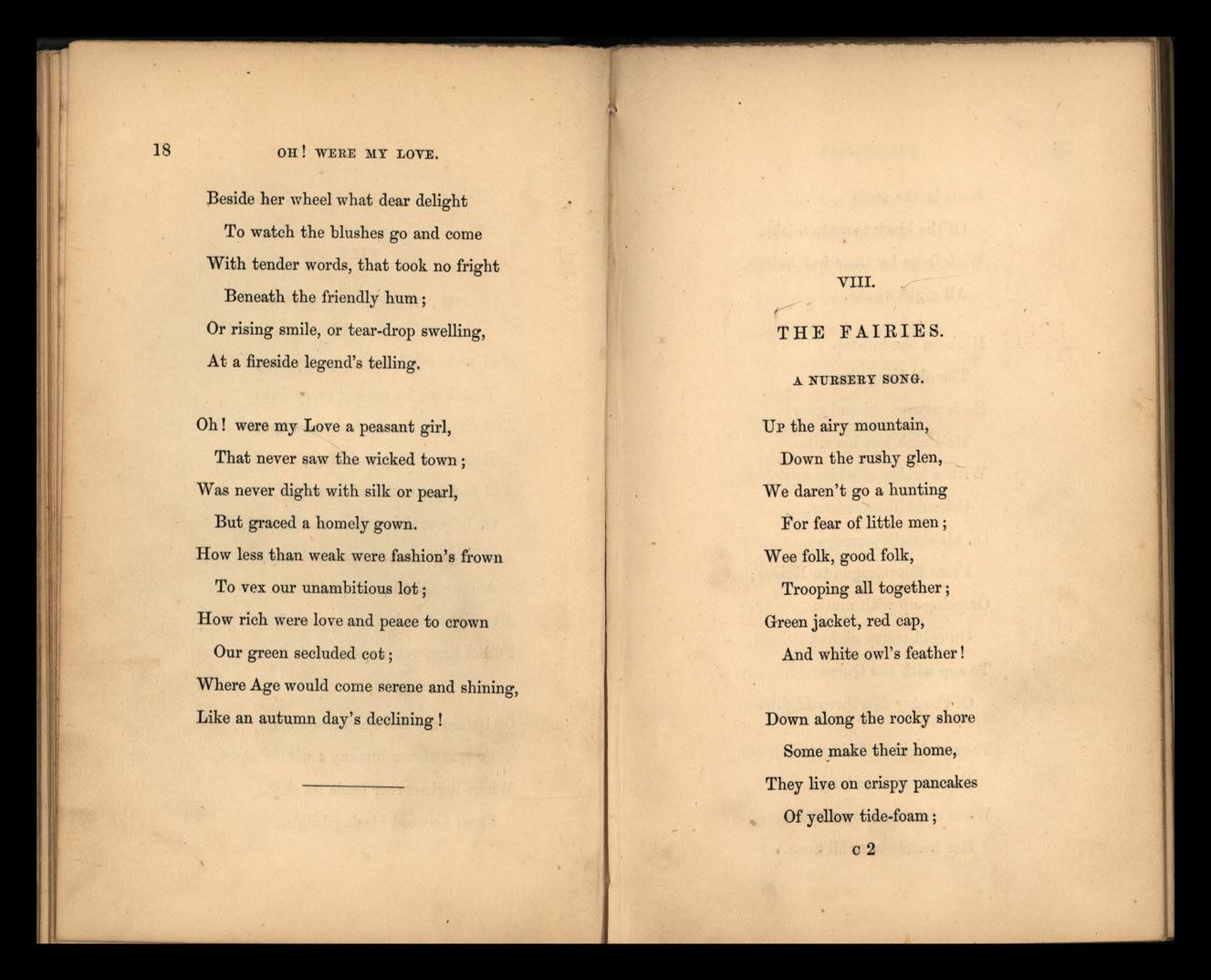
OH! WERE MY LOVE.
Beside her wheel what dear delight
To watch the blushes go and come With tender words, that took no fright
Beneath the friendly hum;
Or rising smile, or tear-drop swelling,
At a fireside legend's telling.
Oh! were my Love a peasant girl,
That never saw the wicked town; Was never dight with silk or pearl,
But graced a homely gown.
How less than weak were fashion's frown
To vex our unambitious lot;
How rich were love and peace to crown
Our green secluded cot;
Where Age would come serene and shining,
Like an autumn day's declining!
VIII.
THE FAIRIES.
A. NURSERY SONG.
Up the airy mountain,
Down the rushy glen,
We daren't go a hunting
For fear of little men;
Wee folk, good folk, Trooping all together; Green jacket, red cap, And white owl's feather!
Down along the rocky shore
Some .make their home, They live on crispy pancakes
Of yellow tide-foam; 02
Some in the reeds
Of the black mountain-lake,
With frogs for their watch-dogs,

They took her lightly back,
Between the night and morrow,
They thought that she was fast asleep, All night awake.
But she was dead with sorrow.
High on the hill-top
The old King sits;
He is now so old and grey
He's nigh lost his wits.
With a bridge of white mist
Columbkill he crosses,
On his stately journeys
From Slieveleague to Rosses;
Or going up with music
On cold starry nights,
To sup with the Queen
Of the gay Northern Lights.
They stole little Bridget
For seven years long;
\Vhen she came down again •
Her friends were all gone.
They have kept her ever since
Deep within the lakes,
On a bed of flag-leaves,
Watching till she wakes.
By the craggy hill-side,
Through the mos es bare,
They have planted thorn-trees
For pleasure here and there.
Is any man 0 daring
To dig one up in spite,
He shall find the thornies set
In his bed at night.
Up the airy mountain,
Down the rushy glen,
We daren't go a hunting
For fear of little men;
TIlE FAIRIES.
Wee folk, good folk, Trooping all together j
Green jacket, red cap,
And white owl's feather! IX.
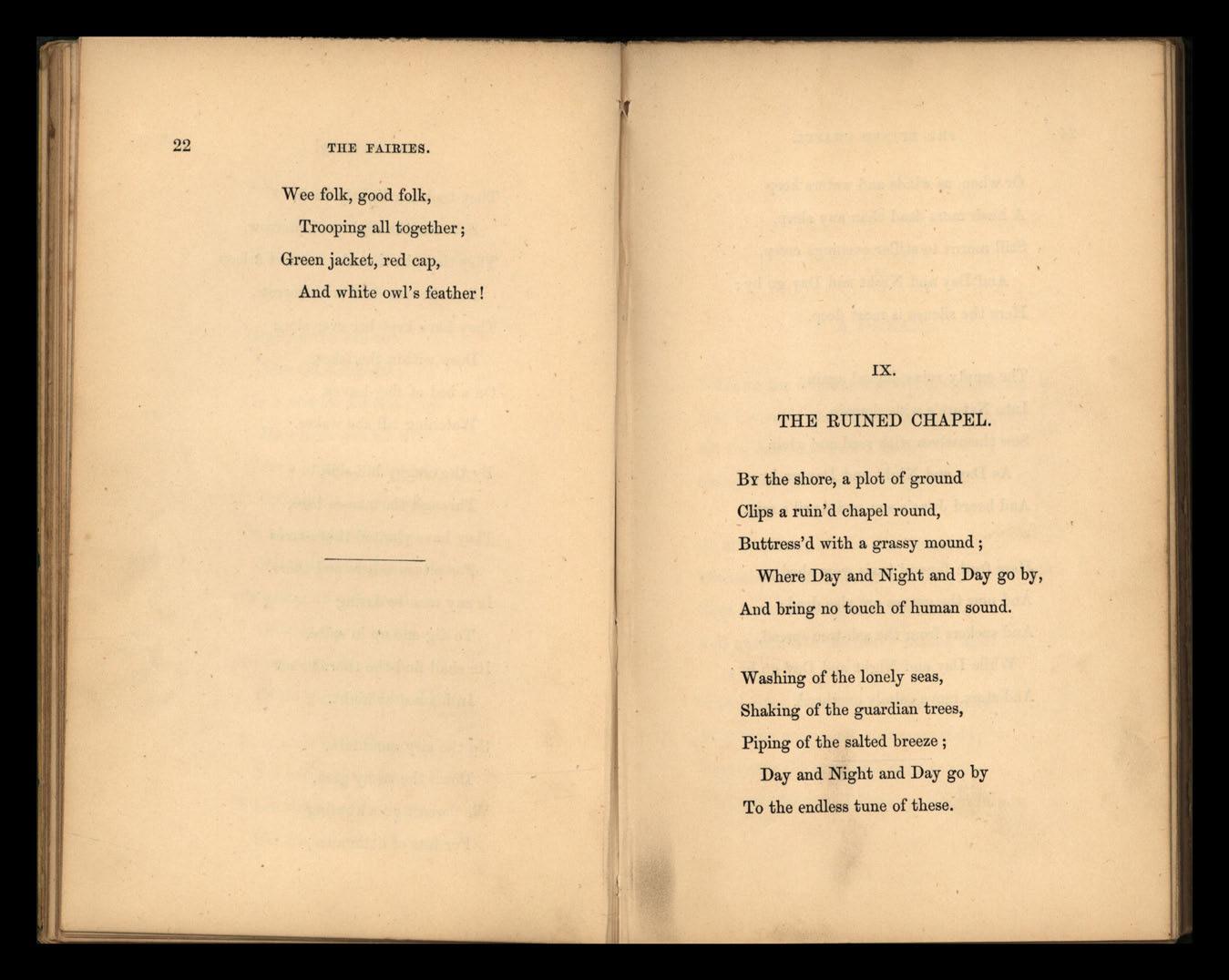
By the shore, a plot of ground
Clips a ruin'd chapel round,
Buttress'd with a grassy mound j
Where Day and Night and Day go by,
And bring no touch of human sound .
. Washing of the lonely seas,
Shaking of the guardian trees,
Piping of the salted breeze j
Day and Night and Day go by
To the endless tune of these.
THE RUINED CHAPEL.
Or when, as winds and waters keep
A hush more dead than any sleep,
Still morns to stiller evenings creep, And Day and Night and Day go by;
Here the silence is most deep.
The empty ruins, lapsed again
Into Nature's wide domain,
Sow themselves with seed and grain
As Day and Night and Day go by ;
And hoard June's sun and April's raj.u.
Here fresh funeral tears were shed;
And now the graves are also dead;
And suckers from the ash-tree spread,
While Day and Night and Day go by;
And stars move calmly overhead. x A DH.EAM.
I HEA.RD the dogs howl in the moonlight night,
And I went to the window to see the sight;
All the dead that ever I knew
Going one by one and two by two.
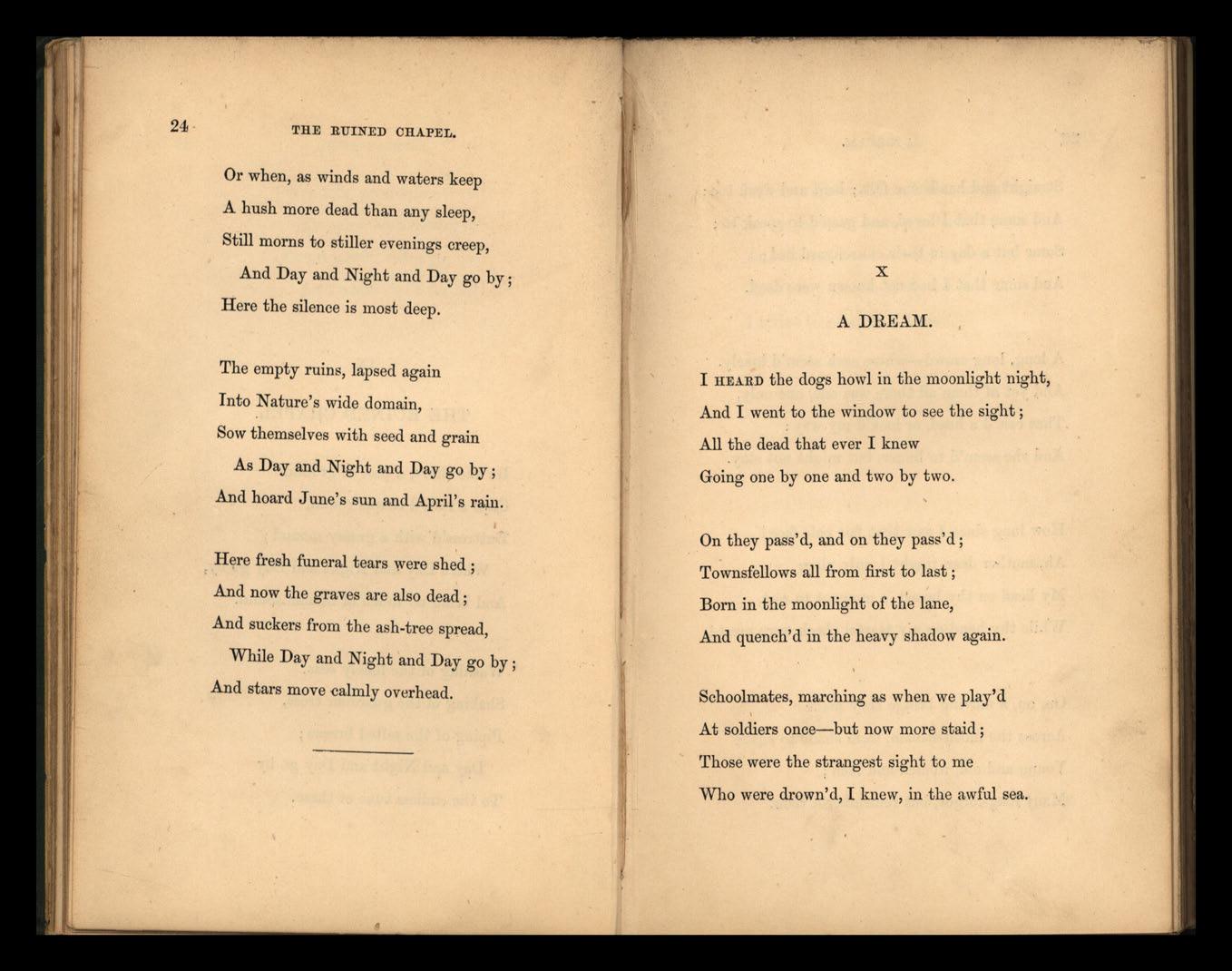
On they pass'd, and on they pass'd ;
Townsfellows all from first to last;
Born in the moonlight of the lane,
And quench'd in the heavy shadow again.
Schoolmates, marching as when we play'd
At soldiers once-but now more staid;
Those were the strangest sight to me
Who were drown'd, I knew, in the awful sea.
A DltEAM.
Straight and handsome folk; bent and weak too;
And some that I loved, and gasp'd to speak to;
Some but a day in their churchyard bed;
And some that I had not known were dead.
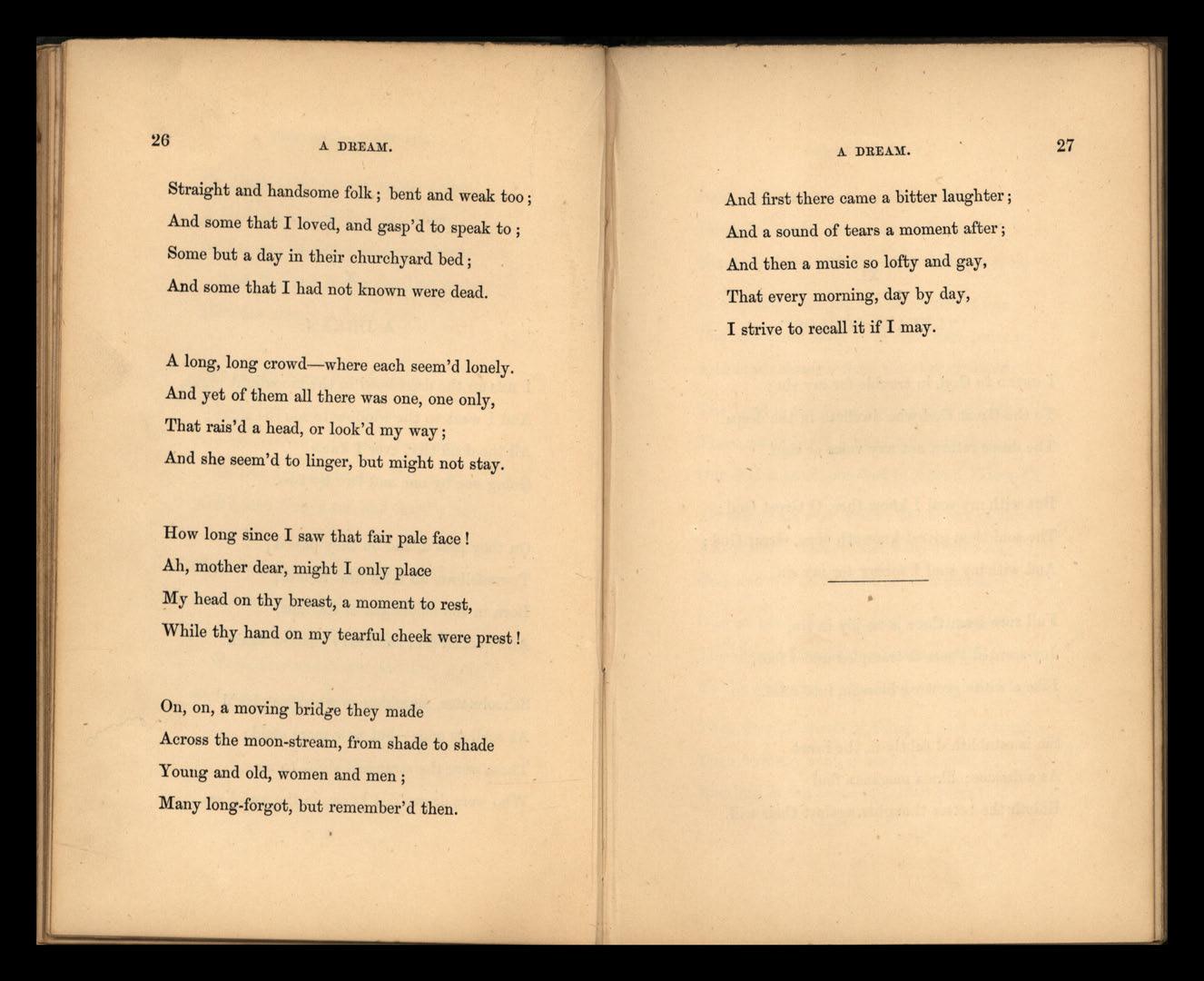
A long, long crowd-where each seem'd lonely.
And yet of them all there was one, one only,
That rais'd a head, or look'd my way;
And she seem'd to linger, but might not stay.
How long since I saw that fair pale face!
Ah, mother dear, might I only place
My head on thy breast, a moment to rest,
While thy hand on my tearful cheek were prest !
On, on, a moving bridg-e they made
Across the moon-stream, from shade to shade
Young and old, women and men;
Many long-forgot, but remember'd then. A DREAM.
And first there came a bitter laughter; And a sound of tears a moment after;
And then a music so lofty and gay, 'rhat every morning, day by day, I strive to recall it if I may.
XI.
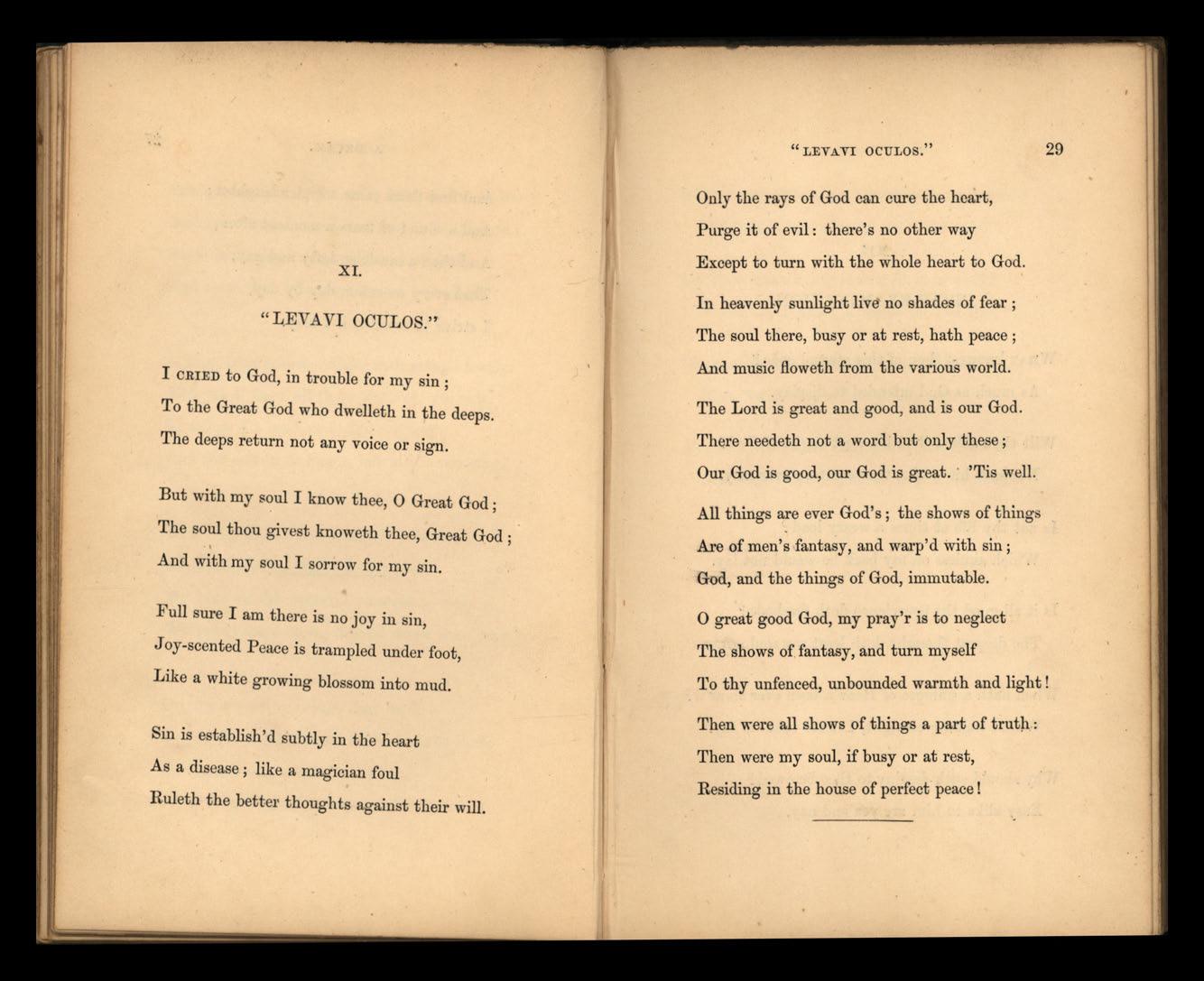
I CRIED to God, in trouble for my sin;
To the Great God who dwelleth in the deeps.
The deeps return not any voice 01' sign.
But with my soul I know thee, 0 Great God. ,
The soul thou givest knoweth thee, Great God;
And with my soul I sorrow for my sin.
Full Sure I am there is no joy in sin,
Joy-scented Peace is trampled under foot,
Like a white growing blossom into mud.
Sin is establish'd subtly in the heart
As a disease; like a magician foul
Ruleth the better thoughts against their will.
Only the rays of God can cure the hcart,
Purge it of evil: there's no other way
Except to turn with the whole heart to God.
In heaveru.y sunlight live no shades of fear;
The soul there, busy or at rest, hath peace;
And music floweth from the variouS world.
The Lord is great and good, and is our God.
Tlwre needeth not a word but only these;
Our God is good, our God is great . . 'Tis well.
All things are ever God's; the shows of things
Are of men's fantasy, and warp'd with sin ;
God, and the things of God, immutable.
o great good God, my pray'r is to neglect
The shows of fantasy, and turn myself
'1'0 thy unfenced, unbounded warmth and light!
Then were all shows of things a part of truth:
Then were my soul, if busy or at rest,
Residing in the house of perfect peace!
Why shouldst thou reach it by so mean a road?
Ask that of him who set us in the way. XII.
Art thou more liv,ing than a finch or toad ?

CROSS-EXAMINATION.
WHAT knowest thou of this eternal code?
As much as God intended to display.
Wilt thou affirm thou knowest aught of God?
Nor save his works, that creature ever may.
Is not thy life at times a weary load ?
Which aimless on my back he would not lay.
Is it all good thy conscience doth forebode?
The deepest thought doth least my soul affray.
When hath a glimpse of Heav'n been ever show'd ?
Whilst walking straight, I never miss its ray.
Why should such destiny to thee be owed?
Easy alike to him are yea and nay.
Is soul sheer wal'te, if we be such as they?
Thou never wilt prevail to loose the node.
If so, 'twere loss of labour to essay.
Nor to uproot these doubts so thickly sow'd.
Nor thou these deeplier-rooted hopes to slay.

IN a grove I saw one day
A flight of Cupids all at play, Flitting bird-like through the air, Or alighting here and there, Making every bough rejoice
With a most celestial voice, Or amongst the blossoms found Rolling on the swarded ground.
Some there were with wings of blue, Other some, of rosy hue,
Here, one plumed with purest white, There, as dyed in golden light;
Crimson some, and some I saw
Colour'd like a gay macaw.
Many were the Queen of Beauty's-
Many bound to other duties. n.
A band of fowlers next I spied, Spreading nets on every side, Watching long, by skill or hap Fleeting Cupids to entrap.
But if one at length was ta'en,
After mickle time and pain, Whether golden one or blue, Piebald, or of rosy hue, When they put him in their cage
He grew mea",<7fe as with age, Plumage rumpled, colour coarse, Voice unfrequent, sad, and hoarse; And little pleasure had they in him
Who had spent the day to win him.
XIV.
LOVELY MARY DONNELLY.
(To an Irish Twne.)
OH, lovely Mary DonneIly, it's you I love the best!
If fifty girls were round you I'd hardly see the rest.
Be what it may the time of day, the place be where it will,
Sweet looks of Mary DonneIly, they bloom before me still.
Her eyes like mountain water that's flowing on a rock,
How clear they are, how dark they are! and they give me many a shock :
Red rowans warm in sunshine and wetted with a show'r,
Could ne'er express the charming lip that has me in its pow'r.
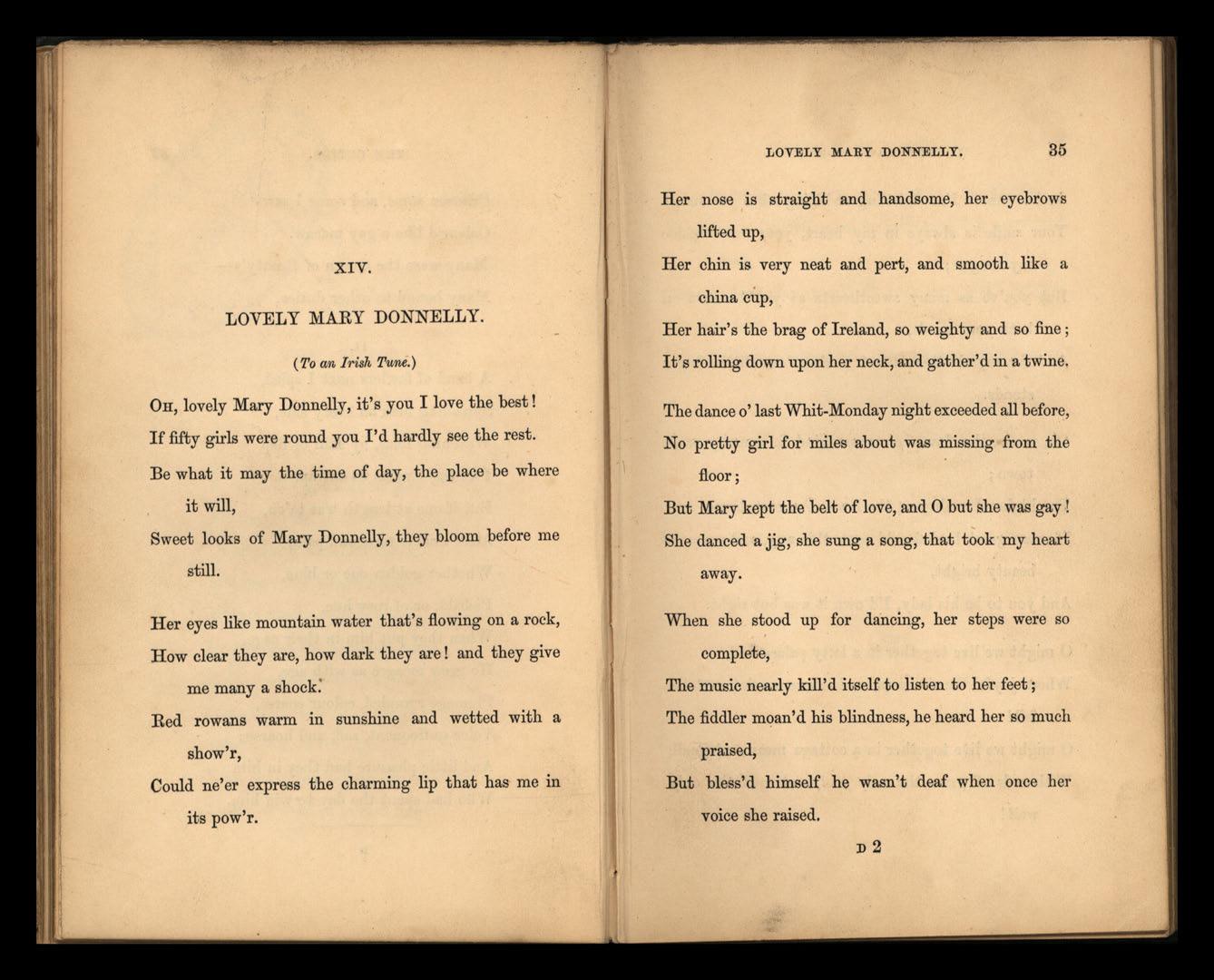
LOVELY MARY DONNELLY. 35
Her nose is straight and handsome, her eyebrows lifted up,
Her chin is very neat and pert, and smooth like a china cup,
Her hair's the brag of Ireland, so weighty and so fine;
It's rolling down upon her neck, and gather'd in a twine.
The dance 0' last Whit-Monday night exceeded all before,
No pretty girl for miles about was missing from the floor;
But Mary kept the belt of love, and 0 but she was gay!
She danced a jig, she sung a song, that took my heart away.
When she stood up for dancing, her steps were so complete,
The music nearly kiIl'd itself to listen to her feet j
The fiddler moan'd his blindness, he heard her so much praised,
But bless'd himself he wasn't deaf when once her voice she raised.
36
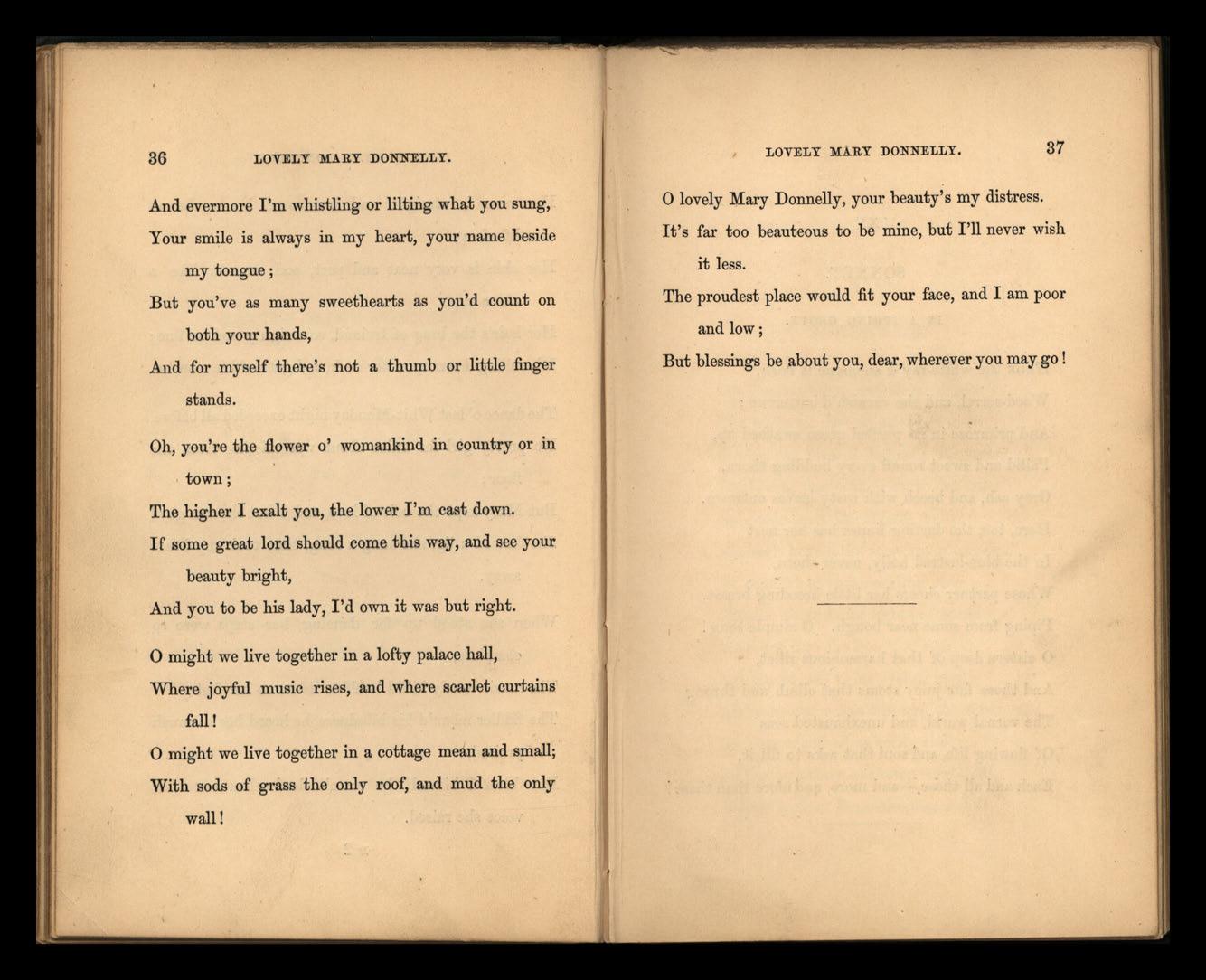
LOVELY MARY DONNELLY.
And evermore I'm whistling or lilting what you sung, Your smile is always in my heart, your name beside my tongue;
But you've as many sweethearts as you'd count on both your hands,
And for myself there's not a thumb or little finger stands.
Oh, you're the flower 0' womankind in country or in town;
The higher I exalt you, the lower I'm cast down. If some great lord should come this way, and see your beauty bright,
And you to be his lady, I'd own it was but right.
o might we live together in a lofty palace hall, Where joyful music rises, and where scarlet curtains fall !
o might we live together in a cottage mean and small; With sods of grass the only roof, and mud the only wall!
LOVELY
MARY DONNELLY. 37
o lovely Mary Donnelly, your beauty's my distress. It's far too beauteous to be mine, but I'll never wish it less.
The proudest place would fit your face, and I am poor and low;
But blessings be about you, dear, wherever you may go !
xv.
IN A SPRING GROVE.
HERE the white-ray'd anemone is born, Wood-sorrel, and the varnish'd buttercup;
And primrose in its purfled green swathed up,
Pallid and sweet round every budding thorn,
Grey ash, and beech with rusty leaves outworn.
Here, too, the darting linnet has her nest
In the blue-lustred holly, never shorn,
Whose partner cheers her little brooding breast,
Piping from some near bough. 0 simple song!
o cistern deep of that harmonious rillet,
And these fair juicy stems that climb and throng
The vernal world, and unexhausted seaR
Of flowing life, and soul that asks to fill it ,
Each and all these,-and more, and more than these!

OH, hearing sleep, and sleeping hear,
The while we dare to call thee dear,
So may thy dreams be good, although
The loving power thou canst not know!
As music parts the silence, 10 !
Through heav'n the stars begin to peep,
To comfort us that darkling pine
Because those fairer lights of thine
Have set into the Sea of Sleep.
Yet closed still thine eyelids keep;
And may our voices through the sphere
Of Dreamland all as softly rise
As through these shadowy rural dells,
Where bashful Echo sleeping dwells,
SERENADE.
And touch thy spirit to as soft replies.
And peace from gentle guardian skies,
Till watches of the dark be worn,
Surround thy bed,-and joyous morn
Makes all the chamber rosy bright!
Good-night !-From far-ofi' fields is borne
The drowsy Echo's faint" Good-night,"-
Good-night! Good-night!
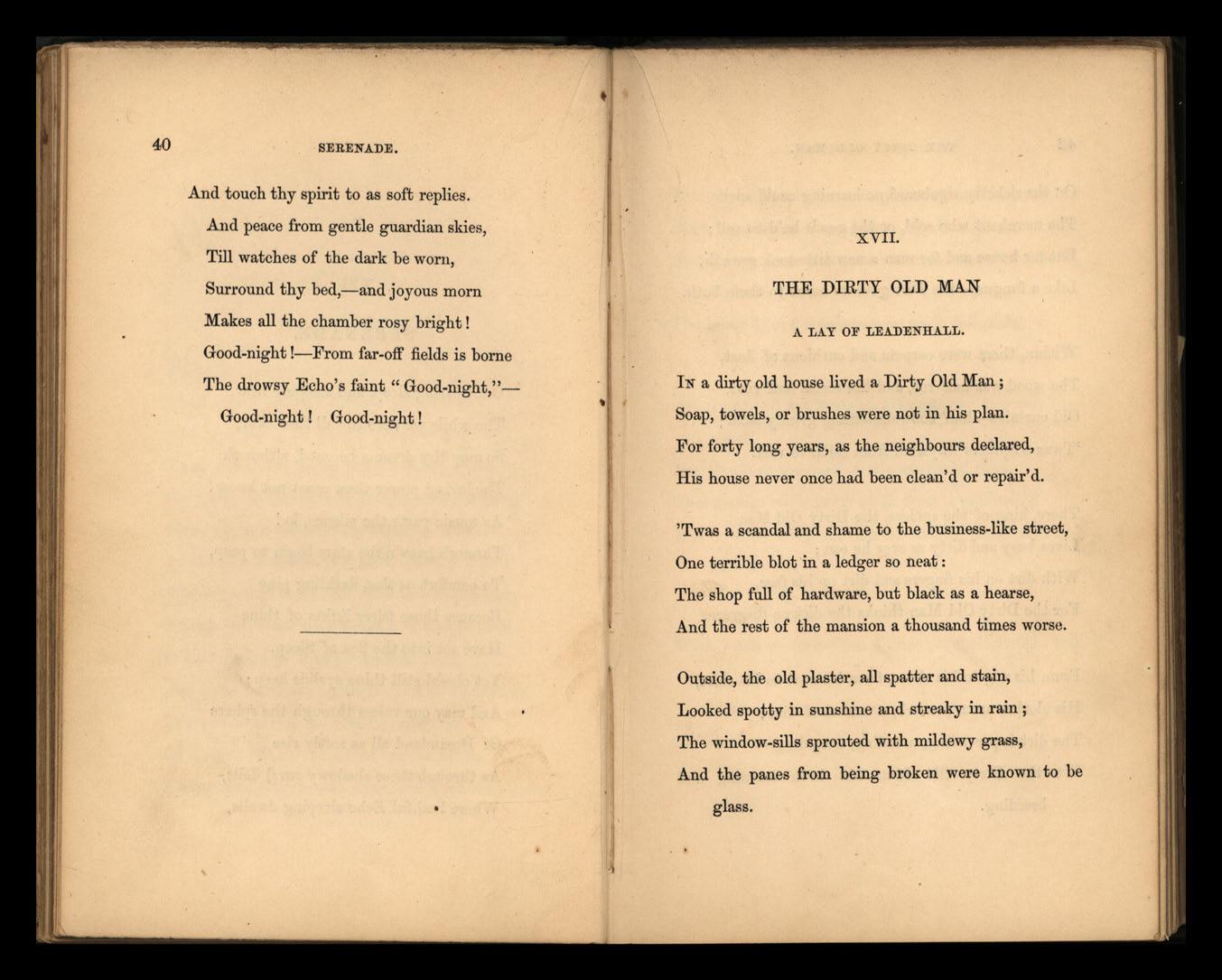
XVII.
A LAY OF LEADENHALL.
IN a dirty old house lived a Dirty Old Man ;
Soap, towels, or brushes were not in his plan.
For forty long years, as the neighbours declared,
His house never once had been clean'd or repair'd.
'Twas a scandal and shame to the business-like street,
One terrible blot in a ledger so neat:
The shop full of hardware, but black as a hearse,
And the rest of the mansion a thousand times worse.
Outside, the old plaster, all spatter and stain,
Looked spotty in sunshine and streaky in rain;
The window-sills sprouted with mildewy grass,
And the panes from being broken were known to be glass.
43
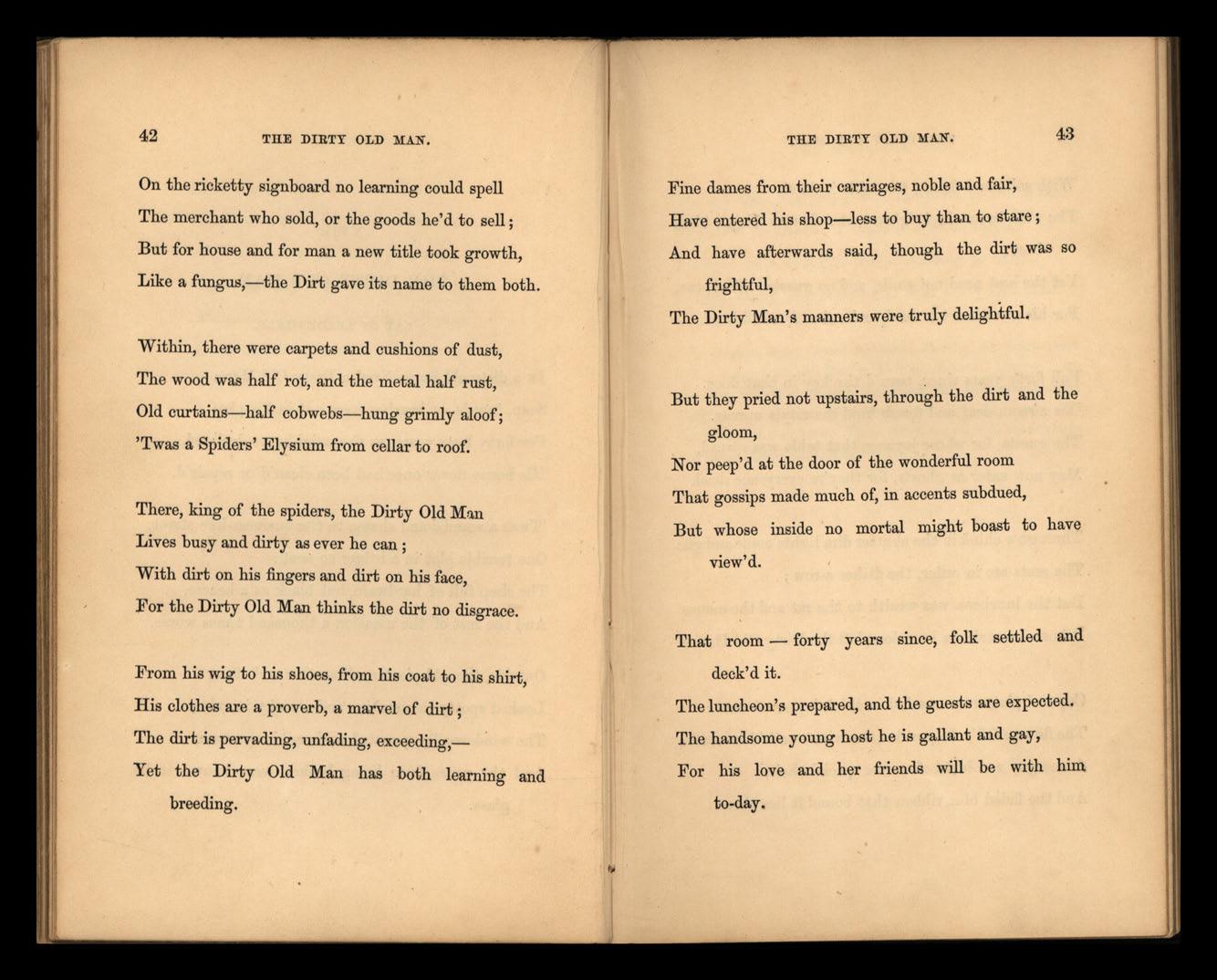
On the ricketty signboard no learning could spell
The merchant who sold, or the goods he'd to sell;
But for house and for man a new title took growth,
Like a fungus,-the Dirt gave its name to them both.
Within, there were carpets and cushions of dust,
The wood was half rot, and the metal half rust,
Old curtains-half cobwebs-hung grimly aloof;
'Twas a Spiders' Elysium from cellar to roof.
There, king of the spiders, the Dirty Old Mf.l.Il
Lives busy and dirty as ever he can;
With dirt on his fingers and dirt on his face,
For the Dirty Old Man thinks the dirt no disgrace.
From his wig to his shoes, from his coat to his shirt
His clothes are a proverb, a marvel of dirt;
The dirt is pervading, unfading, exceeding,,
Yet the Dirty Old Man has both learning and breeding. THE DIRTY OLD MAN.
Fine dames from their carriages, noble and fair,
Have entered his shop-less to buy than to stare;
And have afterwards said, though the dirt was so frightful,
The Dirty Man's manners were truly delightful.
But they pried not upstairs, through the dirt and the gloom,
Nor peep'd at the door of the wonderful room
That gossips made much of, in accents subdued,
But whose inside no mortal might boast to have view'd.
That room - forty years since, folk settled and deck'd it.
The luncheon's prepared, and the guests are expected.
The handsome young host he is gallant and gay,
For his love and her friends will be with him to-day.
THE DIRTY OLD MAN.
With solid and dainty the table is drest,
The wine beams its brightest, the flowers bloom their best j
Yet the host need not smile, and no guests will appear,
For his sweetheart is dead, as he shortly shall hear.
Full forty years since, turn'd the key in that door.
'Tis a room deaf aud dumb 'mid the city's uproar.
The guests, for whose joyance that table was spread,
May now enter as ghosts, for they're everyone dead . .
Through a chink in the shutter dim lights come and go j
The seats are in order, the dishes a-row j
But the hmcheon was wealth to the rat and the mouse
Whose descendants have long left the Dirty Old House.

Cup and platter are mask'd in thick layers of dust j
The flowers fall'n to powder, the wine swath'd in crust j
A nosegay was laid before one special chair,
And the faded blue ribbon that bound it lies there.
THE DIRTY OLD MAN.
The old man bas play'd out his parts in the scene.
Wherever he now is, I hope he's more clean.
Yet give we a thought free of scoffing or ban
To that Dirty Old House and that Dirty Old Man.
[A singular man, named Nathaniel Bentley, for many years k t a large hardware shop in Lea.denhall-street, London. He ep k Dirty Dick (Dick for alliteration's sake, was best nown as , probably), and his place of business as the Dirty ,:arehouse. He h 1809 These verses accord WIth the accounts died about t e year . respecting himself and his house.]
XVIII.
THE BRIGHT LITTLE GIRL.
(To an IN" Twne.)
HER blue eyes they beam and they twinkle,
Her lips have made smiling more fair ;
On cheek and on brow there's no wrinkle,
But thousands of curls in her hair.
She's little,-you don't wish her taller;
Just half through the teens is her age j
And ba.by or lady to call her,
Were something to puzzle a sage!
Her walk is far better than dancing j
She speaks as another might sing j
And all by an innocent chancing,
Like lambkins and birds in the spring.

Unskill'd in the airs of the city,
She's perfect in natural grace j
She's gentle, and truthful, and witty,
And ne'er spends a thought on her face.
Her face, with the fine glow that's in it,
As fresh as an apple-tree bloom-
And O! when she comes, in a minute,
Like sunbeams she brightens the room.
As taking in mind as in feature,
How many will sigh for her sake!
-I wonder, the sweet little creature,
What sort of a wife she would make.
XIX.
THE WAYSIDE WELL.
o TllOU pretty Wayside Well,
Wreath'd about with roses!
Where, beguiled with soothing sptlll,
Weary foot reposes.
With a welcome fresh and green
Wave thy border grasses,
By the dusty traveller seen, Sighing as he passes.
Cup of no Circean bliss, Charity of summer,
Making happy with a kiss
Every meanest comer !

THE WAYSIDE WELL.
Morning, too, and eventide,
Without stint or measure,
Cottage households near a.nd wide
Share thy liquid treasure.
Fa.ir the greeting face ascends,
Like a naiad daughter,
When the pea ant lassie bends
To thy trembling water.
When a laddie brings her pail
Down the twilight meadow,
Tender falls the whisper'd tale,
Soft the double shadow!
Clear as childhood in thy look,
Nature seems to pet thee; Fierce Jul,}' that drains the brook
Hath no power to fret thee.
Shelter'd cool and free from smirch
In thy cavelet shady,
O'er thee in a silver birch
Stoops a forest lady.
To thy glass the Star of Eve
Shyly dares to bend her;
Matron Moon thy depths receive,
Globed in mellow splendour.
Bounteous Spring! for ever own
Undisturb'd thy station;
Not to thirsty lips alone
Serving mild donation.
Never come the newt or frog,
Pebble thrown in malice,
Mud or wither'd leaves, to clog
Or defile thy chalice.
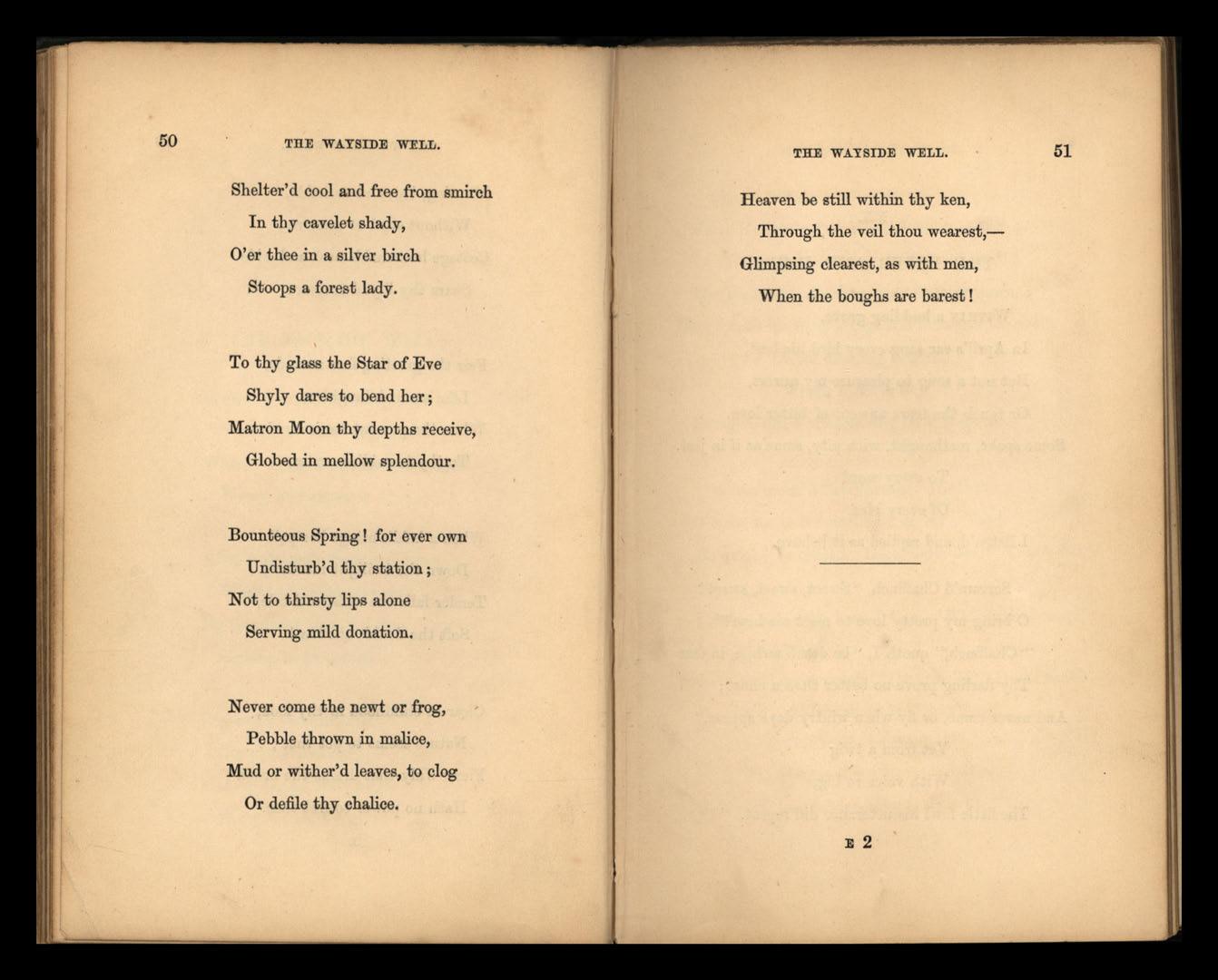
Heaven be still within thy ken,
Through the veil thou wearest,-
Glimpsing clearest, as with men,
When the boughs are barest!
xx.
WITIlIN a budding grove,
In April's ear sang every bird his best,
But not a song to pleasure my unre t,
Or touch the tears unwept of bitter love.
Some spake, methought, with pity, some as if in jest.
To every word
Of every bird
I listen'd, and replied as it behove.
Scream'd Chaffinch, "Sweet, sweet, weet!
o bring my pretty love to meet me here!"
"Chaffinch," quoth I, "be dumb awhile, in fear
Thy darling prove no better than a cheat;
And never come, or fly when wintry days appear."
Yet from a twig
With voice 80 big,
The little fowl his utterance did repeat.
Then I, "the man forlorn
Hears Earth send up a foolish noise aloft."
" And what'lllte do? what'lllte do!" scolf'd
The Blackbird, standing in an ancient thorn,
Then spread his sooty wings and flitted to the crOft,
With cackling laugh:
Whom I, being half
Enraged, call'd after, giving back his scorn.

Worse mock'd the ThrU8h," Die! die!
o could he do it? could he do it? Nay!
Be quick! be quick! Here, here, here!" (went his lay)
"Take heed! take heed!" then, "Why? why? why? why? why? "
See-ee now! ee-ee now!" (he drawl' d) " Back! back! back! R-r-r-run away!"
o Thr ush, be still!
Or, at thy will,
Seek some le sad interpreter than I!
THE LOVER A.ND BIRDS.
" Air, air! blue air and white!
Whither I flee, whither, 0 whither, 0 whither I flee !"
(Thus the Lark hurried, mounting from the lea)
"Hills, countries, many waters glittering bright, \Vhither I see, whither 1 ee! deeper, deeper, d('6per, whither I see, ee, see !"
Gay Lark, I said,
The song that's bred
In happy ne t may well to heav'n make flight.
"There's omething, something sad,
I h.a.lf remember"-piped a broken train.
Well sung, sweet Robin! Robin sung a.,aain,
"Spring's opening cheeAty , cheerily! be we glad !"
Which moved, I wist not why, me melancholy mad,
Till now, grown meek,
With wetted cheek,
Mo t comforting and gentle thoughts I had.
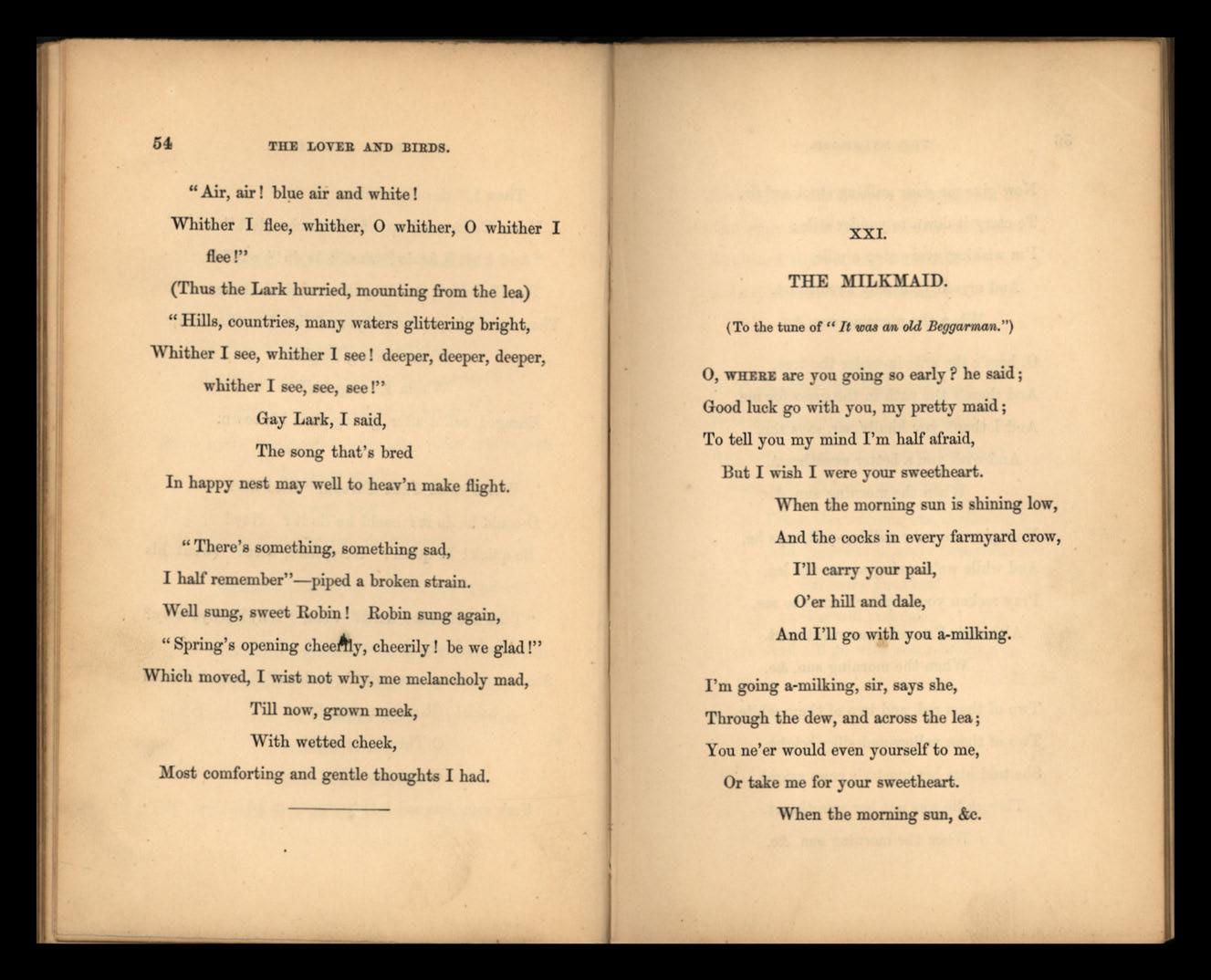
THE MILKMAID.
(To the tune of" It toal aft old Beggarman.")
0, WHEBE are you going 0 early? he aid;
Good luck go with you, my pretty maid;
To tell you my mind I'm half afraid,
But I wish I were your sweetheart.
When the morning un is biDing low,
And the cocks in every farmyard crow, 1'11 carry your pail, O'er hill and dale,
And I'll go with you a-milking.
I'm going a-milking, sir, ays she,
Through the dew, and acro the lea;
You ne'er would even yourself to me,
Or take me for your weetheart.
When the morning sun, &C.
THE MILKMAID.
Now give me your milking stool awhile,
To carry it down to yond er stile;
I'm wishing every st ep a mile,
And my self your only sw eetheart.
Wh en th e morning sun, &c.
0, here's th e stile in-under the tree,
And th ere' s th e p ath in th e gra ss for me,
And I thank you kindly, sir, says she,
And wish you a bett er sweetheart.
When the morning sun, &c.
Now give me your millcing-pail, says he,
And while we're going across the lea,
Pray reckon your mast er's cows to me,
Although I'm not your sweetheart.
When the morning sun, &c.
Two of th em red, and two of them whit e,
Two of them yellow and silky bright,
She told him h er master's cows aright.
Though he was not h er sweetheart.
When the morning sun, &c.

THE MILKMAID.
She sat and milk'd in the morning sun,
And when her milking was over and done,
She found him waiting, all as one
As if he were her sweetheart.
Wh en the morning sun, &c.
He freely offer'd his h eart and hand;
Now she has a farm at her command,
And cows of h er own to graze the land;
Success to all tru e sweethearts!
When the morning sun is shining low,
And the cock s in every farmyard crow,
I'll carry your pail
O'er hill and dale,
And I'll go with you a-milking.
XXII.
THE LIGHTHOUSE.
THE plunging storm flies fierce against the pane,
And thrills our cottage with redoubled shocks;
'fhe chimney mutters and the rafters strain ;
Without, the breakers roar along the rocks.
See, from our fire and taper-lighted room,
How savage, pitiless, and uncontroll'd
The grim horizon shows its tossing gloom
Of waves from unknown angry gulphs uproll'd;
Where, underneath that black portentous lid,
A long pale space between the night and sea
Gleams awful; while in deepest darkness hid
All other things in our despair agree.
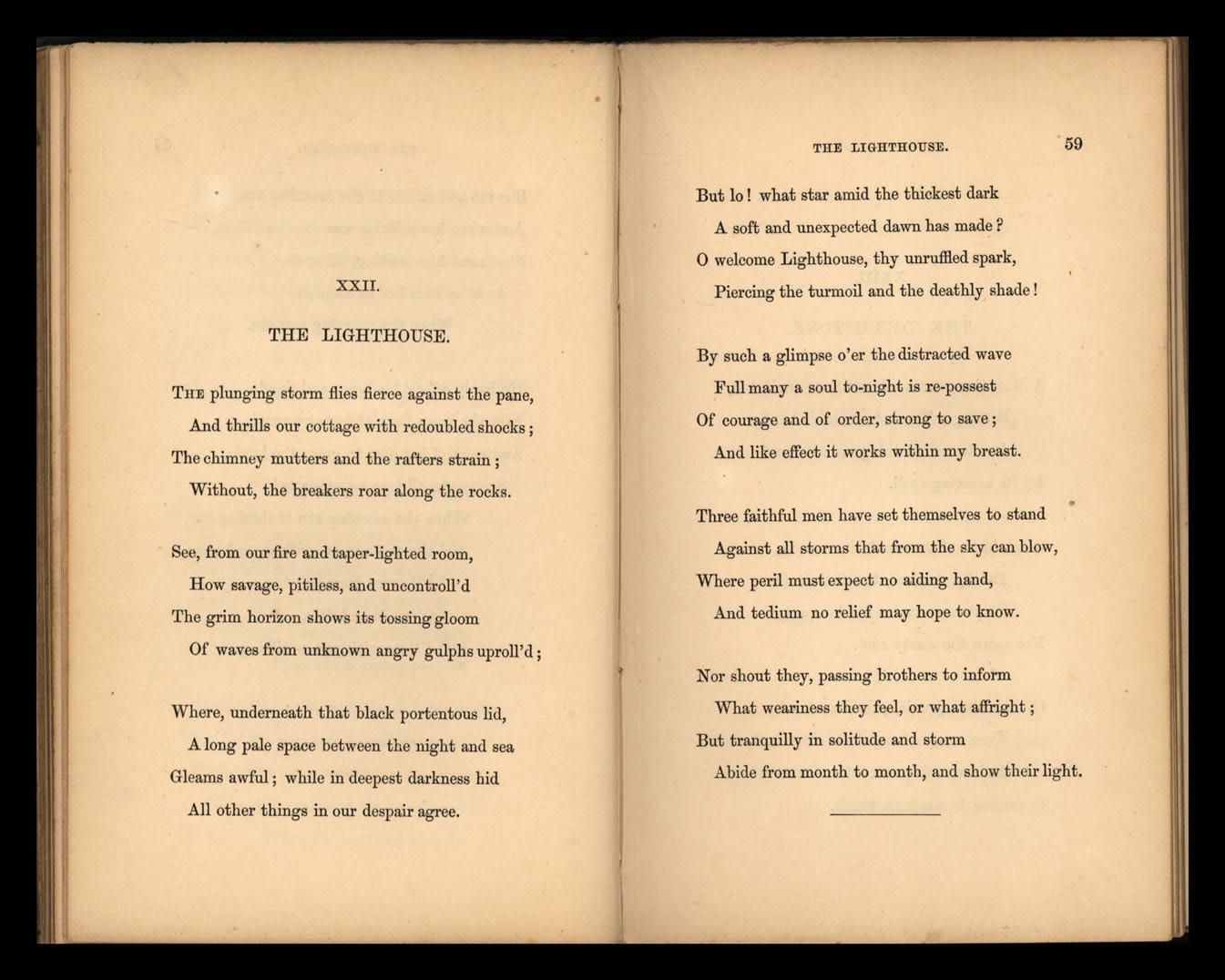
THE LIGHTHOUSE.
But lo! what star amid the thickest dark
A soft and unexpected dawn has made?
o welcome Lighthou se, thy unruffled spark,
Piercing the turmoil and the deathly shade!
By such a glimpse o'er the distracted wave
Full many a soul to-night is re-possest
Of courage and of order, strong to save;
And lik e effect it works within my breast.
Three faithful men have set themselves to stand
Against all storms that from the sky can blow,
Where peril must expect no aiding hand,
And tedium no relief may hope to know.
Nor shout they, passing brothers to inform
What weariness they feel, or what affright;
But tranquilly in solitude and storm
Abide from month to month, and show their light.
XXIII.
A MAN there came, whence none could tell,
Bearing a Touchstone in his hand j
And tested all things in the land By its unerring spell.
Quick birth of transmutation smote
The fair to foul, the foul to fair j
Purple nor ermine did he spare,
Nor scorn the dusty coat.

Of heir-loom jewels, prized so much, Were many changed to chips and clods, And even statues of the Gods
Crumbled beneath its touch.
THE TOUCHSTONE.
Then angrily the people cried,
" The loss outweighs the profit far j
Our goods suffice ns as they are;
We will not have them tried."
And since they could not so avail
To check his unrelenting quest, They seized him, saying-" Let him test How real is our jail!"
But, though they slew him with the sword, And in a fire his Touchstone burn'd, Its doings could not be o'erturn'd, Its undoings restored.
And when, to stop all future harm,
They strew'd its ashes on the breeze j
They little guess'd each grain of these
Convey'd the perfect charm.
XXIV.
.iEOLIAN HARP.
Is it all in vain ?
Strangely throbbing pain,
Trembling joy of memory !
Bygone things, how shadowy
Within their graves they lie!
Shall I sit then by their graves,
Listening to the melancholy waves?
I would fain.
But even these in vapours die: For nothing may remain.
One survivor in a boat
On the wide dim deep afloat,
When the sunken ship is gone, Lit by late stars before the dawn.
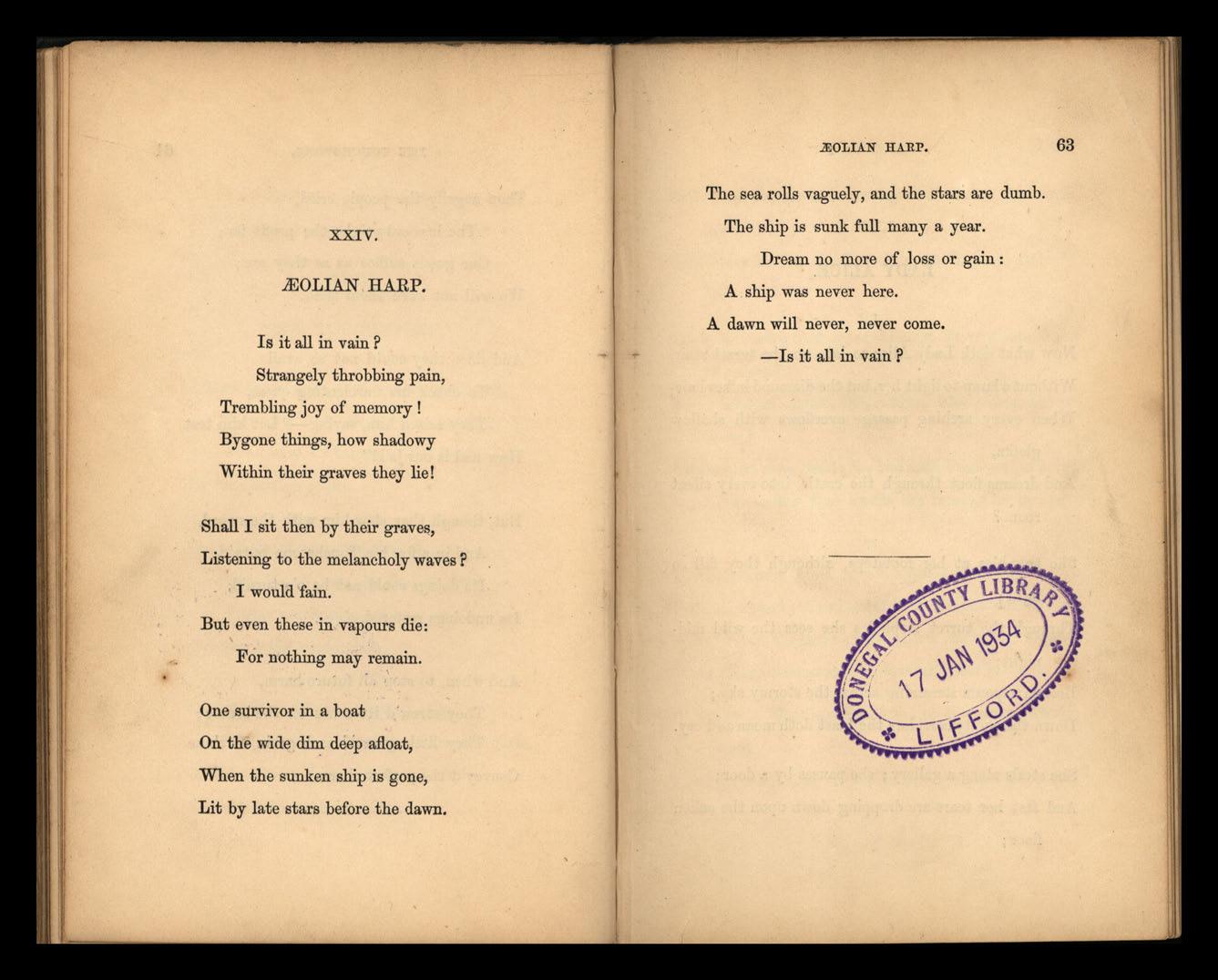
EOLIA.N HARP.
The sea rolls vaguely, and the stars are dumb .
The ship is sunk full many a year.
Dream no more of loss or gain:
A ship was never here.
A dawn will never, never come.
-Is it all in vain?
xxv
LADY ALICE.
Now what doth L ady Alice so late on the turret stair,
Without a lamp to li ght her, but the diamond in her hair. ,
Wh en every arching passage overflows with shallow gloom,
And dr eams float through the castle, into every silent room?
She trembles at her footsteps, although they fall so light;
'l'hrough the turret loopholes she sees the wild midnight ;
Broken vapours streaming across the stormy sky;
Down the empty corridors the blast doth moan and cry.
She steals along a gallery; she pauses by a door;
And fast h er tears are dropping down upon the oaken floor;
And thrice she seems returning-but thrice she turns again :-
Now heavy lie the cloud of sleep on that old father's brain !
Oh, well it were that never shouldst thou waken from thy sleep!
For wherefore should they waken, who waken but to weep?
No more, no more beside thy bed doth Peace a vigil keep,
But W oe,-a lion that awaits thy rousing for its leap.
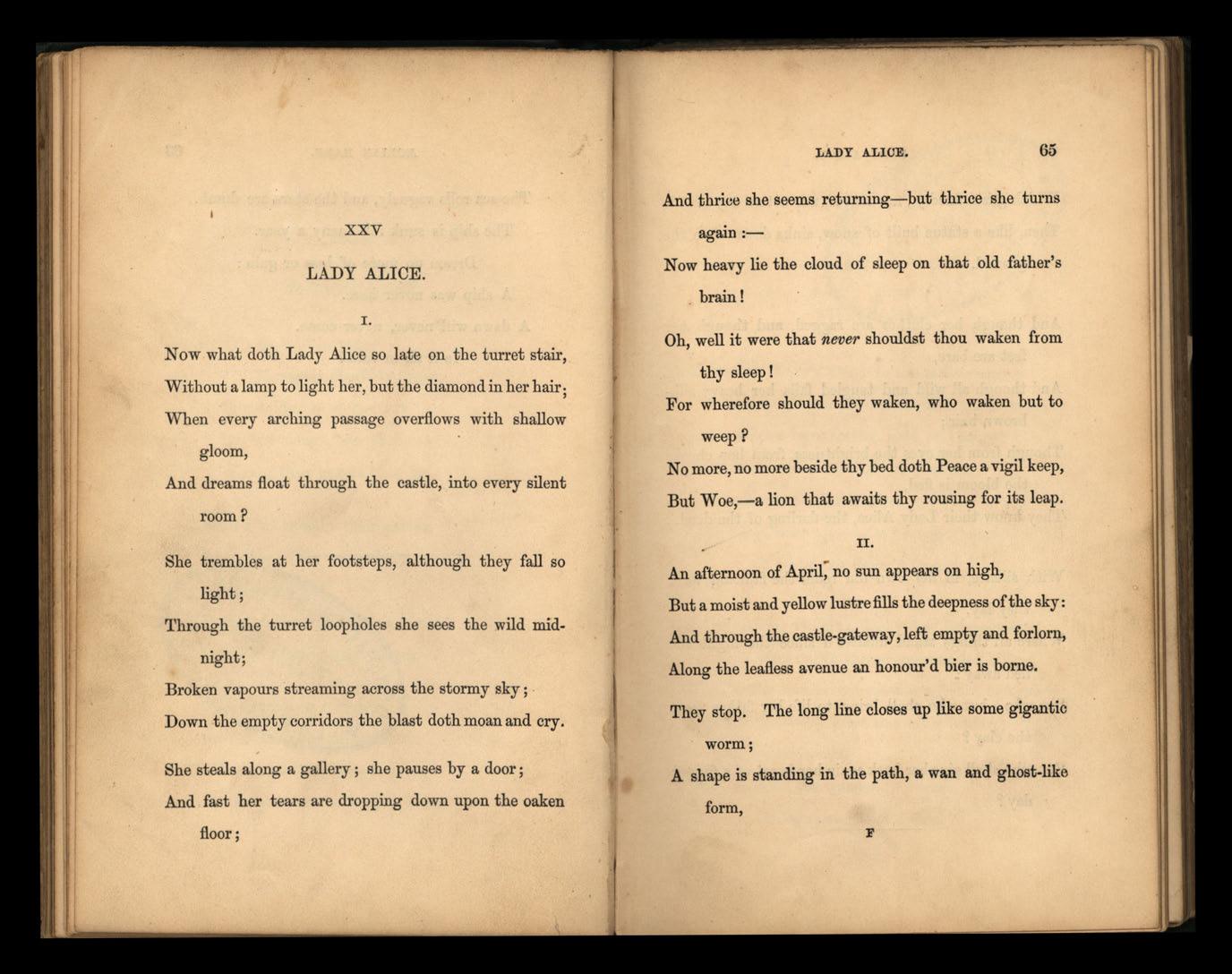
An afternoon of no sun appears on high,
But a moist and yellow lustre fills the deepness of the sky:
And through the castle-gateway, left empty and forlorn,
Along the leafless avenue an honour'd bier is borne.
They stop. The long line closes up like some gigantic worm;
A shape is standing in the path, a. wan and ghost-like form,
LADY ALICE.
Which gazes fixedly; nor moves, nor utters any sound;
Then, like a statue built of snow, sinks down upon the ground.
And though her clothes are ragged, and though her feet are bare,
And though all wild and tangled falls her heavy silkbrown hair;
Though from her eyes the brightness, from her cheeks the bloom is fled,
They know their Lady Alice, the darling of the dead.
With silence, in her own old room the fainting form they lay,
Where all things stand unalter'd since the night she fled away:
But who-but who shall bring to life her father from the clay?
But who shall give her back again her heart of a former day?
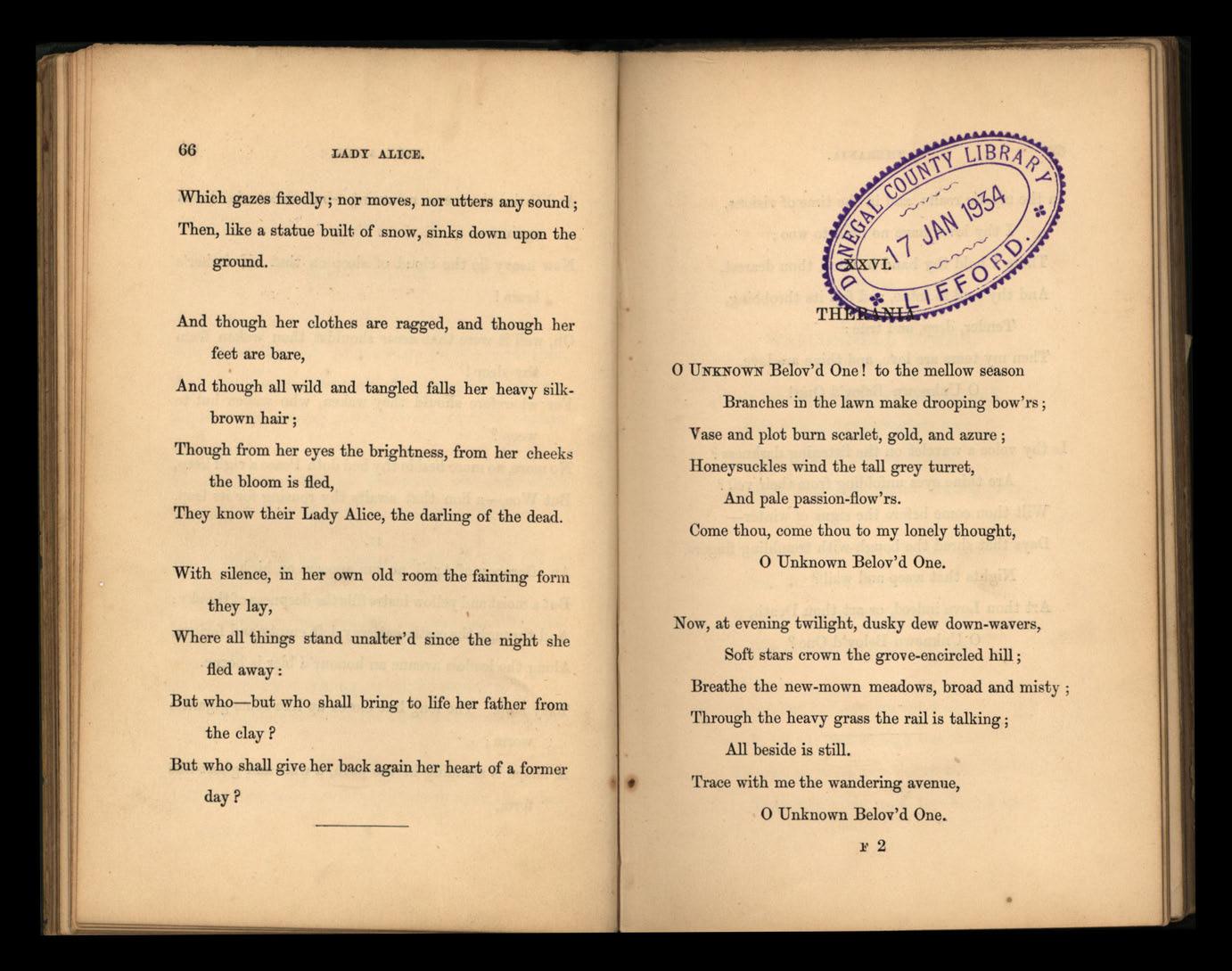
•
o UNKNOWN Belov'd One! to the mellow season
Branches in the lawn make drooping bow'rs;
Vase and plot burn scarlet, gold, and azure j
Honeysuckles wind the tall grey turret,
And pale passion-flow'rs.
Come thou, come thou to my lonely thought, o Unknown Belov'd One.
Now, at evening twilight, dusky dew down-wavers,
Soft stars crown the grove-encircled hill ;
Breathe the new-mown meadows, broad and misty; rrhrough the heavy grass the rail is talking;
All beside is still.
Trace with me the wandering avenue, o Unknown Belov'd One.
l' 2
THEltANIA.
In the mystic realm, and in the time of visions,
I thy lover have no need to WOO;
There I hold thy hand in mine, thou dearest,
And thy soul in mine, and feel its throbbing, Tender, deep, and true:
Then my tears are love, and thine are love,
o Unknown Belov'd One!
Is thy voice a wavelet on the listening darkness?
Axe thine eyes unfolding from their veil ?
Wilt thou come before the signs of winter-
Days that shred the bough with trembling fingers, Nights that weep and wail ?
AIt thou Love indeed, or art thou Death, o Unknown Belov'd One? , •
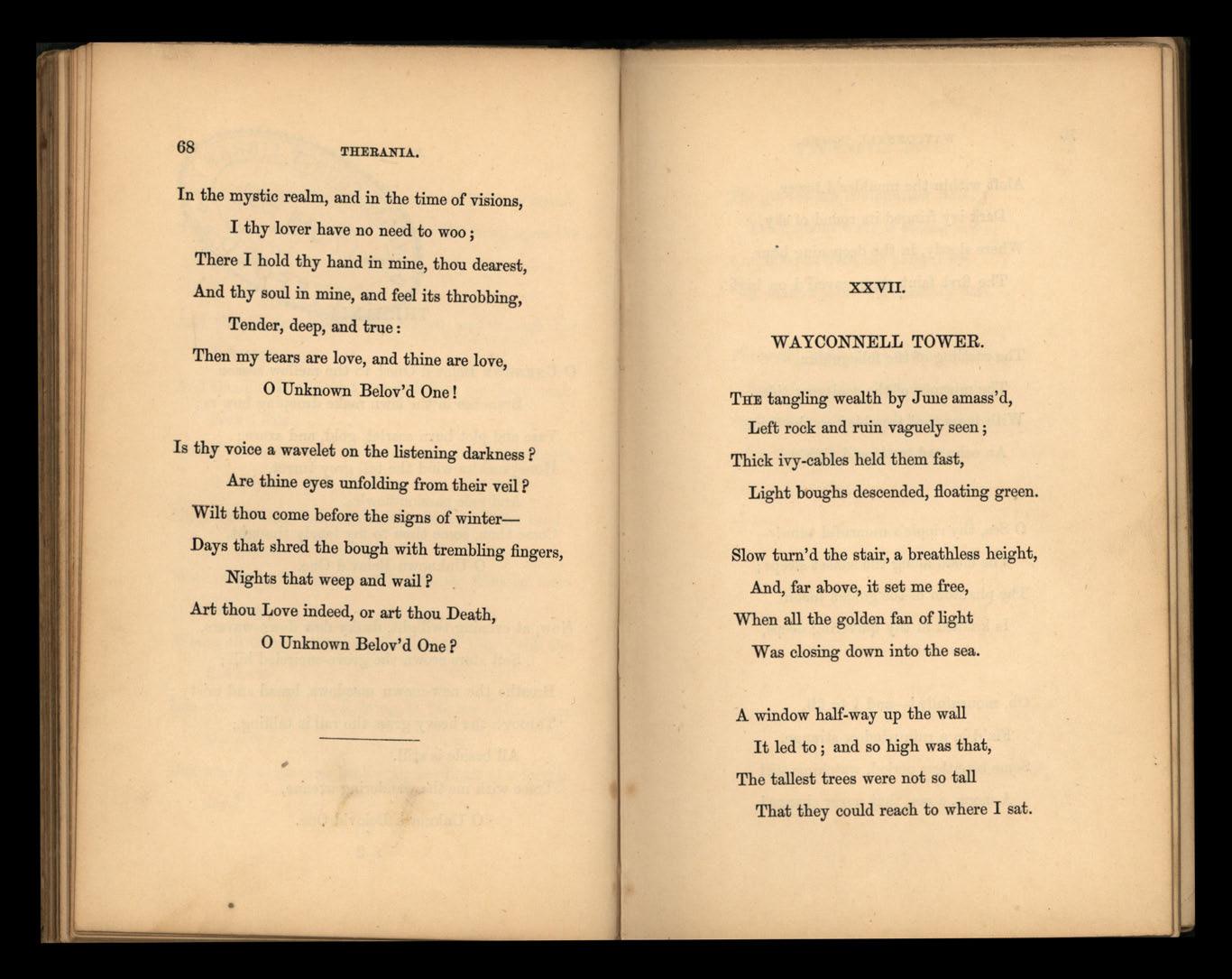
TIiE tangling wealth by JUlle amass'd,
Left rock and ruin vaguely seen;
Thick ivy-cables held them fast, Light boughs descended, floating green.
Slow turn'd the stair, a breathless height, And, far above, it set me free,
When all the golden fan of light
Was closing down into the sea.
A window half-way up the wall
It led to; and so high was that,
The tallest trees were not so tall
That they could reach to where I sat .
70 WAYCONNELL TOWER.
Aloft within the moulder'd tower,
Dark ivy fringed its round of sky, Where slowly, in the deepening hour,
The first faint stars unveil'd on high.
The rustling of the foliage dim,
The murmur of the cool grey tide,
With tears that trembled on the brim,
An echo sad to these I sigh'd.
o Sea, thy ripple's mournful tune !_
The cloud along the sunset sleeps j
The phantom of the golden moon
Is kindled in thy quivering deeps,
Oh, mournfully!-and I to fill,
Fix'd in a ruin-window strange,
Some countless period, watching still
A moon, a sea, that never change!

WAYCONNELL TOWER.
The guided orb is mounting slow j
The duteous wave is ebbing fast j
And now, as from the niche I go,
A shadow joins the shadowy past.
Farewell! dim ruins; tower and life; Sadly enrich the distant view!
And welcome, scenes of toil and strife;
To-morrow's sun arises new.
XXVIII.
A FAIR witch crept to a young man's side,
And he kiss'd her and took her for his bride.
But a Shape came in at the dead of night, And fill'd the room with snowy light.
And he saw how in his arms there lay
A thing more frightful than mouth may say.
And he rose in haste, and follow'd the Shape
Till morning crown'd an eastern cape.
And he girded himself and follow'd still,
When sunset sainted the western hill.
But, mocking and thwarting, clung to his side, Weary day !-the foul Witch·Bride.
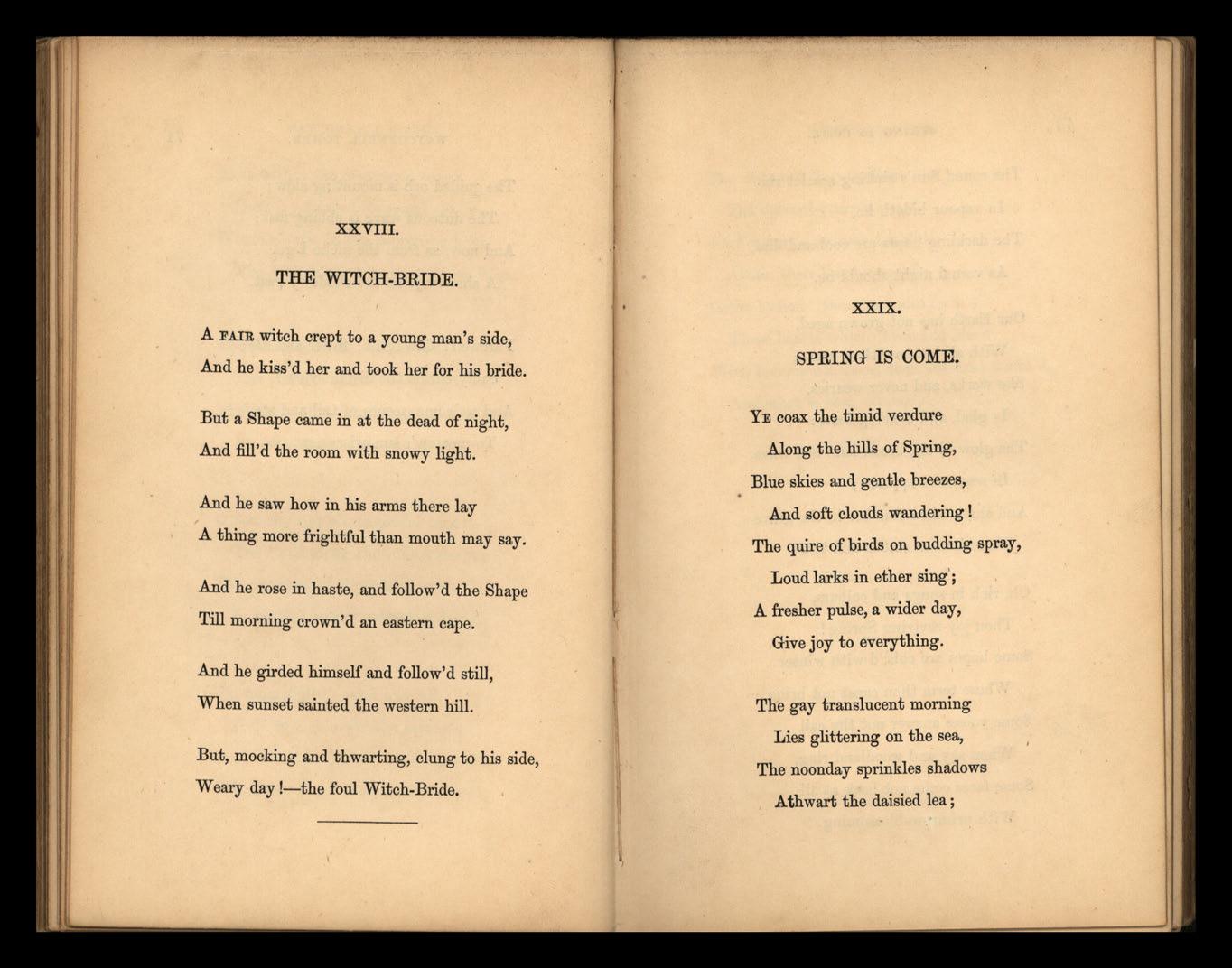
XXIX.
YE coax the timid verdure
Along the hills of Spring,
Blue skies and gentle breezes, And soft clouds wandering!
The quire of birds on budding spray, Loud larks in ether sing' ;
A fresher pulse, a wider day, Give joy to everything.
The gay translucent morning Lies glittering on the sea,
The noonday sprinkles shadows
Athwart the daisied lea;
SP.RLNG IS OOME.
The round Sun's sinking scarlet rim
In vapour hideth he,
The darkling hours are cool and dim,
As vernal night should be.
Our Earth has not grown aged,
With all her countless years; She works, and never wearies, Is glad, and nothing fears:
The glow of air, broad land and wave, In season re-appears;
And shall, when slumber in the grave
These human smiles and tears.
Oh, rich in songs and colours, Thou joy-reviving Spring!
Some hopes are chill'd with winter
Whose term thou canst not bring.
Some voices answer not thy call
When sky and woodland ring,
Some faces come not back at all
With primrose-blossoming.
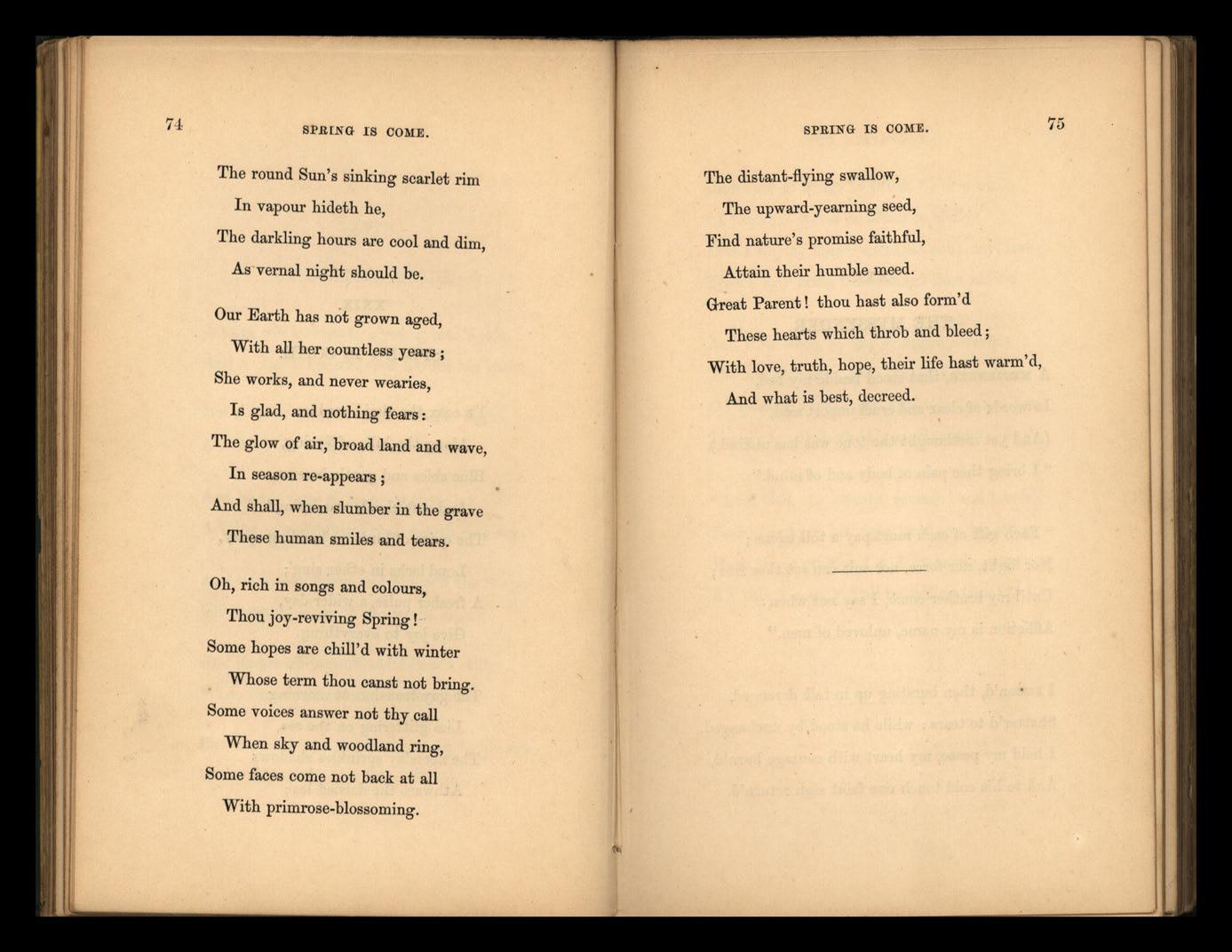
75
SPRING IS OOME.
The distant-flying swallow,
The upward-yearning seed, Find nature's promise faithful,
Attain their humble meed.
Great Parent! thou hast also form'd
These hearts which throb and bleed;
With love, truth, hope, their life hast warm'd,
And what is best, decreed.
xxx.
THE MESSENGER.
A MESSENGER, that stood beside my bed,
In words of clear and cruel import said,
(And yet methought the tone was less unkind,)
"I bring thee pain of body and of mind."
" Each gift of each must pay a toll to me ;
Nor flight, nor force, nor suit can set thee free· ,
Until my brother ·come, I say not when:
AfRiction is my name, unloved of men."
I swoon'd, then bursting up in talk deranged, Shatter'd to tears; while he stood by unchanged.
I held my peace, my heart with courage burn'd,
And to his cold touch one faint sigh return'd.
THE MESSENGER.
Undreamt-of wings he lifted, "For a while
"I vanish. Never be afraid to smile
Lest I waylay thee: curse me not; nay, love j
That I may bring thee tidings from above."
And often since, by day or night, descends
The face obdurate; now almost a friend's.
O! quite to Faith; but Frailty's lips not dare
The word. To both this angel taught a pray'r.
77
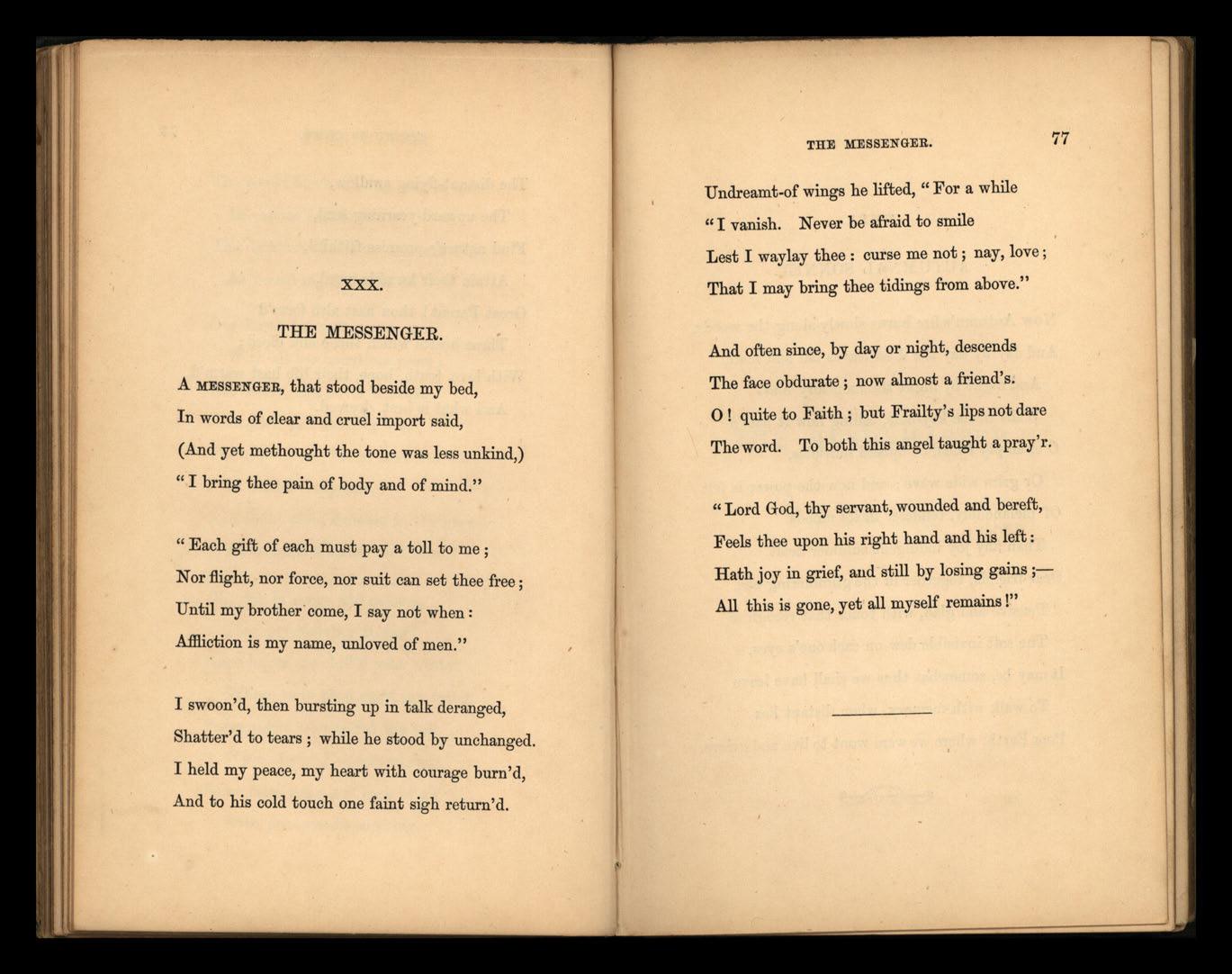
" Lord God, thy servant, wounded and bereft,
Feels thee upon his right hand and his left:
Hath joy in grief, alld still by losing gains j-
AIl this is gone, yet all myself remains!"
XXXI.
Now Autumn's fire burns slowly along the woods,
And day by day the dead leaves fall and melt,
And night by night the monitory blast
Wails in the key-hole, telling how it pass'd
O'er empty fields, or upland solitudes,
Or grim wide wave; and now the power is felt
Of melancholy, tenderer in its moods
Than any joy indulgent summer dealt.
Dear friends, together in the glimmering eve,
Pensive and glad, with tones that recognise
The soft invisible dew on each one's eyes,
It may be, somewhat thus we shall have leave
To walk with memory, when distant lies
Poor Earth, where we were wont to live and grieve.
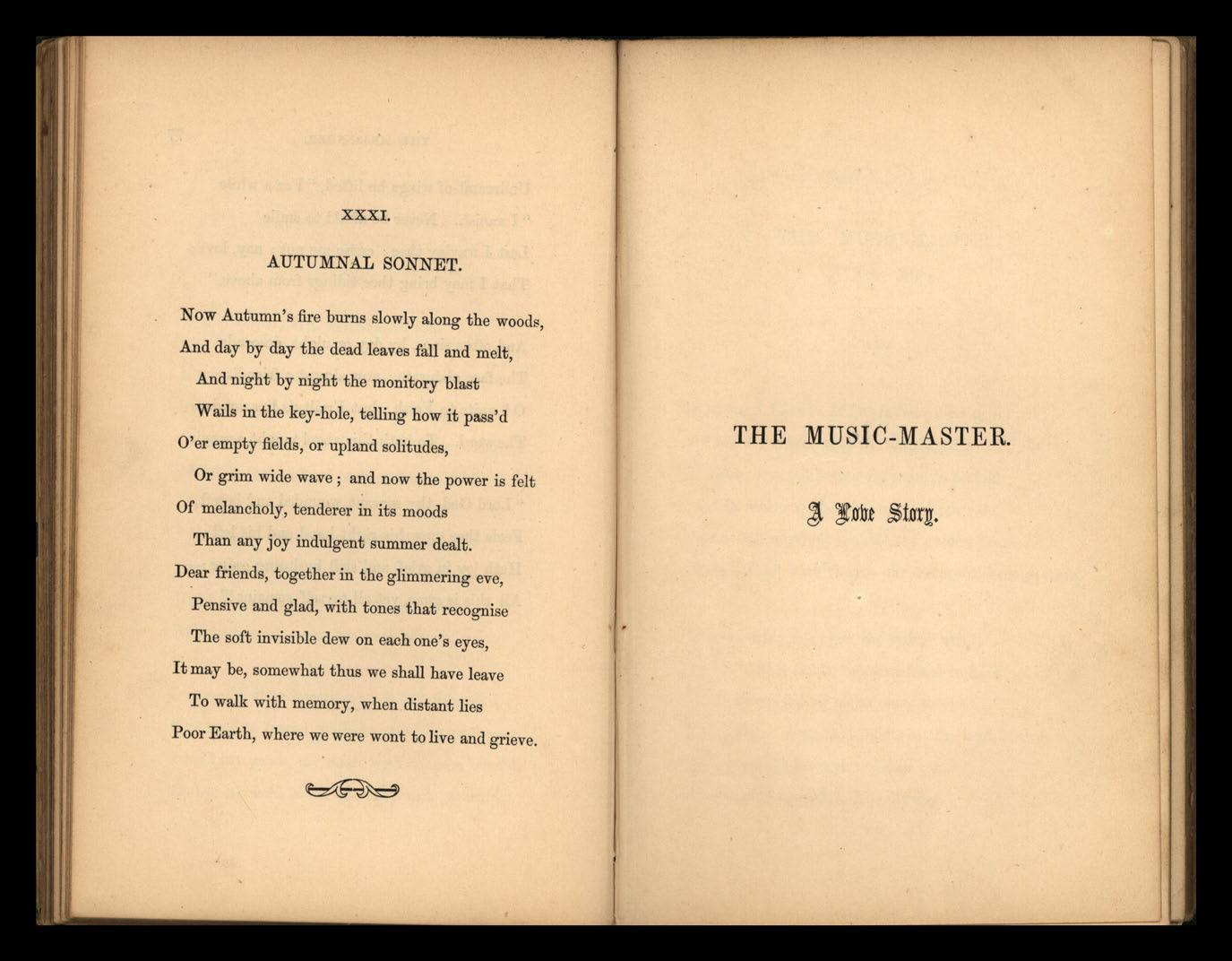
THE MUSIC-MASTER.
Joh.e ,st.crr)J.
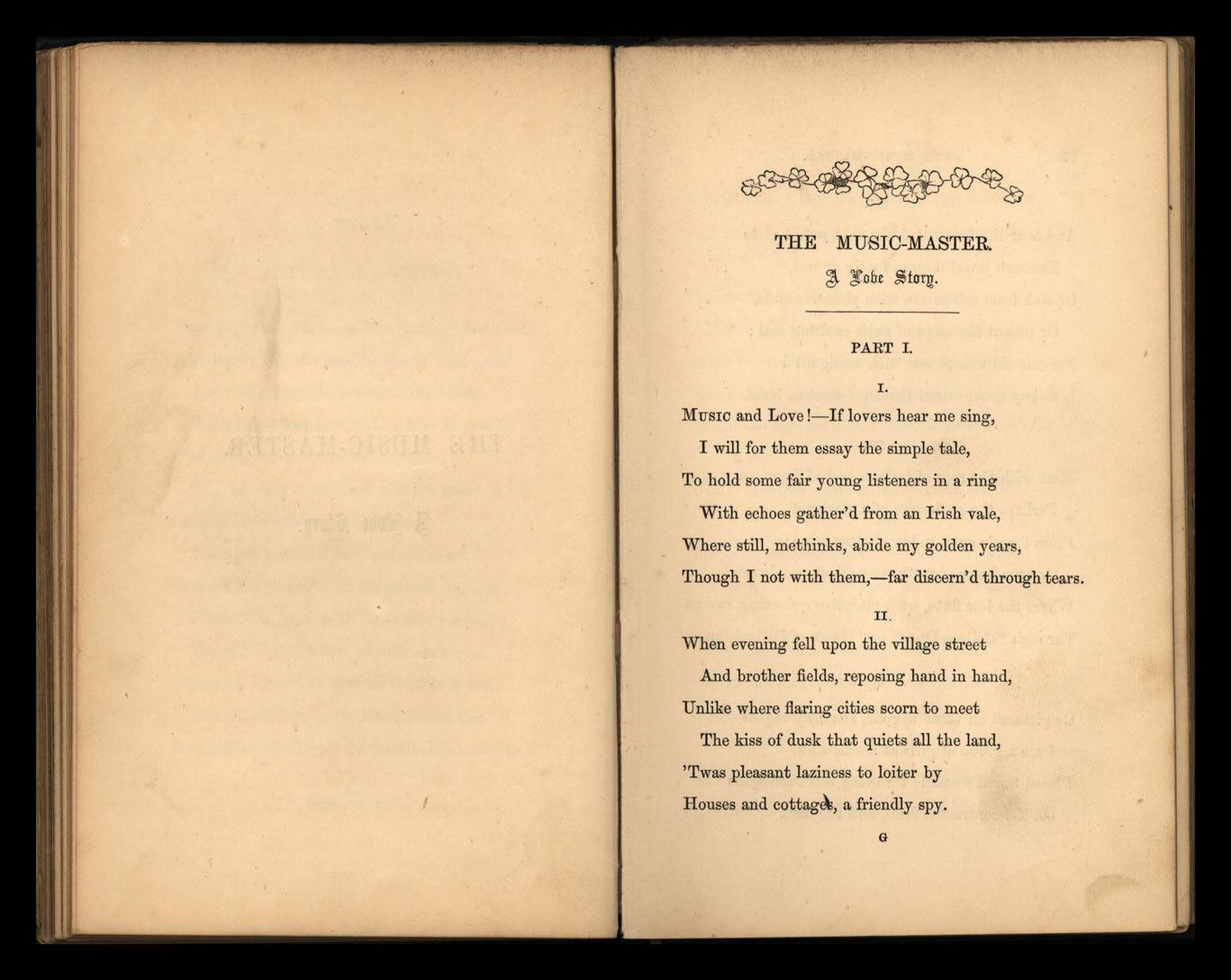
PART I.
1.
MUSIC and Love !-If lovers hear me sing,
I will for them essay the simple tale,
To hold some fair young listeners in a ring
With echoes gather'd from an Irish vale,
Where still, methinks, abide my golden years,
Though I not with them,-far discern'd through tears.
II.
When evening fell upon the village street
And brother fields, reposing hand in hand,
Unlike where flaring cities scorn to meet
The kiss of dusk that quiets all the land,
'Twas pleasant laziness to loiter by Houses and a friendly spy.
G
THE MUSIC-MASTER.
Ill.
And hear the frequent fiddle that would glide
Through jovial mazes of a jig or reel,
Or sink from sob to sob with plaintive slide,
Or mount the steps of swift exulting zeal;
For our old village was with music fill'd
Like any grove where thrushes wont to build.
IV.
Mixt with the roar of bellows and of flame,
Perhaps the reed-voice of a clarionet
From forge's open ruddy shutter came;
Or round some hearth were silent people set,
Where the low flute, with plaintive quivering, ran on
Through "Colleen Dhas" or" Hawk of Ballyshannon."
V.
Or pictured on those bygone, shadowy nights
I see a group of girls at needlework,
Placed round a candle throwing soft half-lights
On the contrasted faces, and the dark
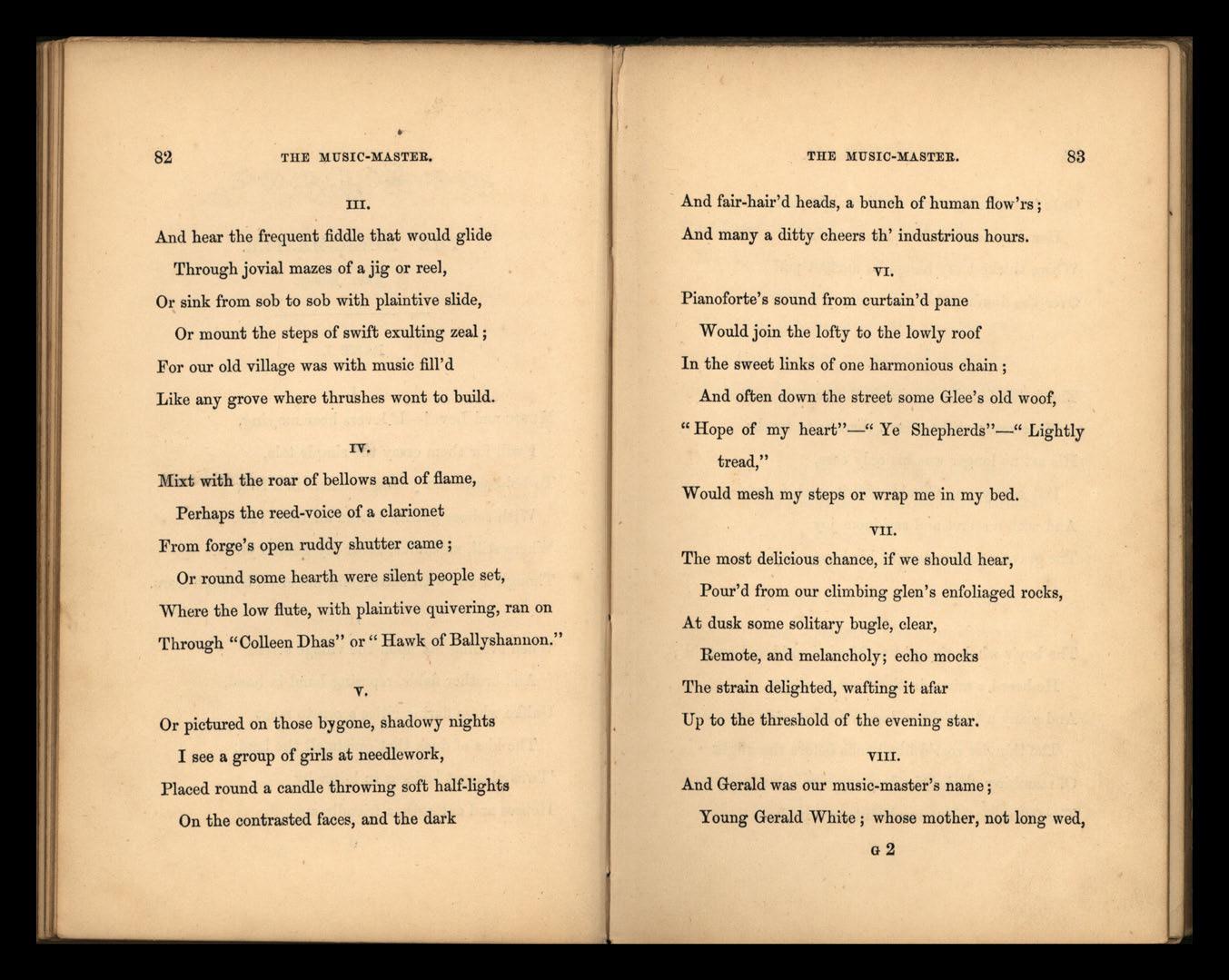
THE MUSIC-MASTER.
And fair-hair'd heads, a bunch of human flow'rs;
And many a ditty cheers th' industrious hours.
VI.
Pianoforte's sound from curtain'd pane
Would join the lofty to the lowly roof
In the sweet links of one harmonious chain;
And often down the street some Glee's old woof, "Hope of my heart"-" Ye Shepherds"-" Lightly tread,"
Would mesh my steps or wrap me in my bed.
VII.
The most delicious chance, if we should hear,
Pour'd from our climbing glen's enfoliaged rocks,
At dusk some solitary bugle, clear,
Remote, and melancholy; echo mocks
'l'he strain delighted, wafting it afar
Up to the threshold of the evening star.
VIII.
And Gerald was our music-master's name;
Young Gerald White; whose mother, not long wed, G2
THE MUSIC-MASTER.
Only to make him ours by birthright came.
Her Requiescat I have often read,
Where thickest ivy hangs its ancient pall
Over the dumb and desobte abbey wall. IX.
The father found a music-pupil rare,
More ready still to learn than he to teach;
His art no longer was his only care,
But now young Gerald with it, each for each j
And with a secret and assiduous joy
The grave musician taught his happy boy. X.
The boy's whole thought to Music lean'd and sway'd ;
He heard a minor in the wind at night,
And many a tune the village noises play'd;
The thunder roar'd like bands before the might
Of marching armies j in deep summer calm
The falling brooklet would intone a psalm.
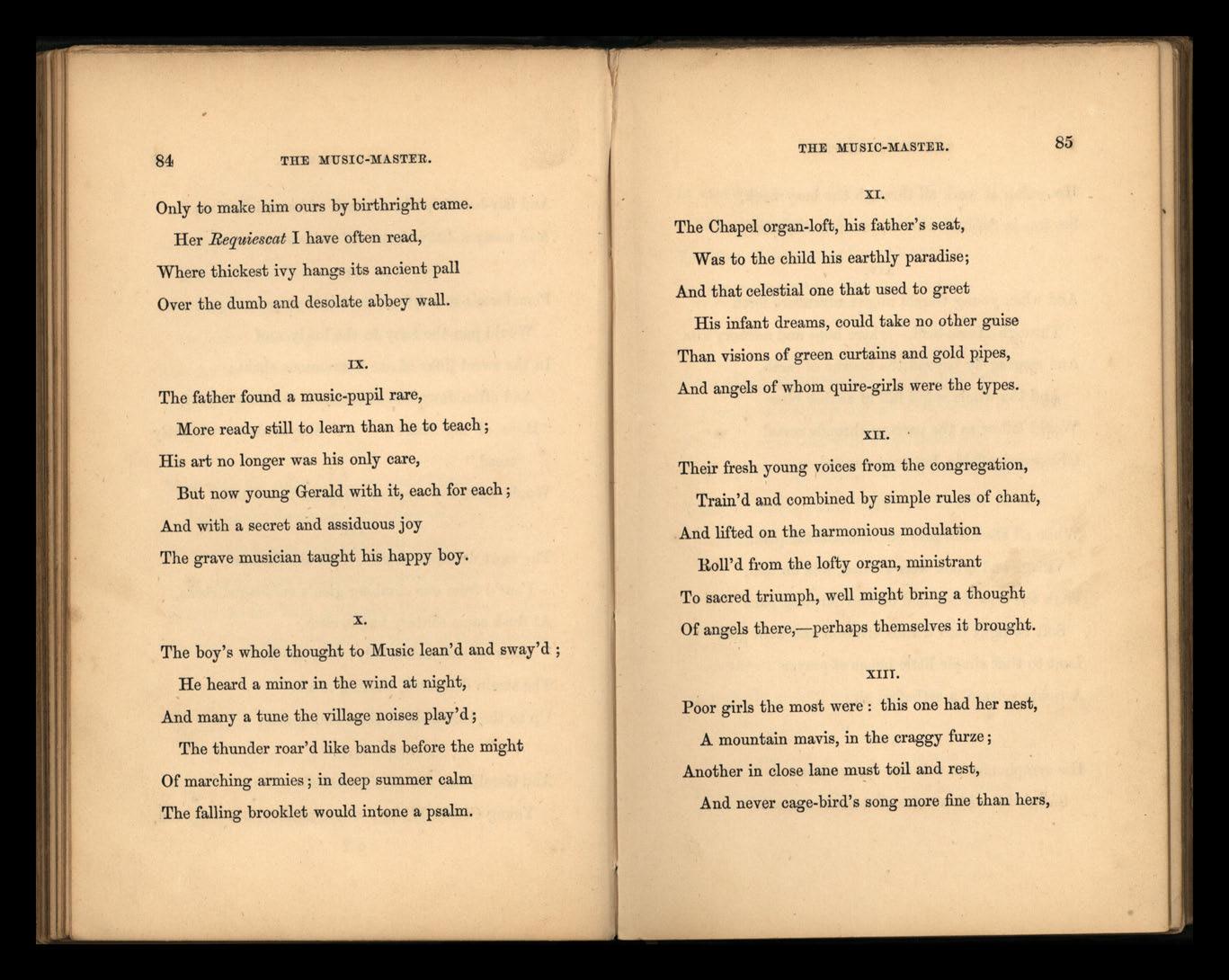
THE MUSIC-MASTER.
XI.
The Chapel organ-loft, his father's seat,
Was to the child his earthly paradise;
And that celestial one that used to greet
His infant dreams, could take no other guise
Than visions of green curtains and gold pipes,
And angels of whom quire-girls were the types.
XII.
Their fresh young voices from the congregation,
Train'd and combined by simple rules of chant,
And lifted on the harmonious modulation
Roll'd from the lofty organ, ministrant
To sacred triumph, well might bring a thought
Of angels there,-perhaps themselves it brought.
XIII.
Poor girls the most were: this one had her nest,
A mountain mavis, in the craggy furze;
Another in close lane toil and rest,
And never cage-bird's song more fine than hers, 85
THE MUSIC-MASTER.
Humming at work all through the busy week,
Set free in Sabbath proud and meek. XIV.
And when young Gerald might auventure forth
Through Music-land,-where hope and memory ki ss
And singing fly beyond the bourne of earth,
And the whole spirit full of aching bliss
Would follow as the parting shrouds reveal Glimpses ineffable, but soon conceal,xv.
While all the hills, mayhap, and distant plain,
Village and brook were shaded, fold on fold,
With the slow dusk, and on the purpling pane
Soft twilight barr'd with crimson and with gold
Lent to that simple little house of prayer
A richly solemn, a cathedral air j XVI.
His symphonies to suit the dying close
Suffused it with a voice that could not ask
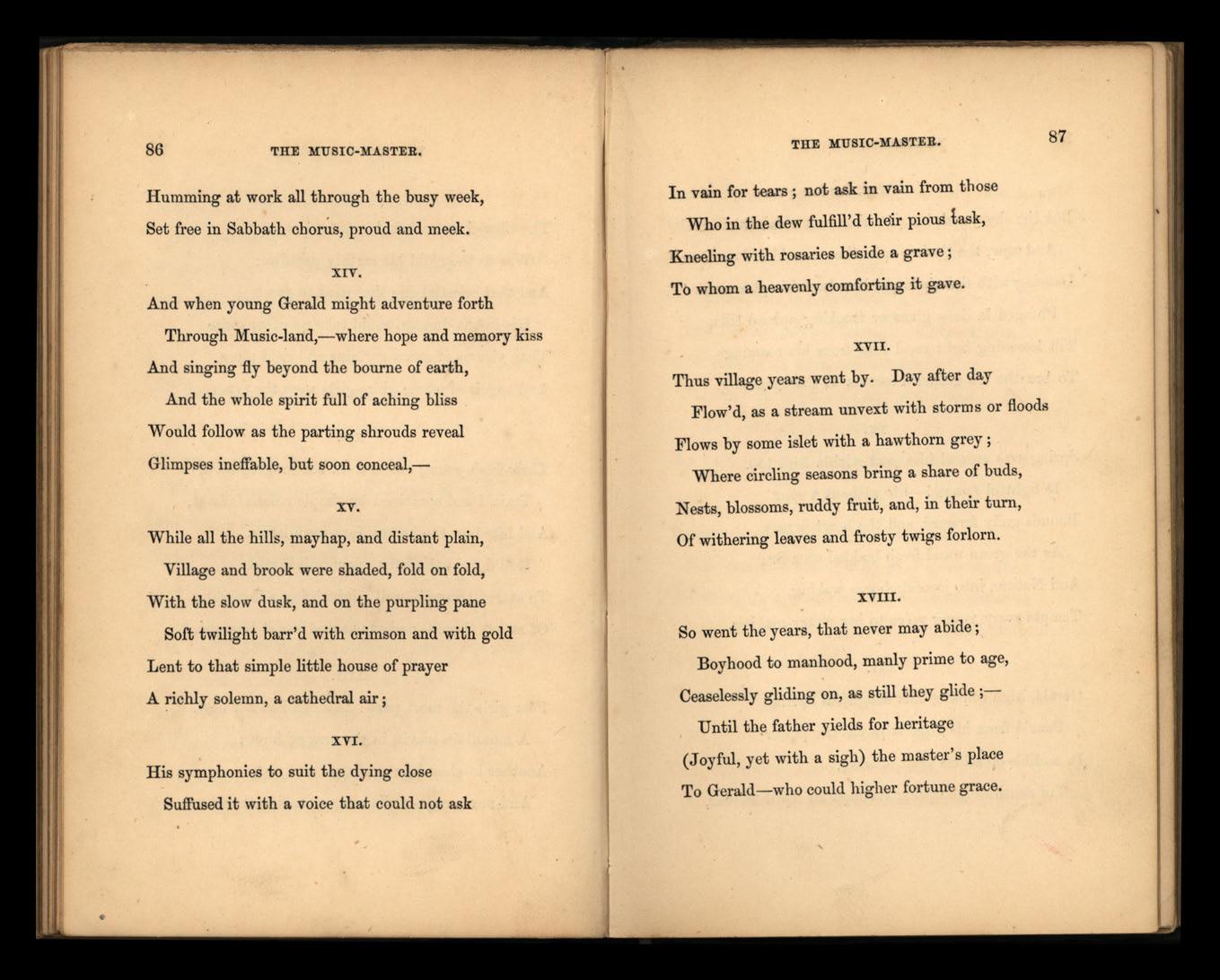
THE MUSIC-MA.STER.
In vain for tears j not ask in vain from those
Who in the dew fulfill'd the'ir pious task,
Kneeling with rosaries beside a grave j
To whom a heavenly comforting it gave.
XVII.
Thus village years went by. Day after day
Flow'd, as a stream unvext with storms or floods
Flows by some islet with a hawthorn grey j
Where circling seasons bring a share of buds,
Nests, blossoms, ruddy fruit, and, in their turn,
Of withering leaves and frosty twigs forlorn.
XVIII.
So went the years, that never may abide j
Boyhood to manhood, manly prime to age,
Ceaselessly gliding on, as still they glide j-
Until the father yields for heritage
(Joyful, yet with a sigh) the master's place
To Gerald-who could higher fortune grace.
88 !EHE MUSIC-lIfASTER. XIX.
But the shy youth has yet his hours of leisure:
And now, the Spring upon the emerald hills
Dancing with flying clouds, how keen his pleasure,
Plunged in deep glens or tracking upland rills,
Till lessening light r ecal him from his roaming
To breathe his gather'd secrets to the gloaming. xx.
Spring was aronnd him, and within him too.
Delightful season !-life without a spur
Bounds gaily forward, and the heart is new
As the green wand fresh budded on a fir;
And Nature, into jocund chorus waking,
Tempts every young voice to her merry-making. XXI.
Gerald, high echoing this delightful Spring,
Pour'd from his finger-tips electric power
In audible creations swift of wing, 'fill sunshine glimpsing through an April shower,
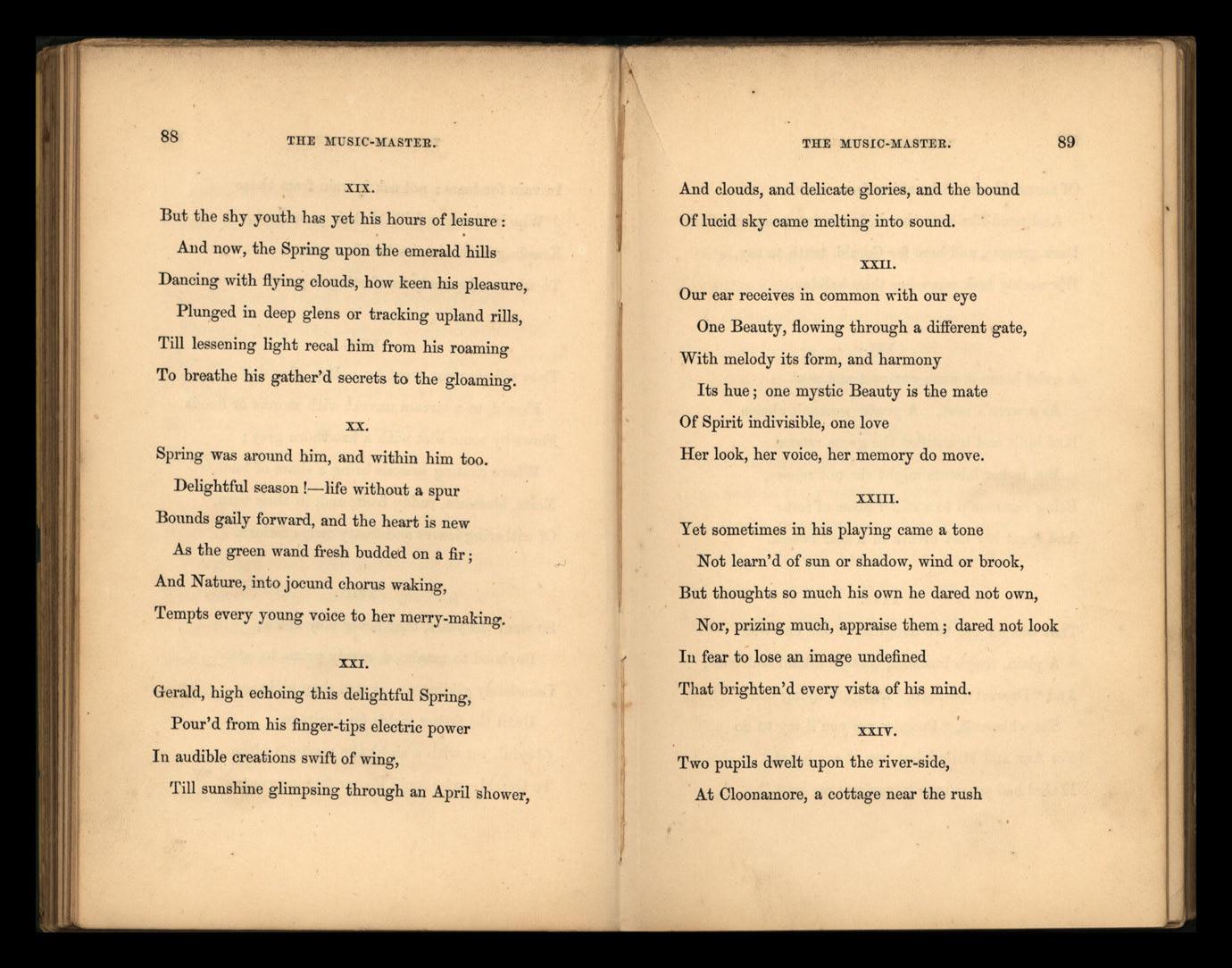
THE MUSIC-MA.STER.
And clouds, and delicate glories, and the bound
Of lucid sky came melting into sound. XXII.
Our ear receives in common with our eye
One Beauty, flowing through a different gate,
With melody its form, and harmony
Its hue j one mystic Beauty is the mate
Of Spirit indivisible, one love
Her look, her voice, her memory do move. XXIII.
Yet sometimes in his playing came a tone
Not learn'd of sun or shadow, wind or brook,
But thoughts so much his own he dared not own,
Nor, prizing much, appraise them; dared not look
In fear to lose an image undefined
That bl'ighten'd every vista of his mind. x:x:nr.
Two pupils dwelt upon the river-side,
At Cloonamore, a cottage near the rush
89
90 THE MUSIC-MASTER.
Of narrow'd waters breaking from a wide
And pond-like smoothn ess, brimming green and flu sh
Dark groves; and here for Gerald, truth to say,
His weekly task was more than holiday. xxv.
A qui et home it was j compact and neat
As a wren's n est. A g entle woman's choice
Had built and b eautifi ed th e green r etreat;
But in her labours might she not r ejoice,
Being summon'd to a still er place of rest;
And spent her last breath in a dear behest.
XXVI.
That was for her two daughters: she had wed
A plain, rough husband, though a kind and true;
And" Dearest 'B ernard," from her dying bed
She whisper'd, "Promise me you'll try to do
For Ann and Milly what was at my heart,
If God had spared m e to p erform my part."
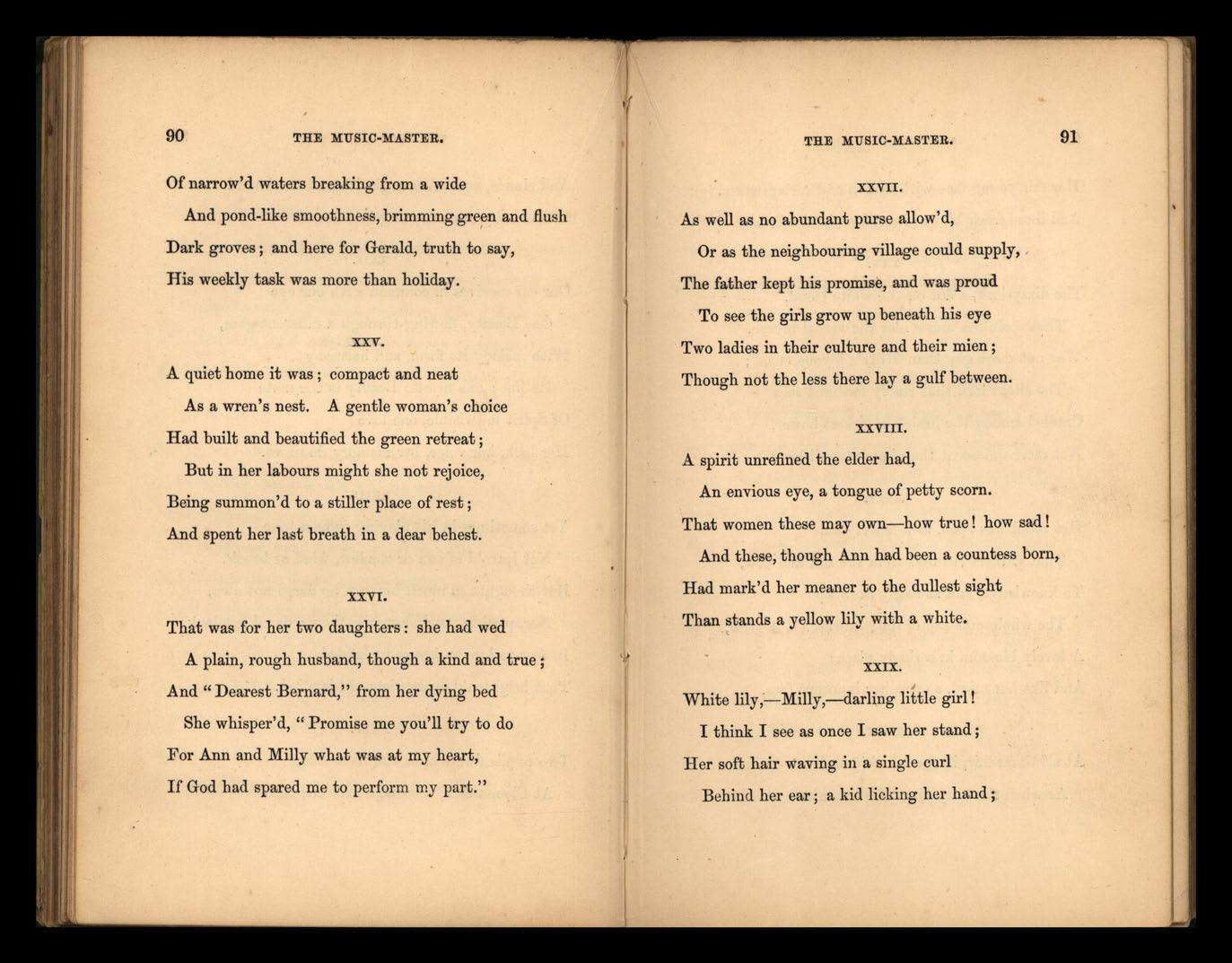
THE MUSIC-MASTER.
XXVII.
As well as no abundant purse allow'd,
Or as the neighbouring village could supply,
The father kept his promise, and was proud
To see the girls grow up beneath his eye
Two ladies in their culture and their mien;
Though not the less there lay a gulf between.
XXVIII.
A spirit unrefined the elder had,
An envious eye, a tongue of petty scorn.
That women these may own-how true! how sad!
And these, though Ann had been a countess born,
Had mark'd her meaner to the dull est sight
'fhan stands a yellow lily with a whit e.
XXIX. I
White lily,-Milly,-darling little girl!
I think I see as once I saw her stand;
H er soft hair waving in a single curl
B ehind her ear; a kid li cking her hand;
D2 THE MUSIC-MASTER.
Her fair young face with health and racing warm,
And loose frock blown about her slender form. xxx.
The dizzy lark, a dot on the white cloud,
That sprinkles music o'er the vernal breeze,
Was not more gay than Milly's joyous mood j
The silent lark that starry twilight sees
Cradled among the braird in closest bower,
Not more quiescent than her tranquil hour.
XXXI.
Her mind was open, as a flowery cup
That gathers richness from the sun and dew,
To knowledge, and as easily drew up
The wholesome sap of life j unwatch'd it grew,
A lovely blossom in a shady place j
And like her mind, so was her innocent face.
XXXII.
At all times fair, it never look'd so fair
As when the holy glow of harmonies
THE MUSIC-MASTER.
Lighted it through j her spirit as it were
An azure heav'n outshining at her eyes j
With Gerald's tenor while the fountain sprung
Of her contralto, fresh and pure and young.
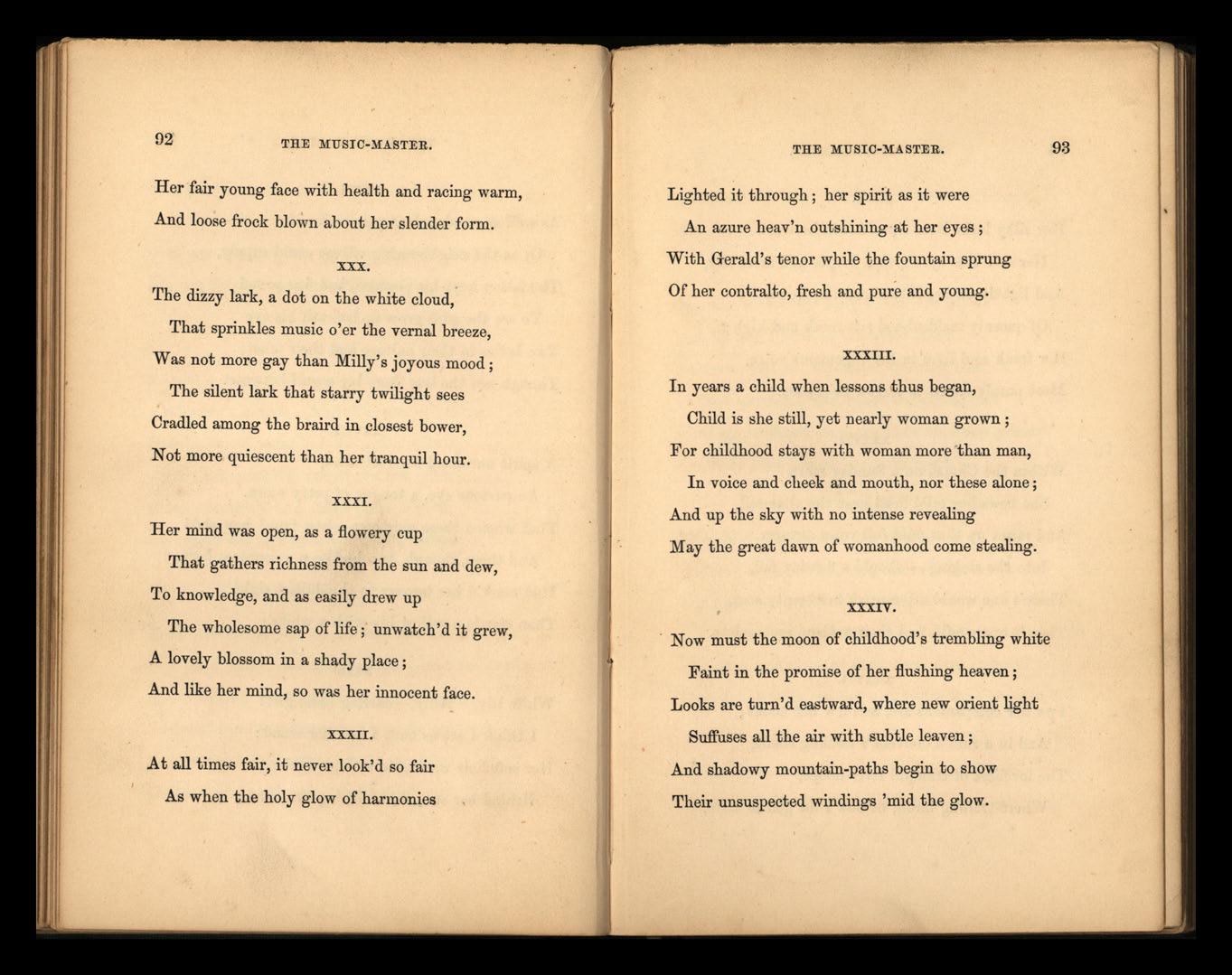
XXXIII.
In years a child when lessons thus began,
Child is she still, yet nearly woman grown j
For childhood stays with woman more than man,
In voice and cheek and mouth, nor these alone j
And up the sky with no intense revealing
May the great dawn of womanhood come stealing.
XXXIV.
. Now must the moon of childhood's trembling white
Faint in the promise of her flushing heaven j
Looks are turn'd eastward, where new orient light
Suffuses all the air with subtle leaven j
And shadowy mountain-paths begin to show
Their unsuspected windings 'mid the glow.
94 THE MUSIC-MA.STER. :xxxv.
Her silky locks have ripen'd into brown,
Her soft blue ey es grown deeper and more shy,
And lightly on h er lifted h ead the crown
Of queenly maid enhood sits meek and high;
H er frank soul lives in h er ingenuous voic e,
Most purely tuned to sorrow or r ejoice.
XXXVI.
Within the Chapel on a Sunday morn
She bows her mild head near the altar-rail,
And raises up that mild full voice unworn
Into the singing ;-should a Sunday fail,
There's one would often mark her empty seat,
There's one would find th eir anth em incomplete.
XXXVII.
}'e w her companions are, and few her books;
And in a ruin'd convent's circling shade,
The loveliest of tranquil river-nooks,
Where trailing birch, fit bow'r for gentle maid,
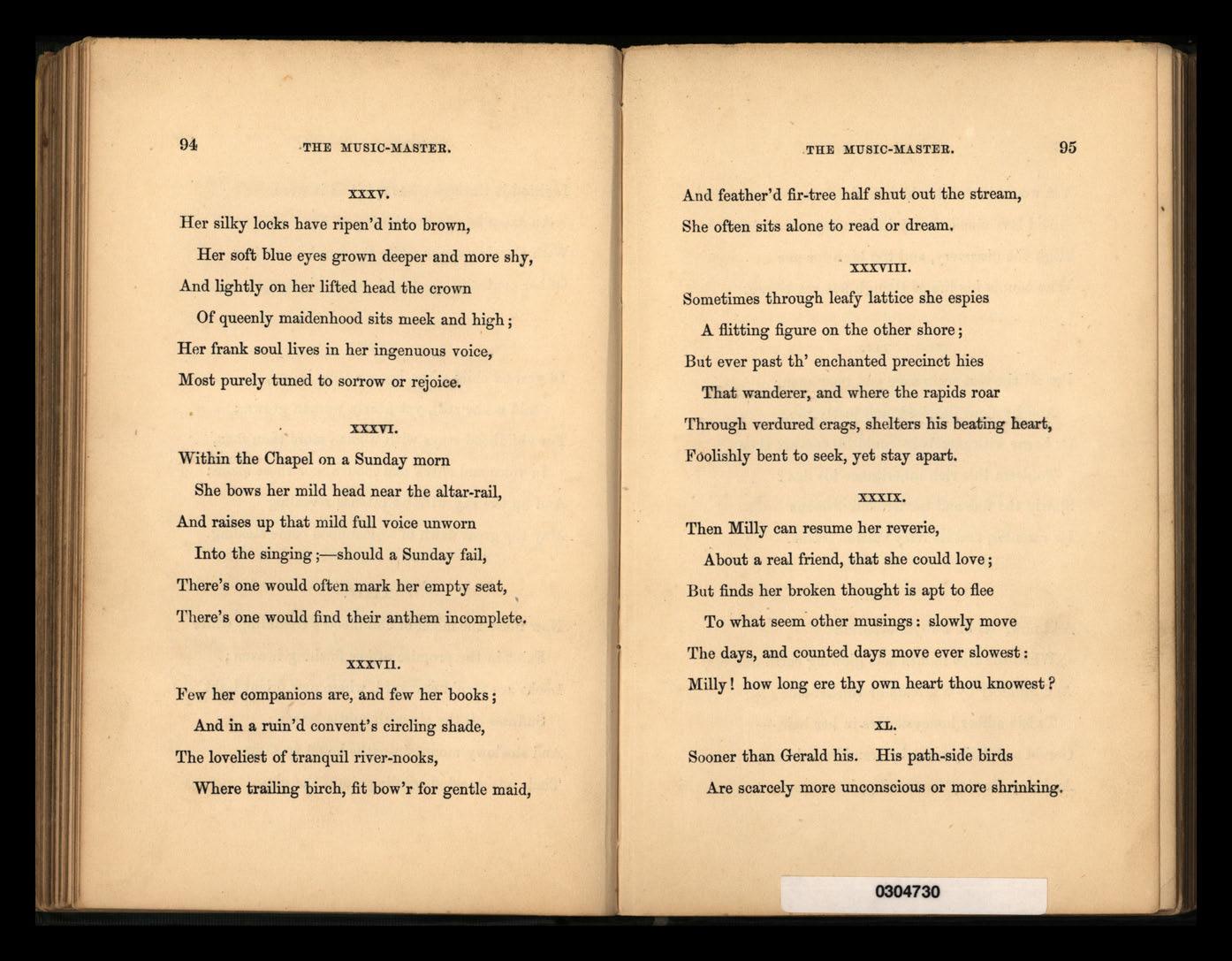
THE MUSIC-MA.STER.
And feather'd fir-tr ee half shut out the stream,
She often sits alone to read or dream. XXXVIII.
Som etimes through l eafy lattice she espies
A flitting figure on the other shore;
But ever pa st th' enchanted precinct hi es
That wanderer, and where the rapids roar
Through verdured crags, sh elters his beating heart,
Foolishly b ent to seek, yet stay apart. XXXIX.
Then Milly can resume her reverie,
About a r eal friend, that she could love;
But finds her broken thought is apt to fl ee
To what seem' other musings: slowly move 'rhe days, and counted days move ever slowest:
Milly! how long ere thy own heart thou knowest ? XL.
Sooner than Gerald his. His path-side birds
Are scarcely more unconscious or more shrinking.
THE MUSIC-MASTEB.
Yet would he tell his love in simple wordii
Did love stand clearly in his simple thinking:
High the discovery, and too high for one
Who counts his life as though not yet begun.
XLI.
For all the rest seem sage and busy men;
And he alone despised, and justly too,
Or borne with merely ;-could he venture then
To deem this rich inheritance his due?
Slowly the fine and tender soul discerns
Its rareness, and its lofty station learns.
XLII.
And now, 'tis on a royal eventide
When the ripe month sets glowing earth and air,
And by a stream or thicket-side
Twists amber honeysuckles in her hair,-
Gerald and Milly meet by trembling chance,
And step for step are moving, in a trance. ]( I
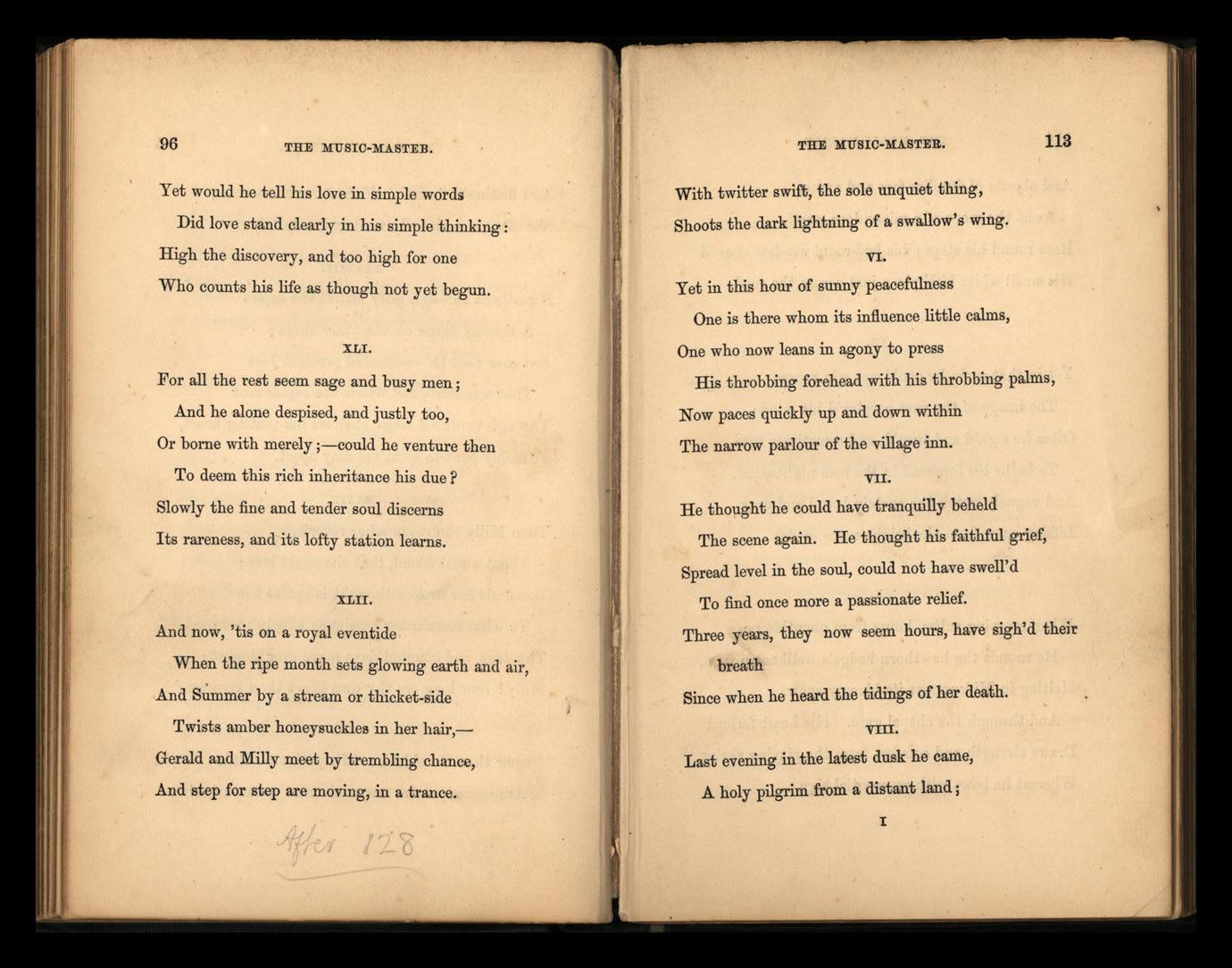
THE MUSIC-MASTER.
With twitter swift, the sole unquiet thing,
Shoots the dark lightning of a swallow's wing.
VI.
Yet in this hour of sunny peacefulness
One is there whom its influence little calms,
One who now leans in agony to press
His throbbing forehead with his throbbing palms,
Now paces quickly up and down within
The narrow parlour of the village inn.
VII.
He thought he could have tranquilly beheld
The scene again. He thought his faithful grief,
Spread level in the soul, could not have swell'd
To find once more a passionate relief.
Three years, they now seem hours, have sigh'd their breath
Since when he heard the tidings of her death.
VIII.
Last evening in the latest dusk he came,
A holy pilgrim from a distant land; I
114 THE MUSIC-MASTER.
And objects of familiar face and name,
As at the move of a miraculous wand,
Rose round his steps; his bed-room window show'd
His small white birthplace just across the road.
IX.
Yet in that room he could not win repose;
The image of the past perplex'd his mind;
Often he sigh'd and turn'd, and sometimes rose
To bathe his forehead in the cool night-wind,
And vaguely watch the curtain broad and grey
Lifting anew from the bright scene of day.
X.
When creeping sultry hours from noontide go,
He rounds the hawthorn hedge's wellknown turn,
Melting in Midsummer its bloomy snow,
And through the chapel gate. His heart forlorn
Draws strength and comfort from the pitying shrine
Whereat he bows with reverential sign.

THE MUSIC-MASTER.
XI.
Behind the chapel, down a sloping hill,
Circling the ancient abbey's ivied walls
The graveyard sleeps. A little gurgling rill
Pour'd through a corner of the ruin, falls
Into a dusky-water'd pond, and lags
With lazy eddies 'mid its yellow flags.
XII.
Across this pool, the hollow banks enfold
An orchard overrun with rankest grass,
And gnarl'd and mossy apple-trees, as old
As th' oldest graves almost; and thither pass
The smooth-worn stepping-stones that give their aid
To many a labourer and milking-maid.
XIII.
And not unfrequently to rustic bound
On a more solemn errand,-when we see
A suppliant in such universal ground,
Let all be reverence and sympathy;
I 2

116 THE MUSIC-MASTER.
Assured the life in every real pray'r
Is that which makes our life of life to share.
XIV.
But resting in the sunshine very lone
Is now each hammock green and wooden cross;
And save the rillet in its cup of stone
That poppling falls, and whispers through the moss
Down to the quiet pool, no sound is near
To break the stilliness to Gerald's ear. xv.
The writhen elder spreads its creamy bloom;
The thicket-tangling, tellderest briar-rose
Kisses to air its exquisite perfume
In shy luxuriance; leaning foxglove glows
With elvish crimson ;-nor all vainly meet
The eye which unobserved they seem to greet.
XVI.
Under the abbey wall he wends his way,
Admitted through a portal arching deep,
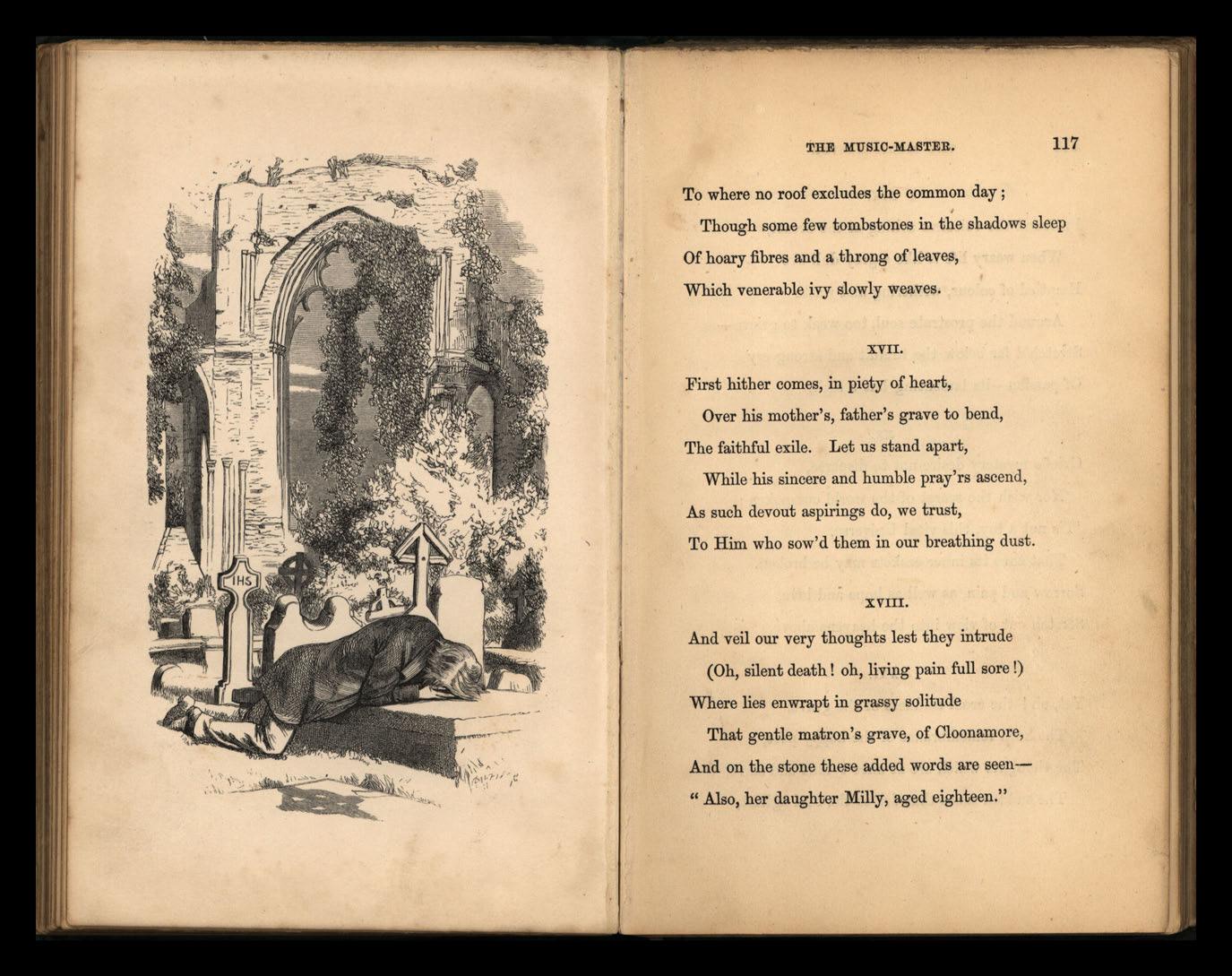
To where no roof excludes the common day j ,
Though some few tombstones in the shadows sleep
Of hoary fibres and a throng of leaves,
Which venerable ivy slowly weaves. XVII.
First hither comes, in piety of heart,
Over his mother's, father's grave to bend,
The faithful exile. Let us stand apart,
While his sincere and humble pray'rs ascen d,
As such devout aspirings do, we trust,
To Him who sow'd them in our breathing du st. XVIII.
And veil our very thoughts lest they intrude
(Oh, silent death! oh, living pain full sore!)
Where lies enwrapt in grassy solitude
That gentle ma.tron's grave, of Cloonamore ,
And on the stone these a.dded words are seell-
" Also, her daughter Milly, aged eighteen."
118
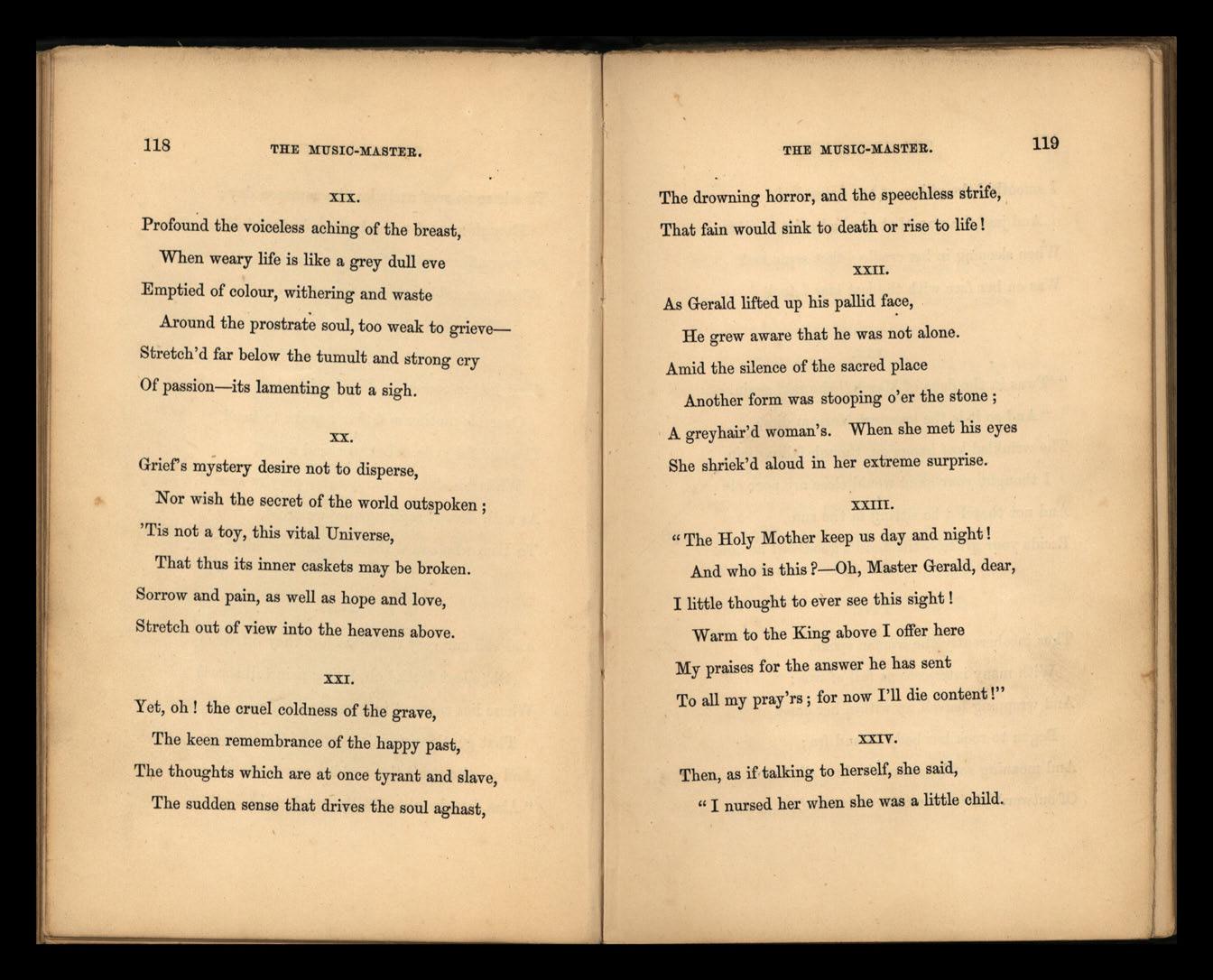
THE MUSIC-MASTER. XIX.
Profound the voiceless aching of the breast,
When weary life is like a grey dull eve
Emptied of colour, withering and waste
Around the soul, too weak to grieve-
Stretch'd far below the tumult and strong cry
Of passion-its lamenting but a sigh. xx.
Griefs mystery desire not to disperse,
Nor wish the secret of the world outspoken;
'Tis not a toy, this vital Universe,
That thus its inner caskets may be broken.
Sorrow and pain, as well as hope and love,
Stretch out of view into the heavens above. XXI.
Yet, oh! the cruel coldness of the grave,
The keen remembrance of the happy past,
The thoughts which are at once tyrant and slave,
The sudden sense that drives the soul aghast,
THE MUSIC-MASTER.
The drowning horror, and the speechless strife, That fain would sink to death or rise to life! XXII.
As Gerald lifted up his pallid fa?e,
He grew aware that he was not alone.
Amid the silence of the sacred place
Another form was stooping o'er the stone;
A greyhair'd woman's. When she met his eyes
She shriek'd aloud in her extreme surprise. XXIII.
" The Holy Mother keep us day and night!
And who is this ?-Oh, Master Gerald, dear,
I little thought to ever see this sight!
Warm to the King above I offer here
My praises for the answer he has sent
To all my pray'rs; for now I'll die content!" XXIV.
Then, as if talking to herself, she said,
"I nursed her when she was a little child.
120 THE MUSIC-MASTER.
I smooth'd the pillow of her dying bed.
And just the way that she had often smiled
When sleeping in her cradle-that same look
Was on her face with the last kiss I took." xxv.
" 'Twas in the days of March," she said again.
" And so it is the sweetest blossom dies,
The wrinkled leaf hangs on, though falling fain.
I thought your hand would close my poor old eyes,
And not that I'd be sitting in the sun
Beside your grave,-the Lord's good will be done!" XXVI.
Thus incoherently the woman spoke,
With many inteIjections full of woe;
And wrapping herself up within her cloak
Began to rock her body to and fro;
And moaning softly, seem'd to lose all sense
Of outward life in memories so intense.

THE MUSIC-MASTER. XXVII.
Till Gerald burst his silence and exclaim'd,
With the most poignant earnestness of tone,
" 0 nurse, I loved her !-though I never named
The name of love to her, or anyone.
'Tis to her grave here--" He could say no more,
But these few words a load of meaning bore. XXVIII.
Beside the tombstone mute they both remain'd.
At last the woman rose, and coming near,
Said with a t ender voice that had regain'd
A tremulous calm, "Then you must surely hear
The whole from first to last, cushla-ma-chree j
For God has brought together you and me." XXIX.
And there she told him all the moving tale,
Broken with many tears and sobs and sighs;
How gentle Milly's health began to fail ;
How a sad sweetness grew within her eyes,
122 THE YUSIC-MASTER.
And trembled on her mouth, so kind and meek,
And flush'd across her pale and patient cheek. xxx.
And how about this time her sister Ann
"Entered Religion,"* and her father's thought
Refused in Milly's face or voice to scan,
Or once so lively step, the change that wrought;
Until a sad conviction flew at last,
And with a barb into his bosom pass'd. XXXI.
Then, with most anxious haste, her dear old nurse
Was sent for to become her nurse again;
But still the pretty one grew worse and worse.
For with a gradual lapsing, free of pain,
And slow removes, that fond eyes would not see,
Crept on the hopeful, hopeless malady.
XXXII.
Spring came, and brought no gift of life to her,
Of all it lavish'd in the fields and woods.
• Took oonventual vows.
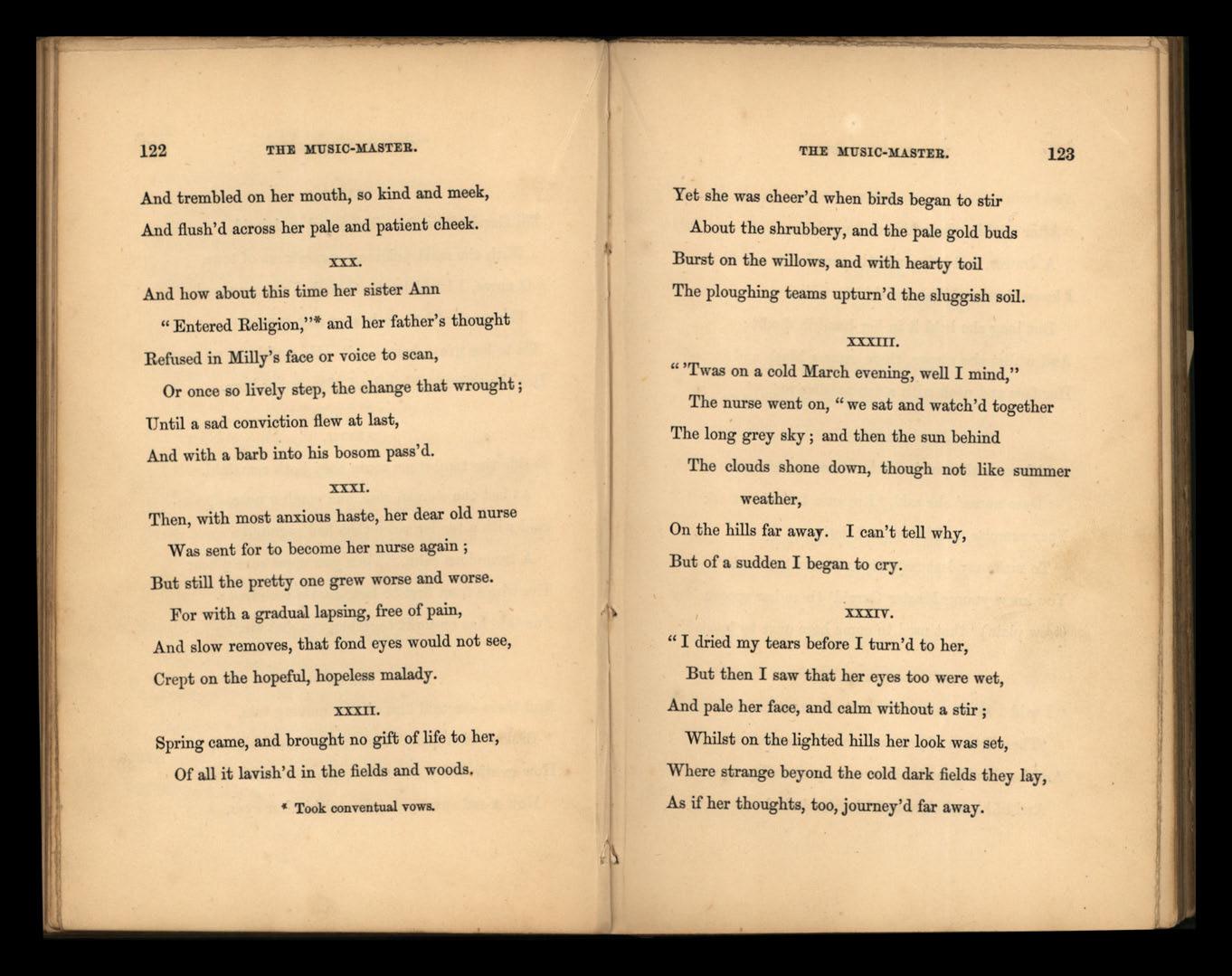
THE MUSIC-MASTER.
Yet she was cheer'd when birds began to stir
About the shrubbery, and the pale gold buds
Burst on the willows, and with hearty toil
The ploughing teams upturn'd the sluggish soil.
XXXIII.
"'Twas on a cold March evening, well I mind,"
The nurse went on, "we sat and watch'd together
The long grey sky; and then the sun behind
The clouds shone down, though not like summer weather,
On the hills far away. I can't tell why,
But of a sudden I began to cry.
XXXIV.
" I dried my tears before I turn'd to her,
But then I saw that her eyes too were wet,
And pale her face, and calm without a stir ;
Whilst on the lighted hills her look was set,
Where strange beyond the cold dark fields they lay,
As if her thoughts, too, journey'd far away.
124
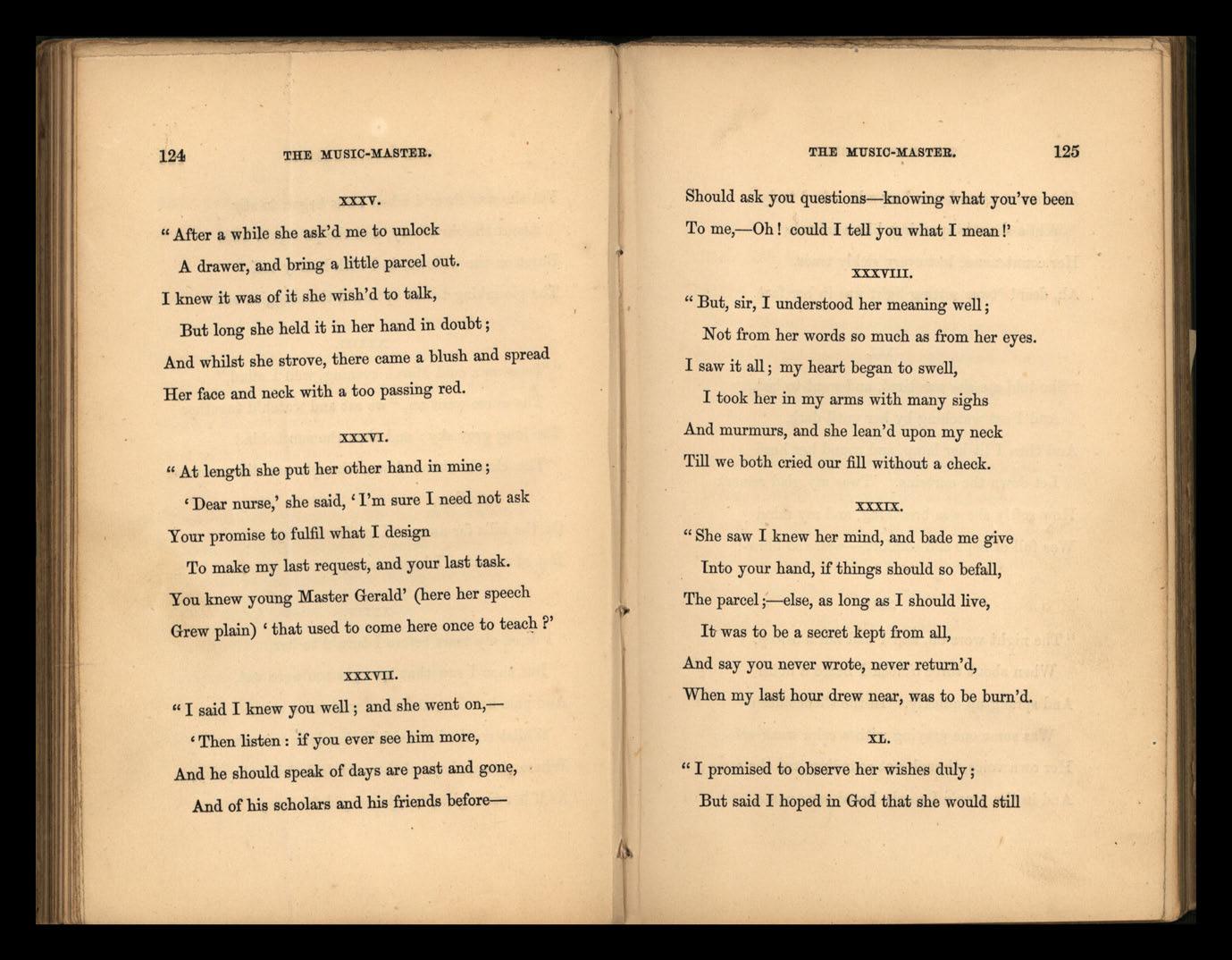
THE MUSIC-MA.STER. xxxv.
" After a wbile she ask'd me to unlock A drawer, and bring a little parcel out.
I knew it was of it she wish'd to talk,
But long she held it in her hand in doubt j
And whilst she strove, there came a blush and spread
Her face and neck with a too passing red. XXXVI.
" At length she put her other hand in mine;
, Dear nurse,' she said, 'I'm sure I need not ask
Your promise to fulfil what I design
To make my last request, and your last task.
You knew young Master Gerald' (here her speech
Grew plain) 'that used to come here once to teacl?- ?'
XXXVII.
" I said I knew you well; and sbe went on,-
, Then listen: if you ever see him more,
And he should speak of days are past and gone,
And of his scholars and his friends before-
THE MUSIC-MA.STER. 125
Should ask you questions-knowing what you've been
To me,-Oh! could I tell you what I mean!' XXXVIII.
" But, sir, I understood her meaning well;
Not from her words so much as from her eyes.
I saw it all; my heart began to swell,
I took h er in my arms with many sighs
And murmurs, and she lean'd upon my neck
Till we both cried our fill without a check. XXXIX.
" She saw I knew her mind, and bade me give
Into your hand, if things should so befall,
The parcel ;-6lse, as long as I should live,
In was to be a secret kept from all,
And say you never wrote, never return'd,
When my last bour drew near, was to be burn'd. XL.
" I promised to observe her wishes duly j
But said I hoped in God tbat she would still
THE MUSIC-:M.A.STER.
Live many years beyond myself. And truly
"While she was speaking, like a miracle
Her countenance lost every sickly trace.
Ab, dear! 'twas setting light was in her face.
XLI.
" She told me she was tired, and went to bed,
And I sat watching by her until dark,
And then I lit her lamp, and round her head
Let down the curtains. 'Twas my glad remark
How softly she was breathing, and my mind
Was full of hope and comfort,-we're so blind!
XLII.
" The night wore on, and I had fall'n asleep,
"When about three o'clock I heard a noise
And sprang up quickly. In the silence deep
Was some one praying with a calm weak voice;
Her own voice, though not sounding just the same;
And in the pray'r I surely heard your name.
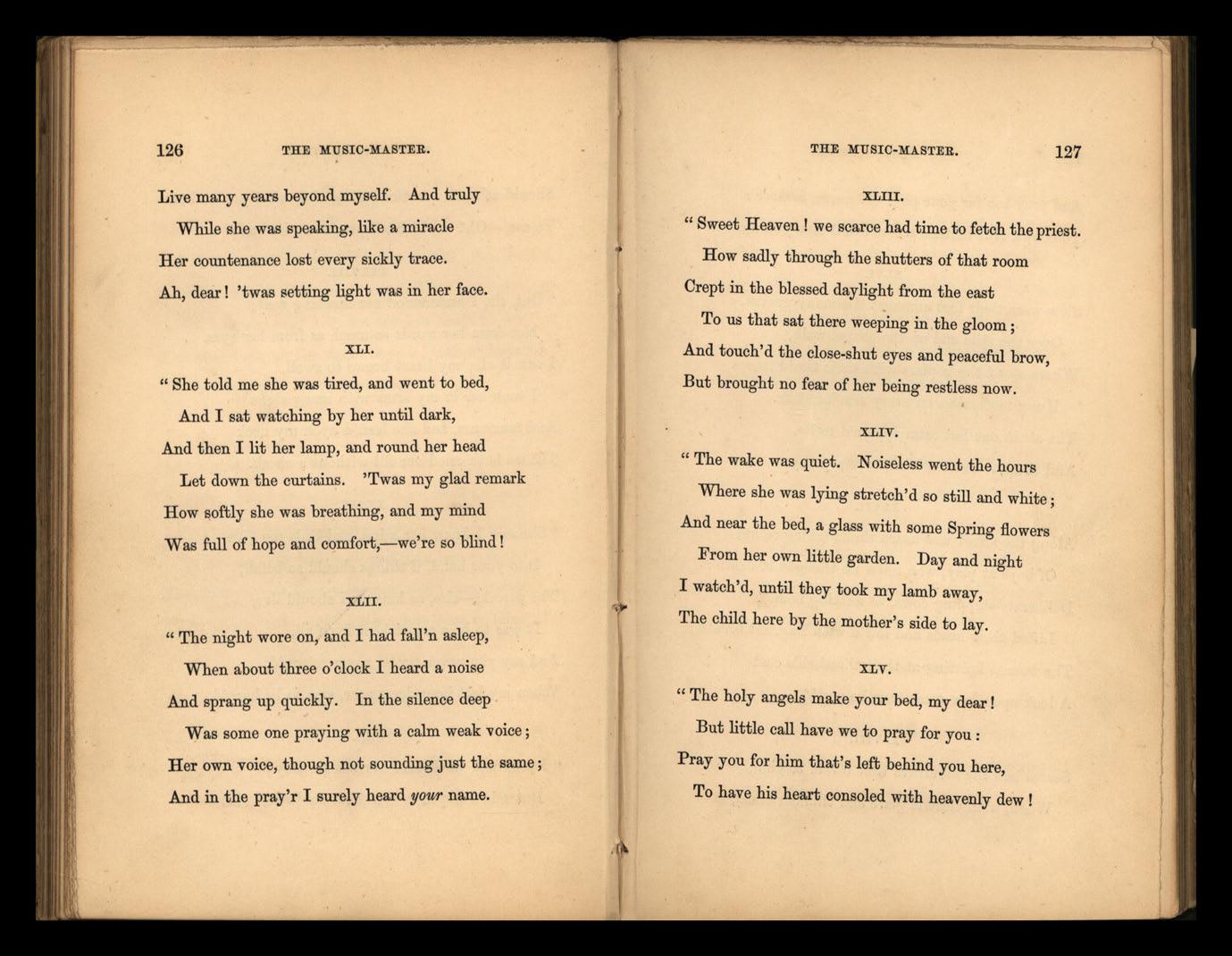
THE MUSIC-:M.A.STER. 127 XLm.
" Sweet Heaven! we scarce had time to fetch the priest.
How sadly through the shutters of that room
Crept in the blessed daylight from the east
To us that sat there weeping in the gloom;
And touch'd the close-shut eyes and peaceful brow,
But brought no fear of her being restless now.
XLIV.
" The wake was quiet. Noiseless went the hours
"Where she was lying stretch'd so still and white' ,
And near the bed, a glass with some Spring flowers
From her own little garden. Day and night
I watch'd, until they took my lamb away,
The child here by the mother's side to lay. XLV.
" The holy angels make your bed, my dear!
But little call have we to pray for you:
Pray you for him that's left behind you here,
To have his heart consoled with heavenly dew!
128
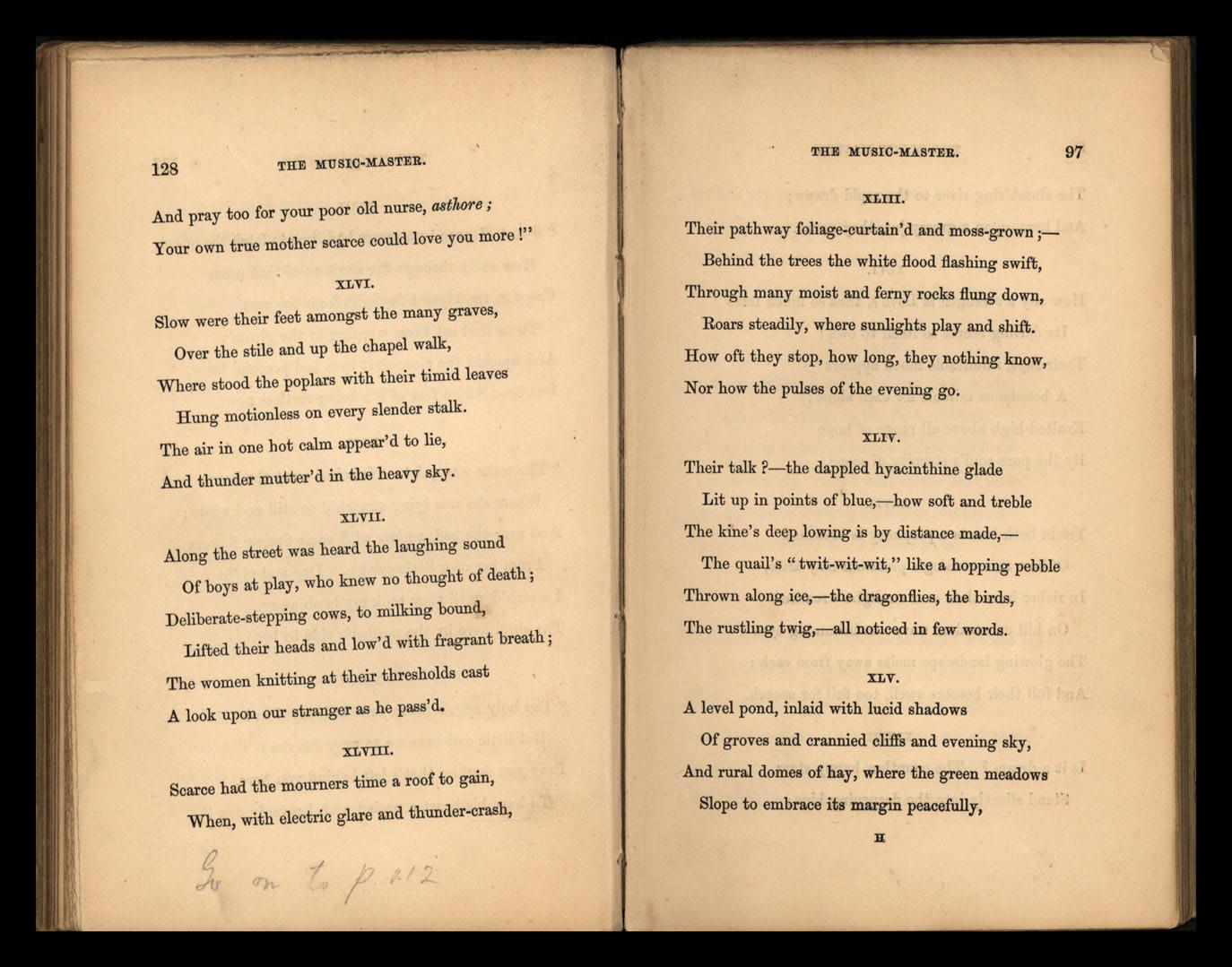
THE MUSIO-MASTER.
And pray too for your poor old nurse, asthore ;
Your own true mother scarce could love you more !"
XLVI.
Slow were their feet amongst the many graves,
Over the stile and up the chapel walk,
Where stood the poplars with their timid leaves
Hung motionless on every slender stalk.
The air in one hot calm appear'd to lie,
And thunder mutter'd in the heavy sky.
XLVII.
Along the street was heard the laughing sound
Of boys at play, who knew no thought of death;
Deliberate-stepping cows, to milking bound,
Lifted their heads and low'd with fragrant breath;
The women knitting at their thresholds cast
A look upon our stranger as he pass'd.
XLVIII.
Scarce had the mourners time a roof to gain,
When, with electric glare and thunder-crash, -/
THE MUSIC-MASTER.
XLIII.
Their pathway foliage-curtain'd and moss -grown;-
Behind the trees the white flood flashing swift,
Through many moist and ferny rocks flung down,
Roars steadily, where sunlights play and shift.
How oft they stop, how long, they nothing know,
Nor how the pulses of the evening go.
XLIV.
Their talk ?-the dappled hyacinthine glade
Lit up in points of blue,-how soft and treble
The kine's deep lowing is by distance made,
The quail's" twit-wit-wit," like a hopping pebble
Thrown along ice,-the dragonflies, the birds,
The rustling twig,-all noticed in few words.
XLV.
A level pond, inlaid with lucid shadows
Of groves and crannied cliffs and evening sky,
And rural domes of hay, where the green meadows
Slope to embrace its margin peacefully, R
98 THE MUSIC-MASTER,.
The slumb'ring river to the rapid draws;
And here, upon a grassy jut, they pause. XLVI.
How shy a strength is Love's, that so much fears
Its darling secret to itself to own!
Their rapt, illimitable mood appears
A beauteous miracle for each alone;
Exalted high above all range of hope
By the pure soul's eternity of scope. XLVII.
Yet in both hearts a prophecy is breathed
Of how this evening's phantom may arise,
In richer hues than ever sunlight wreathed
On hill or wood or wave: in brimming eyes
The glowing landscape melts away from each;
And full their bosoms swell, too full for speech. XLVIII.
Is it a dream? The countless happy stars
Stand silently into the deepening blue;
THE MUSIC-MASTER.
In slow procession all the molten bars
Of cloud move down; the air is dim with dew;
Eve scatters roses on the shroud of day;
The common world sinks far and far away . XLIX.
With goodnight kiss the zephyr, half asleep,
Sinks to its cradle in the dusk of trees,
Where river-chimings tolling sweet and deep
Make lullaby, and all field-scents that please
The Summer's children float into the gloom
Dream-interwoven in a viewless loom.
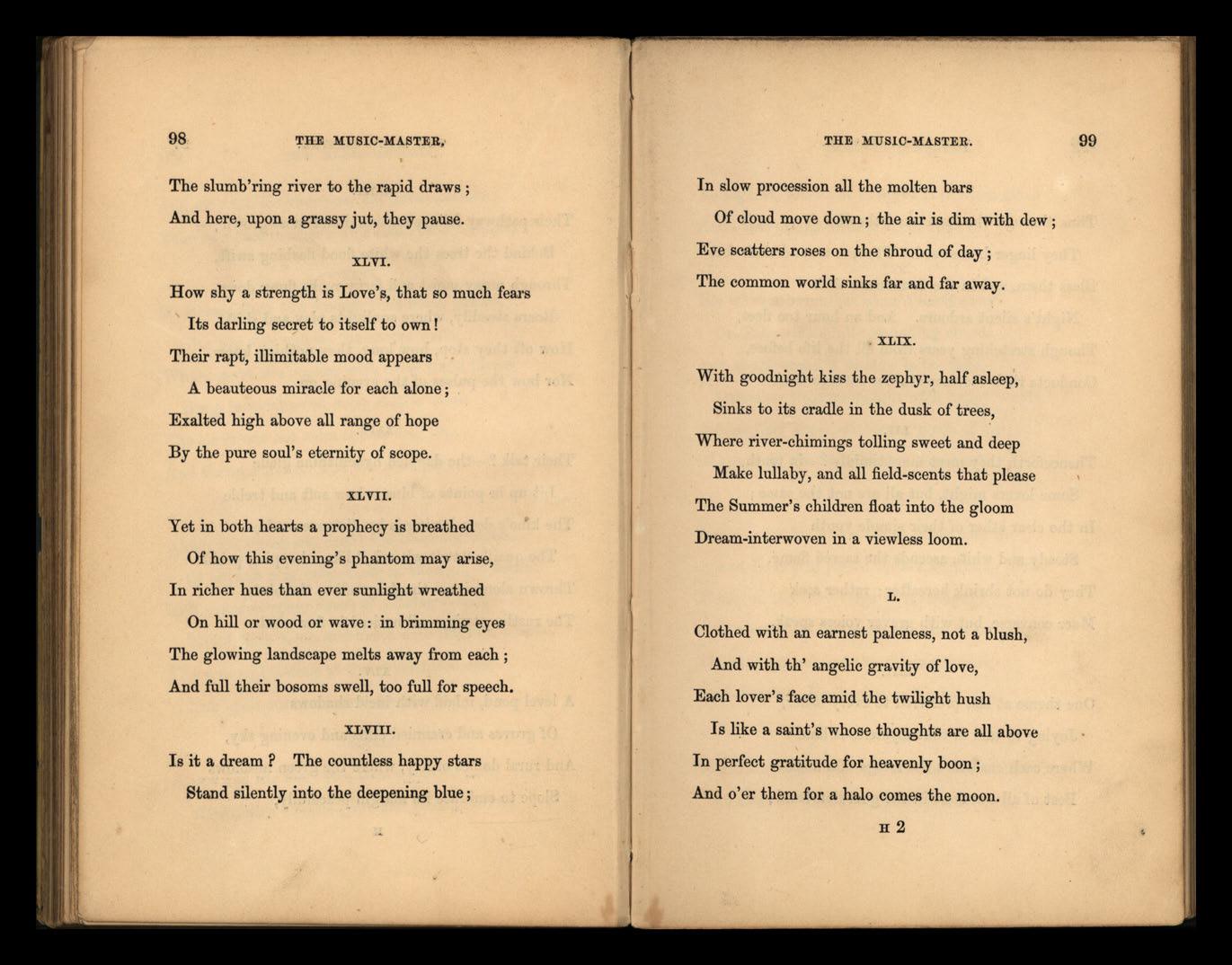
L.
Clothed with an earnest paleness, not a blush ,
And with th' angelic gravity of love,
Each lover's face amid the twilight hush
Is like a saint's whose thoughts are all above
In perfect gratitude for heavenly boon;
And o'er them for a halo comes the moon. H2
100 TilE MUSIC-MASTER.
LI.
Thus through the leaves and the dim dewy croft
They linger homeward. Flowers around their feet
Bless th em, and in the firmament aloft
Night's silent ardours. .And an hour too fleet,
Though stretching years from all the life before,
Conducts their footsteps to her cottage door.
LU.
Thenceforth, they meet more timidly r-in truth,
Some lovers might, but all are not the same;
In the clear ether of their simple youth
Steady and white ascends the sacred flame.
They do not shrink hereafter; rather seek
More converse, but with graver voices speak.
LIn.
One theme at last preferred to every other,
J oying to talk of that mysterious land
Where each enshrines the image of a mother
Best of all watchers in the guardian band;
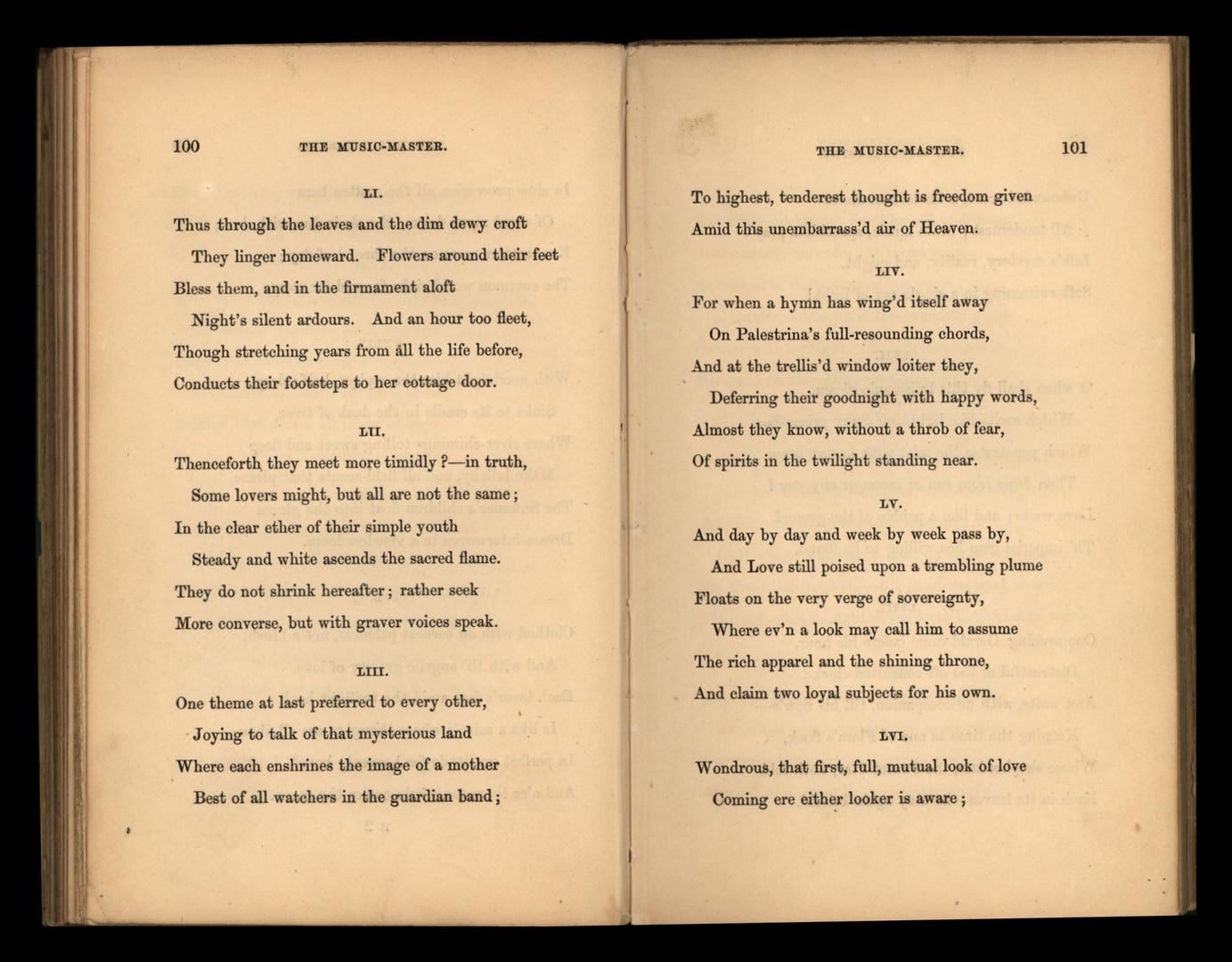
THE MUSIC-MASTER.
To highest, tenderest thought is freedom given
Amid this unembarrass'd air of Heaven.
LIV.
For when a hymn has wing'd itself away
On Palestrina's full-resounding chords,
.And at the trellis'd window loiter they,
Deferring their goodnight with happy words,
Almost they know, without a throb of fear,
Of spirits in the twilight standing near.
LV.
.And day by day and week by week pass by,
And Love still poised upon a trembling plume
Floats on the very verge of sovereignty,
Where ev'n a look may call him to assume
'1'he rich apparel and the shining throne,
.And claim two loyal subjects for his own.
LVI.
Wondrous, that first, full, mutual look of love
Coming ere looker is aware;
102 THE MUSIC-MASTER.
Unbounded trust, a tenderness above
All tenderness; mute music, speechless pray'r
Life's mystery, reality, and might,
Soft-swimming in a single ray of light!
LVII.
o when shall fly this talismanic gleam,
Which melts like lightning every prison-bar,
Which penetrates the mist with keener beam
Than flows from sun or moon or any star?
Love waits; and like a pebble of the ground
Th' imperial gem lies willing to be found.
LVIII.
One evening, Gerald ·came before his hour,
Distrustful of the oft·consulted clock;
And waits, with no companion, till his flow'r-
Keeping the time as one of Flora's flock,
Whose shepherdess, the Sunset Star, doth fold
Each in its lellves- he may again behold.
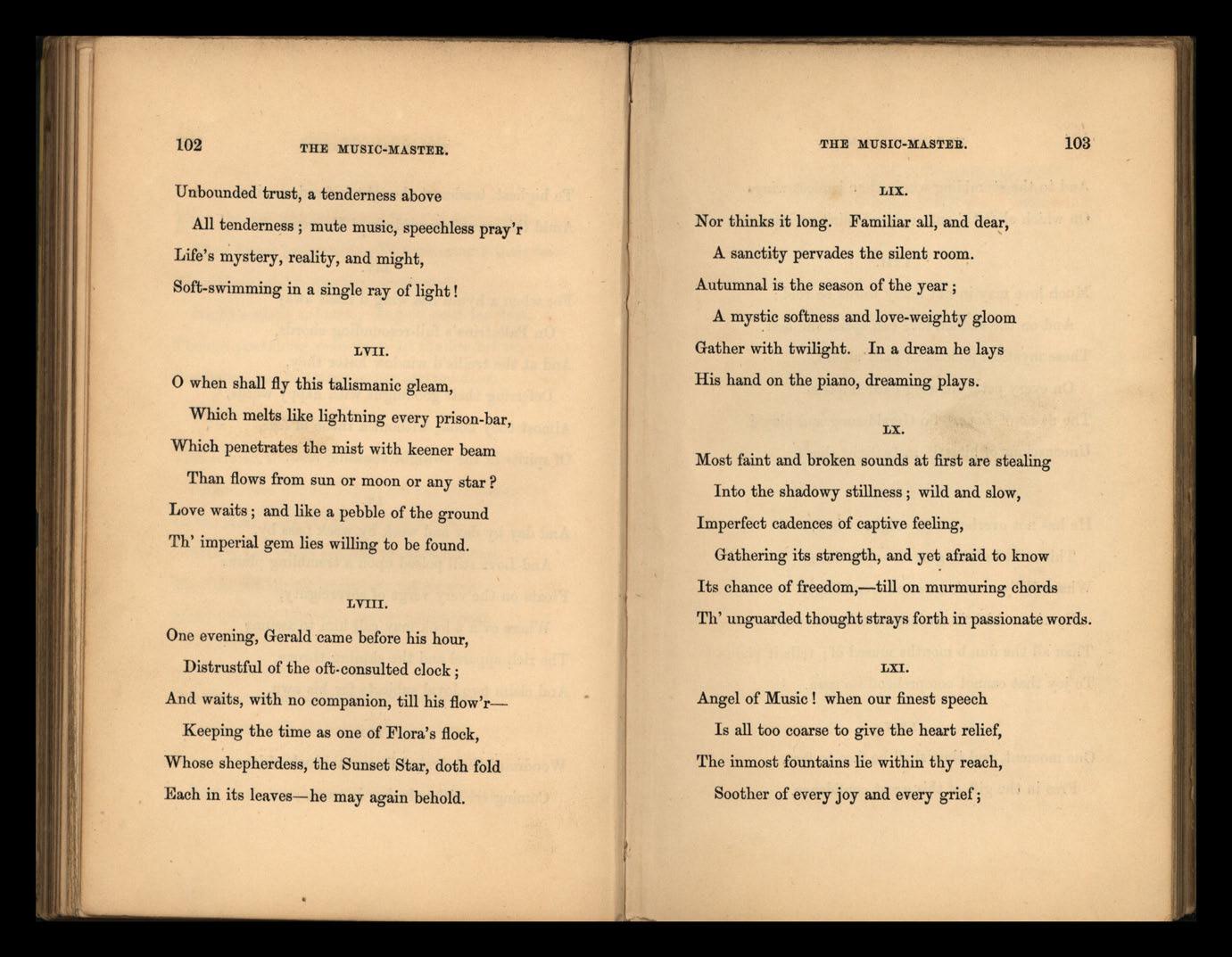
-THE MUSIC-MASTER.
LIX.
Nor thinks it long. Familiar all, and dear,
A sanctity pervades the silent room.
Autumnal is the season of the year;
A mystic softness and love-weighty gloom
Gather with twilight. In a dream he lays
His hand on the piano, dreaming plays.
LX.
Most faint and broken sounds at first are stealing
Into the shadowy stillness; wild and slow,
Imperfect cadences of captive feeling,
Gathering its strength, and yet afraid to know
Its chance of freedom,-till on murmuring chords
Th' unguarded thought strays forth in passionate words.
LXI.
Angel of Music! when our finest speech
Is all too coarse to give the heart relief,
The inmost fountains lie within thy reach,
Soother of every joy and every grief;

THE MUSIC-MASTER.
And to the stumbling words thou lendest wings
On which aloft th' enfranchised spirit springs.
LXII.
Much love may in not many words be told;
And on the sudden love can speak the best.
These mystical melodious buds unfold,
On every petal showing clear imprest
The name of Love. So Gerald sung and play'd
Unconscious of himself, in twilight shade.
LXIII.
He has not overheard (0 might it be !)
This stifled sobbing at the open door,
Where Milly stands arrested tremblingly
By that which in an instant tells her more
Than all the dumb months mused of; tells it plain
To joy that cannot comprehend its gain.
LXIV.
One moment, ,and they shall be face to face,
Free in the gift of this great confidence,

104 T1IE ]dUSIO-MASTER.
And to the stumbling words thou lendest wings
TIlE MUSIC-lIASTER.
Wrapt in the throbbing calm of its embrace,
No more to disunite their spirits thence.
The myrtle crown stoops close to either brow,-
But ah! what alien voice distracts them now?
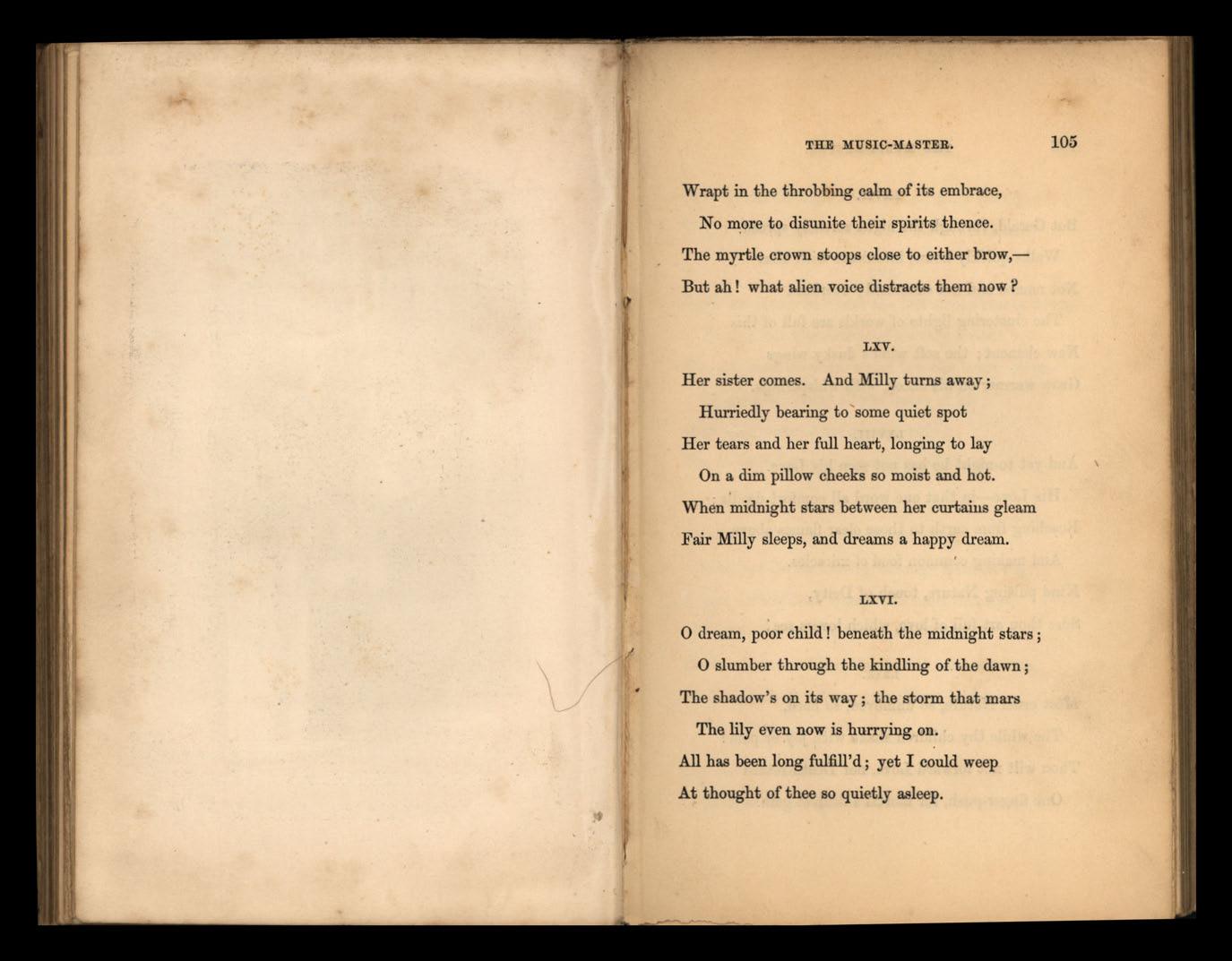
LXV.
Her sister comes. And Milly turns away;
Hurriedly bearing to some quiet spot
Her tears and her full heart, longing to lay
On a. dim pillow cheeks 80 moist and hot.
When midnight stars between her curtaius gleam
Fair Milly sleeps, and dreams a happy dream.
LXVI.
o dream, poor child! beneath the midnight stars; .I
o slumber through the kindling of the dawn;
The shadow's on its way; the storm that mar!>
The lily even now is hurrying on.
Ail has been long fulfill'd ; yet I could weep
At thought of thee 80 quietly asleep.
106 THE MUSIC-MASTER.
LXVII.
But Gerald, through the night serenely spread, Walks quickly home, intoxicate with bliss
Not named and not examined; overhead
The clustering lights of worlds are full of this
New element; the soft wind ' s dusky wings
Grow warmer on his cheek, with whisperings.
LXVIlI.
And yet to-night he has not seen his Love.
His Love-in ·that one word all comfort dwells;
Reaching from earth to those clear flames above,
And making common food of miracles.
Kind pulsing Nature, touch of Deity,
Sure thou art full of love, which lovers see!
LXIX.
Most cruel Nature, so unmoved, so hard,
'fhe while thy children shake with joy or pain !
Thou wilt not forward Love, nor Death retard
On e finger-push, for mortal's dearest gain.
THE MUSIC-MASTER
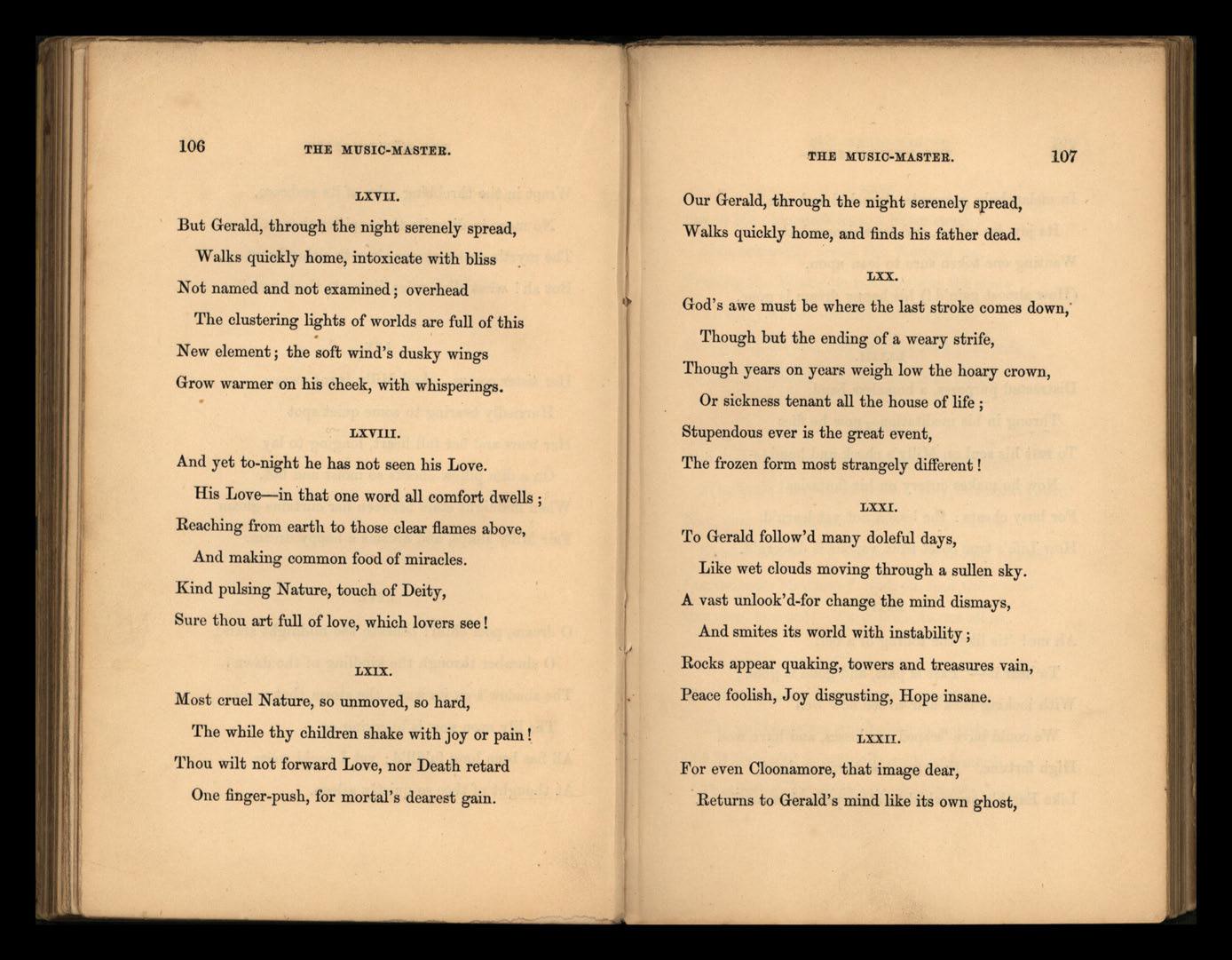
107
Our Gerald, through the night serenely spread, Walks quickly home, and finds his father dead. LXX.
God's awe must be where the last stroke comes down;
Though but the ending of a weary strife,
Though years on years weigh low the hoary crown,
Or sickness tenant all the house of life ;
Stupendous ever is the great event,
The frozen form most strangely different! LXXI.
To Gerald follow'd many doleful days,
Like wet clouds moving through a sullen sky.
A vast unlook'd-for change the mind dismays,
And smites its world with instability;
Rocks appear quaking, towers and treasures vain,
Peace foolish, Joy disgusting, Hope insane.
LXXII
For even Cloonamore, that image dear,
Returns to Gerald's mind like its own ghost,
THE MUSIC-MASTER.

108 THE MUSIC-MASTER.
In melancholy garments, drench'd and sere,
Its joy, its colour, and its welcome lost.
Wanting one token sure to lean upon,
(How almost gain'd!) his happy dream is gone.
LXXIII.
Distracted purposes, a homeless band,
Throng in his meditation-now he flies
To rest his soul on Milly's cheek and hand,-
Now he makes outcry on his fantasies
For busy cheats: the lesson not yet learn'd
How Life's true coast from vapour is discern'd.
LXXIV.
Ah me! 'tis like the tolling of a bell
To hear it--" Past is past, and gone is gone ;"
With looking back afar to see how well
We could have 'scaped our losses, and have won
High fortune. Ever greatest turns on least,
Like Earth's own whirl to atom poles decreased. "
109
LXXV.
For in the gloomiest hour a letter came,
Shot arrow-like across the Western sea,
Praising the West; its message was the same
AB many a time ere now had languidly
Dropp'd at his feet, but this the rude gale bore
To heart,-Gerald will quit our Irish shore.
LXXVI.
And quit his Love whom he completely loves;
Who loves him just as much ? Nay, downcast youth!
Nay, dear mild maiden!-Surely it behooves
That somewhere in the day there should be ruth
For innocent blindness? lead, oh, lead them now
One step, but one!-Their fates do not allow.
LXXVII.
The parting is brief and frosty dumb.
The unlike sisters stand alike unmoved;
For Milly's soul is wilder'd, weak, and numb,
That reft away which seem'd so dearly proved.
110 THE MUSIC-MASTER.
While thought and speech she struggles to recover
Her hand is prest-and he is gone for ever. LXXVIII.
Time speeds: on an October afternoon
Across the well-known view he looks his last;
The valley clothed with peace and fruitful boon,
The chapel where such happy hours were pass'd,
With rainbow-colour'd foliage round its eaves,
And windows all a-glitter through the leaves. LXXIX.
The cottage-smokes, the river ;-gaze no more,
Sad heart! although thou canst not, wouldst not shun
The vision future years will oft restore,
Whereon the light of many a summer sun,
The stars of many a winter night shall be
Mingled ill one strange sighing memory.

With never-halting pace from mark to mark, Blotting the sunshine; as it coldly sweeps,
Each living symbol melts into the dark,
And changes to the name of what it was ;-
Shade-measured light, progression proved by loss. IT.
Blithe Spring expanding into Summer's cheer,
Great Summer ripening into Autumn's glow,
The yellow Autumn and the wasted year,
And hoary-headed Winter stooping slow
Under the dark arch up again to Spring,
Have five times compass'd their appointed ring.
112 THE MUSIC-MASTER.
Ill.
See once again our village; with its street
Dozing in dusty sunshine. All around
Is silence; save, for slumber not unmeet,
Some spinning-wheel's continuous whirring sound
From cottage door, where, stretch'd upon his side,
The moveless dog is basking, drowsy-eyed.
IV.
Each hollyhock within each little wall
Sleeps in the richness of its crusted blooms;
Up the hot glass the sluggish blue flies crawl;
The heavy bee is humming into rooms
Through open window, like a sturdy rover,
Bringlllg with him warm scents of thyme and clover.
V.
From little cottage-gardens you almost
Smell the fruit ripening on the sultry air;
Opprest to silence, every bird is lost
In eave and hedgerow j save that here and there
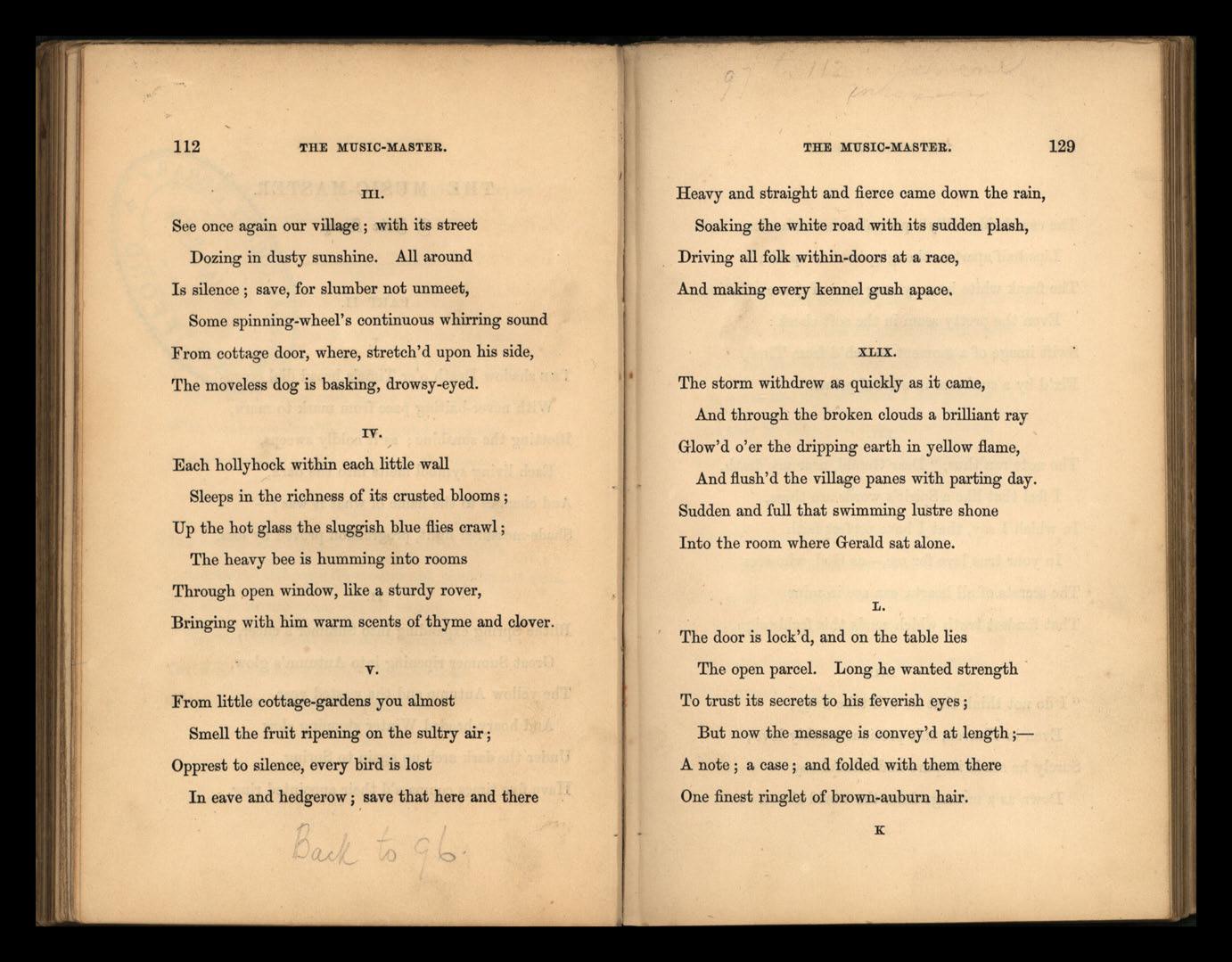
THE MUSIC-MASTER.
Heavy and straight and fierce came down the rain,
Soaking the white road with its sudden plash,
Driving all folk within-doors at a race,
And making every kennel gush apace. XLIX.
The storm withdrew as quickly as it came,
And through the broken clouds a brilliant ray
Glow'd o'er the dripping earth in yellow flame,
And flush'd the village panes with parting day.
Sudden and full that swimming lustre shone
Into the room where Gerald sat alone. L.
The door is lock'd, and on the table lies
The open parcel. Long he wanted strength
To trust its secrets to his feverish eyes j
But now the message is convey'd at length j-
A note; a case j and folded with them there
One finest ringlet of brown-auburn hair.
130 THE MUSIC-MASTER.
LI.
The case holds Milly's portrait-her reHection :
Lips half apart as though about to speak;
The frank white brow, young eyes of grave affection,
Even the pretty seam in the soft cheek:
Swift image of a moment snatch'd from Time,
Fix'd by a sunbeam in eternal prime.
LIl.
The note ran thus, " Dear Gerald, near my death,
I feel that like a Spirit's words are these,
In which I say, that I have perfect faith
In your true love for me,-as God, who sees
The secrets of all hearts, can see in mine
That fondest truth which sends this feeble sign.
LIII.
" I do not think that he will take away,
Even in Heaven, this precious earthly love;
Surely he sends its pure and blissful ray
Down as a message from the world above.
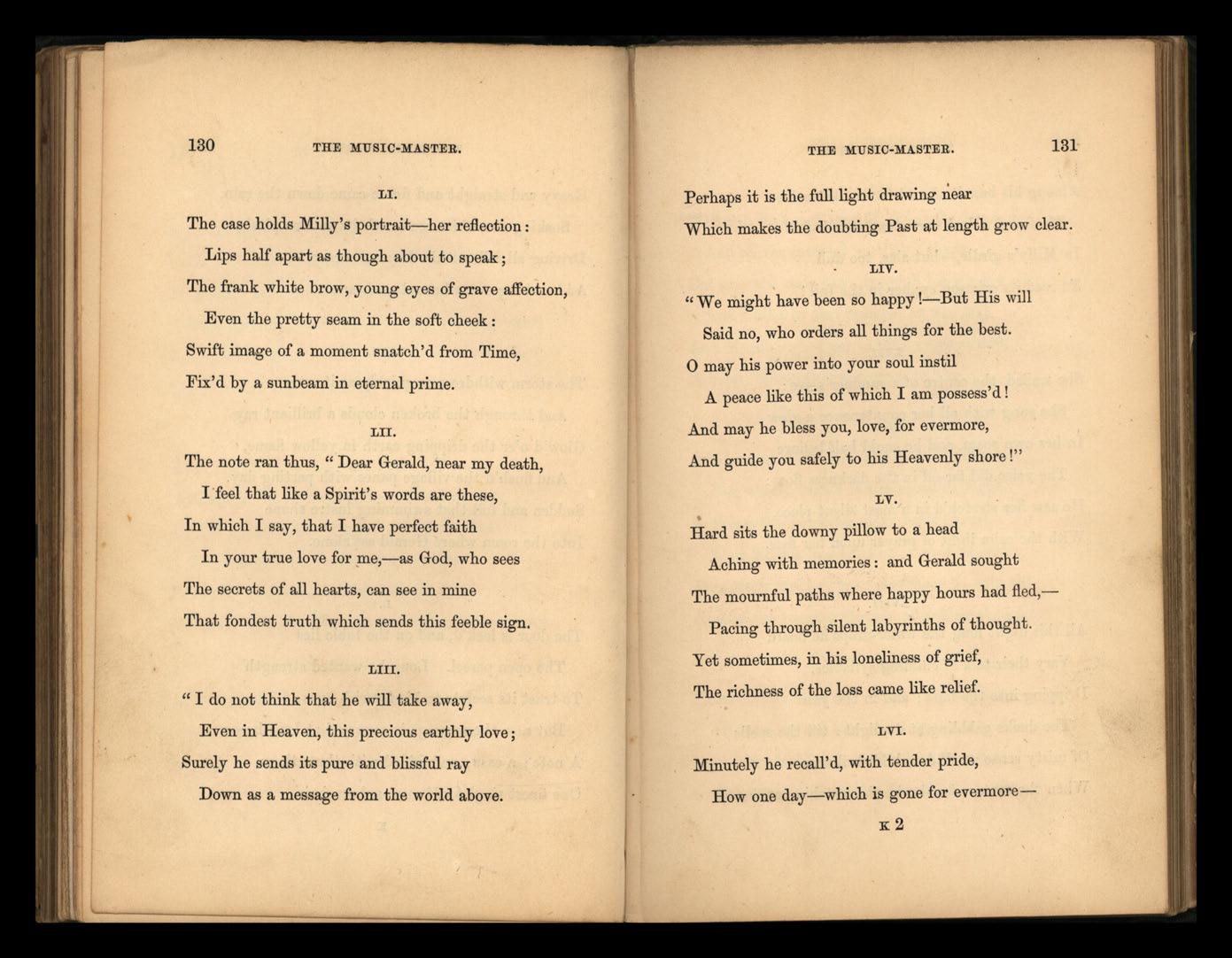
THE MUSIC-MASTER.
Perhaps it is the full light drawing
Which makes the doubting Past at length grow clear.
LIV.
"We might have been so happy!-But His will
Said no, who orders all things for the best.
o mar his power into your soul instil
A peace like this of which I am possess'd!
And may he bless you, love, for evermore,
And guide you safely to his Heavenly shore !"
LV.
Hard sits the downy pillow to a head
Aching with memories: and Gerald sought
The mournful paths where happy hours had Hed,-
Pacing through silent labyrinths of thought .
Yet sometimes, in his loneliness of grief,
The richness of the loss came like relief.
LVI.
Minutely he recall'd, with tender pride,
How one day-which is gone for evermOl'eK2
132 THE MUSIC-MASTER.
Among his bunch of wild flowers left aside ,
He found a dark carnation, seen before
In Milly's girdle,-but alas, too dull
To read its crimson cypher in the full ! LVII.
She smiled, the centre of a summer's eve:
She sung with all her countenance a-glow
In her own room, and he could hal£ believe
The voice did far-off in the darkness flow :
He saw her stretch'd in a most silent place,
With the calm light of prayer upon her face . LVIll.
All this night long the water-drops he heard
Vary their talk of chiming syllables,
Dripping into the butt; and in the yurd
The ducks gabbling at daylight: till the spells
Of misty sense recall'd a childish illness
When the same noises broke the watching stillness.
THE MUSIC-MASTER.
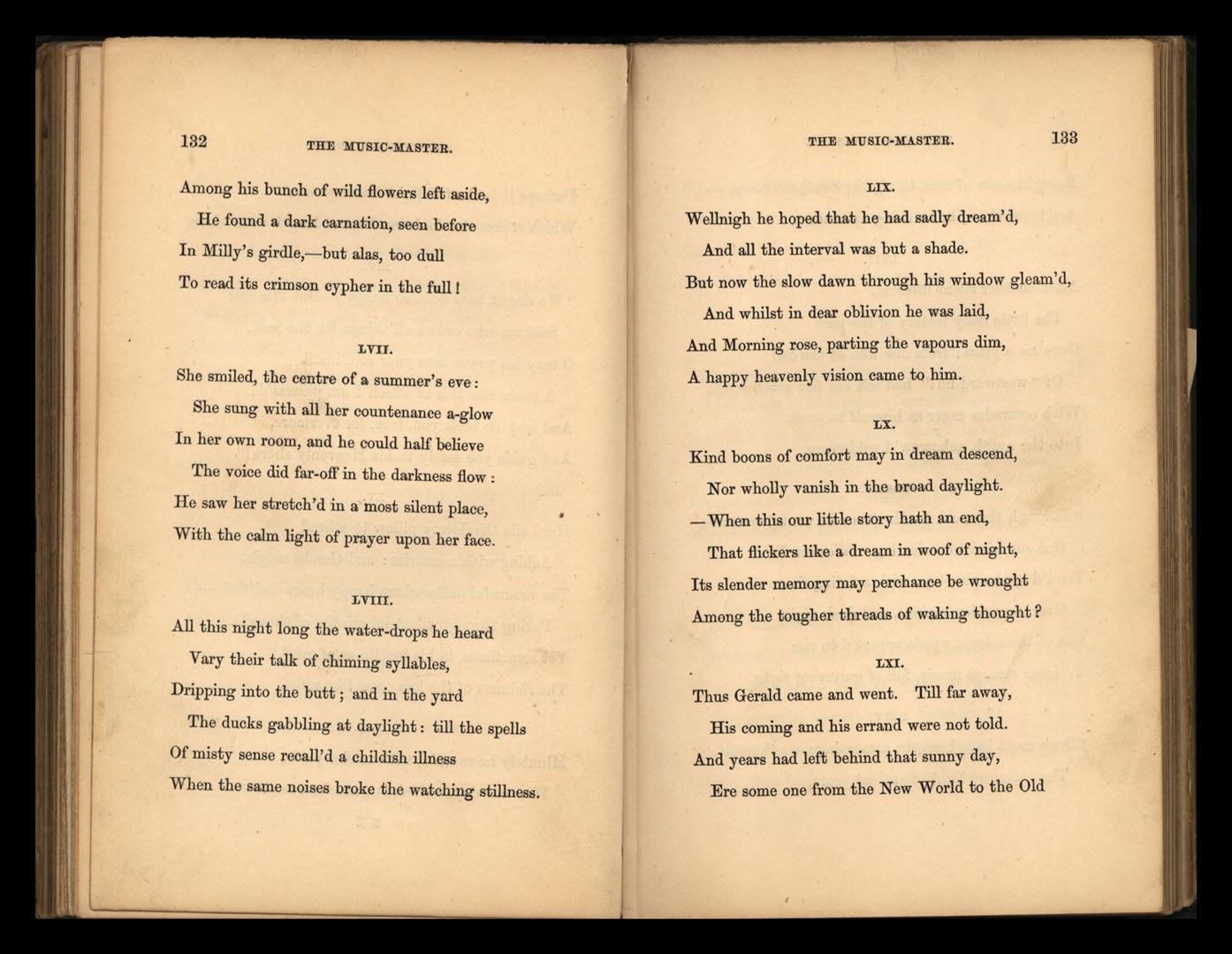
133
LIX.
Wellnigh he hoped that he had sadly dream'd,
And all the interval was but a shade.
But now the slow dawn through his window gl eam'u,
And whilst in dear oblivion he was laid,
And Morning rose, parting the vapours dim,
A happy heavenly vision came to him.
LX.
Kind boons of comfort may in dream descend,
Nor wholly vanish in the broad daylight .
- When this our little story hath an end,
That flickers like a dream in woof of night, Its slender memory may perchance be wrought
Among the tougher threads of waking thought?
LXI.
Thus Gerald came and went. Till far away,
His coming and his errand were not told.
And years had left behind that sunny day,
Ere some one from the New World to the Old
134 THE MUSIC-MASTER.
Brought news of him, in a great Southern town,
Assiduous there, but seeking no renown. LXII.
After another silent interval,
The little daily lottery of the post
Gave me a prize; from one who at the call
Of" westward ho!" had left our fair green coast,
With comrades eager as himself to press
Into the rough unharrow'd wilderness. LXIII.
"Through these old forests (thus he wrote) we came
One sundown to a clearing. Western light
Burn'd in the pine-tops with a fading flame
Over untrodden regions, and dusk night
Out of the solemn woods appear'd to rise
To some strange music, full of quivering sighs. LXIV.
" Such must have been the atmosphere, we thought,
The visionary light of ancient years,
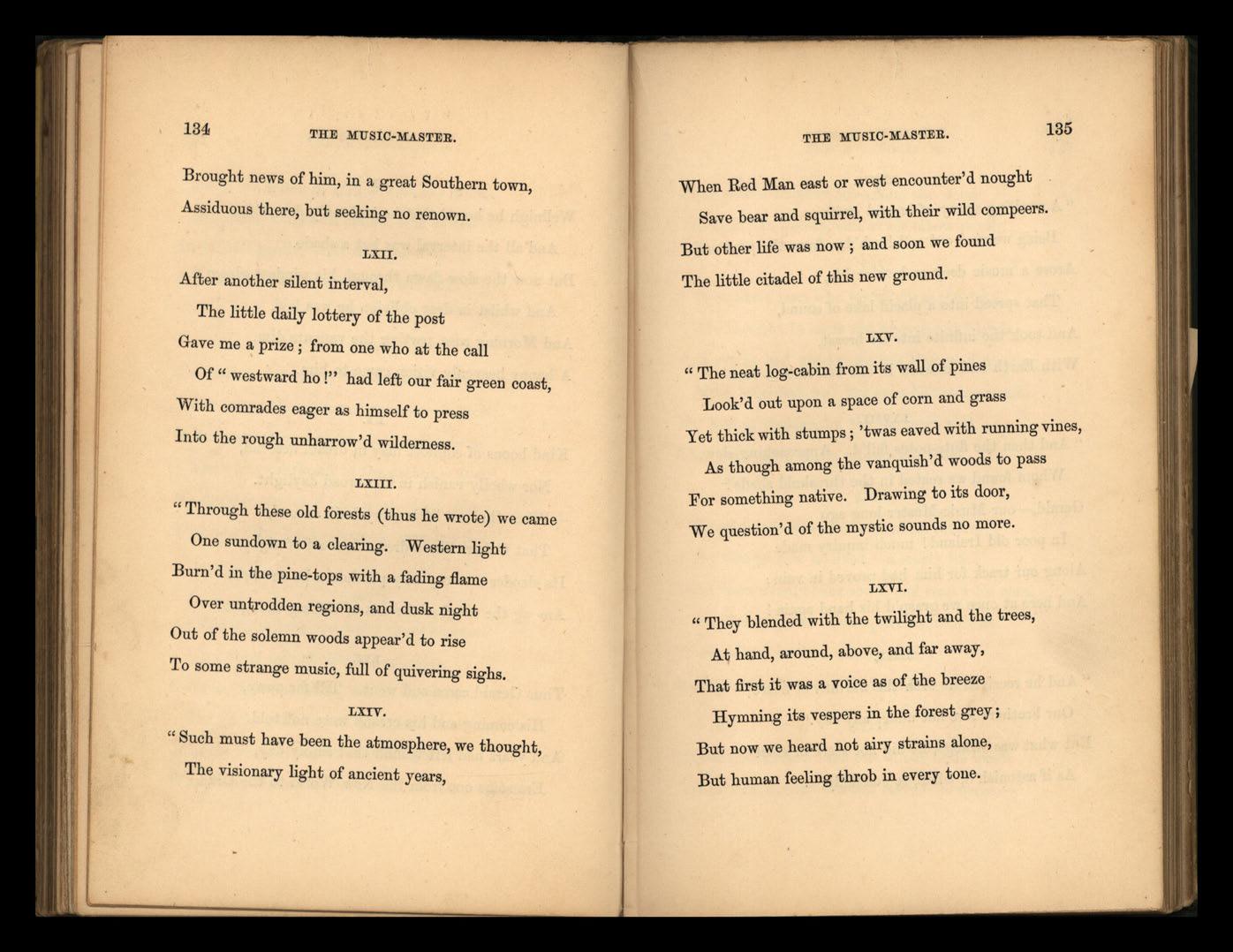
135
THE MUSIC-MASTER.
When Red Man east or west encounter'd nought
d . reI with their wild compeers. Save bear an sqUlr ,
But other life was now; and soon we found
The little citadel of this new ground.
LXV.
b · f .ts wall of pines
" The neat log-ca m rom 1
Look'd out upon !I. space of corn and grass
Yet thick with stumps; 'twas eaved with running vines,
As though among the vanquish'd woods to pass
th ' native Drawing to its door, For some mg . t · 'd of the mystic sounds no more. We ques lon
LXVI.
bl d d 'th the twilight and the trees, "They en e Wl
At hand, around, above, and far away,
That first it was a voice as of the breeze
Hymning its vespers in the forest grey;
But now we heard not airy strains alone,
But human feeling throb in every tone.
136 THE MUSIC-MASTER.
LXVII.
" A swelling agony of tearful strife
Being wearied out and hush'd,-from the profound
Arose a music deep as love or life,
That spread into a placid lake of sound,
.And took the infinite into its breast,
With Earth and Heaven in one embrace at rest.
LXVIll.
" .And then the flute-notes faiI'd. Approaching slow,
Whom found we seated in the threshold shade?
Gerald,-our Music-Master long ago
In poor old Ireland! much inquiry made
Along our track for him had proved in vain ;
.And here at once we grasp'd his hand again!
LXIX.
" And he received us with the warmth of heart
Our brothers lose not under any sky.
But what was strange, he did not stare or start
As if astonish'd, when, so suddenly,

THE MUSIC-MASTER.
Long-miss'd familiar faces from the wood
Emerged like ghosts, and at his elbow stood. LXX.
" Twas like a man who joyfully was greeting
(So thought I) some not unexpected friends .
And yet he had not known our chance of meeting
More than had we: but soon he made amends
For lack of wonder, by the dextrous zeal
That put before us no unwelcome meal. LXXI.
" We gave him all our news, and in return
He told us how he lived,-a lonely life !
Miles from a n eighbour sow'd and reap'd his corn,
.And hardy grew. One spoke about a wife
To cheer him in that solitary wild,
But Gerald only shook his head and smiled. LXXll.
"Next dawn, when each one of our little band
Had on a mighty Walnut carved his name,-
138 THE MUSIO-MASTER. -
Henceforth a sacred tree, he said, to stand 'Mid his enlarging bounds,-the moment came For farewell words. But long, behind our backs, We heard the echoes of his swinging axe."
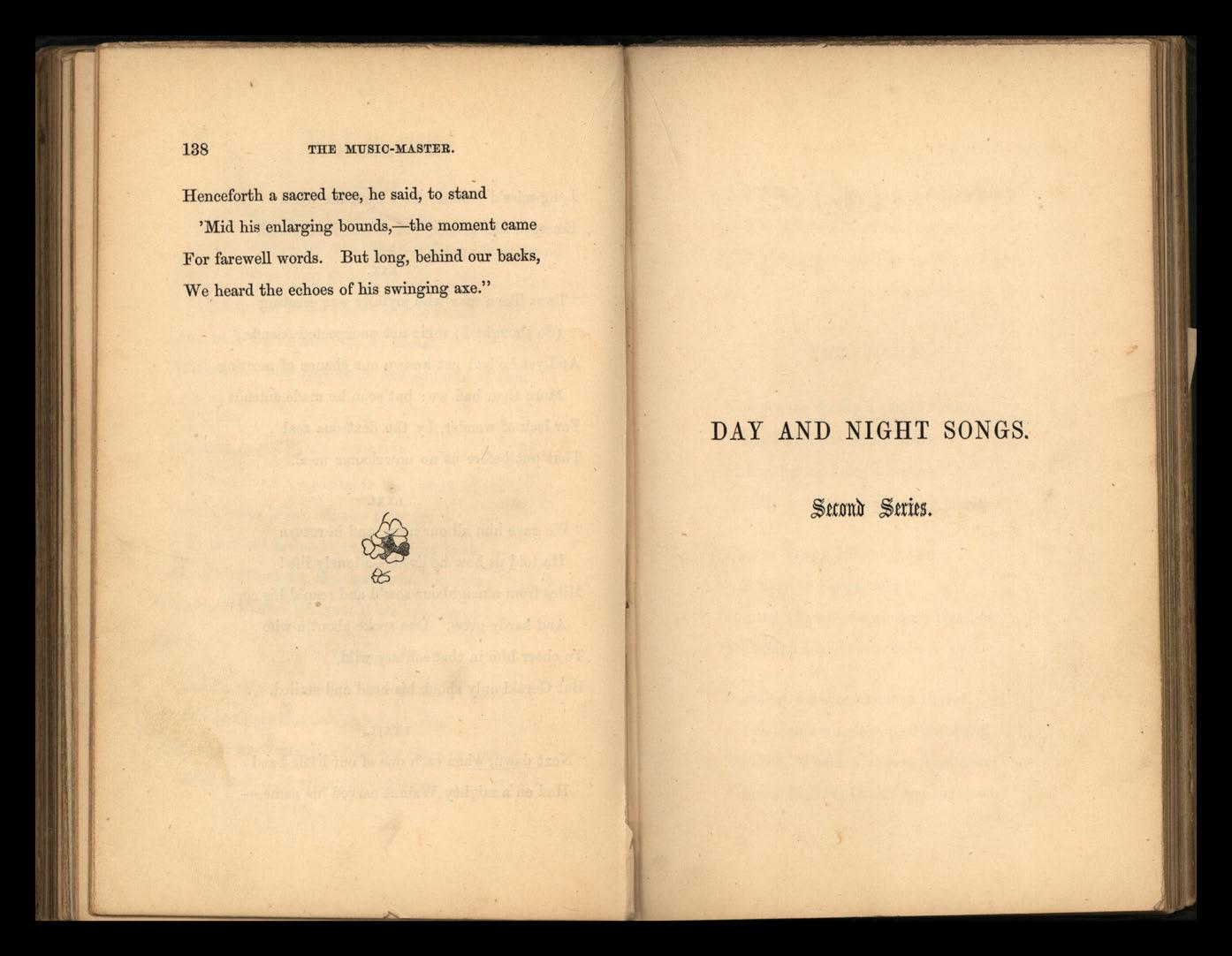
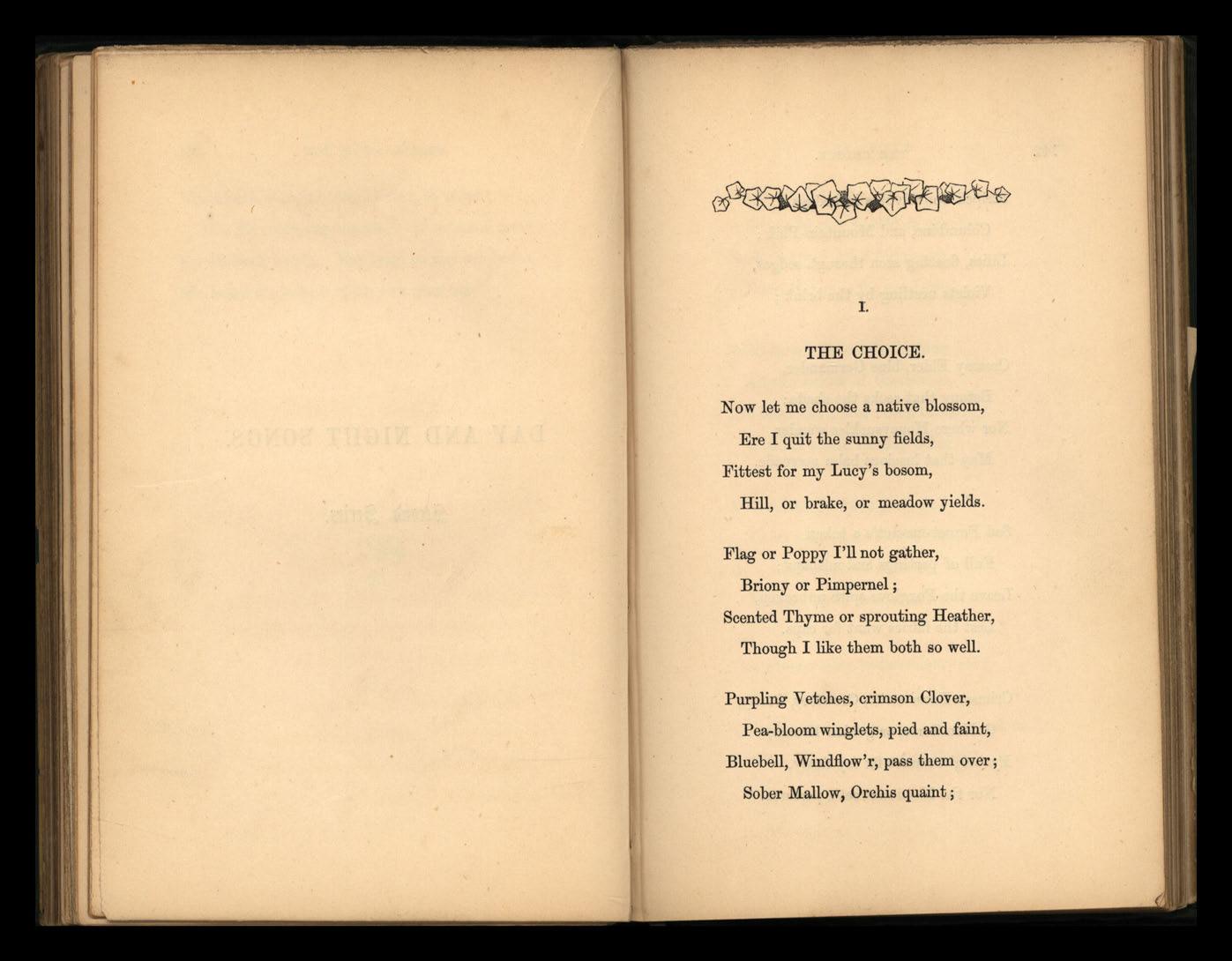
Now let me choose a native blossom, Ere I quit the sunny fields, Fittest for my Lucy's bosom, Hill, or brake, or meadow yields.
Flag or Poppy I'll not gather, Briony or Pimpernel; Scented Thyme or sprouting Heather, Though I like them both so well.
Purpling Vetches, crimson Clover, Pea-bloom winglets, pied and faint,
Bluebell, Windflow'r, pass them over; Sober Mallow, Orchis quaint;
Striped Convolvulus in hedges,
Azure, scarlet, pink, or pearly, Columbine, and Mountain-Pink;
Rustic friends in field or grove,-
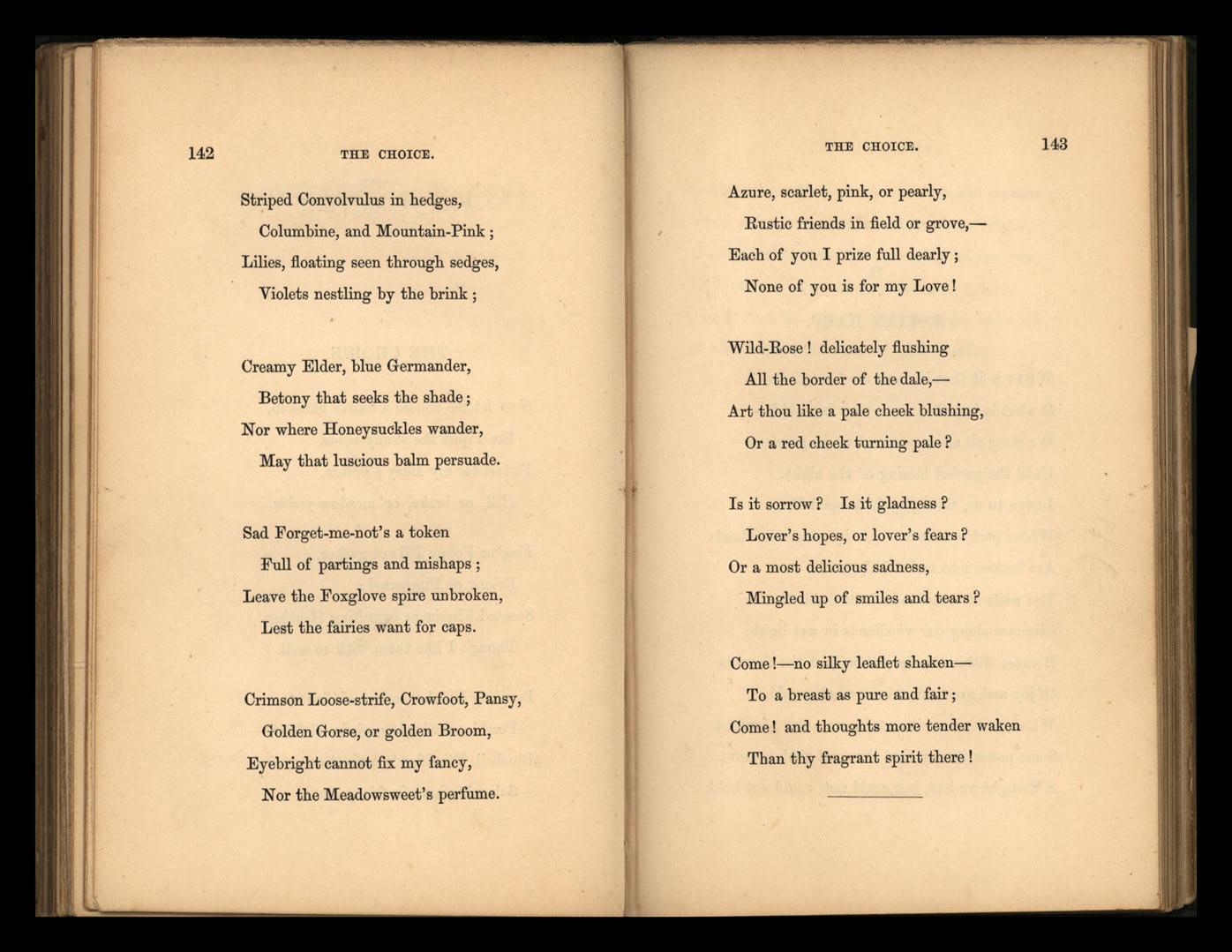
Lilies, floating seen through sedges,
Each of you I prize full dearly; Violets nestling by the brink ;
Creamy Elder, blue Germander,
Betony that seeks the shade;
Nor where Honeysuckles wander,
May that luscious balm persuade.
Sad Forget-me-not's a token
Full of partings and mishaps;
None of you is for my Love!
Wild-Rose! delicately flushing
All the border of the dale,-
Art thou like a pale cheek blushing,
Or a red cheek turning pale?
Is it sorrow? Is it gladness?
Lover's hopes, or lov er's fears?
Or a most delicious sadness, Leave the Foxglove spire unbroken , Mingled up of smiles and tears?
Lest the fairies want for caps.
Crimson Loose-strife, Crowfoot, Pansy,
Golden Gorse, or golden Broom,
Eyebright cannot fix my fancy,
Nor the Meadowsweet's perfume.
Come I-no silky leaflet shaken-
To a breast as pure and fair ;
Come! and thoughts more tender waken
Than thy fragrant spirit there!
JEOLIAN HARP.
WHA.T is it that is gone, we fancied ours?
o what is lost that never may be told?-
We stray all afternoon, and we may grieve
Until the perfect closing of the night.
Listen to us, thou grey Autumnal Eve,
Whose part is silence. At thy verge the clouds
Are broken into melancholy gold;
The waifs of Autumn and the feeble flow'rs
Glimmer along our woodlands in wet light;
B ecause within thy deep thou hast the shrouds
Of joy and great adventure, waxing cold,
Which onc e, or so it seem'd, were full of might.
Som e power it was, that lives not with us now,
A thought we had, but could not, could not hold.

EOLIA.N 145
o sweetly, swiftly pass'd I-air sings and murmurs j
Green leaves are gathering on the dewy bough:
o sadly, swiftly pass'd I-air sighs and mutters;
Red leaves are dropping on the rainy mould.
Then comes the snow, unfeatured, vast, and white.
o what is gone from us, we fancied ours?
THE PILOT'S PRETTY DAUGHTER.
O'ER western tides the fair Spring Day
Was smiling back as it withdrew,
And all the harbour, glittering gay,
Return'd a blithe adieu;
Great clouds above the hills and sea
Kept brilliant watch, and air wag free
Where last lark first -born star shall greet,-
Wh en, for the crowning vernal sweet,
Among the slopes and crags I meet
The Pilot's pretty Daughter.
Round her gentle, happy face,
Dimpled soft, and freshly fair,
Danced with careless ocean grace
Locks of auburn hair:

As lightly blew the veering wind,
They touch'd her cheeks, or waved behind,
Unbound, unbraided, and unloop'd;
Or when to tie her shoe she stoop'd,
Below her chin the half-curls droop'd,
And veil'd the Pilot's Daughter.
Rising, she toss'd them gaily back,
With gesture infantine and brief,
To fall around as soft a n eck
As the wild-rose's leaf.
Her Sunday frock of lilac shade
(That choicest tint) was neatly made,
And not too long to hide from view
The stout but noway clumsy shoe,
And stocking's smoothly-fitting blue,
That graced the Pilot's Daughter.
With look, half timid and half droll,
And then with slightly downcast eyes,
And blush that outward softly stole,-
Unless it were the skies
148 THE l'ILOT-'S l'RETTY DAUGHTER.
Whose sun-ray shifted on her cheek,-
She turn'd when I began to speak;
But 'twa a brightness all her own
Th at in her firm light step was shown,
And the clear cadence of her tone;
The Pilot's lovely Daughter!
Were it my lot, (the suduen wish)-
To hand a pilot's oar and sail,
Or haul the dripping moonlight mesh,
Spangled with herring-scale;
By dying stars, how sweet 'twould be,
And dawn-blow fr eshening the sea,
With weary, cheery pull to shore, '
To gain my cottage-home once more,
And clasp, before I reach the door,
My love, the Pilot's Daughter!
This element beside my feet
Allures, a tepid wine of gold;
One t.ouch, one taste, dispels the cheat, 'Tis salt and nipping cold:
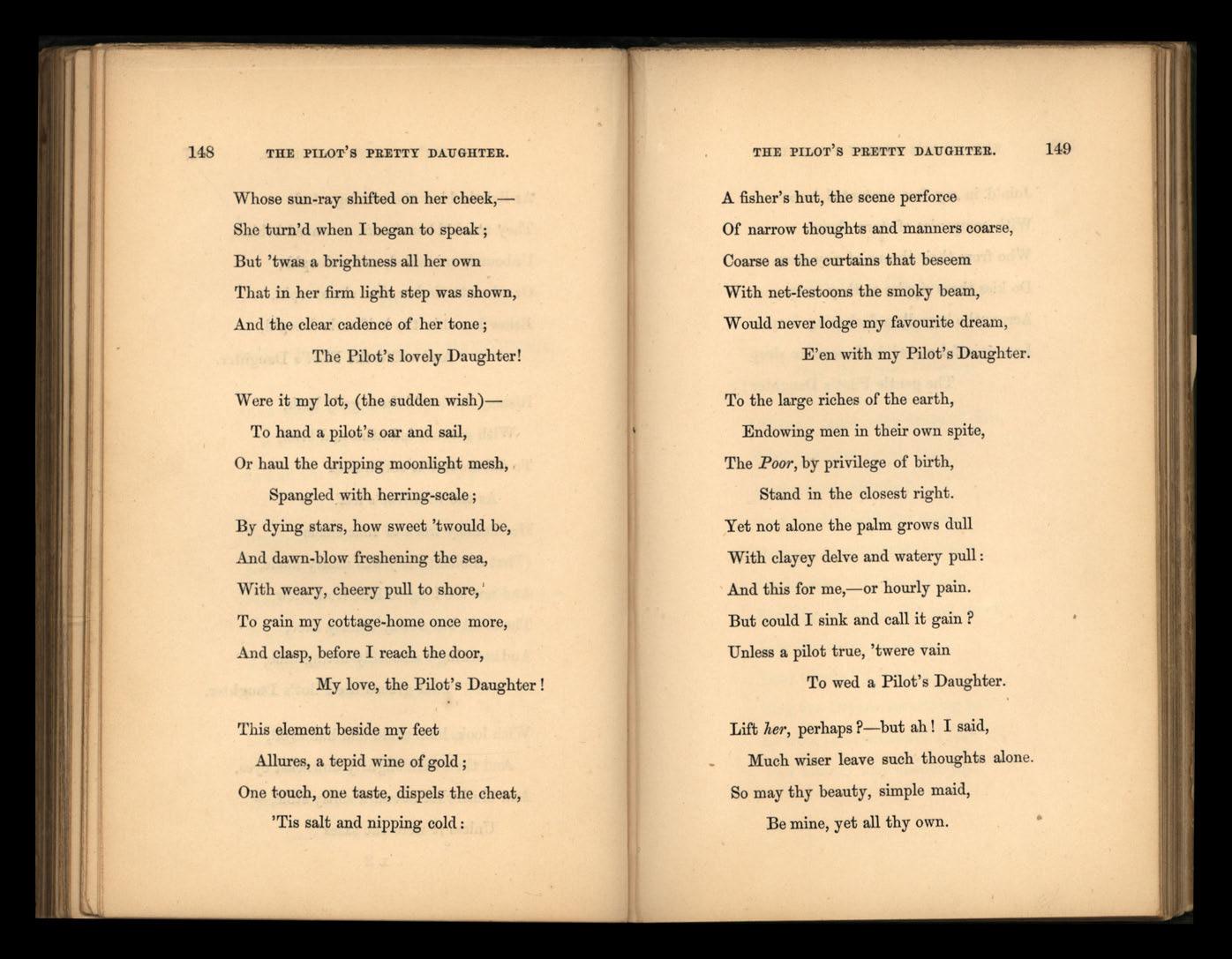
THE l'ILOT'S l'RETTY DAUGHTER.
A fisher's hut, the scene perforce
Of narrow thoughts and manners coarse,
Coarse as the curtains that beseem
With net-festoons the smoky beam,
Would never lodge my favourite dream ,
E'en with my Pilot's Daughter .
To the large riches of the earth,
Endowing men in their own spite,
The Poor, by privilege of birth,
Stand in the closest right.
Yet not alone the palm grows dull
With clayey delve and watery pull:
And this for me,-or hourly pain.
But could I sink and call it gain?
Unless a pilot true, 'twere vain
To weu a Pilot's Daughter.
Lift her, perhaps ?-but ah! I said,
Much wiser leave such thoughts alon e.
So may thy beauty, simple maid,
Be mine, yet all thy own. 149 •
150 TilE PILOT'S PRETTY DAUGIlTER.
Join'd in.my free contented love
With companies of stars above;
Who from their throne of airy steep
Do kiss these ripples as they creep
Across the boundless darkening deep,-
LolV voiceful wave! hush soon to sleep
The gentle Pilot's Daughter!
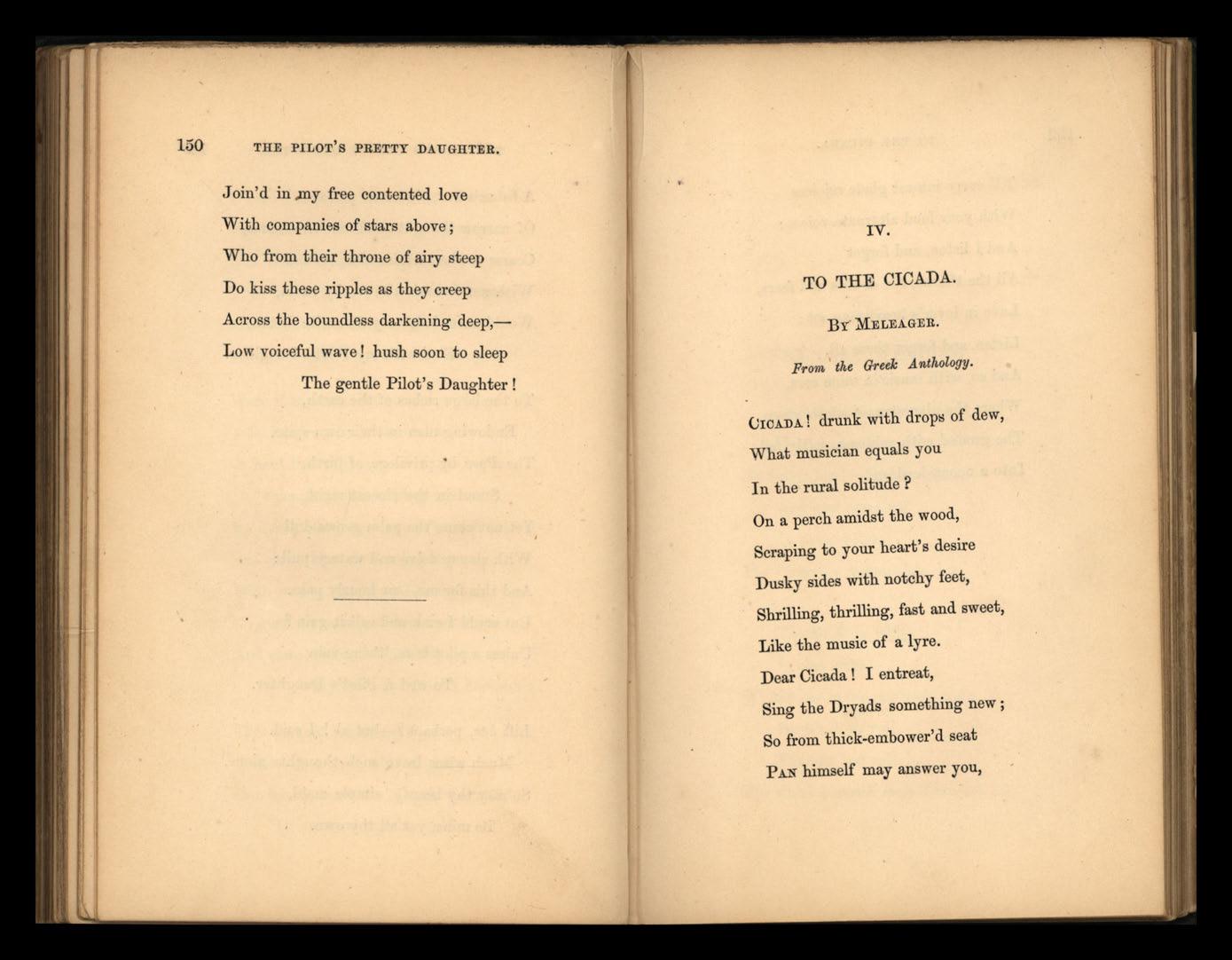
By MELE.A.GER.
From the Greek A mhology.
()IO.A.D.A.l drunk with drop!:! of dew,
What musician equals you
In the rural solitude?
On a perch amidst the wood,
Scraping to your heart's desire
Dusky sides with notchy feet,
Shrilling, thrilling, fast and sweet,
Like the music of a lyre.
Dear Cicada 1 I entreat,
Sing the Dryads something new; So from thick-embower'd seat
PAN himself may answer you,
TO THE OIOA1>.A..
Till every inmost glade rejoices
With your loud alternate voices;
And I listen, and forget
All the thorns, the doubts and fears
Love in lovp-r's heart may set;
Listen, and forget them all. ,
And so, with music in mine ears,
Where the plane-tree-shadows steep
The ground with coldness, softly fall
Into a noontide sleep.
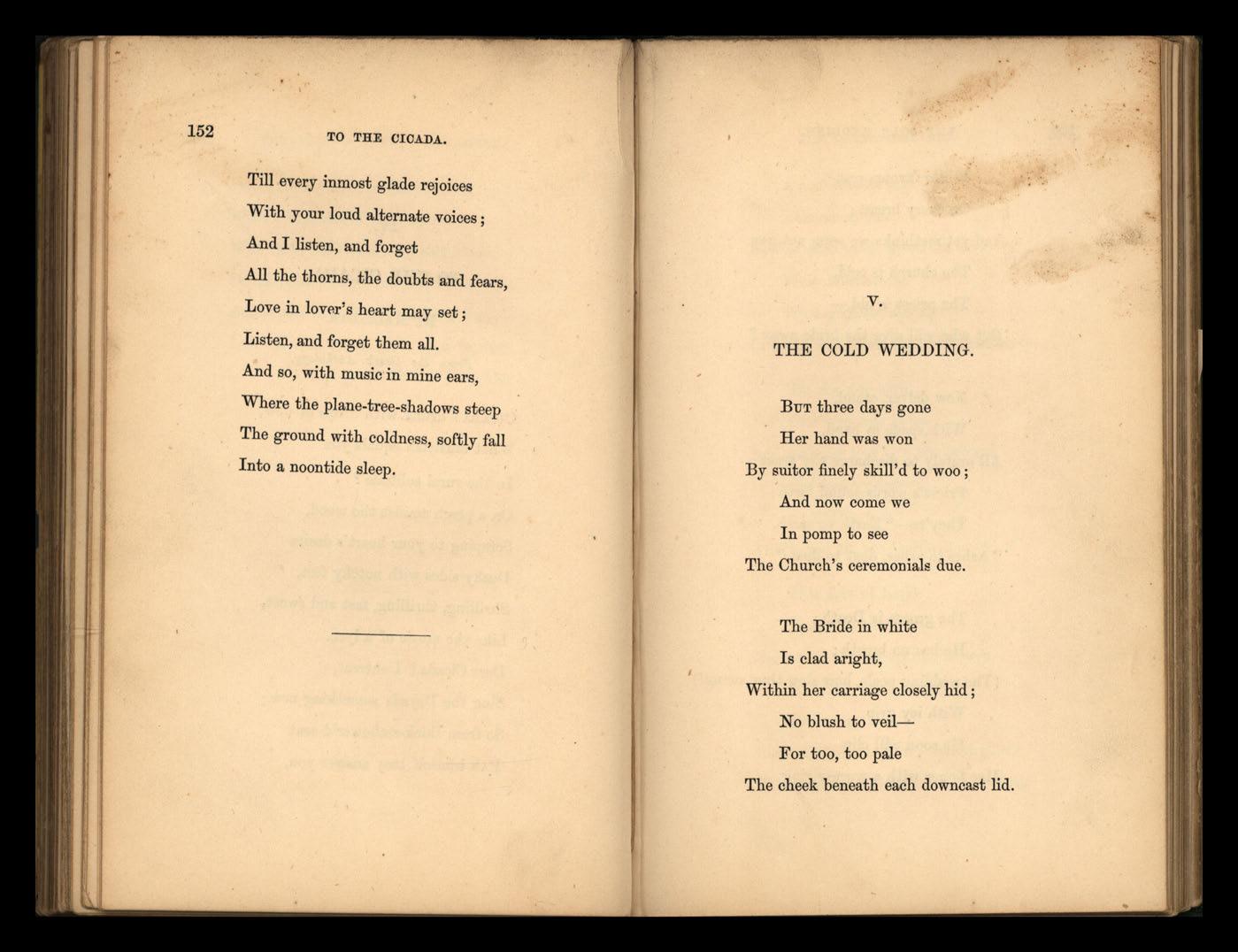
BUT three days gone
Her hand was won
By suitor finely skill'd to woo;
And now come we
In pomp to see
The Church's ceremonials due.
The Bride in white Is clad aright,
Within her carriage closely hid;
No blush to veil-
For too, too pale
The cheek beneath each downcast lid.
154 TilE COLD WEDDING.
White favours rest
On every breast j
And yet methinks we seem not gay.
The church is cold,
The priest is old,-
But who will give the bride away?
Now delver, stand,
With spade in hand,
All mutely to discharge thy trust:
Priest's words sound forth j
They're-" Earth to earth,
. " Ashes to ashes, dust to dust."
The groom is Death j
He has no breath j
(The wedding peals, how slow they swing!)
With icy grip
He soon will clip
Her finger with a wormy ring.
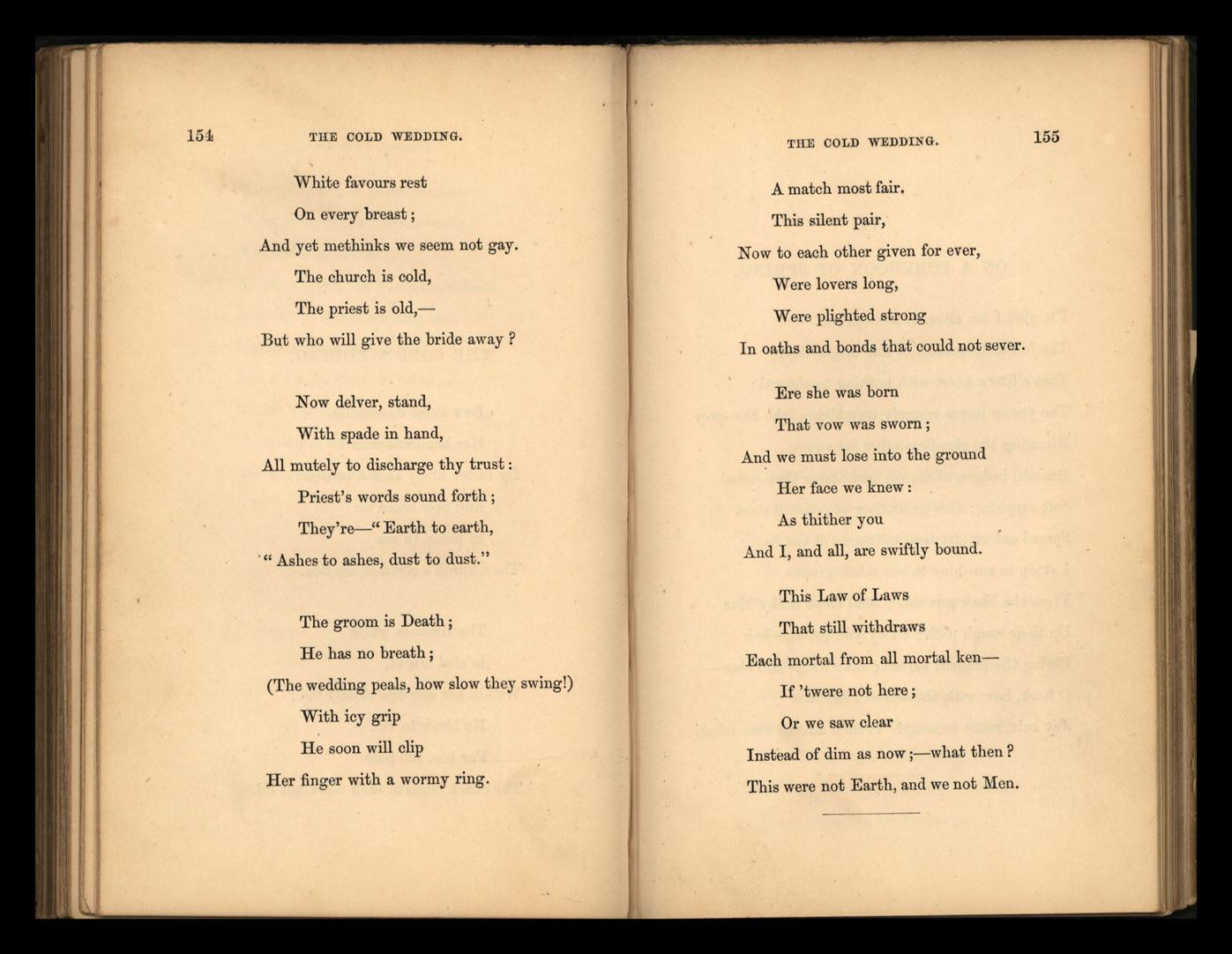
TIIE COLD WEDDING.
A match most fair.
This silent pair,
Now to each other given for ever,
Were lovers long, Were plighted strong
In oaths and bonds that could not sever.
Ere she was born
That vow was sworn j
And we must lose into the ground
Her face we knew:
As thither you
And I, and all, are swiftly bound .
This Law of Laws
That still withdraws
Each mortal from all mortal ken-
If 'twere not here j
Or we saw clear
Instead of dim as now j-what then?
This were not Earth, and we not Men.
I'M glad I am alive, to see and feel
The full deliciousness of this bright day,
That's like a heart with nothing to conceal;
The young leaves scarcely trembling; the blue-grey
Rimming the cloudless ether far away;
Brairds, hedges, shadows; mountains that ' reveal
Soft sapphire; this great floor of polish'd steel ,
Spread out amidst the landmarks of the bay.
I stoop in sunshine to our circling net
From the black gtmwale; tend these milky kine
Up their rough path; sit by yon cottage-door
Plying the diligent thread; take wings and soar-
o hark, how with the season's laureate
Joy culminates in song! If such a song were mine!
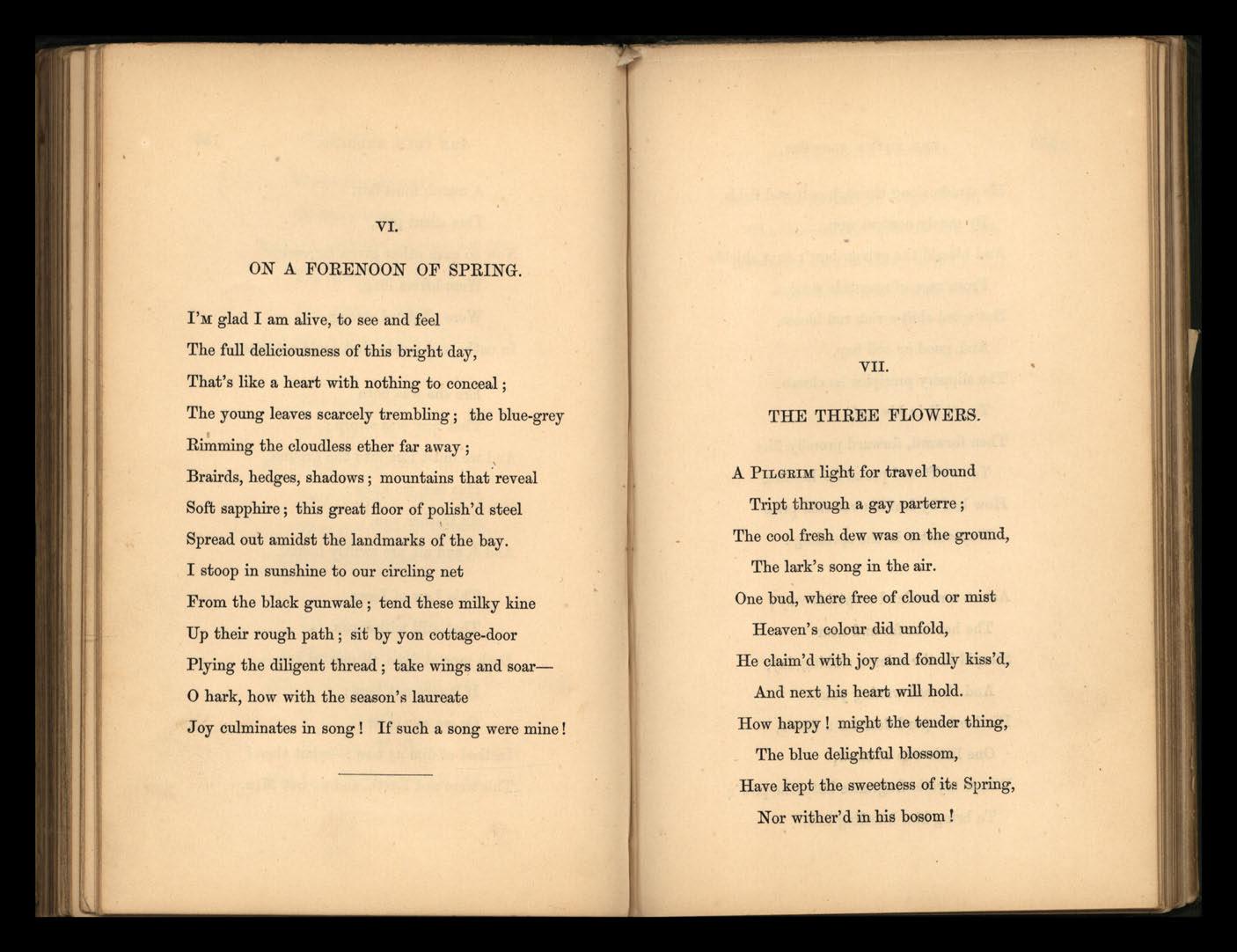
A PILGRIM light for travel bound
Tript through a gay parterre;
The cool fresh dew was on the ground,
The lark's song in the air.
One bud, where free of cloud or mist
Heaven's colour did unfold,
He claim'd with joy and fondly kiss'd,
And next his heart will hold.
How happy! might the tender thing,
The blue delightful blossom, Have kept the sweetness of Spring,
Nor wither'd in his bosom!
158 THE THREE FLOWERS.
He strode along through cultured fields,
By manly contest won,
And bless'd the sylvan bow'r that shields
From rage of noontide sun;
But spied aloft a rich red bloom,
And, good or evil hap,
The slippery precipice he clomb
To set it in his cap.
Then forward, forward proudly flies,
Too swift and proud for heeding
How leaf by leaf his vaunted prize
May scatter in the speeding!
Across a moorland crept his way;
The heather far and near
Steep'd in the solemn sinking day,
And the sad waning year.
His bent regard descries a flow'r,
One little cup of snow,
Whose mystic fragrance hath the pow'r
To bring him kneeling low.

THE THREE FLOWERS.
All on the ground he dropt asleep;
The leaves made haste to hide him.
Above unrolls the starry deep;
A white flower nods beside him.
o WELCOME! friendly stars, one by one, two by two;
And the voices of the waterfall are toning in the air ;
Whilst the wavy landscape-outlines are blurr'd with falling dew;
As my rapture is with sadness, because I may not share,
And double it by sharing it with thee.
-Cloudy fire dies away on the sea.
Now the calm shadowy earth she lies musing like a saint;
She is wearing for a halo the pure circlet of the moon;
From the mountain breathes the night-wind, steadily, though faint;
As I am softly breathing, " Ah! might some heav'nly boon
Bestow thee, my belov'd one, to my side !"
-Like a full, happy heart flows the tide.

I BUILT my castle upon the sea-side,
The waves roll so gaily 0,
Half on the land and half in the tide,
Love me tr ue !
Within was silk, without was stone,
The waves roll so gaily 0,
It lacks a queen, and that alone,
Love me true!
The grey old harper sung to me,
The waves roll so gaily 0,
Beware of the damsel of the sea!
Love me true!
162 ST. MA.RGA.RET'S EVE.
Saint Margaret's Eve it did befal,
TlM waves roll so gaily 0,
The tide came creeping up the wall,
Love me true!
I open'd my gate; who there .should stand-
Tile waves roll so gaily 0, .
But a fair lady, with a cup in her hand,
Love me true!
The cup was gold, and full of wine,
Tile waves roll so gaily 0,
Drink, said the lady, and I will be thine,
Love me true!
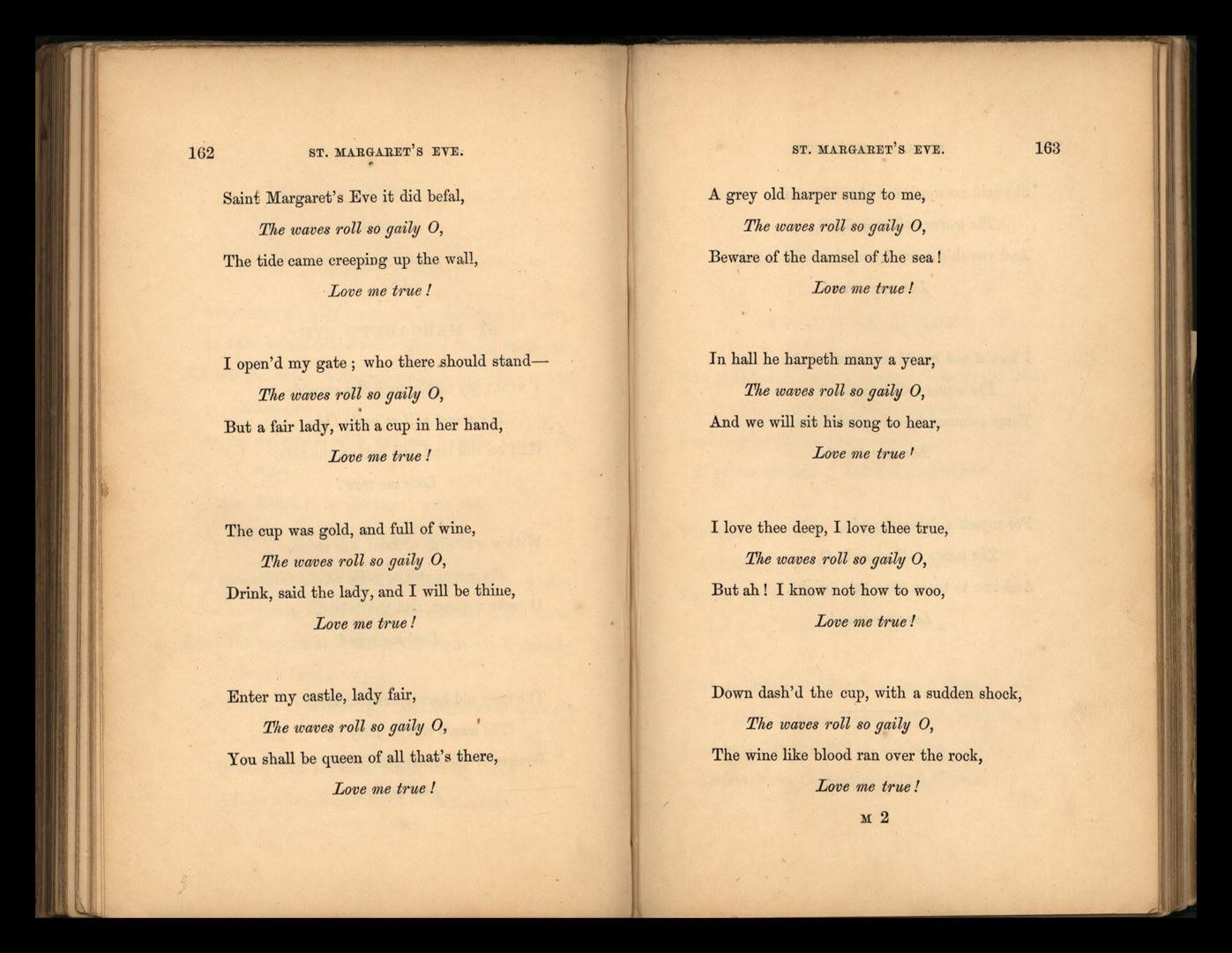
Enter my castl e, lady fair,
Tlte waves roll so gaily 0,
You shall be queen of all that's there,
Love me true!
ST. MA.RGA.RET'S EVE.
A grey old harper sung to me,
Tile waves roll so gaily 0,
Beware of the damsel of the sea!
Love me true!
In hall he harpeth many a year,
TI!e waves roll so gaily 0,
And we will sit his song to hear,
Love me true'
I love thee deep, I love thee true,
Tile waves roll so gaily 0,
But ah! I know not how to woo,
Love me true!
Down dash'J the cup, with a sudden shock,
Tlte waves roll so gaily 0,
The wine like blood ran over the rock,
Love me true!
M 2
163
164 ST. MARGARET'S EVE.
She said no word, but shriek'd aloud,
The waves roll so gail,!! 0,
And vanish'd away from where she stood,
Love me true!
I lock ' d and barr'd my castle door,
The waves roll so gaily 0,
Three summer days I grieveu sore,
Love me true!
For myself a day and night,
The waves roll so gaily 0,
And two to moan that lady bright,
Love me true!
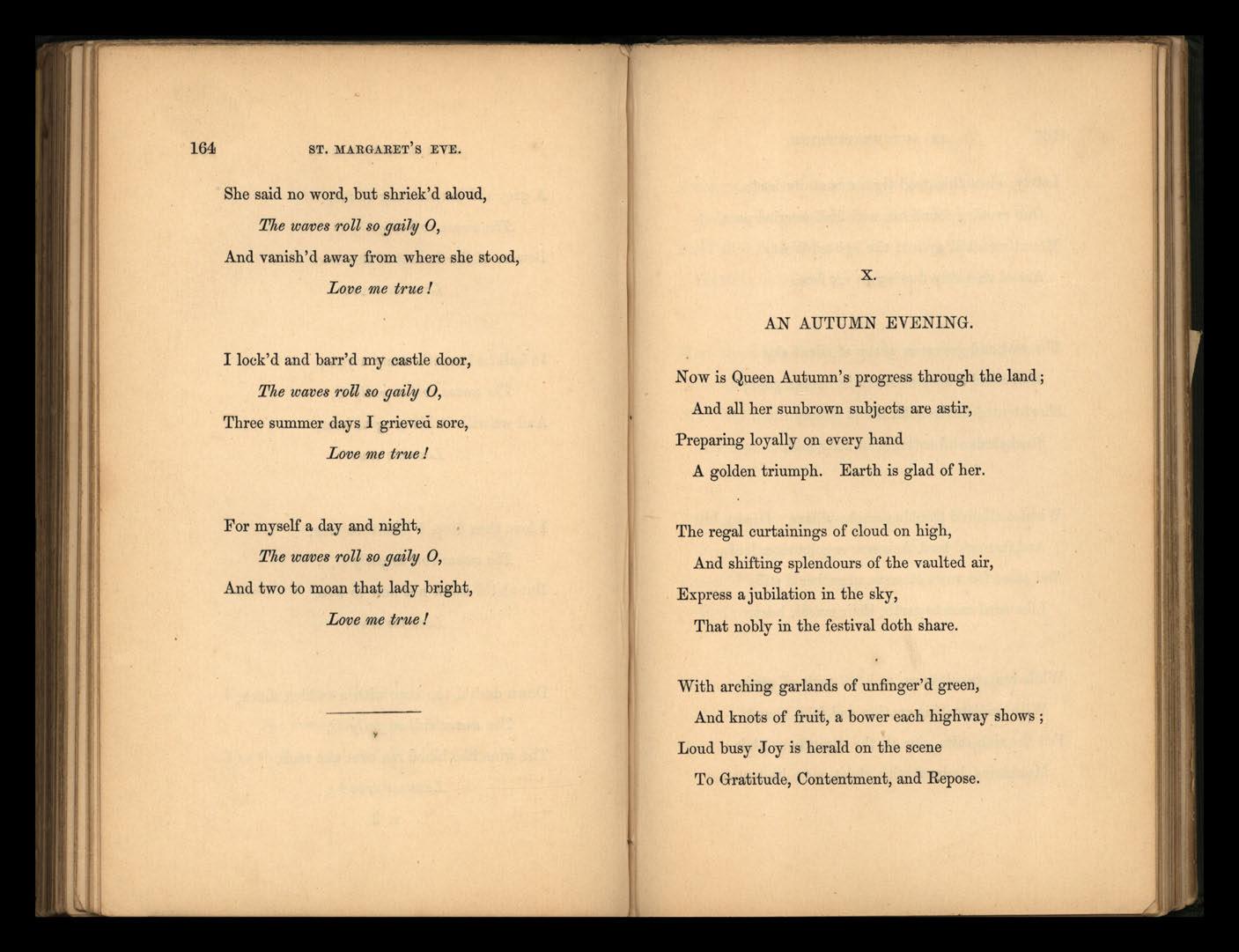
AN AUTUMN EVENING.
Now is Queen Autumn's progress through the land;
And all her sunbrown subjects are astir,
Preparing loyally on every hand
A golden triumph. Earth is glad of her.
The regal curtainings of cloud on high,
And shifting splendours of the vaulted air,
Express ajubilation in the sky,
That nobly in the festival doth share.
With arching garlands of unfinger'd green,
And knots of fruit, a bower each highway shows;
Loud busy Joy is herald on the scene
To Gratitude, Contentment, and Repose.
166 AN AUTUMN EVENING.
Lately, when this good time was at its
One evening found me, with half·wearied pace,
Mounting a hill against the lighted West,
A cool air softly flowing on my face.
The vast and gorgeous pomp of silent sky
Embathed a harvest realm in double gold;
Sheaf-tented fields of bloodless victory;
Stackyards and cottages in leafy fold,
Whence climb'd the blue smoke-pillars. Grassy hill
And furrow'd land their graver colourings lent;
And some few rows of corn, ungather'd still,
Like aged men to earth, their cradle, bent.
While reapers, gleaners, and full carts of grain,
With undisturbing motion and faint sound
Fed the rich calm, o'er all the sumptuous plain:
Mountains, imbued with violet, were its bound.
AN AUTUMN EVENING.
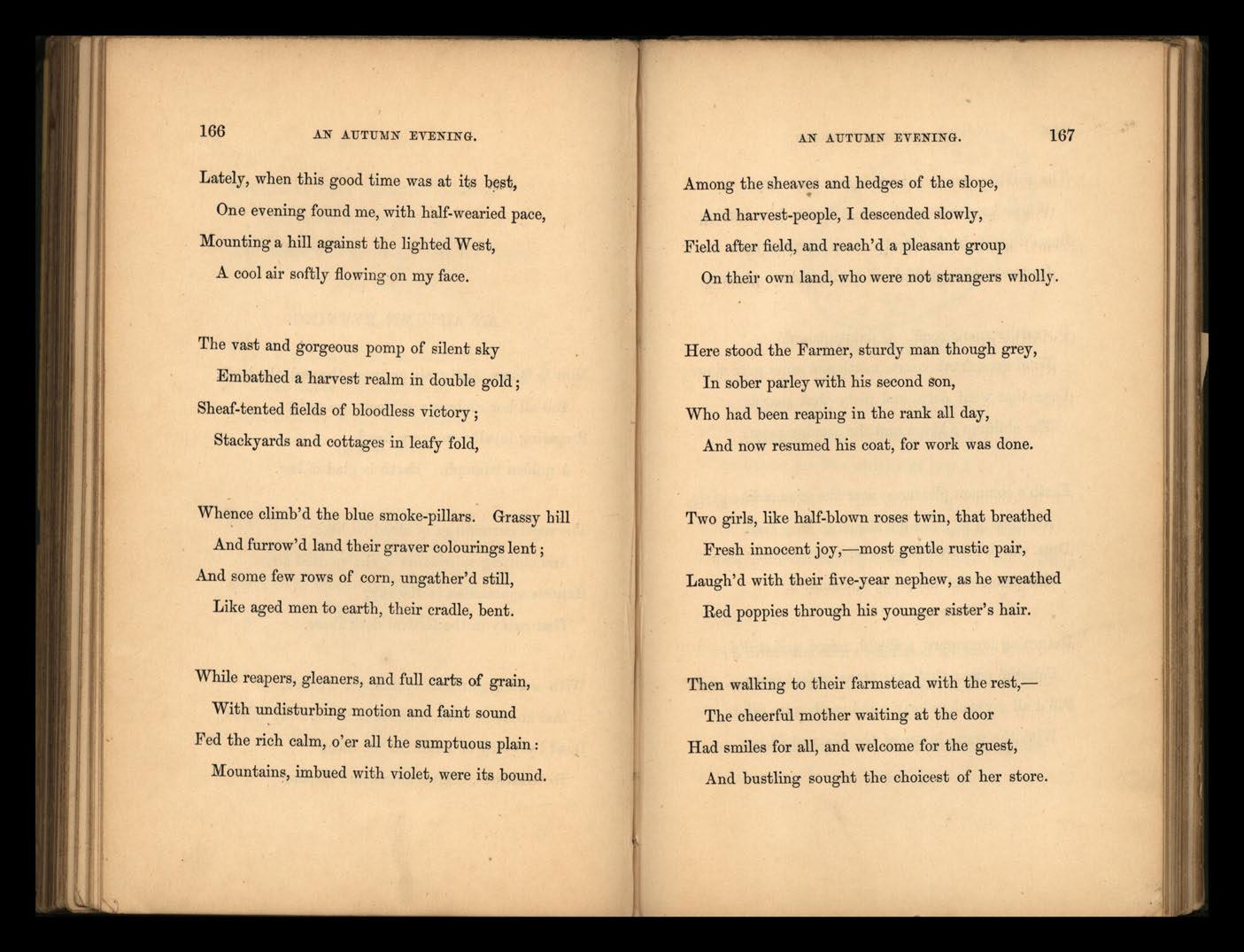
167
AmonO' the sheaves and hedges of the slope, " .
And harvest-people, I descended slowly,
Field after field, and reach'd a pleasant group
On their own land, who were not strangers wholly.
Here stood the Farmer, sturdy man though grey,
In sober parley with his second son,
Who had been reapillg in the rank all day,
And now resumed his coat, for work was done.
Two girls, like half-blown roses twin, that breathed
Fresh innocent joy,-most gentle rustic pair,
Laugh'd with their five-year nephew, as he wreathed
Red poppies through his younger sister's hair.
Then walking to their farmstead with the rest,-
The cheerful mother waiting at the door
Had smiles for all, and welcome for the guest,
And bustling sought the choicest of her store.
1U8 AN AUTUMN EVENING.
The children running to the pOOl' boy,
Whose crutches on the stool beside him leaning,
Seem'd in his book forgot,-with emulous joy
Bestow'd the handfuls of their flowery gleaning.
o wealthy rustic roof! 0 dainty board!
Kind eyes, frank voices, mirth and sense were there;
Love that went deep, and piety that soar'd;
The children's kisses and the evening pray'r.
Earth's common pleasures, near the ground like grass,
Are best of all; nor die although they fade:
Dear, simple household joys, that straightway pass
The precinct of devotion, undismay'd.
Returning homeward, soften'd, raised, and still'd;
Celestial peace, that rare, transcendant boon,
Fill'd all my soul, as heav'n and earth were fill'd
With the warm lustre of the Harvest Moon,
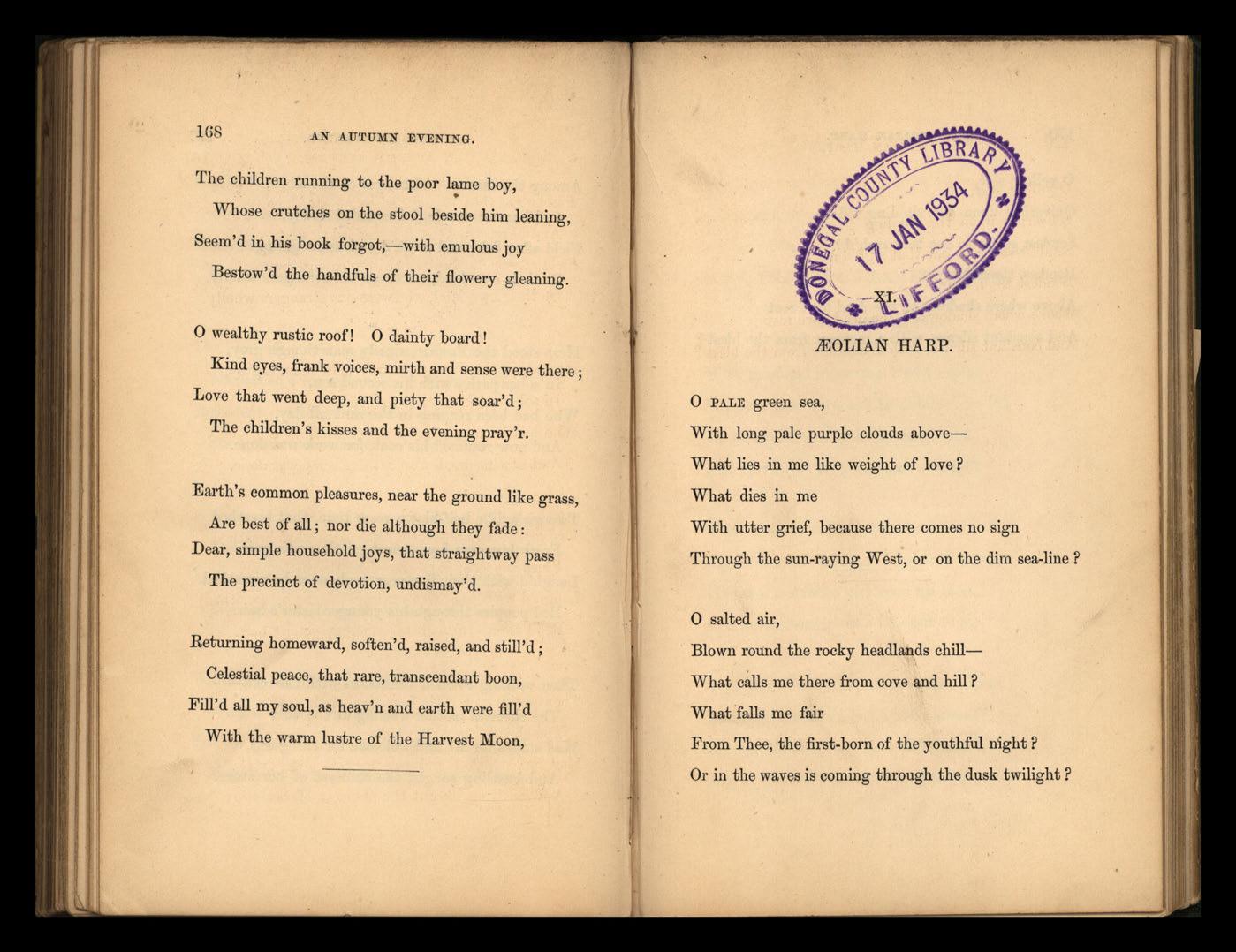
o PALE green sea,
With long pale purple clouds above-
What lies in me like weight of love?
What dies in me
With utter grief, because there comes no sign
Through the sun-raying West, or on the dim sea-line?
o salted air,
Blown round the rocky headlands chill-
What me there from cove and hill ?
What falls me fair
From Thee, the first-born of the youthful night?
Or in the waves is coming through the dusk twilight?
170 EOLli.N HARP.
o yellow star,
Quivering upon the rippling tide-
Sendest so far to one that sigh'd?
Bendest thou, Star,
Above where sh adows of the dead have rest
And constant sil ence, with a message from the blest?
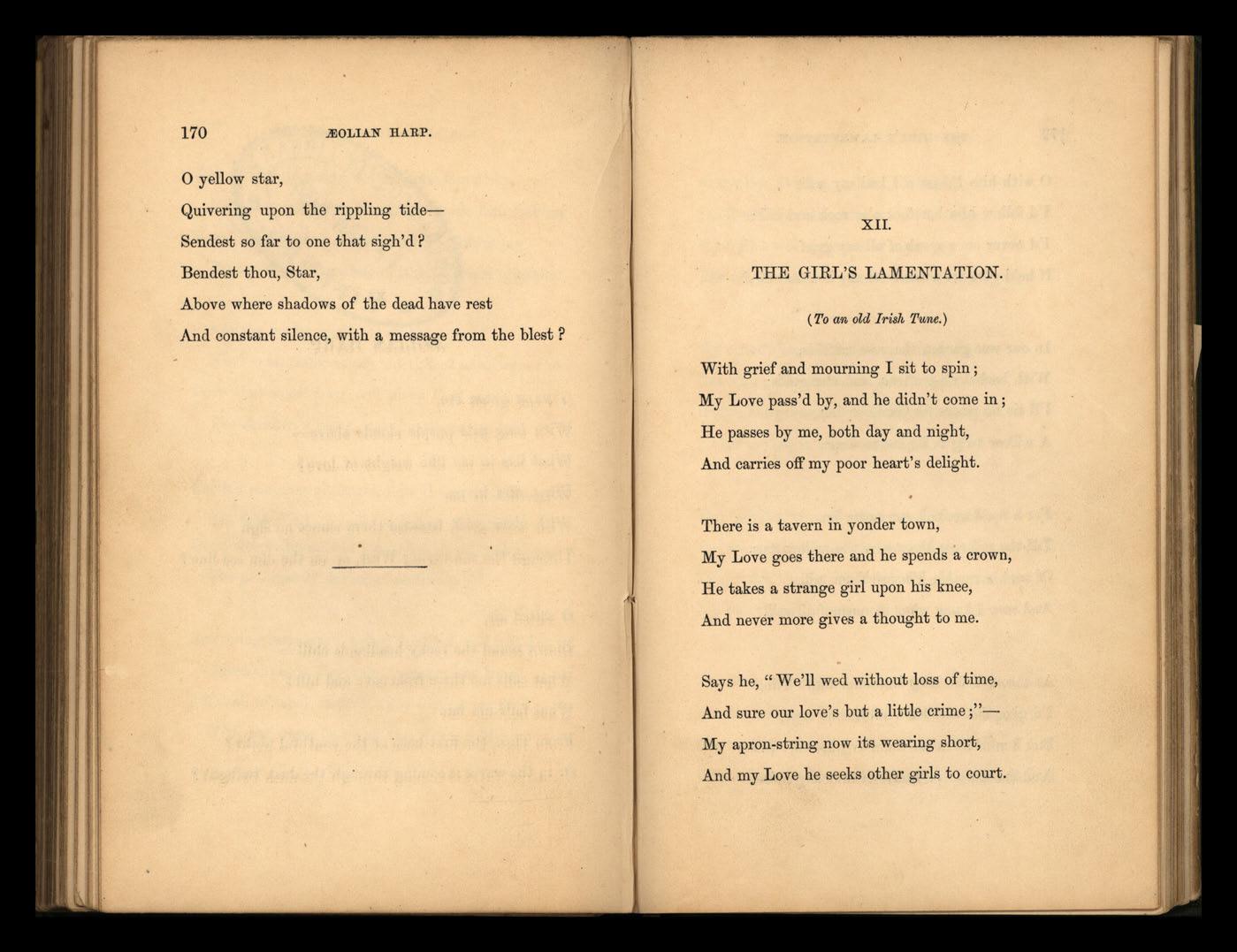
THE GIRL ' S LAMENTATION.
(To an old Imh Tune.)
With grief and mourning I sit to spin j
My Love pass'd by, and he didn't come in j
He passes by me, both day and night,
And carries off my poor heart's delight.
There is a tavern in yonder town,
My Love goes there and he spends a crown,
He takes a strange girl upon his knee ,
And never more gives a thought to me.
Says he, " W e'll wed without loss of time,
And sure our love's but a little crime j"-
My apron-string now its wearing short,
And my Love he seeks other girls to court.
172 THE GIRL'S LAMENTATION.
o with him I'd go if I had my will,
I'd follow him barefoot o'er rock and hill;
I'd never once speak of all my grief
If he'd give me a smile for my heart's relief.

THE GIRL'S r,.ur:ENTATION.
And what, 0 what will my mother say?
She'll wish her daugbter was in the clay.
My father will curse me to my face;
The neighbours will know of my black disgrace.
In our wee garden the rose unfolds,
With bachelor's-buttons, and marigolds;
I'll tie no posies for dance or fair,
A willow twig is for me to wear.
My sister's buried three years, come Lent;
But sure we made far too much lament.
Beside her grave they still say a prayer-
J wish to God it was I was there!
For a maid again I can never be,
Till the red rose blooms on the willow tree.
Of such a trouble I h eard them t ell,
And now I know what it means full well.
The Candlemas crosses hang near my bed;
To look on them puts me much in dread,
They mark the good time that's gone and past:
It's like this year's one will prove the last.
As through the long lonesome night I lie,
I'd give the world if I might but cry;
But I mus'n't moan there or raise my voice,
And the tears run down without any noise.
The oldest cross it's a dusty brown,
But the winter winds didn't shake it down; 173
The newest cross keeps the colour bright,-
When the straw was reaping my heart was light.
Th e reapers rose with the blink of morn,
And gaily stook'd up the yellow corn,
To call them home to the field I'd run,
Through the blowing breeze and the smnmer sun.
To the river-bank once I thought to go,
And cast myself in the stream below;
I thought 'twould carry us far out to sea,
Where th ey' d never find my poor babe and me.

When th e straw was weaving my heart was glad,
For neither sin nor shame I had,
In the barn where oat-chaff was flying round,
And the thumping flails made a pleasant sound.
Now summer or winter to me it's one;
But oh! for a day like the time that's gone.
I'd little care was it storm or shine,
If I had but peace in this heart of mine.
Oh! light and false is a young man's kiss,
And a foolish girl gives her soul for this.
Oh! light and short is the young man's blame,
And a helpless girl has the grief and shame.
Sweet Lord , forgive me that wicked mind!
You know I us ed to be well-inclined.
Oh, take compassion upon my state,
Because my trouble is so very great!
My head turns round with the spinning-wheel,
And a heavy cloud on my eyes I feel.
But the worst of all is at my heart's core;
For my innocent days will come back no more. 175
[NOTE. In some pa rts of Ireland (I have seen it ne ar Ballyshannon anu heard of it elsewhere) is a custom of weaving a small cross of straw at Candlemas, which is hung up in the cottage, sometimes over a hed. A n ew one is adued every year, and the old are left till th ey fall to pieces.]
XIII.
RING-TING ! I wish I were a Primrose,
A bright yellow Primrose blowing in the Spring!
The stooping boughs above me,
The wandering bee to love me,
The fern and moss to creep across,
And the Elm-tree for our king!
Nay-stay! I wish I were an Elm-tree,
A great lofty Elm-tree, with green leaves gay!
The winds would set them dancing,
The sun and moonshine glance in,
The Birds would house among boughs, And sweetly sing!
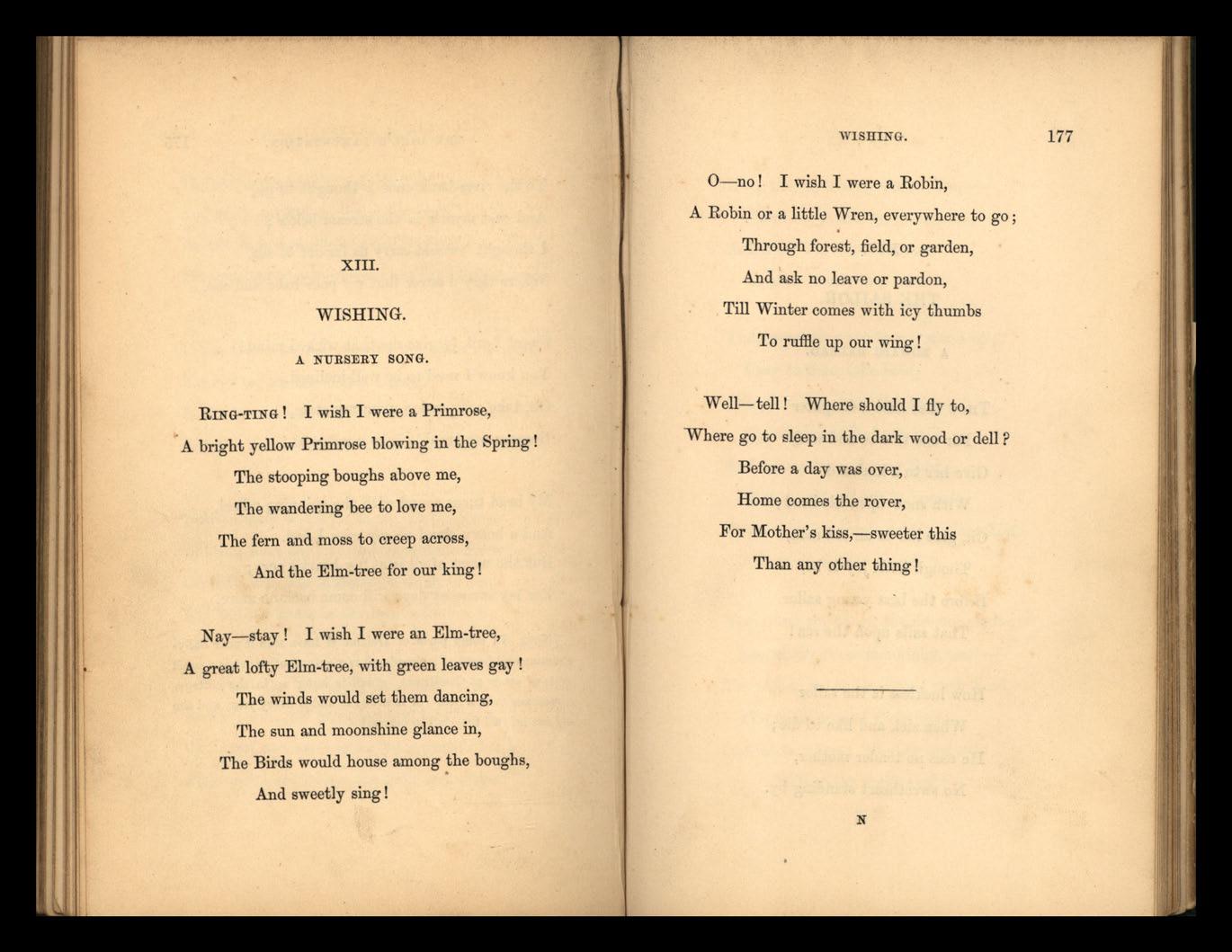
WISIIING.
O-no! I wish I were a Robin ,
A Robin or a little everywhere to go;
Through forest, field, or garden,
And ask no leave or pardon,
Till Winter comes with icy thumbs
To ruffle up our wing!
Well- tell! Where should I fly to,
Where go to sleep in the dark wood or dell ?
Before a day was over,
Home comes the rover,
For Mother's kiss,-sweeter this
Than any other thing!
XIV. THE SAILOR.
A. ROM.ilO BA.LLA.D.
THOU that hast a daughter
For one to woo and wed,
Give her to a husband
With snow upon his head;
Oh, give her to an old man,
Though little joy it be,
Before the best young sailor
That sails upon the sea!
How luckless is the sailor
When sick and like to die;
He sees no tender mother,
No sweetheart standing by.
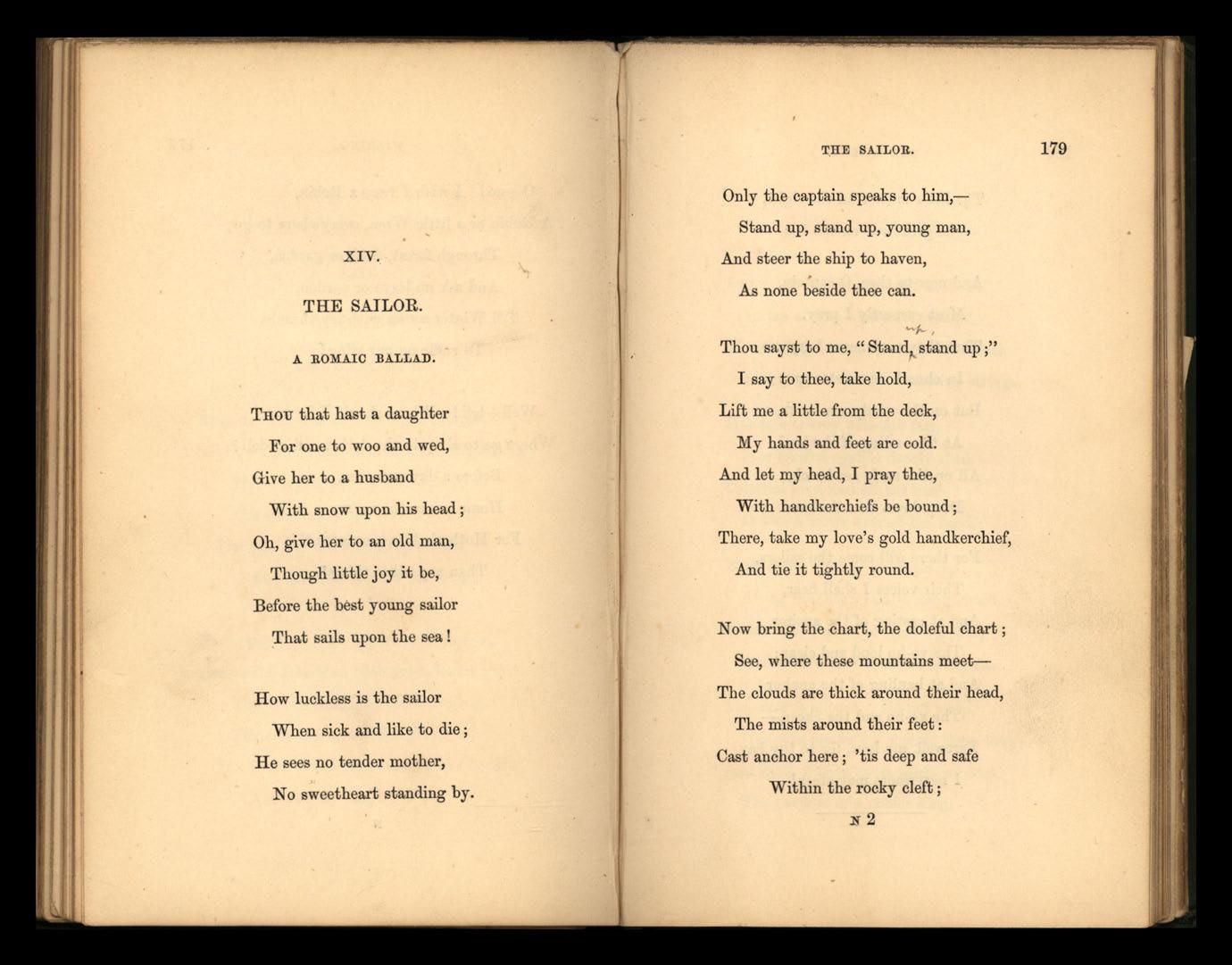
TIlE SAILOR.
Only the captain speaks to him,-
Stand up, stand up, young man,
And steer the ship to haven, .
As none beside thee can. -f.-
Thou sayst to me, "Stand stand up ;"
I say to thee, take hold,
Lift me a little fl'om the deck,
My hands and feet are cold.
And let my head, I pray thee,
With handkerchiefs bc bound;
There, take my love's gold handkerchief,
And tie it tightly round.
Now bring the chart, the doleful chart;
See, where these mountains meet--
The clouds are thick around their head,
The mists around their feet:
Cast anchor here; 'tis deep and safe
Within the rocky cleft; 1'2
18U TIIE SA.ILOR.
The little anchor on the right,
The great one on the left.
And now to thee, 0 captain,
Most earnestly I pray,
That they may never bury me
In church or cloister gray j-
But on the windy sea-beach,
At the ending of the land,
All on the surfy sea-beach,
Deep down into the sand.
For there will come the sailors,
Their voices I shall hear,
And at casting of the anchor
The yo-ho loud and clear j
And at hauling of the anchor
The yo-ho and the cheer,-
Farewell, my love, for to thy bay
I nevermore may steer!
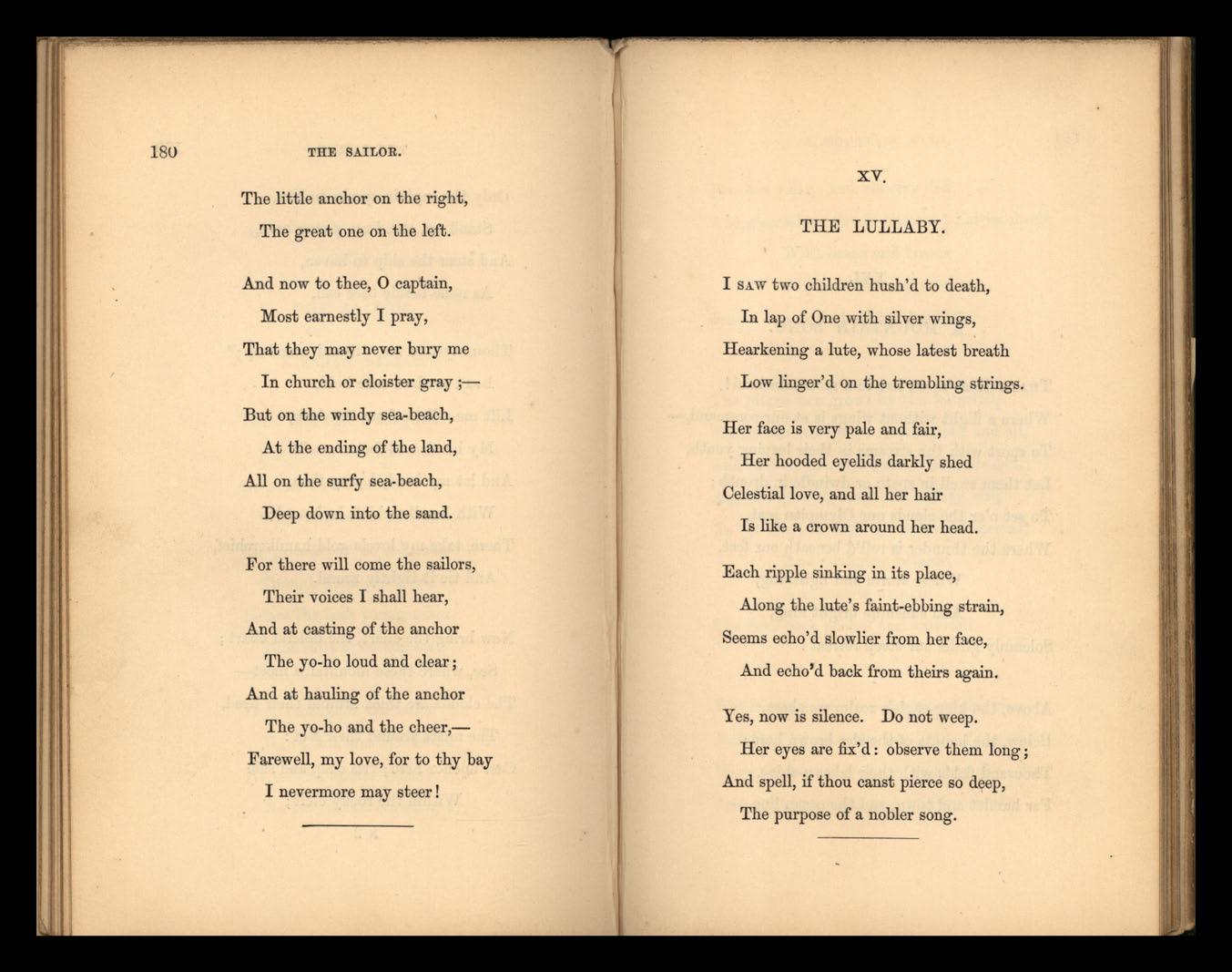
THE LULLABY.
I SAW two children hush'd to death,
In lap of One with silver wings,
Hearkening a lute, whose latest breath
Low linger'd on the trembling strings.
Her face is very pale and fair,
Her hooded eyelids darkly shed
Celestial love, and all her hair
Is like a crown around her head.
Each ripple sinking in its place,
Along the lute's faint-ebbing strain,
Seems echo'd slowlier from her face,
And echo'd back from theirs again.
Yes, now is silence. Do not weep.
Her eyes are fix'd: observe them long;
And spell, if thou canst pierce so deep,
The purpose of a nobler song.
XVI.
TIIANX Heav'n, we live in a mountain land!
Where a flight without wings is at our command,-
To sport with the streams in their leaping youth,
Let them swell in spate or dwindle in drouth;
To set o'er the clouds our Olympian seat,
Where the thunder is roll'd beneath our feet,
Where storm and lightning,
And sunshine bright'ning,
Solemnly girdle our steep retreat!
Above, the king-eagle's realm we share,
Below, the haunts of the shy brown hare:
Thousand fields with their lakes a-shine,
Far hamlet and town, and the ocean line,-
Beechen valley, and bilberry dell,
And glen where the Echoes and Fairies dwell,
With heaps and bosses
Of plume-fern and mosses,
Scarlet rowan, and slight blue-bell.
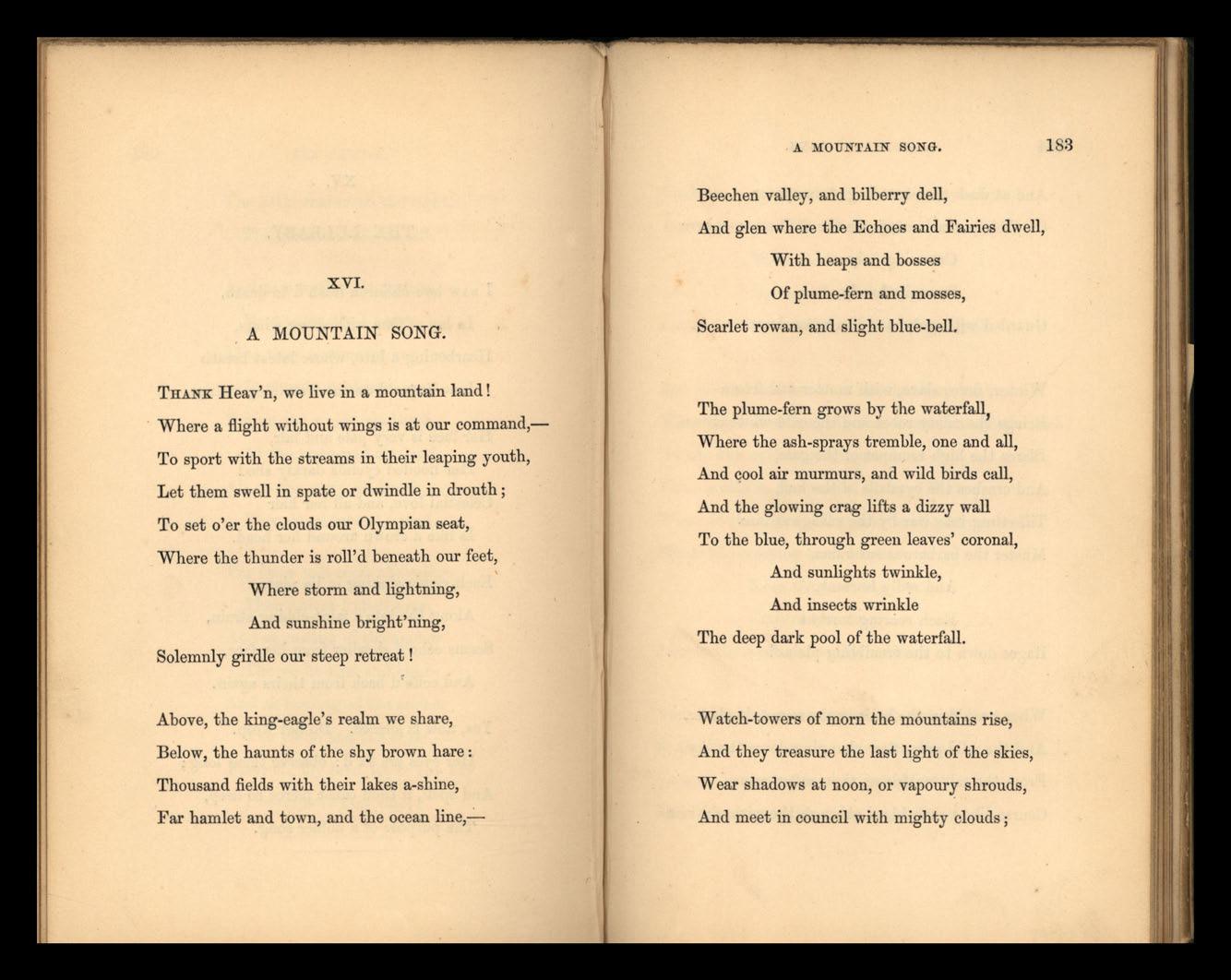
The plume-fern grows by the waterfall,
Where the ash-sprays tremble, one and all,
And cool air murmurs, and wild birds call,
And the glowing crag lifts a dizzy wall
To the blue, through green leaves' coronal,
And sunlights twinkle,
And insects wrinkle
The deep dark pool of the waterfall.
Watch-towers of morn the mountains rise,
And they treasure the last light of the skies,
Wear shadows at noon, or vapour,r shrouds,
And meet in council with mighty clouds;
184
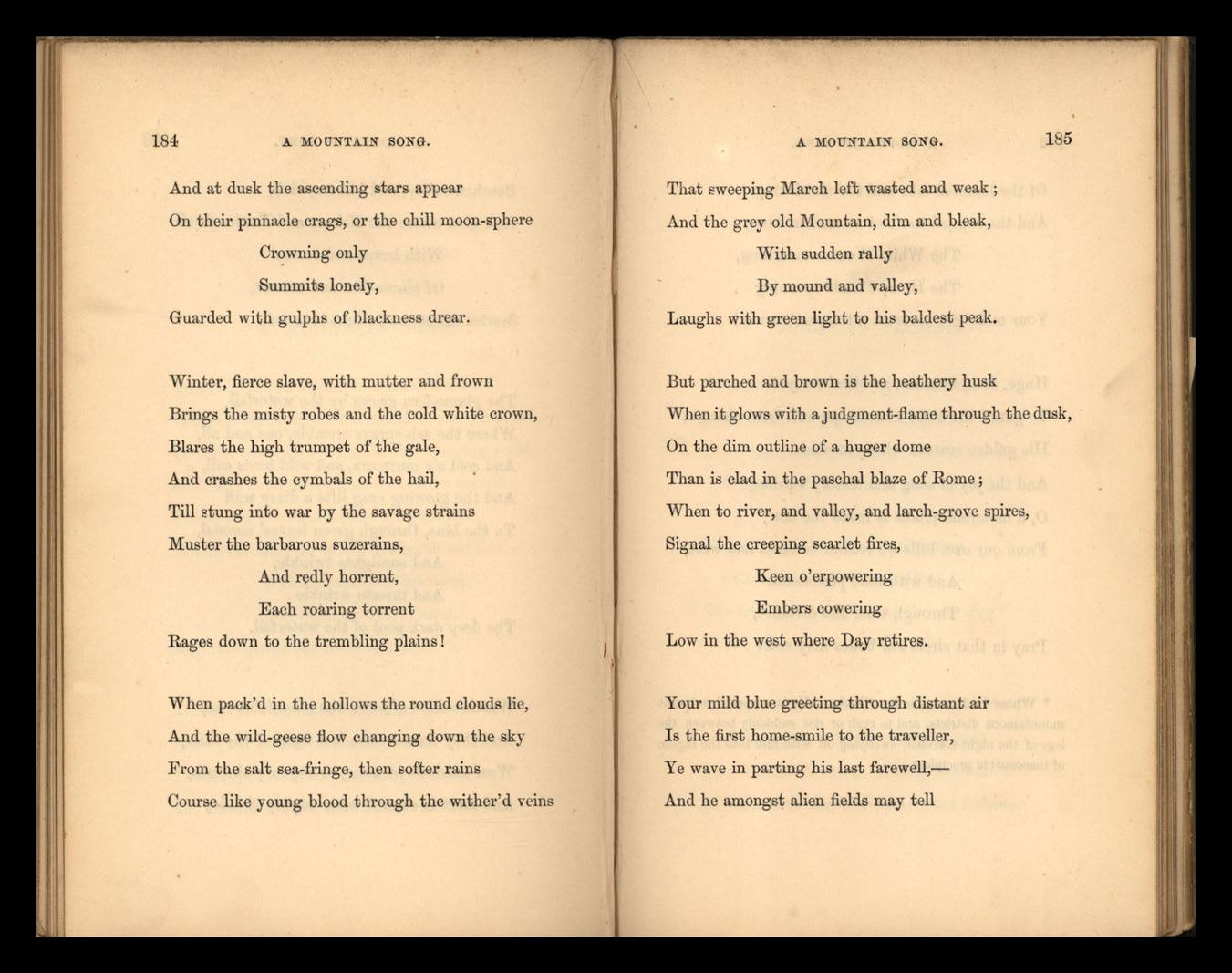
A MOUNTAIN SONG.
And at dusk the ascending stars appear
On their pinnacle crags, or the chill moon-sphere only
Summits lonely,
Guarded with gulphs of blackness drear.
Winter, fierce slave, with mutter and frown
Brings the misty robes and the cold white crown,
Blares the high trumpet of the gale,
And crashes the cymbals of the hail,
Till stung into war by the savage strains
Muster the barbarous suzerains,
And redly hOl"rent,
Each roaring torrent
Rages down to the trembling plains!
When pack'd in the hollows the round clouds lie,
And the wild-geese flow changing down the sky
From the salt sea-fringe, then softer rains
Course like young blood through the wither'd veins
A MOUNTAIN SONG.
That sweeping March left wasted and weak ;
And the grey old Mountain, dim and bleak,
With sudden rally
By mound and valley,
Laughs with green light to his baldest peak .
But parched and brown is the heathery husk
When it glows with a judgment-flame through the dusk,
On the dim outline of a huger dome
Than is clad in the paschal blaze of Rome;
When to river, and valley, and larch-grov e spires,
Signal the creeping scarlet fires,
Keen o'erpowering
Embers cowering
Low in the west where Day retires .
Your mild blue greeting through distant air
Is the first home-smile to the traveller,
Ye wave in parting his last farewell,-
And he amongst alien fields may tell
186 A. MOUNTA.IN SONG.
Of the haunted lake and the elvish ring,
And the rugged tomb of an ancient king,
The White Woman mourning,
The Horse-Fiend'*' spurning
Your midnight moor on a tempest's wing!
* Whose Irish name is the Phooka. He is supposed to haunt mountainous districts, and to rush or rise suddenly between the legs of the night-traveller, sweeping off with him into the region of inaccessible precipices. XVII.

Huge, firm, familiar, mystical range!
Ye guard the child's landscape well from change j
His golden seasons with you abide,
And the joy of song and history's pride j
0, a mountain cradl e is loved the best,
From our own hills we reckon our east and west,
And with fond persistence
Through time and distance,
Pray in that circle our bones may rest!
I SPRING from my li ghtly prest pillow
To tread the gay sunshiny floor j
o welcome, that glittering billow
Whose surf almo st reaches our door!
The cliff with its cheerful adorning
Of matted sea-pink under foot,-
The lark gives me "top 0' the morning !"
The sailing-boat nods a salute.
Already, with new sea -b orn graces,
Comes many a bright-featured maid,
Peep children's damp hair and fresh faces
From straw hat's or sun-bonnet's shade.
188 MORNING PLUNGE
Green crystal in exquisite tremble,
My tide-brimming pool I behold;
What shrimps on the sand-patch assemble!
-I vanish! embraced with pure cold.
A king of the morning-time's treasures,
To revel in water and air,
Join salmon and gull in their pleasures, Then home to our sweet human fare.
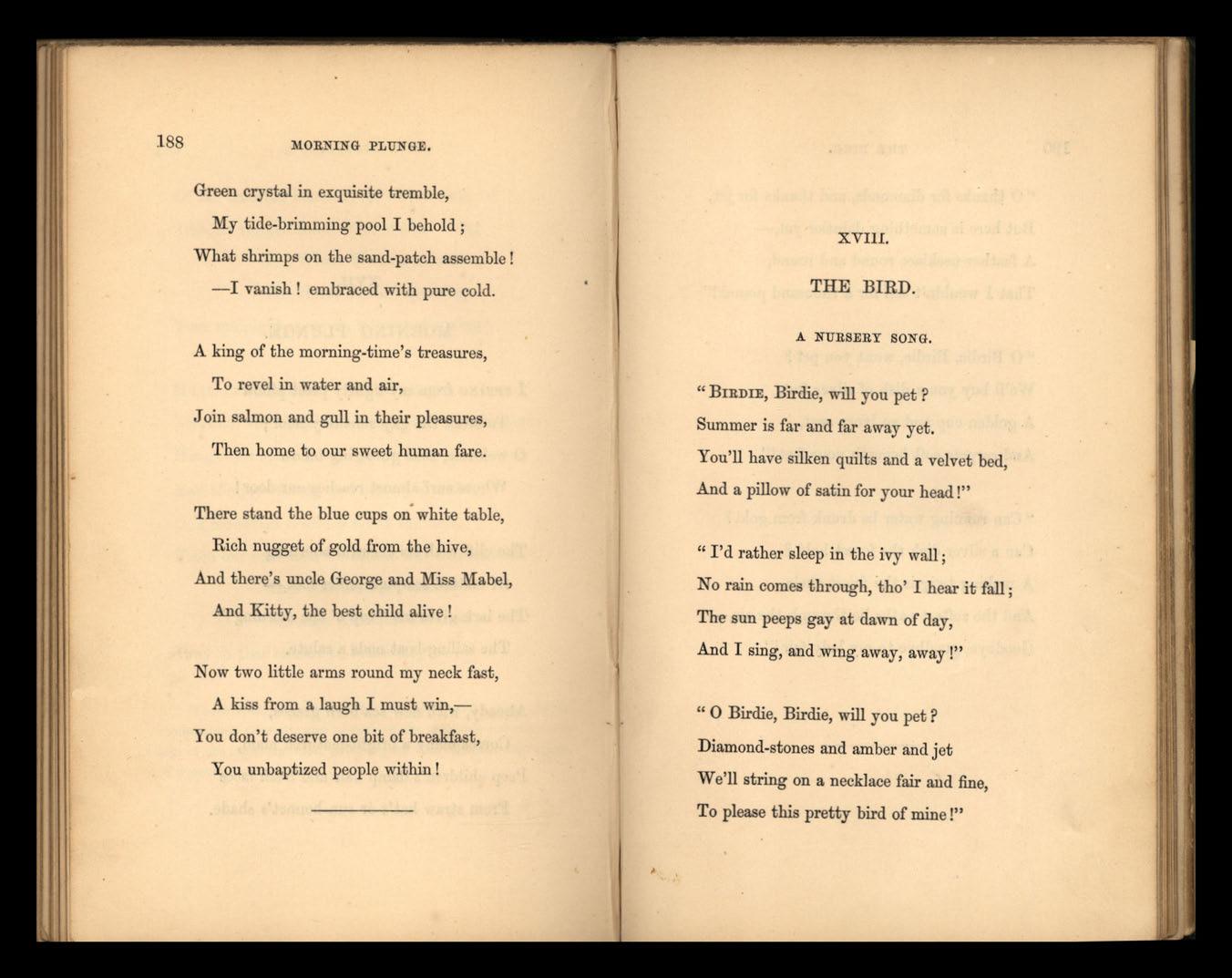
There stand the blue cups on"white table, Rich nugget of gold from the hive,
And there's uncle George and Miss Mabel, And Kitty, the best child alive!
Now two little arms round my neck fast,
A kiss from a laugh I must win,-
You don't deserve one bit of breakfast,
You unbaptized people within!
XVIII.
THE BIRD.
A NURSERY SONG.
" BIRDIE, Birdie, will you pet?
Summer is far and far away yet.
You'll have silken quilts and a velvet bed,
And a pillow of satin for your head !"
" 1'd rather sleep in the ivy wall;
No rain comes through, tho' I hear it fall;
The sun peeps gay at dawn of day,
And I sing, and wing away, away!"
" 0 Birdie, Birdie, will you pet?
Diam ond -stones and amber and jet
We'11 string on a necklace fair and fine,
To please this pretty bird of mine!"
190 TlIE BIRD.
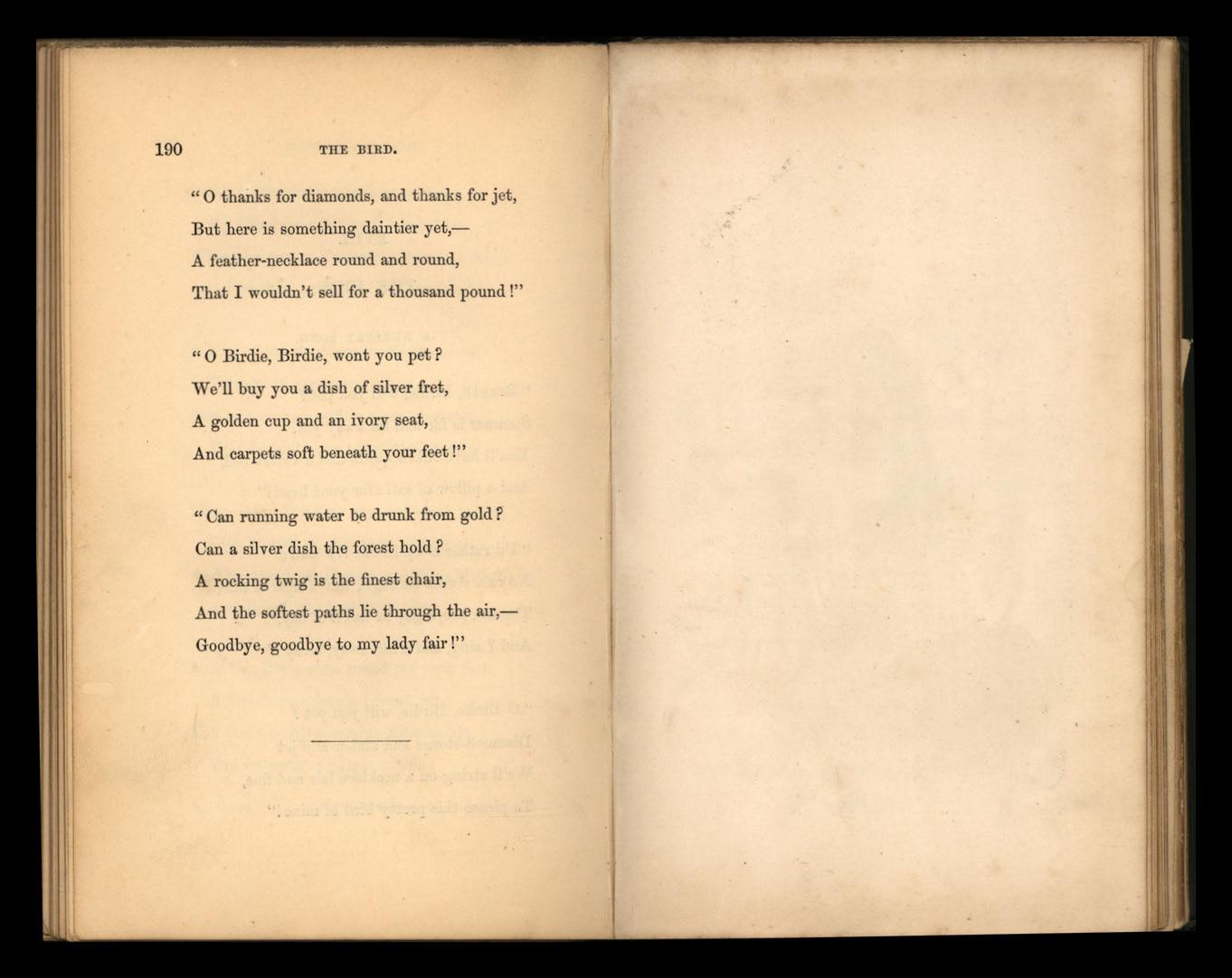
" 0 thanks for diamonds, and thanks for jet,
But here is something daintier yet,-
A feather-necklace round and round,
That I wouldn't sell for a thousand pound!"
" 0 Birdie, Birdie, wont you pet?
'Ve'll buy you a dish of silver fret,
A golden cup and an ivory seat,
And carpets soft b eneath your feet!"
"Can running water be drunk from gold?
Can a silver dish the forest hold?
A rocking twig is the finest chair,
And the softest paths lie through the air,-
Goodbye, goodbye to my lady fair I"
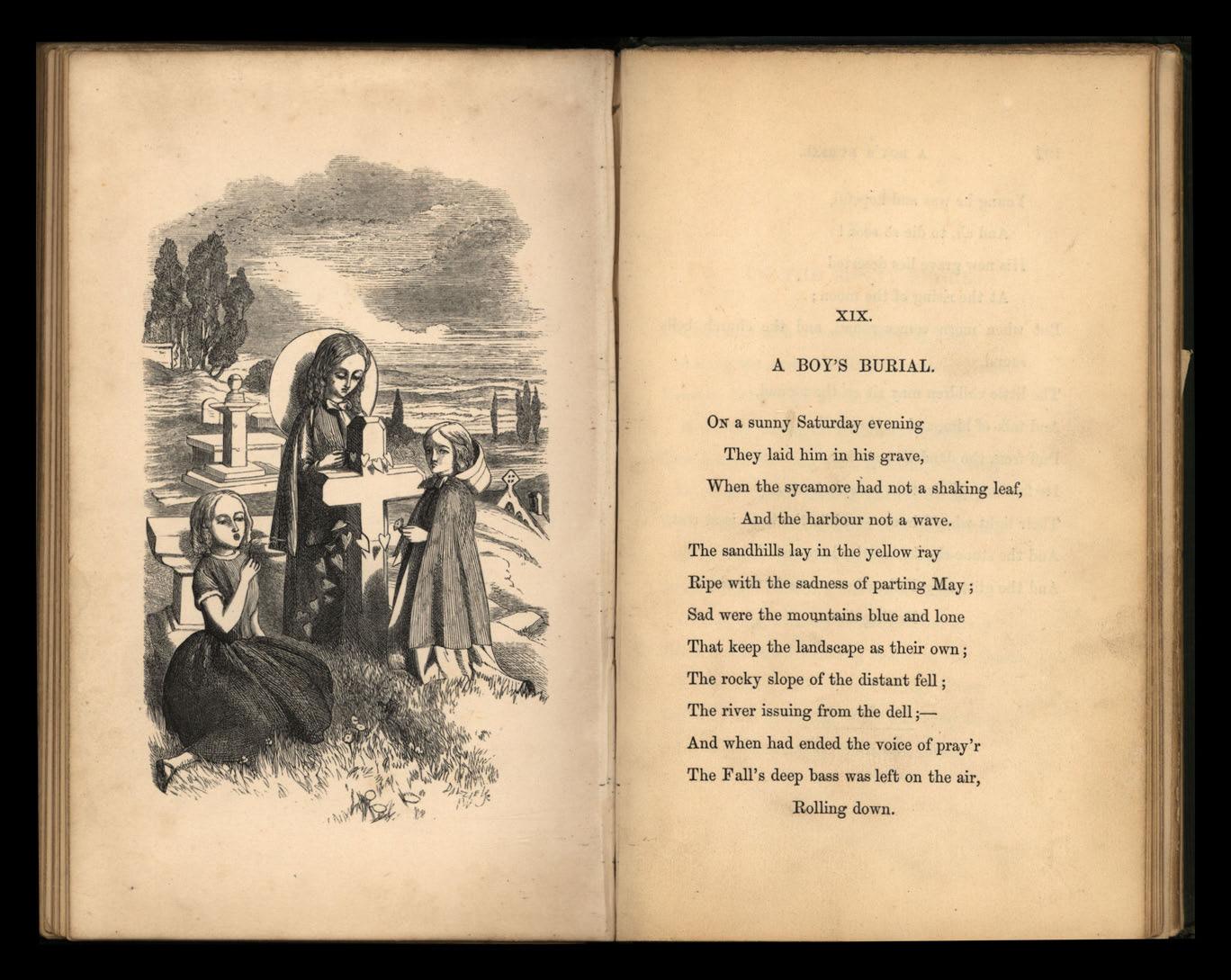
XIX .
ON a sunny Saturday evening
They laid him in his grave,
When the sycamore had not a shaking leaf, And the harbour not a wave.
The sandhills lay in the yellow ray
Ripe with the sadness of parting May;
Sad were the m01lI1tains blue and lone
That keep the landscape as their own;
The rocky slope of the distant fell ;
The river issuing from the dell;-
And when had ended the voice of pray'r
The Fall's deep bass was left on the air, Rolling down.
1!l2 A. :BOY'S :BURIA.L.
Young he was and hopeful,
And ah, to die so soon!
His new grave desel ted
At the rising of the moon j
But when morn comes round, and the church bells sound,
Th e little children may sit on the mound,
And talk of him, and as they talk,
Puff from the dandelion stalk
Its feathery globe, that reckons best
Their light-wing'd hours j-while the town is at rest,
And the stone-chacker rattles here and there,
And the glittering Fall makes a tune in the air,
Rolling do,,",n. xx.
CHECQUER'n with woven shadows as I lay
Among the grass, blinking the watery gleam j
I saw an Echo-Spirit in his bay,
Most idly floating in the noontide beam.
Slow heaved his filmy skiff, and fell, with sway
Of ocean's giant pulsing, and the Dream,
Buoy'd like the young moon on a level stream
Of greenish vapour at decline of day,
Swam airily,-watching the distant flocks
Of sea-gulls, whilst a foot in careless swe ep
Touch'd the clear-trembling cool with tiny shocks,
Faint-circling; till at last he dropt asleep,
Lull'd by the hush-song of the glittering deep
Lap-lapping drowsily the heated rocks.
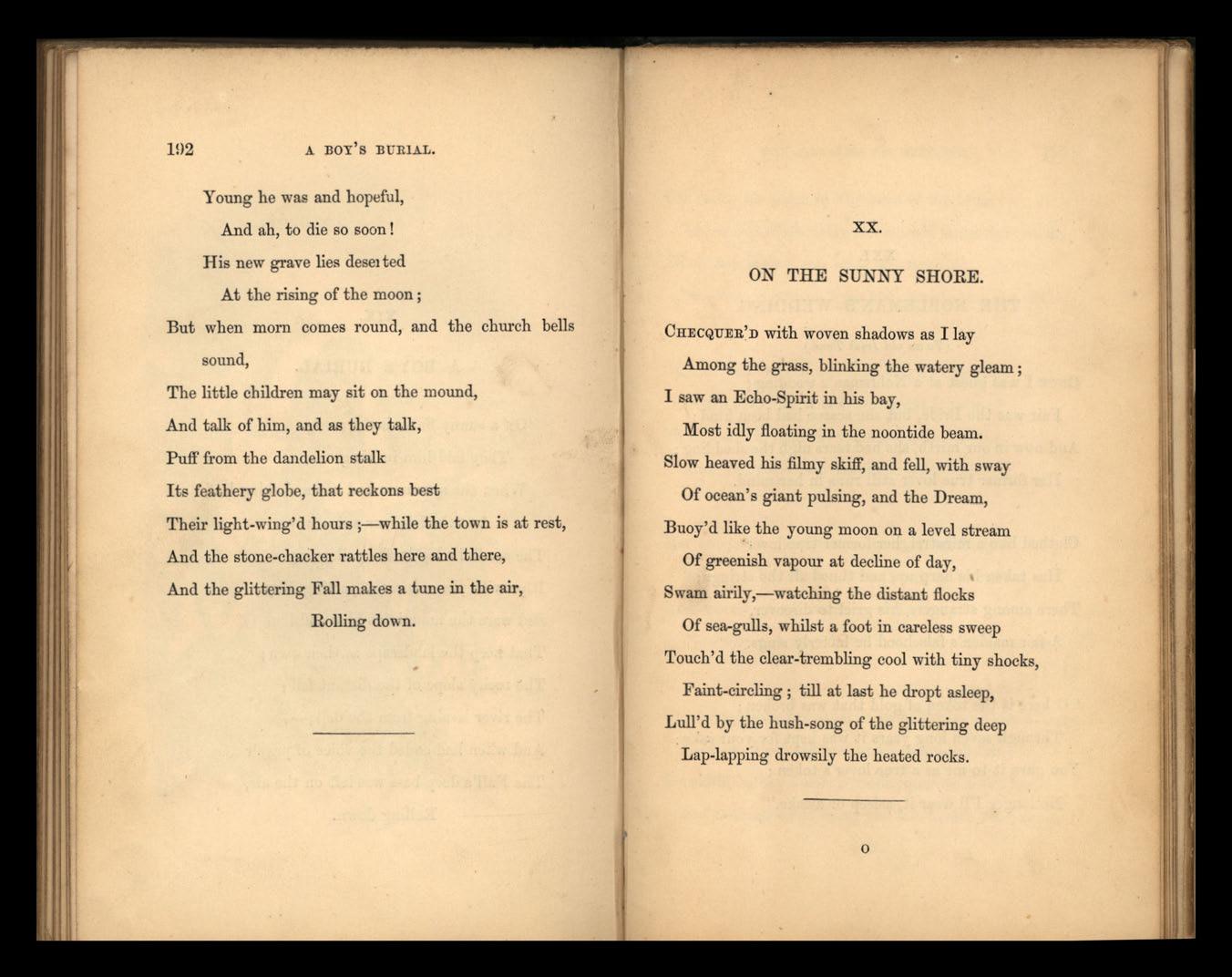
o
XXI.
THE NOBLEMAN'S WEDDING.
(To an old Irisk Twne.)
ONOE I was guest at a Nobleman's wedding j
Fair was the Bride, but she scarce had been kind . ,
.And now in our mirth, she had tears nigh the shedding j
Her former true lover still runs in her mind.
Clothed like a minstrel, her former true lover
Has taken his harp up, and tuned all the strings j
There among strangers, his grief to discover,
.A fair maiden's falsehood he bitterly sings.
" 0 here is the token of gold that was broken j
Through seven long years it was kept for your sake j
You gave it to me as a true lover's token j
No longer I'll wear it, asleep or awake."

THE NOBLEMAN'S WEDDING. 195
She sat in her place by the head of the table, The words of his ditty she mark'd them right well;
To sit any longer this bride was not able, .
So down, in a faint, from the carved chair she fell.
"0 one, one request, my lord, one and no other, o this one reques.t will you grant it to me?
To lie for this night in the arms of my mother, .And ever, and ever, thereafter with thee."
Her one one request it was granted her fairly j
Pale were her cheeks as she went up to bed;
.And the very next morning, early, early,
They rose and they found this young bride was dead.
'fhe bridegroom ran quickly, he her, he kiss'd her,
He spoke loud and low, and listen'd full fain j
He crul'd on her waiting-maids round to assist her,
But nothing could bring the lost breath back again.
196 THE NOBLEMAN'S WEDDING.
o carry her softly! the grave is made ready; At head and at foot plant a laurel-bush green j
For she was a young and a sweet noble lady, 'l'he fairest young bride that I ever ha.ve seen. XXlI.
I KNEW!
PLA.YS a child in a garden fair
Where the demigods are walking j
Playing unsuspected there
As a bird within the air, Listens to their wondrous talking:
" Would I knew-would I knew
What it is they say and do!"

Stands a youth at city-gate,
. Sees the knights go forth together, Parleying superb, elate,
Pair by pair in princely state, Lance and shield and haughty feather:
198 WOULD I KNEW!
" Would I knew-would I knew
What it is they say and do !"
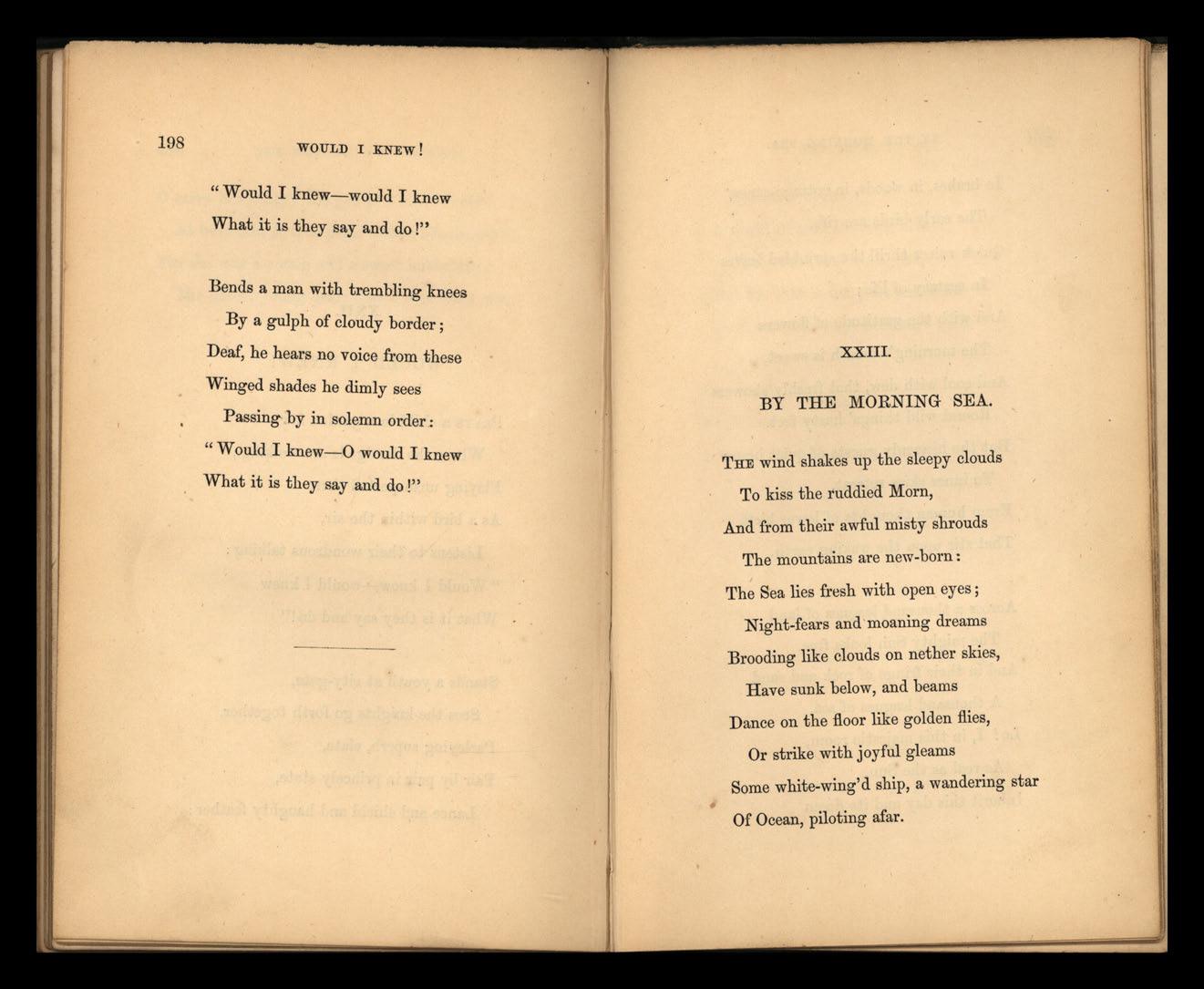
Bends a man with trembling knees
By a gulph of cloudy border;
Deaf, he hears no voice from these
Winged shades he dimly sees
Passing by in solemn order:
" Would I knew-O would I knew
What it is they say and do 1" XXIII.
THE wind shakes up the sleepy clouds
To kiss the ruddied Morn,
And from their awful misty shrouds
The mountains are new-born:
The Sea lies fresh with open eyes; Nioht-fears and moaning dreams <>
Brooding like clouds on nether skies, Have sunk below, and beams
Dance on the floor like golden flies,
Or strike with joyful gleams
Some white-wing'd ship, a wandering star
Of Ocean, piloting afar.
200 BY THE MORNING SEA..
In brakes, in woods, in cottage-eaves,
The early birds are rife,
Quick voices thrill the sprinkled leaves
In of life ;
And with the gratitude of flowers
The morning's breath is sweet,
And cool with dew, that freshly showers
Round wild things' hasty feet.
But the heavenly guests of quiet hours
To inner skies retreat,
From human thoughts of lower birth
That stir upon the waking earth.
Across a thousand leagues of land
The mighty Sun looks free,
And in their fringe of rock and sand
A thousand leagues of sea.
Lo! I, in this majestic room,
As real as the Sun,
Inherit this day and its doom

BY THE MORNING SEA.
Eternally begun.
A world of men the rays illume,
GOD'S men, and I am one.
But life that is not pure and bold
Doth tarnish every morning's gold.
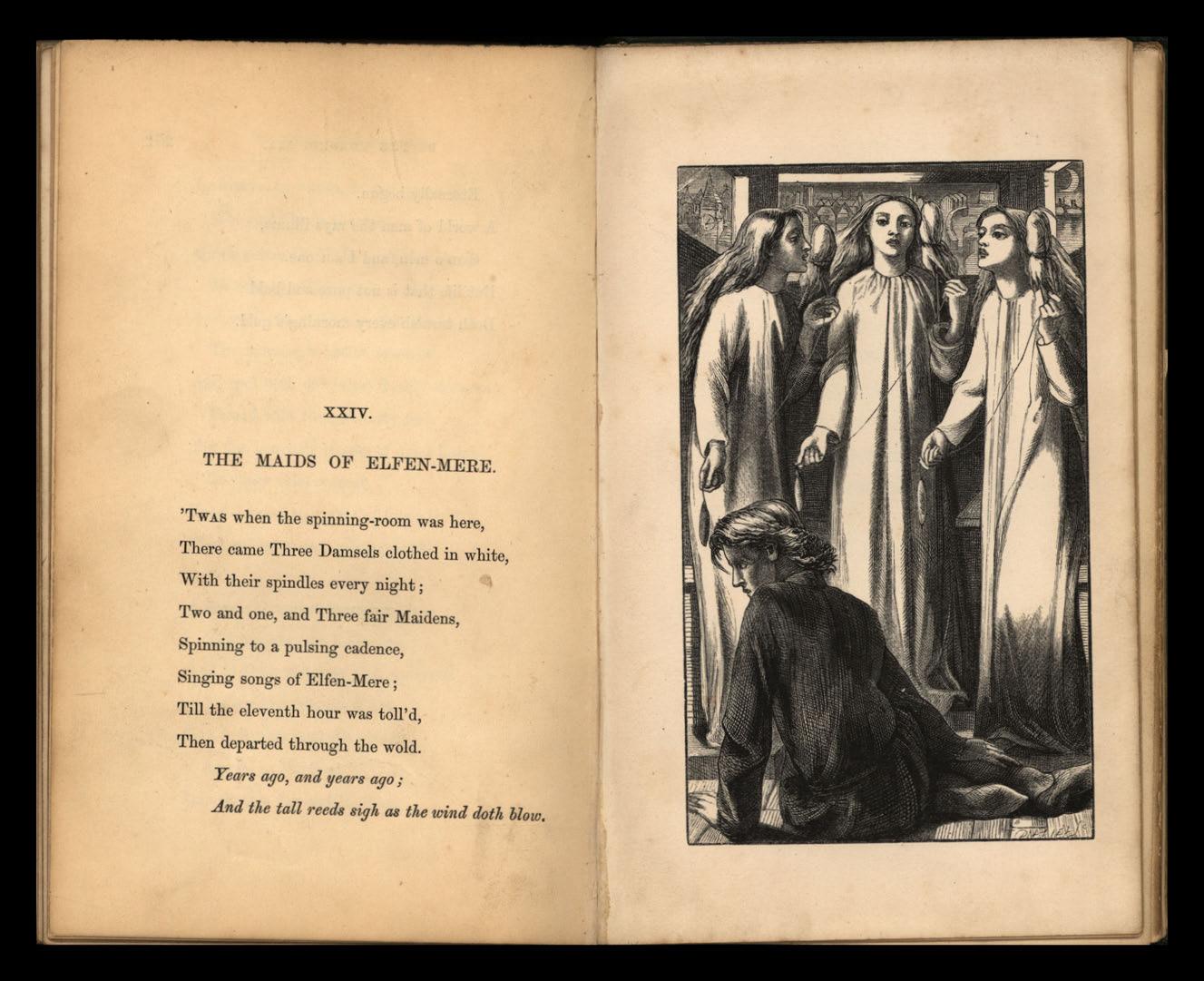
XXIV.
'TwAS when the spinning-room was here, There came Three Damsels clothed in white, With their spindles every night; Two and one, and Three fair Maidens, Spinning to a pulsing cadence, Singing songs of Elfen-Mere ; Till the eleventh hour was toll'd, Then departed through the wold. Years ago, and years ago; And the tall reea-s sigh as the wind a{)th blow.

Three white Lilies, calm and clear,
And they were loved by everyone;
Most of all, the Pastor's Son,
Listening to their gentle singing,
Felt his heart go from him, clinging
Round these Maids of Elfen-Mere ;
Sued each night to make them stay,
Sadden'd when they went away.
Years ago, and years ago;
And the tall reeds sigh as the wind doth blow.
Hands that shook with love and fear
Dared put back the village clock,-
Flew the spindle, turn'd the rock,
Flow'd the song with subtle rounding,
Till the false" eleven" was sounding;
t Then these Maids of Elfen-Mere
Swiftly, softly, left the room,
Like three doves on snowy plume.
Years ago, and years ago;
And the tall reeds sigh as the wind dot}! blow.
204 THE MAIDS OF ELFEN-MERE.
One that night who wander'd near
Heard lamentings by the shore,
Saw at dawn three stains of gore
In the waters fade and dwindle.
Nevermore with song and spindle
Saw we Maids of Elfen-Mere.
The Pastor's Son did pine and die;
Because true love should never lie.
Year8 ago, and year8 ago;
And the tall reed8 sigh as the wind doth blow.
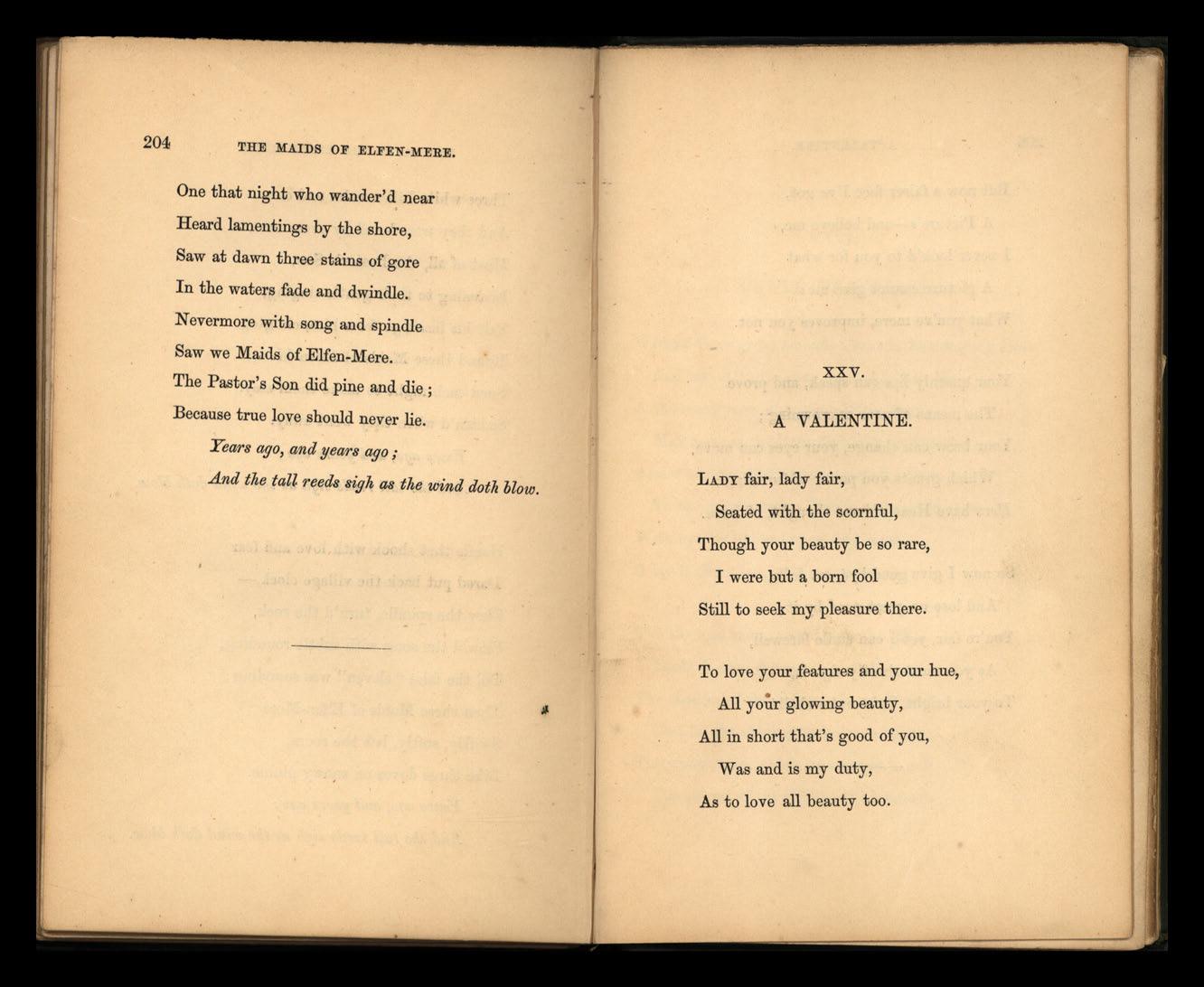
LADY fair, lady fair,
Seated with the scornful,
Though your beauty be so rare,
I were but 3: born fool
Still to seek my pleasure there.
To love your features and your hue,
All glowing beauty,
All in short that's good of you,
Was and is my duty,
As to love all beauty too.
A "VALENTINE.
But now a fairer face I've got,
A Picture's-and believe me, I never look'd to you for what
A picture cannot give me :
What you've more, improves you not.
Your queenly lips can speak, and prove
The means of your uncrowning ;
Your brow can change, your eyes can move,
Which grants you power of frowning
Hers have Heav'n's one thought, of Love.
So now I give good-bye, ma belle,
And lose no great good by it ;
You're fair, yet I can smile farewell
As you must shortly sigh it,
To your bright, light outer shell! ,
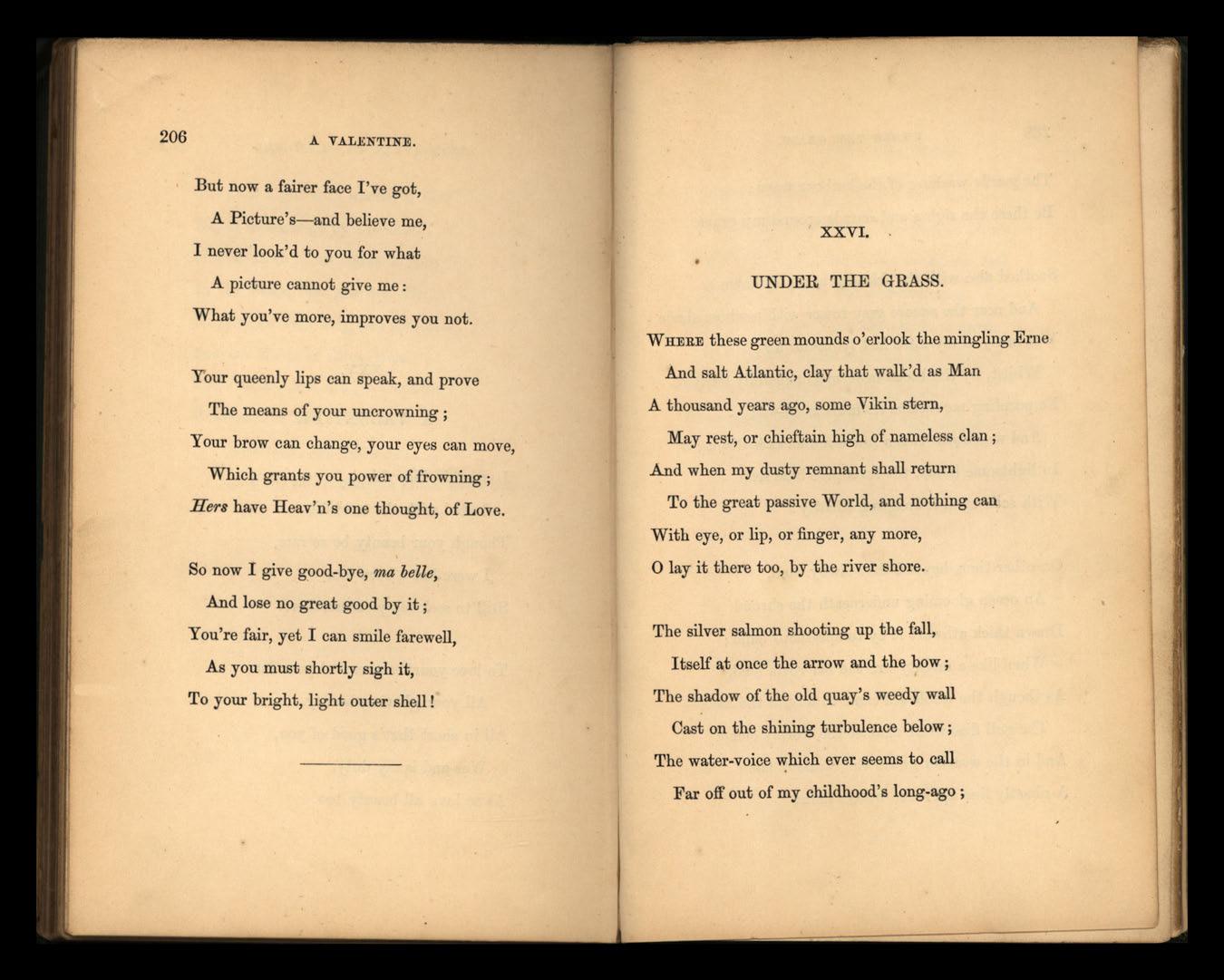
XXVI.
UNDER THE GRASS.
WHERE these green mounds o'erlook the mingling Erne
And salt Atlantic, clay that walk'd as Man
A thousand years ago, some Vikin stern, May rest, or chieftain high of nameless clan;
And when my dusty remnant shall return
To the great passive World, and nothing can
With eye, or lip, or finger, any more,
o lay it there too, by the river shore.
The silver salmon shooting up the fall,
Itself at once the arrow and the bow;
The shadow of the old quay's weedy wall
Cast on the shining turbulence below;
The water-voice which ever seems to call
Far ofi' out of my childhood's long-ago;
208 UNDER THE GRASS.
The gentle washing of the harbour wave;
Be these the sights and sounds around my grave.
Soothed also with thy friendly beck, my town,
And near the square grey tower within whose shade
Was many of my kin's last lying-down;
Whilst, by the broad heavens changefully array'd,
Empurpling mountains its horizon crown ;
And westward 'tween low hummocks is display'd
In lightsome hours, the level pale blue sea,
With sails upon it creeping silently:
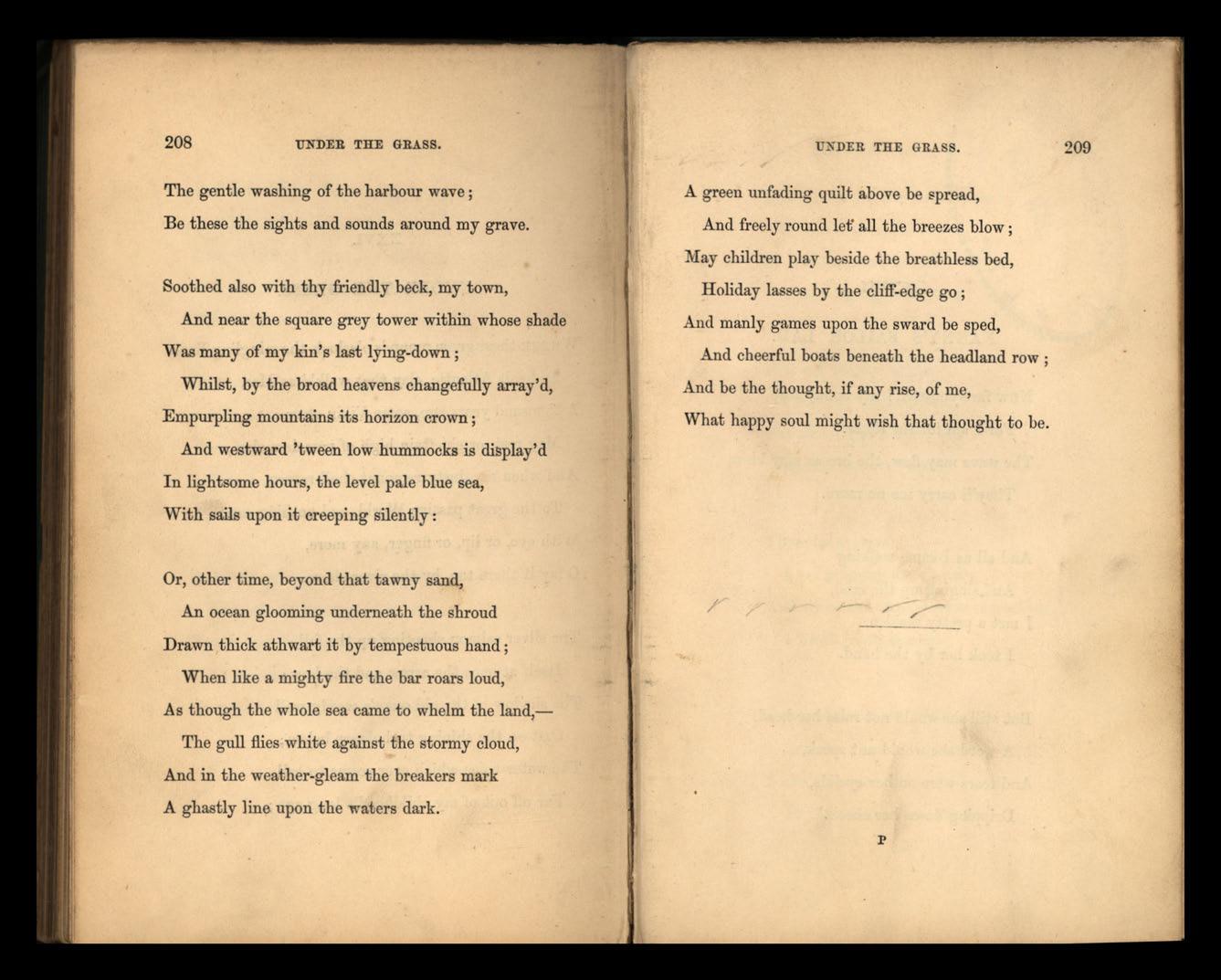
Or, other time, beyond that tawny sand,
An ocean glooming underneath the shroud
Drawn thick athwart it by tempestuous hand;
When like a mighty fire the bar roars loud,
As though the whole sea came to whelm the land,-
The gull flies white against the stormy cloud,
And in the weather-gleam the breakers mark
A ghastly line upon the waters dark.
A green unfading quilt above be !1pread,
And freely round l et' all the breezes blow;
May children play beside the breathless bed,
Holiday lasses by the cliff-edge go ;
And manly games upon the sward be sped,
And cheerful boats beneath the headland row;
And be the thought, if any rise, of me,
What happy soul might wish that thought to he.
Now grieve you for your father?
'Or husband might it be?
Or is it for a sweetheart
That's roving on the sea?
Now fare-you-well! my bonny ship,
For I am for the shore.
The wave may flow, the breeze may blow, They'll carry me no more.
And all as I came walking And singing up the sand,
I met a pretty maiden, I took her by the hand.
But still she would not raise her head, A word she would not speak,
And tears were on her eyelids, Dripping down her cheek.
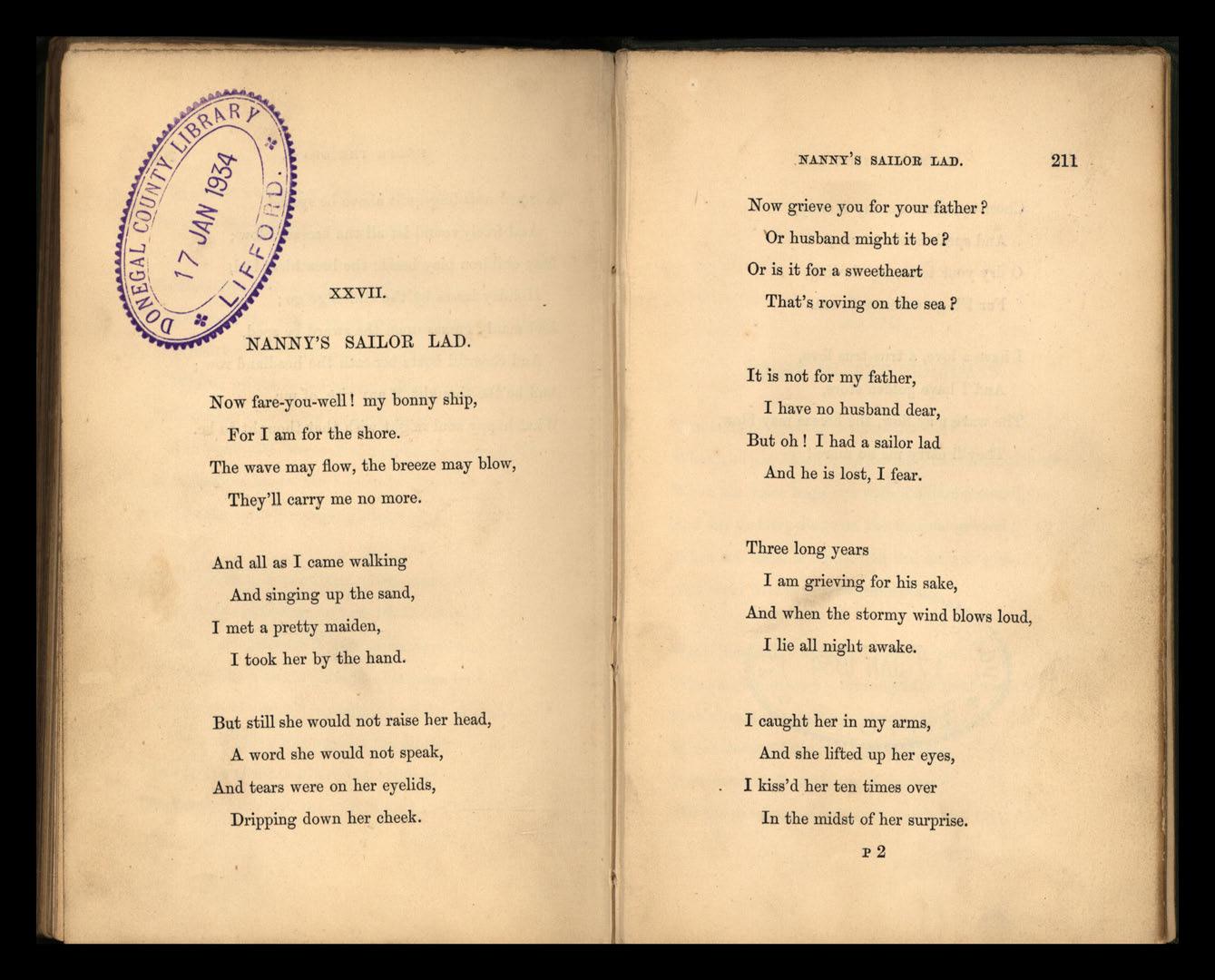
It is not for my father,
I have no husband dear,
But oh! I had a sailor lad
And he is lost, I fear.
Three long years
I am grieving for his sake,
And when the stormy wind blows loud, I lie all night awake.
I caught her in my arms,
And she lifted up her eyes,
I kiss'd her ten times over
In the midst of her surprise. 1'2
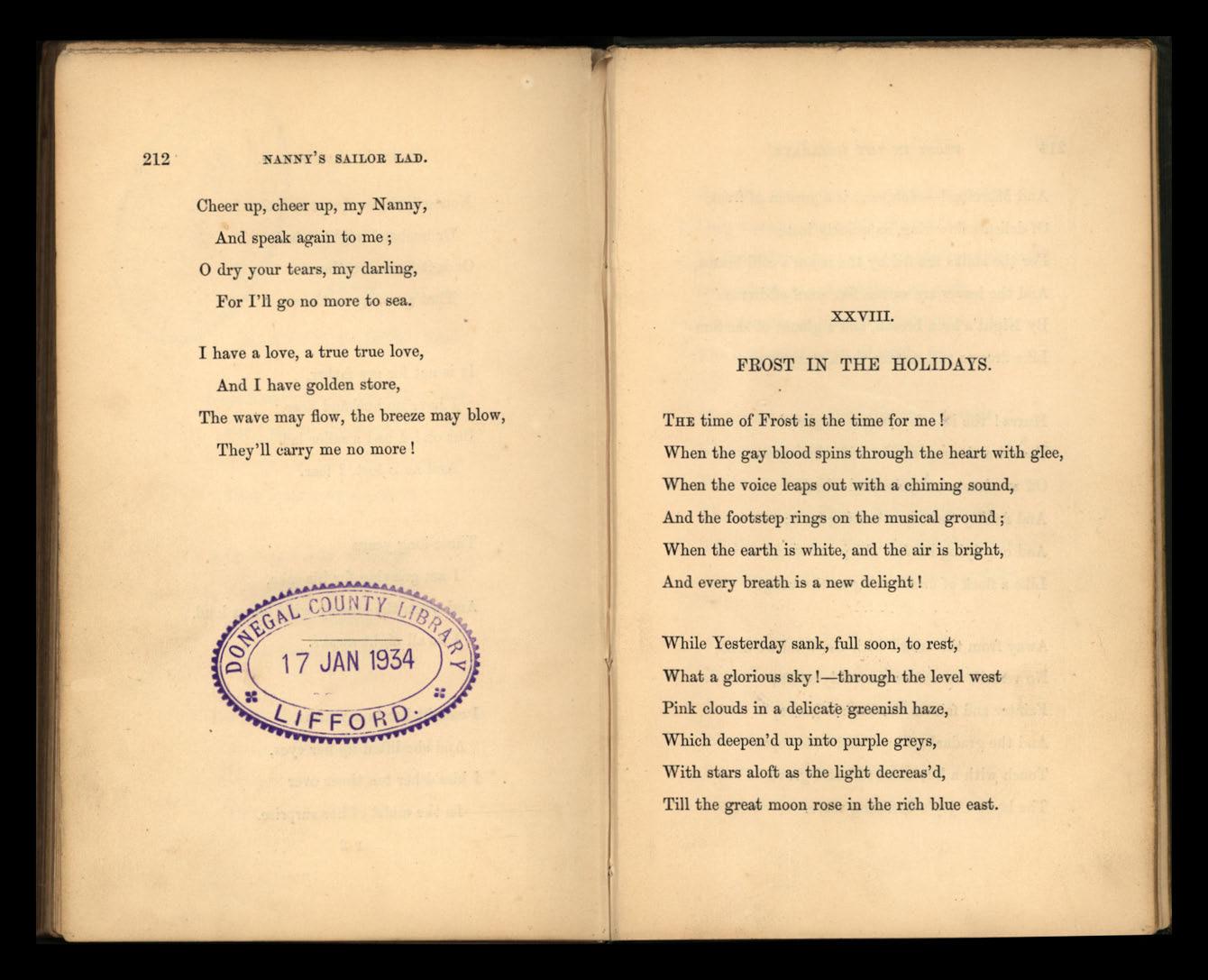
NANNY'S SAILOR LAD.
Cheer up, cheer up, my Nanny, And speak again to me ;
o dry your tears, my darling, For I'll go no more to sea.
I have a love, a true true love, And I have golden store, The wave may flow, the breeze may blow, They'll carry me no more! XXVIII.
THE time of Frost is the time for me !
When the gay blood spins through the heart with glee,
When the voice leaps out with a chiming sound, And the footstep rings on the musical ground;
When the earth is white, and the air is bright,
And every breath is a new delight!
While Yesterday sank, full soon, to rest,
What a glorious sky !-through the level west
Pink clouds in a "g.reenish haze, Which deepen'd up into purple greys,
With stars aloft as the light decreas'd,
Till the great moon rose in the rich blue east.
214 FROST IN THE HOLIDA.YS.
And Morning !-each pane is a garden of frost,
Of delicate flowering, as quickly lost j
For the stalks are fed by the moon's cold beams,
.And the leaves are woven like woof of dreams
By Night's keen breath, and a glance of the Sun
Like dreams will scatter them everyone.
Hurra! the lake is a .league of glass!
Buckle and strap on the stiff white grass.
Off we shoot, and poise and wheel,
.And swiftly turn upon scoring heel j
And our flying sandals chirp and sing
Like a flock of swallows upon the wing.
Away from the crowd with the wind we drift,
No vessel's motion so smoothly swift;
Fainter and fainter the tumult grows,
.And the gradual stillness and wide repose
Touch with a hue more soft and grave
The lapse of joy's declining wave.
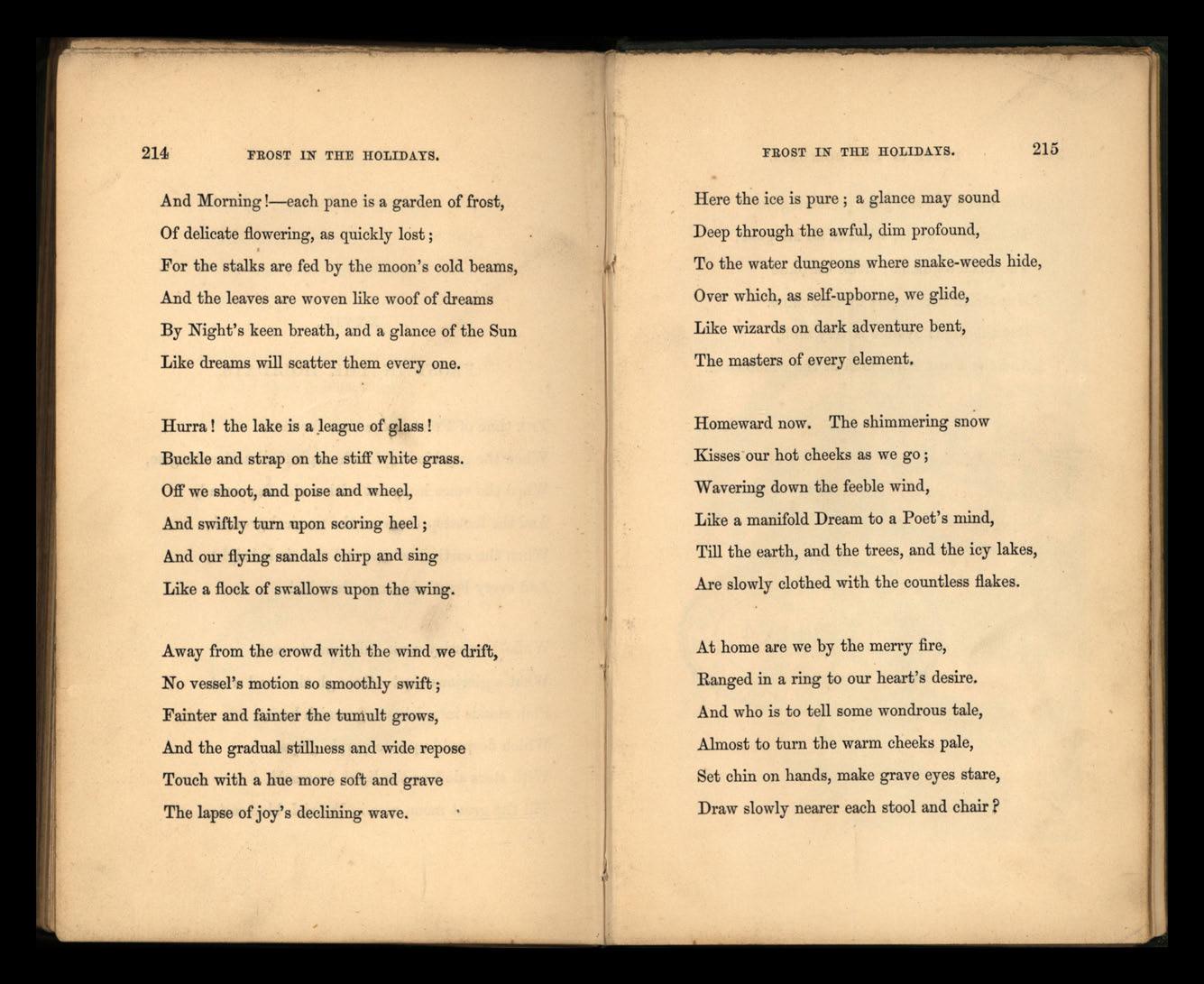
FROST IN THE HOLIDAYS.
Here the ice is pure j a glance may sound
Deep through the awful, dim profound, 215
To the water dungeons where snake-weeds hide,
Over which, as self-upborne, we glide,
Like wizards on dark adventure bent,
The masters of every element.
Homeward now. The shimmering snow
Kisses our hot cheeks as we go ;
Wavering down the feeble wind,
Like a manifold Dream to a Poet's mind,
Till the earth, and the trees, and the icy lakes,
Are slowly clothed with the countless flakes.
At home are we by the meny fire,
Ranged in a ring to our heart's desire.
And who is to tell some wondrous tale,
Almost to turn the warm cheeks pale,
Set chin on hands, make grave eyes stare,
Draw slowly nearer each stool and chair ?
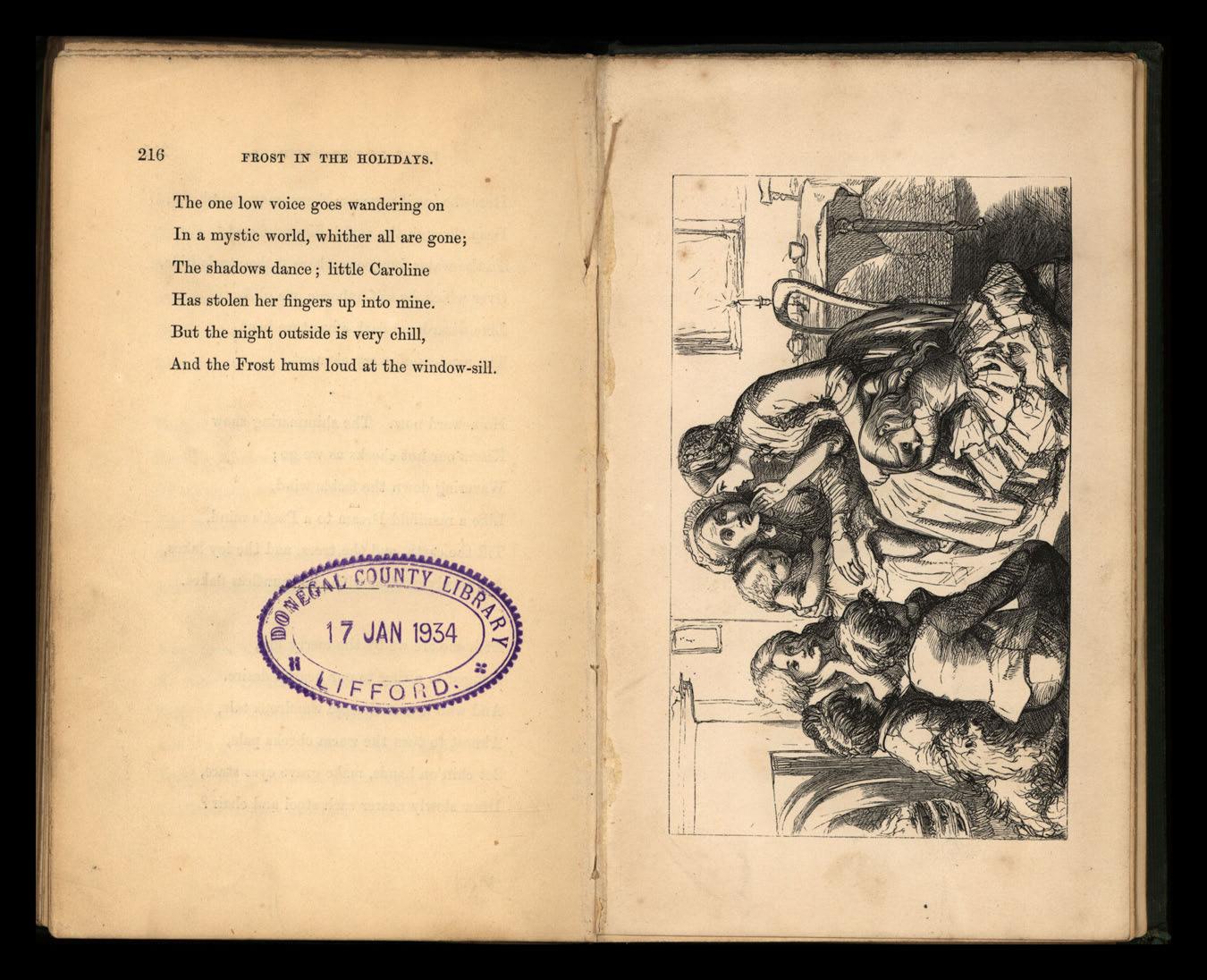
216 FROST IN THE HOLIDAYS.
The one low voice goes wandering on
In a mystic world, whither all are gone;
The shadows dance; little Caroline
Has stolen her fingers up into mine.
But the night outside is very chill,
And the Frost hums loud at the window-sill.
XXIX.
DEATH DEPOSED.
DEATH stately came to a young man, and said " If thou wert dead, What matter?" The young man replied, " See my young bride,
Whose life were all one blackness if I died.
My land requires me; and the world's self, too, Meth{nks, would miss some things that I can do."

Then Death in, scorn this only said, "Be dead."
And so he was. And soon another's hand
Made rich his land.
218 DEATH DEPOSED.
The sun, too, of three summers had the might
To bleach the widow's hue, light and more light,
Again to bridal white.
And nothing seem'd to miss beneath that sun
His work undone.
But D eath soon met another man, whose eye
Was Nature's spy;
Who said, " Forbear thy most triumphant scorn.
The weakest born
Of all the sons of men, is by his birth
An heir of the Eternal Strength; and Earth
Feels and is moved by him in his place,
And wears his trace.
"Thou,-the mock Tyrant that men fear and hate,
Grim fleshless Fate,
Cold, dark, and wormy thing of loss and tears!
Not in the sepulchres
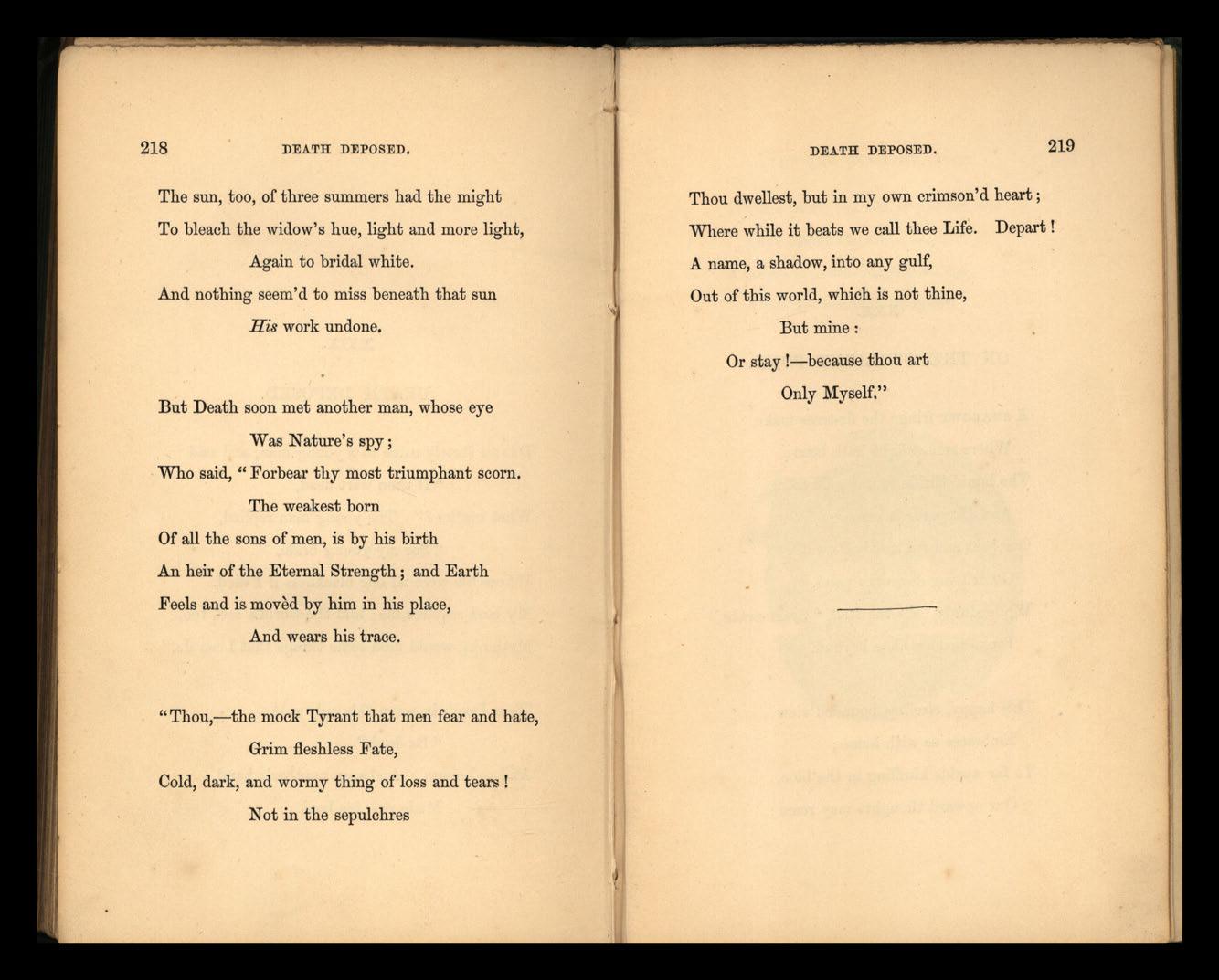
DEA.TH DEPOSED. 219
Thou dwellest, but in my own crimson'd heart;
Where while it beats we call thee Life. Depart!
A name, a shadow, into any gulf,
Out of this world, which is not thine,
But mine:
Or stay !-because thou art
Only Myself."
Whence, with the veil of scented dew
That makes the earth so sweet,
A touch of astral brightness too,
A peace-which is complete.
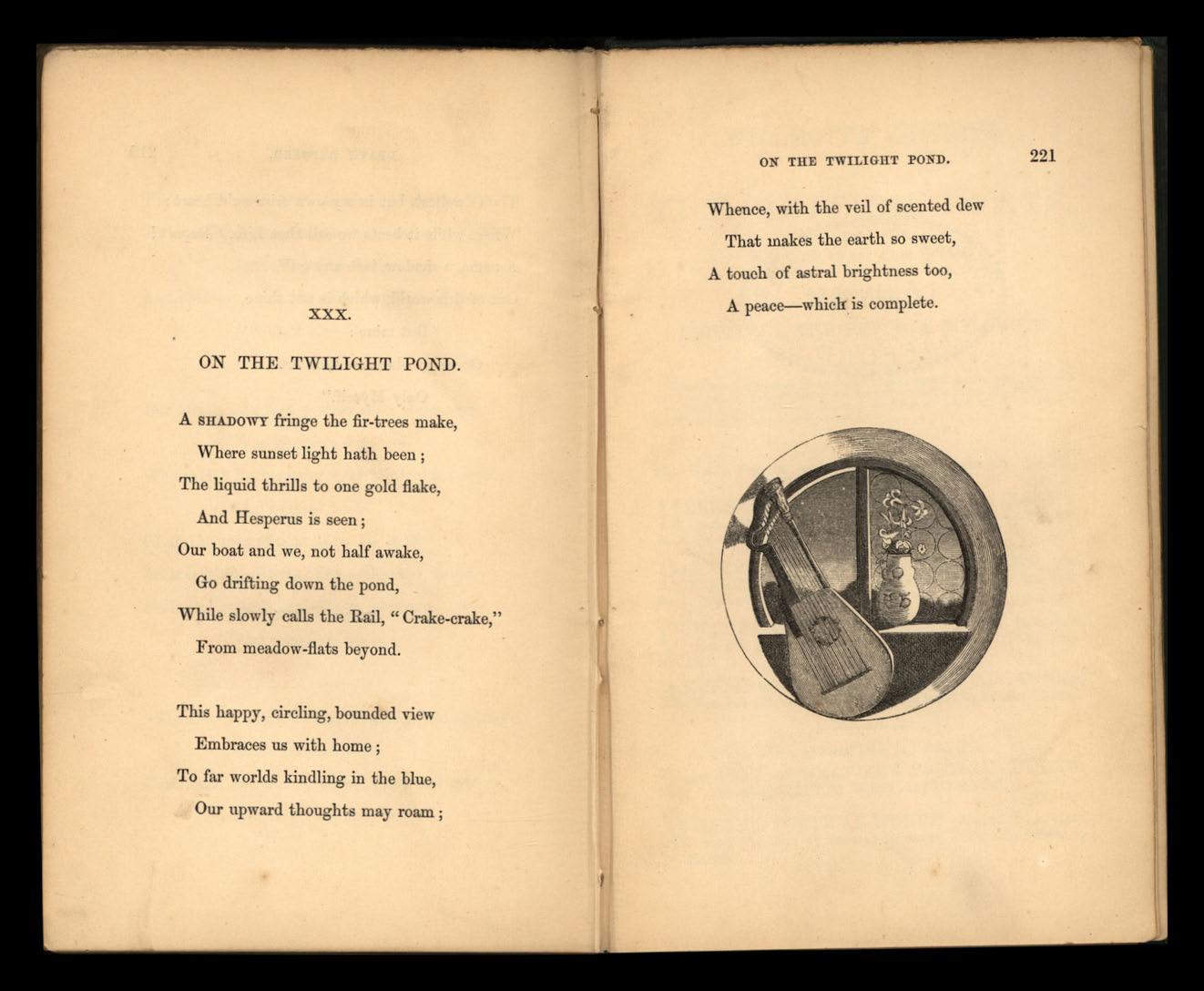
xxx.
A SHADOWY fring e the fir-trees make,
Where sunset light hath been j
The liquid thrills to one gold flake,
And Hesperus is seen j
Our boat and we, not half awake,
Go drifting down the pond,
While slowly calls the Rail, "Crake-crake,"
From meadow-flats beyond.
This happy, circling, bounded view
Embraces us with home j
To far worlds kindling in the blue,
Our upward thoughts may roam j
LONDON
SAV1LL .urn B OWAlln e , PRINTJlR!,
CB£JJDOS
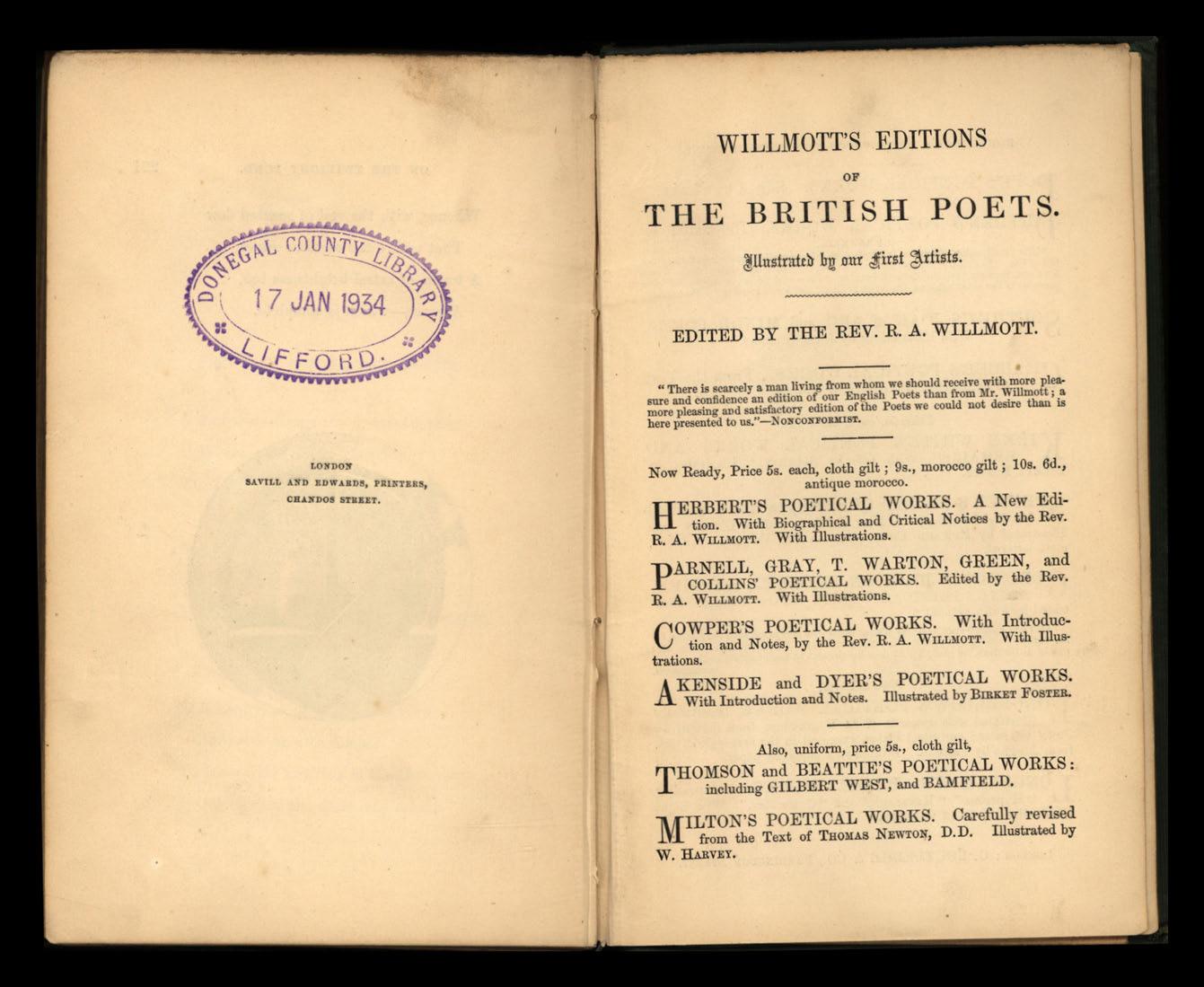
There is scarcely a man living &om whom we should receive with more pIe sure and confidence an edition of our Enjrlish Poet. than from Mr. Willm ott; a more pleasing and satisfactory edition of the Poets we could not desire than is here presented to US:'-:NOlfCOm'ORlllST.
Now Ready, Price 58. each, cloth gilt; 98., morocco gilt; 10s. 6d., antique morocCO.
HERBERT 'S POETICAL WORKS. A New Edition. With Biographical and Critical Notices by the Rev. R. A. WILLMOTT. With Illustrations.
P.A.RNELL , GRAY, T. WART ON, GREEN, and COLLINS' POETICAL WORKS. Edited by the Rev. R. A. WILLKorr. With Illustration8.
COWPER'S POETICAL WORKS. With Introduction and Notes, by the Rev. R. A. WILLMOTT. With Illustrations.
A KENSIDE and DYER'S POETICAL WORKS. 11. With Introduction and Notes. Illustrated by BmKET FOSTER.
TAlso, uniform, price 5s., cloth gilt,
HOMSON and BEATTIE'S POETICAL WORKS: including GILBERT WE T, and BAMFIELD.
MILTON'S POETICAL WORKS. Carefully revised from the Text of THOMAS NEWTON, D.D. Illustrated by W. HARVEY.
ROUTLEDGE'S EDITIONS OF THE BRITISH POETS.
POPE'S POETICAL WORKS. Edited by CAREY.
D
RYDEN'S POE'rICAL WORKS. Illustrated by FRANKLIN.
"The versification ofDrydcn is admirable; his narratives and descriptions are full of life. To this day, •Palamon and Arcite,' • Cymon anu lphigenia,' 'Theodore and Honoria,' the delight both of critics and of school.boys. Of lyric poets he is the most sublime, the most brilliant and spirit.stirring:'-M.!.c.wLJ.Y.
SOUTHEY'S JOAN of ARC, and MINOR puEMS.
With Illustrations by JOHN GILBERT.
CHAUCER'S POETICAL WORKS. From the Text of TYRWHITT. Illustrated by EDwARD CORBOULD.
Price 5s. each, cloth gilt.
KIRKE WHITE'S POETICAL WORKS AND REMAINS. With Life by SOUTREY. Illustrated by BIRKET FOSTER.
SPENSER'S FAIRIE QUEENE, to which is added hiR Epithalamion. A New Edition, with a Glossary, and Illustrated by EDwARD CORBOULD. In One Volume, small Bvo, cloth lettered.
GOLDSMITH, JOHNSON, SMOLLET, and SHENSTONE'S POETICAL WORKS. In One Volume. Illustrated by JOHN GILBERT.
"Can any author-can even Sir Waiter Scott-be compared with Goldsmith, for the variety, beauty. and power orhis compositions? You may take and' cut him out in little stars,' so many lights does he present to the imagination."
Also uniform,
L
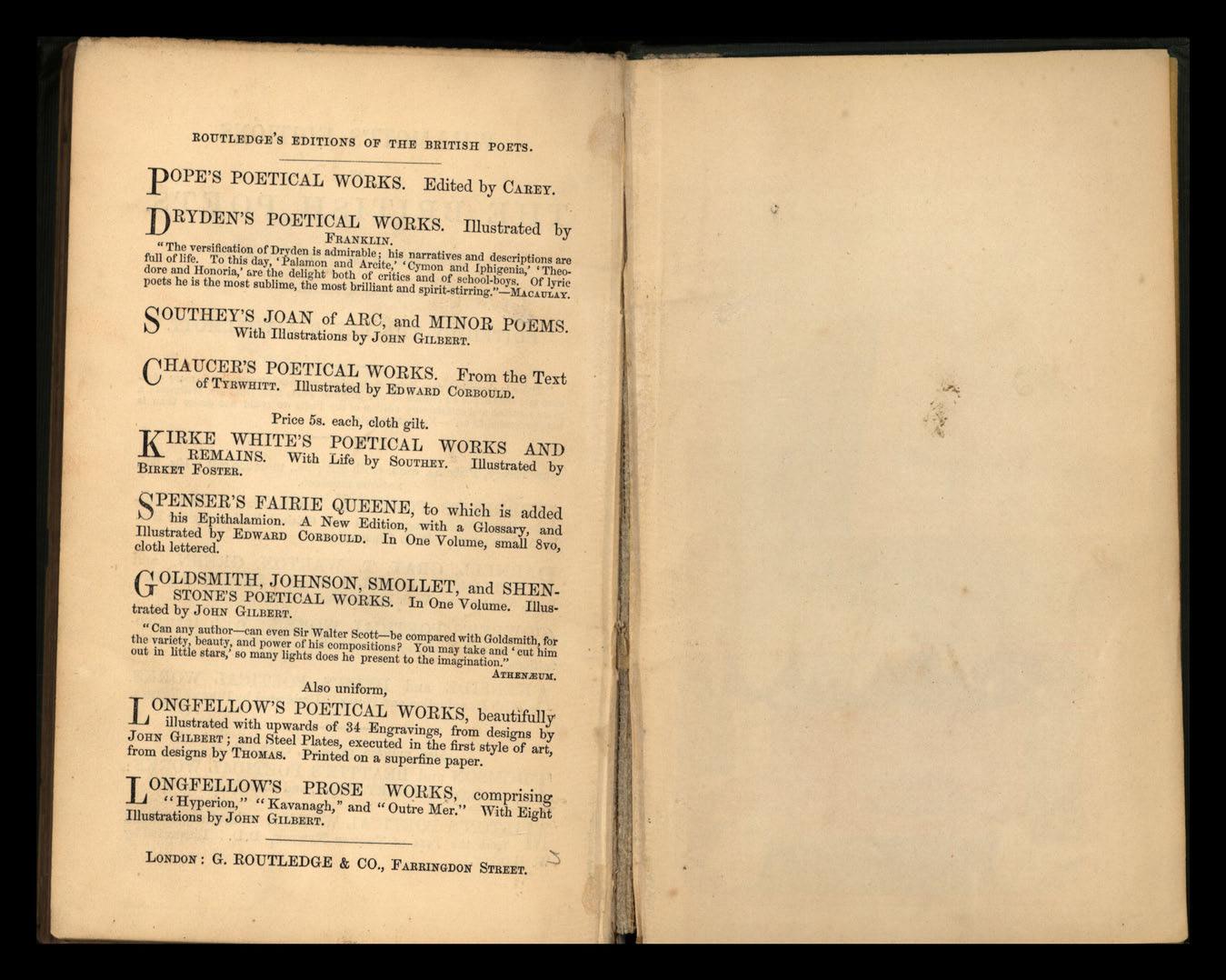
ATHBNMUll.
ONGFELLOW'S POETICAL WORKS, beautifully illustrated with upwards of 34 Engravings, from designs by JOHN G1LBERT; and Steel Plates, exec uted in the first style of art, from designs by THOMAS. Printed on a. superfine paper.
LONGFELLOW'S PROSE WORKS, comprising "Hyperion," "Kavanagh," and "Outre Mer." With Eight Illustrations by J ORN GILBERT.
LONDON: G. ROUTLEDGE & CO., FARRINGDON STREET.

t.eA6ARt.Aftft
COftft'OAe 'Oiift ftA ftSAt.t.
1. All injuries to books, beyond reasonable wear and tear, and all losses, must be made good to the satisfaction of the County Librarian. (Marking a book, even with a lead penc::il, or taming down the corner of pages, will be considered an injmy.)
2. Borrowers mast report to the Local Lt'brarian all cases of infectious disease occurring in their houses while library books are in their possession.
3. A notice to readers appeatl on front board label ..... ...
